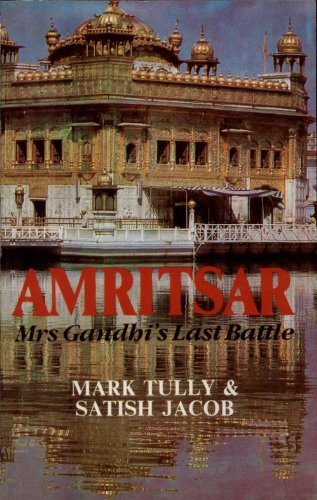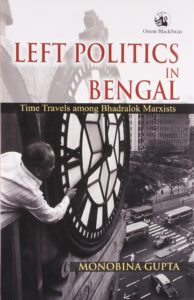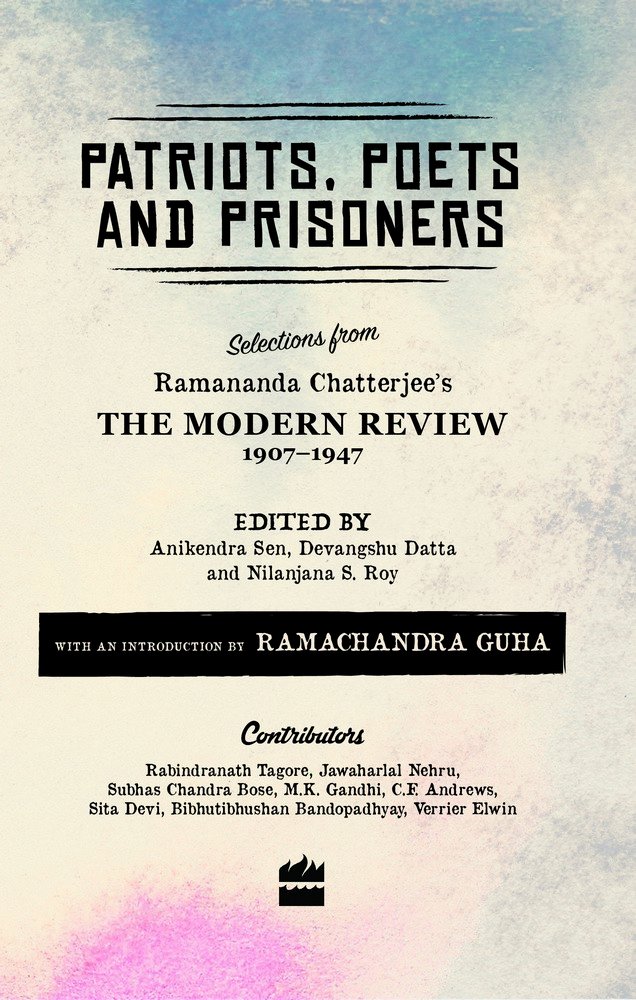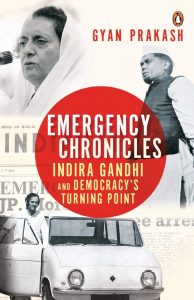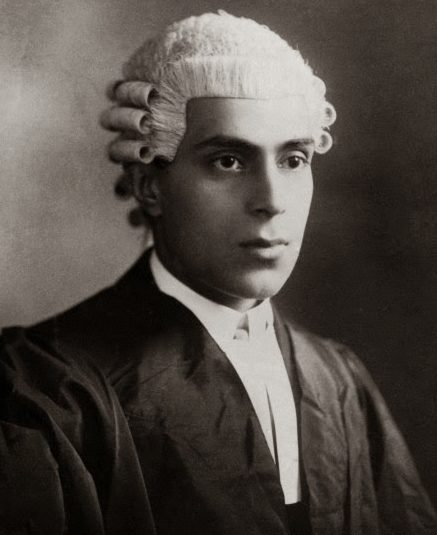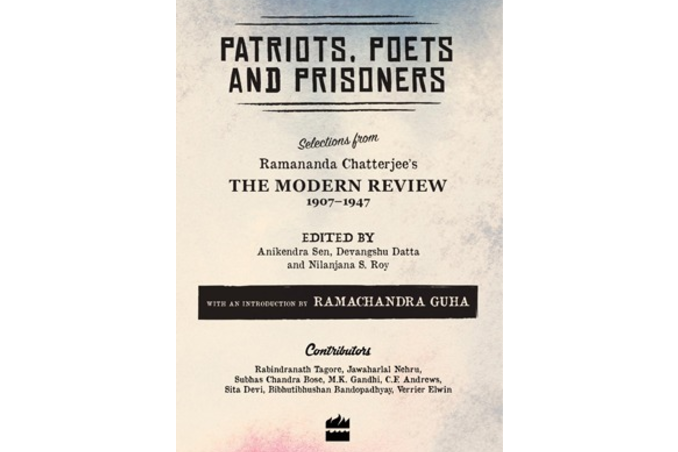ARCHIVE
New Leaders and Their Different Ideologies
After the failure of the non-cooperation movement, the Indian people had lost hope. Communal conflict between Hindus and Muslims wiped out the little resolve that still remained. But once a sense of awakening has come upon a nation, it cannot remain asleep for long. In just a few days, the public is back on its feet and ready for battle. Today, India is full of life and vigour again; it is awake. We may not see clear signs of a great mass movement, but the ground is certainly being prepared for it. Many new leaders with a modern sensibility are emerging. Young leaders are at the forefront this time, and youth movements are proliferating. Only young leaders are commanding the attention of patriotic-minded Indians. Even the tallest veteran leaders are being left behind.
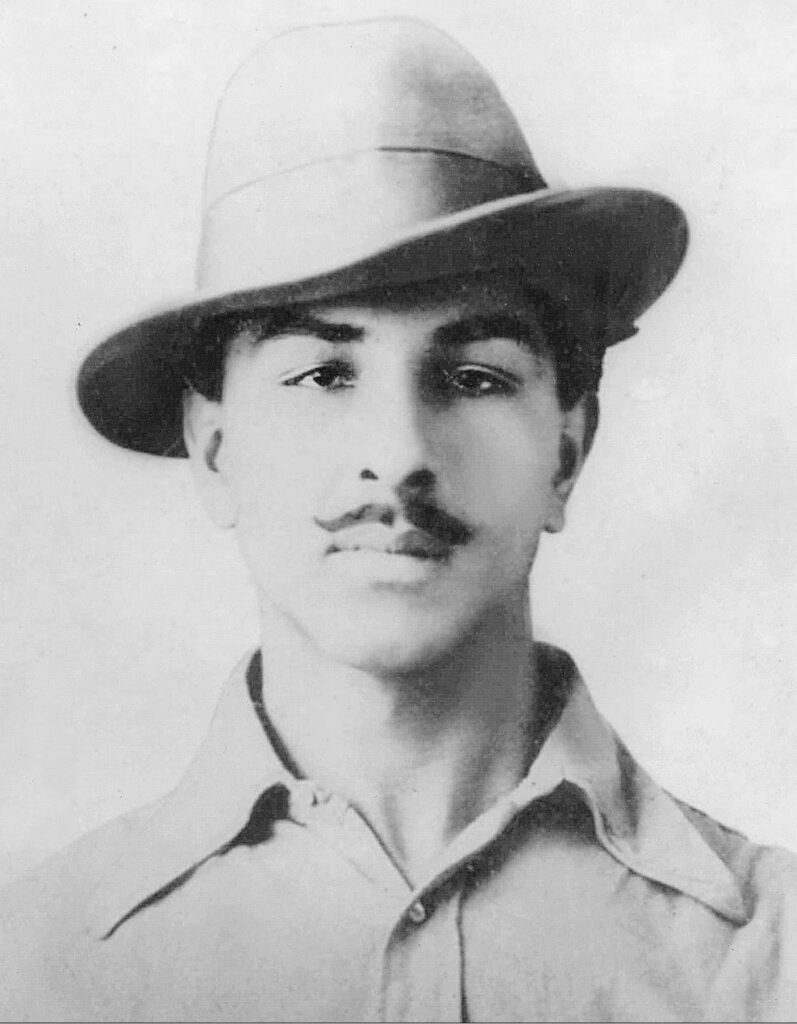
Bhagat Singh
Many new leaders with a modern sensibility are emerging. Young leaders are at the forefront this time, and youth movements are proliferating. Only young leaders are commanding the attention of patriotic-minded Indians.
The leaders who have gained prominence this time are the venerable Subhash Chandra Bose of Bengal and the eminent Pandit Jawaharlal Nehru. These are the two leaders who appear to be rising above all others in India and involving themselves in youth movements in particular. They are both uncompromising champions of Indian independence; both intelligent and genuine patriots. And yet, their ideologies are as different as night and day. One is believed to be a devotee and proponent of India’s ancient culture and the other a committed follower of western civilization. If one is regarded as tender-hearted and sensitive, the other is spoken of as a quintessential revolutionary. Our attempt in this essay will be to present their respective ideologies before the public, so that people understand the difference between the two and make up their own minds.
But before we examine the ideas of these two leaders, it is important to mention another who is a champion of independence just as they are, and is also a prominent figure in certain youth movements. Sadhu Vaswani may not be as well known as the leading lights of the Congress, he may not occupy a special place in the country’s political arena, yet his influence is apparent among the youth, who will shape the country’s future. The organization Sadhu Vaswani founded — Bharat Yuva Sangh — has a particular hold on young Indians. Vaswani’s ideology can be summed up in a single phrase: back to the Vedas. This call was first given by the Arya Samaj. It is based on the belief that the Almighty has poured all the knowledge of the world into the Vedas. No progress is possible beyond them. Therefore, the world has not and cannot achieve anything greater than the wonders our very own India had achieved in the ancient past! So that is the entire faith of people like Vaswani. Which why he says:
“Up until now, our politics has either considered Mazzini and Voltaire as its ideals, or it has sought inspiration from Lenin and Tolstoy. This, when they should know that they have far greater ideals in our ancient rishis…”
Vaswani is convinced that once upon a time, our country had reached the final summit of development and today there is no reason for us to move forward at all; we only need to go back to the past.
Vaswani is a poet. Everything about his ideology is poetic. He is also a great practitioner of religious dharma. He wants to establish ‘Shakti-dharma’. He says, ‘At this time we need shakti — power — more than ever. He does not use the word ‘shakti’ only for India. He sees the word as the path and means to a kind of Devi, a special godhead. Like a very emotional poet he tells us:
‘For in solitude have I communicated with her, our admired Bharat Mata and my aching head has heard voices saying — “The day of freedom is not far off.” Sometimes indeed a strange feeling visits me and I say to myself: Holy, holy is Hindustan. For still is she under the protection of her mighty Rishis and their beauty is around us, but we behold it not.’
It must be the poet’s lament that makes him declare, over and over like a man deranged or distracted: ‘Our mother is the greatest. She is the mightiest. No one alive can vanquish her!’ In this fashion, driven purely by emotion, he ends up saying things like this: ‘Our national movement must become a purifying mass movement, if it is to fulfill its destiny without falling into class war one of the dangers of Bolshevism.’
He believes that all one needs to do is to say — ‘Go among the poor, go to the villages, give them free medicines’ — and our mission is accomplished. He’s a romantic poet. His poetry can offer no special purpose, it can only excite the heart a little. In fact, he has no vision to offer, except great noise about our ancient civilisation. He gives nothing to young minds. His only aim is to fill every heart with plain emotion. He has obvious influence among the youth, and it is growing. His ideas are regressive and patchy, as we’ve seen above. Such ideas have no direct connection with politics, and yet they have a significant effect. Mainly because it is the youth who are the future, and it is among them that such ideas are being propagated.
The leaders who have gained prominence this time are the venerable Subhash Chandra Bose of Bengal and the eminent Pandit Jawaharlal Nehru. These are the two leaders who appear to be rising above all others in India and involving themselves in youth movements in particular. They are both uncompromising champions of Indian independence; both intelligent and genuine patriots. And yet, their ideologies are as different as night and day.
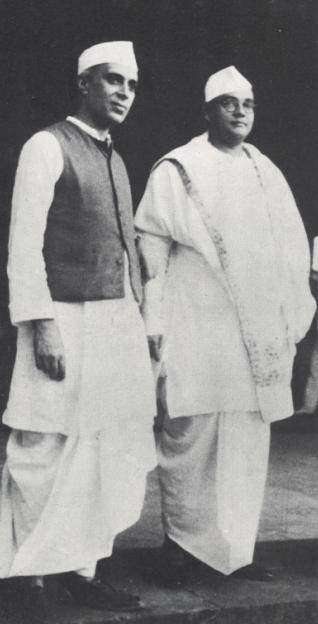
Jawaharlal Nehru with Subhas Chandra Bose
Let us now return to Subhash Chandra Bose and Jawaharlal Nehru. During the last three months, they have both chaired many conferences and put their thoughts and ideas before people. The government considers Subhash Babu a member of the group that is committed to overthrowing it, for which reason it had charged and imprisoned him under the Bengal Act. Upon his release, he was chosen as the leader of the Extremist group [of the Congress]. He espouses Purna Swaraj [complete independence], and argued for this in his presidential address at the Maharashtra session [of the Congress].
Pandit Jawaharlal Nehru is the son of the Swaraj Party leader Motilal Nehru. He is a barrister, and a very learned man. He has travelled to Russia and other countries. He is also a leader of the Extremist group, and it was due to his efforts, and those of his fellow leaders, that the resolution for Purna Swaraj was passed and adopted at the Madras session. Before this, he had spoken emphatically in favour of Purna Swaraj at the Amritsar session.
And yet, the two leaders are poles apart in their thinking. Reading the transcripts of their speeches at the Amritsar and Maharashtra sessions, this difference was apparent to us. But the difference became clear as daylight after a speech delivered in Bombay. Pandit Nehru was chairing the conference and Subhash Bose made a speech. He is a very emotional Bengali. He began his address with the statement that India has a special message for the world. It has a lesson in spirituality for humanity. And then he launched into his speech like a man in the grip of disorienting emotion — ‘Behold the Taj Mahal on a moonlit night and think of the vision of that heart that imagined it. Recall that a Bengali novelist has written that “our flowing tears hardened into stone within us”. Bose also declares that we should return to the Vedas. In his Poona [Congress session] address, he had expounded on ‘nationalism’ and said that internationalists criticize nationalism as narrow, chauvinistic ideology, but that this is a mistake. Indian nationalist thought, according to him, is nothing of the kind. It is not chauvinistic. It is not born of self-interest, and it is not oppressive, because at its root is the philosophy of Satyam Shivam Sundaram — Truth is bountiful and beautiful.
The same old romanticism. Pure emotionalism. And [like Vaswani], Bose too has great faith in his ancient past. He sees only greatness in this ancient era. In his thinking, there’s nothing new in the system of panchayati raj, or the rule of the people, which he says is very old in India. He goes so far as to say that Communism isn’t new to India either. Anyway, that day in Bombay, he went on long and hard about India’s special message for the world.
Pandit Jawaharlal Nehru, like many others, holds an entirely different view: ‘Every country thinks it has a special message for the world. England has arrogated to itself the right to teach the world culture. I don’t see anything special that belongs to my country alone. But Subhash Babu has great belief in such things!’ Nehru also says, ‘Every youth must rebel. Not only in the political sphere, but in social, economic and religious spheres also. I have not much use for any man who comes and tells me that such and such thing is said in the Koran. Everything unreasonable must be discarded, even if they find authority for it in the Vedas and the Koran.’
One man thinks our old systems are very superior; the other man believes we should rebel against these systems. Yet the latter is called emotional, sensitive, and the former a transformative revolutionary!
These are the thoughts of a true revolutionary, while Subhash Chandra’s are the thoughts of someone who wants to replace one regime with another. One man thinks our old systems are very superior; the other man believes we should rebel against these systems. Yet the latter is called emotional, sensitive, and the former a transformative revolutionary! At one point Pandit Nehru says:
“To those who still fondly cherish old ideas and are starving to bring back the conditions which prevailed in Arabia 1300 years ago or in the vedic age in India, I say that it is inconceivable that you can bring back the hoary past. The world of reality will not retrace its steps, the world of imagination may remain stationary.”
This is why it feels necessary to revolt.
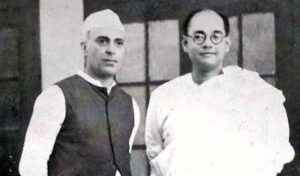
Jawaharlal Nehru and Subhash Chandra Bose
Subhash Babu supports Purna Swaraj, complete independence, because the British are people of the West and we are of the East. Pandit Ji’s position is that we need to establish our own rule so that we can change the entire social structure. This is why we must have complete and absolute independence.
Subhash Babu is in sympathy with labour, the working class, and wants to improve their condition. Pandit ji wants to bring in revolution and change the existing system altogether. Subhash Chandra is emotional and romantic — he is giving the young food for their hearts, and only their hearts. The other man is an epochal change — maker who is fuelling not just the heart but also the mind:
“They should aim at Swaraj for the masses based on Socialism. That was a revolutionary change which they could not bring about without revolutionary methods… Mere reform or gradual repairing of the existing machinery could not achieve the real, proper Swaraj for the general masses.”
Subhash Babu feels the need to focus on national politics only as long as it is necessary to safeguard and promote India’s position in world politics. But Pandit ji has freed himself of the narrow confines of plain nationalism and emerged into an open field.
Subhash Babu feels the need to focus on national politics only as long as it is necessary to safeguard and promote India’s position in world politics. But Pandit ji has freed himself of the narrow confines of plain nationalism and emerged into an open field.
Now the ideas of the [two] leaders are before us. Which way should we incline? One Punjabi newspaper has heaped praise upon Subhash Chandra and said of Pandit ji and others that such rebels destroy themselves beating their heads against stone. We must of course remember that Punjab has always been a rather emotional province. People’s passions here rise very quickly and just as quickly subside, like foam.
Subhash Chandra doesn’t appear to be providing any intellectual nourishment, only food for the heart. The need of the hour now is for the youth of Punjab to understand and strengthen revolutionary ideas. At this time, Punjab needs food for the mind, does not mean we should become his blind followers. But as far as ideas are concerned, the young people of Punjab should align themselves with him, so that they can know the true meaning of revolution, realize the need for a revolution in India, understand the significance of revolution in the world at large, and so on Through serious thought and analysis, the youth should bring clarity and conviction to their ideas, so that even in times of very little hope, times of disillusionment and defeat, they should not lose direction, stand tall and strong against a hostile world and not give up. This is how the public will achieve the goal of revolution.
— Bhagat Singh
This is a translation of Bhagat Singh’s ‘Naye Netaaon ke Alag Alag Vichar’ in the July 1928 issue of the journal Kirti. This translated version has been carried courtesy the permission of Purushottam Agrawal.
You can buy Who is Bharat Mata? On History, Culture and the Idea of India: Writings by and On Jawaharlal Nehru here.
ARCHIVE
At Benares Hindu University (Benares, February, 1916)
MOHANDAS KARAMCHAND GANDHI
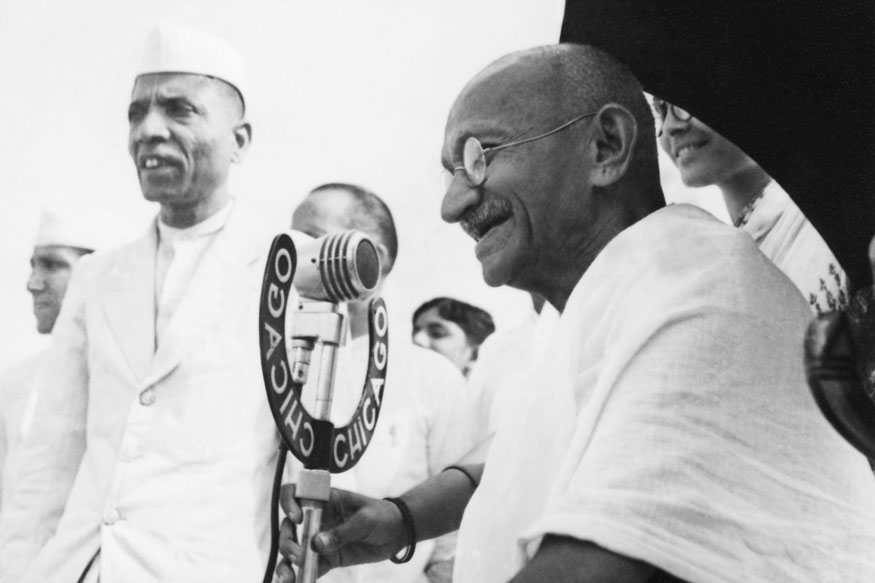
Mahatma Gandhi
I wish to tender my humble apology for the long delay that took place before I was able to reach this place. And you will readily accept the apology when I tell you that I am not responsible for the delay nor is any human agency responsible for it. The fact is that I am like an animal on show, and my keepers in their over kindness always manage to neglect a necessary chapter in this life, and, that is, pure accident. In this case, they did not provide for the series of accidents that happened to us—to me, keepers, and my carriers. Hence this delay.
Friends, under the influence of the matchless eloquence of Mrs Besant who has just sat down, pray, do not believe that our University has become a finished product, and that all the young men who are to come to the University, that has yet to rise and come into existence, have also come and returned from it finished citizens of a great empire. Do not go away with any such impression, and if you, the student world to which my remarks are supposed to be addressed this evening, consider for one moment that the spiritual life, for which this country is noted and for which this country has no rival, can be transmitted through the lip, pray, believe me, you are wrong. You will never be able merely through the lip, to give the message that India, I hope, will one day deliver to the world. I myself have been fed up with speeches and lectures. I accept the lectures that have been delivered here during the last two days from this category, because they are necessary. But I do venture to suggest to you that we have now reached almost the end of our resources in speech-making; it is not enough that our ears are feasted, that our eyes are feasted, but it is necessary that our hearts have got to be touched and that our hands and feet have got to be moved.
We have been told during the last two days how necessary it is, if we are to retain our hold upon the simplicity of Indian character, that our hands and feet should move in unison with our hearts. But this is only by way of preface. I wanted to say it is a matter of deep humiliation and shame for us that I am compelled this evening under the shadow of this great college, in this sacred city, to address my countrymen in a language that is foreign to me. I know that if I was appointed an examiner, to examine all those who have been attending during these two days this series of lectures, most of those who might be examined upon these lectures would fail. And why? Because they have not been touched.
I wanted to say it is a matter of deep humiliation and shame for us that I am compelled this evening under the shadow of this great college, in this sacred city, to address my countrymen in a language that is foreign to me. I know that if I was appointed an examiner, to examine all those who have been attending during these two days this series of lectures, most of those who might be examined upon these lectures would fail. And why? Because they have not been touched.
I was present at the sessions of the great Congress in the month of December. There was a much vaster audience, and will you believe me when I tell you that the only speeches that touched the huge audience in Bombay were the speeches that were delivered in Hindustani? In Bombay, mind you, not in Benaras where everybody speaks Hindi. But between the vernaculars of the Bombay Presidency on the one hand and Hindi on the other, no such great dividing line exists as there does between English and the sister language of India; and the Congress audience was better able to follow the speakers in Hindi. I am hoping that this University will see to it that the youths who come to it will receive their instruction through the medium of their vernaculars. Our languages are the reflection of ourselves, and if you tell me that our languages are too poor to express the best thought, then say that the sooner we are wiped out of existence the better for us. Is there a man who dreams that English can ever become the national language of India? Why this handicap on the nation? Just consider for one moment what an equal race our lads have to run with every English lad.
I had the privilege of a close conversation with some Poona professors. They assured me that every Indian youth, because he reached his knowledge through the English language, lost at least six precious years of life. Multiply that by the numbers of students turned out by our schools and colleges, and find out for yourselves how many thousand years have been lost to the nation. The charge against us is that we have no initiative. How can we have any, if we are to devote the precious years of our life to the mastery of a foreign tongue? We fail in this attempt also. Was it possible for any speaker yesterday and today to impress his audience as was possible for Mr Higginbotham? It was not the fault of the previous speakers that they could not engage the audience. They had more than substance enough for us in their addresses. But their addresses could not go home to us. I have heard it said that after all it is English educated India which is leading and which is doing all the things for the nation. It would be monstrous if it were otherwise. The only education we receive is English education. Surely we must show something for it. But suppose that we had been receiving during the past fifty years’ education through our vernaculars, what should we have today? We should have today a free India, we should have our educated men, not as if they were foreigners in their own land but speaking to the heart of the nation; they would be working amongst the poorest of the poor, and whatever they would have gained during these fifty years would be a heritage for the nation. Today even our wives are not the sharers in our best thought. Look at Professor Bose and Professor Ray and their brilliant researches. Is it not a shame that their researches are not the common property of the masses?
I have heard it said that after all it is English educated India which is leading and which is doing all the things for the nation. It would be monstrous if it were otherwise. The only education we receive is English education. Surely we must show something for it. But suppose that we had been receiving during the past fifty years’ education through our vernaculars, what should we have today? We should have today a free India, we should have our educated men, not as if they were foreigners in their own land but speaking to the heart of the nation; they would be working amongst the poorest of the poor, and whatever they would have gained during these fifty years would be a heritage for the nation.
Let us now turn to another subject.
The Congress has passed a resolution about self-government, and I have no doubt that the All-India Congress Committee and the Muslim League will do their duty and come forward with some tangible suggestions. But I, for one, must frankly confess that I am not so much interested in what they will be able to produce as I am interested in anything that the student world is going to produce or the masses are going to produce. No paper contribution will ever give us self-government. No amount of speeches will ever make us fit for self-government. It is only our conduct that will make us fit for it. And how are we trying to govern ourselves?
I want to think audibly this evening. I do not want to make a speech and if you find me this evening speaking without reserve, pray, consider that you are only sharing the thoughts of a man who allows himself to think audibly, and if you think that I seem to transgress the limits that courtesy imposes upon me, pardon me for the liberty I may be taking. I visited the Vishwanath temple last evening, and as I was walking through those lanes, these were the thoughts that touched me. If a stranger dropped from above on to this great temple, and he had to consider what we as Hindus were, would he not be justified in condemning us? Is not this great temple a reflection of our own character? I speak feelingly, as a Hindu. Is it right that the lanes of our sacred temple should be as dirty as they are? The houses round about are built anyhow. The lanes are tortuous and narrow. If even our temples are not models of roominess and cleanliness, what can our self-government be? Shall our temples be abodes of holiness, cleanliness and peace as soon as the English have retired from India, either of their own pleasure or by compulsion, bag and baggage?
I entirely agree with the President of the Congress that before we think of self-government, we shall have to do the necessary plodding. In every city there are two divisions, the cantonment and the city proper. The city mostly is a stinking den. But we are a people unused to city life. But if we want city life, we cannot reproduce the easy-going hamlet life. It is not comforting to think that people walk about the streets of Indian Bombay under the perpetual fear of dwellers in the storeyed building spitting upon them. I do a great deal of railway travelling. I observe the difficulty of third-class passengers. But the railway administration is by no means to blame for all their hard lot.
We do not know the elementary laws of cleanliness. We spit anywhere on the carriage floor, irrespective of the thoughts that it is often used as sleeping space. We do not trouble ourselves as to how we use it; the result is indescribable filth in the compartment. The so-called better class passengers overawe their less fortunate brethren. Among them I have seen the student world also; sometimes they behave no better. They can speak English and they have worn Norfolk jackets and, therefore, claim the right to force their way in and command seating accommodation.
We do not know the elementary laws of cleanliness. We spit anywhere on the carriage floor, irrespective of the thoughts that it is often used as sleeping space. We do not trouble ourselves as to how we use it; the result is indescribable filth in the compartment. The so-called better class passengers overawe their less fortunate brethren.
I have turned the searchlight all over, and as you have given me the privilege of speaking to you, I am laying my heart bare. Surely we must set these things right in our progress towards self-government. I now introduce you to another scene. His Highness the Maharaja who presided yesterday over our deliberations spoke about the poverty of India. Other speakers laid great stress upon it. But what did we witness in the great pandal in which the foundation ceremony was performed by the Viceroy? Certainly a most gorgeous show, an exhibition of jewellery, which made a splendid feast for the eyes of the greatest jeweler who chose to come from Paris. I compare with the richly bedecked noble men the millions of the poor. And I feel like saying to these noble men, ‘There is no salvation for India unless you strip yourselves of this jewellery and hold it in trust for your countrymen in India.’ I am sure it is not the desire of the King-Emperor or Lord Hardinge that in order to show the truest loyalty to our King-Emperor, it is necessary for us to ransack our jewellery boxes and to appear bedecked from top to toe. I would undertake, at the peril of my life, to bring to you a message from King George himself that he accepts nothing of the kind.
Sir, whenever I hear of a great palace rising in any great city of India, be it in British India or be it in India which is ruled by our great chiefs, I become jealous at once, and say, ‘Oh, it is the money that has come from the agriculturists.’ Over seventy-five percent of the population are agriculturists and Mr Higginbotham told us last night in his own felicitous language, that they are the men who grow two blades of grass in the place of one. But there cannot be much spirit of self-government about us, if we take away or allow others to take away from them almost the whole of the results of their labour. Our salvation can only come through the farmer. Neither the lawyers, nor the doctors, nor the rich landlords are going to secure it.
Now, last but not the least, it is my bounden duty to refer to what agitated our minds during these two or three days. All of us have had many anxious moments while the Viceroy was going through the streets of Benares. There were detectives stationed in many places. We were horrified. We asked ourselves, ‘Why this distrust?’ Is it not better that even Lord Hardinge should die than live a living death? But a representative of a mighty sovereign may not. He might find it necessary to impose these detectives on us? We may foam, we may fret, we may resent, but let us not forget that India of today in her impatience has produced an army of anarchists. I myself am an anarchist, but of another type. But there is a class of anarchists amongst us, and if I was able to reach this class, I would say to them that their anarchism has no room in India, if India is to conquer the conqueror. It is a sign of fear. If we trust and fear God, we shall have to fear no one, not the maharajas, not the viceroys, not the detectives, not even King George.
I myself am an anarchist, but of another type. But there is a class of anarchists amongst us, and if I was able to reach this class, I would say to them that their anarchism has no room in India, if India is to conquer the conqueror. It is a sign of fear. If we trust and fear God, we shall have to fear no one, not the maharajas, not the viceroys, not the detectives, not even King George.
I honour the anarchist for his love of the country. I honour him for his bravery in being willing to die for his country; but I ask him— is killing honourable? Is the dagger of an assassin a fit precursor of an honourable death? I deny it. There is no warrant for such methods in any scriptures. If I found it necessary for the salvation of India that the English should retire, that they should be driven out, I would not hesitate to declare that they would have to go, and I hope I would be prepared to die in defense of that belief. That would, in my opinion, be an honourable death. The bombthrower creates secret plots, is afraid to come out into the open, and when caught pays the penalty of misdirected zeal.
I have been told, ‘Had we not done this, had some people not thrown bombs, we should never have gained what we have got with reference to the partition movement.’ (Mrs Besant: ‘Please stop it.’) This was what I said in Bengal when Mr Lyon presided at the meeting. I think what I am saying is necessary. If I am told to stop I shall obey. (Turning to the Chairman) I await your orders. If you consider that by my speaking as I am, I am not serving the country and the empire I shall certainly stop. (Cries of ‘Go on.’) (The Chairman: ‘Please, explain your object.’) I am simply… (another interruption). My friends, please do not resent this interruption. If Mrs Besant this evening suggests that I should stop, she does so because she loves India so well, and she considers that I am erring in thinking audibly before you young men. But even so, I simply say this, that I want to purge India of this atmosphere of suspicion on either side, if we are to reach our goal; we should have an empire which is to be based upon mutual love and mutual trust. Is it not better that we talk under the shadow of this college than that we should be talking irresponsibly in our homes? I consider that it is much better that we talk these things openly. I have done so with excellent results before now. I know that there is nothing that the students do not know. I am, therefore, turning the searchlight towards ourselves. I hold the name of my country so dear to me that I exchange these thoughts with you, and submit to you that there is no room for anarchism in India. Let us frankly and openly say whatever we want to say our rulers, and face the consequences if what we have to say does not please them. But let us not abuse.
I was talking the other day to a member of the much-abused Civil Service. I have not very much in common with the members of that Service, but I could not help admiring the manner in which he was speaking to me. He said: ‘Mr Gandhi, do you for one moment suppose that all we, Civil Servants, are a bad lot, that we want to oppress the people whom we have come to govern?’ ‘No,’ I said. ‘Then if you get an opportunity put in a word for the much-abused Civil Service.’ And I am here to put in that word. Yes, many members of the Indian Civil Service are most decidedly overbearing; they are tyrannical, at times thoughtless. Many other adjectives may be used. I grant all these things and I grant also that after having lived in India for a certain number of years some of them become somewhat degraded. But what does that signify? They were gentlemen before they came here, and if they have lost some of the moral fibre, it is a reflection upon ourselves.
Just think out for yourselves, if a man who was good yesterday has become bad after having come in contact with me, is he responsible that he has deteriorated or am I? The atmosphere of sycophancy and falsity that surrounds them on their coming to India demoralizes them, as it would many of us. It is well to take the blame sometimes. If we are to receive self-government, we shall have to take it. We shall never be granted self-government. Look at the history of the British Empire and the British nation; freedom loving as it is, it will not be a party to give freedom to a people who will not take it themselves. Learn your lesson if you wish to from the Boer War. Those who were enemies of that empire only a few years ago have now become friends…
If we are to receive self-government, we shall have to take it. We shall never be granted self-government. Look at the history of the British Empire and the British nation; freedom loving as it is, it will not be a party to give freedom to a people who will not take it themselves. Learn your lesson if you wish to from the Boer War. Those who were enemies of that empire only a few years ago have now become friends…
(At this point there was an interruption and a movement on the platform to leave. The speech, therefore, ended here abruptly).
Election Speech (December, 1926)
KAMALADEVI CHATTOPADHYAY
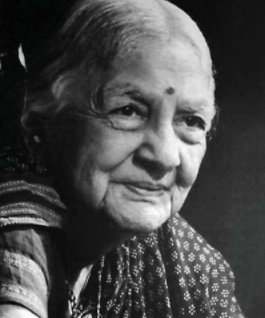
Kamaladevi Chattopadhyay
If you peep into the dim unknown history of India, the history of which is written not on palm leaves or papers, but is alive in the hearts of everyone of us, you will find that the position of women was indeed an enviable one. Never in the history of any country, at any time, has woman been so honoured as she has been in this country. Though apparently she seems to have lost her voice, she has always been the vital element in the evolution of the country and the nation. When I was travelling abroad, I was often asked how the suffragist movement in India was progressing. I could only tell them that there was no suffragist movement in India. In fact, there was no need for such a movement. The last few years have proved this. As soon as the new reforms came in the franchise was granted, and closely following upon its heels came the removal of the ban on sex-disqualification. The time has now come when women should come forward and share the responsibilities equally with men. All over the world women are now taking a keen and an active part in all departments of life.
The time has now come when women should come forward and share the responsibilities equally with men. All over the world women are now taking a keen and an active part in all departments of life.
I stand now as an Independent. I stand for no party or community. I stand as a representative of women. I am not a Swarajist candidate and I am not a member of the Swarajya Party. I do not believe in the policy of obstruction and walk-out. What the Swarajya programme for this year is, I do not know. Whether it is going to accept office or not, does not concern me. That temptation does not come in my way.
People have been questioning me what my political precedents are. I have been interested in politics for several years now. When the great Non-Co-operation Movement was started, my husband and I were pursuing studies in England. The great message came to us over the waters. Our hearts throbbed to the cries of the great nation. Gandhi’s message of love thrilled us, and we felt that we should not be led away by the glamor of foreign degrees. A golden opportunity had been offered to us to do our bit for our country. By the time we had completed our tour and landed in India, Mahatamaji had been imprisoned for some time. When we landed in India we were met by Mrs. [Sarojini] Naidu. The first question we asked her was: What was the condition of the country? She said there was no condition at all. Death had already set in. Our burning spirits were as defeated with this reply. We enlisted ourselves as Congress members and and tried to do our bit, but a good many difficulties arose in our way.
We soon found much of our precious time getting scattered. We then decided to do the same work through the arts and achieve the same end. So at the Belgaum Congress, we consulted Mahatmaji. He gladly assented to our plans and with his blessings we started upon our work. We have been trying to wake up the political consciousness of the country through poetry, through music and through drama. It was just a month ago that we met Mahatma Gandhi in Bombay and he said: “Though I am pressed with heavy work, I have found time to watch with pleasure your progress. Though I cannot be with you in person, let me admire you from a distance. When you have a little leisure come to my Ashram and show my boys the beauties of your art.” Even on the day I was leaving for Mangalore we received two wires asking us to go to him. It was indeed a great temptation I had to resist. All these three years, though I have not been active in the political field, all the time I have been in close touch with politics.
If women in other countries have proved competent enough to handle these problems I do not think an Indian woman will prove an exception. For years you have been sending men to the councils. Some of them have done something for this district. Others have done nothing. So even if a woman fails to fulfill your expectations you have not much to regret.
As to what work I shall do in the council, though no doubt I shall try to tackle problems that are intimately connected with women and children, I feel confident that with time and study I shall be in a position to handle general questions as well. During the course of my tour I have been observing and studying the local grievances. I have been trying to get first-hand information as to the Forest and Land Act. Some of the main problems agitating the public mind just now are the abolition of the old Rent Recovery Act without the introduction of any new compensating one and the Revenue Settlement Act. I have enough of leisure at my disposal to devote it to this work. I appeal to you to give me a chance. If women in other countries have proved competent enough to handle these problems I do not think an Indian woman will prove an exception. For years you have been sending men to the councils. Some of them have done something for this district. Others have done nothing. So even if a woman fails to fulfill your expectations you have not much to regret. Some of you may have some conscientious objections in supporting my candidature either on the ground of sex or otherwise. I appeal to them in that case, at least, to remain neutral as far as possible.
For, remember, when you work against me, you insult all womankind, you work against your own mothers, your sisters, your daughters.
When you lend me your support, it is not merely a personal favour you do to me, but you pay your homage to womankind. If the first Indian woman who has come forward in spite of all difficulties and obstacles is not helped, it will greatly discourage the women who in the future might stand for elections. So the privilege granted to women will be hardly of any service.
When you lend me your support, it is not merely a personal favour you do to me, but you pay your homage to womankind. If the first Indian woman who has come forward in spite of all difficulties and obstacles is not helped, it will greatly discourage the women who in the future might stand for elections. So the privilege granted to women will be hardly of any service. I am not concerned very much with the result. I shall do my best. I wish to prove to the world that a woman can fight and fight well in spite of everything. Woman in India has always stood for strength and not weakness. She is the Divine Shakti. Whether it is a mere sentiment or a living flame, will be proved by the elections.
Speech at Mahad (Mahad, December 1927)
BHIMRAO RAMJI AMBEDKAR
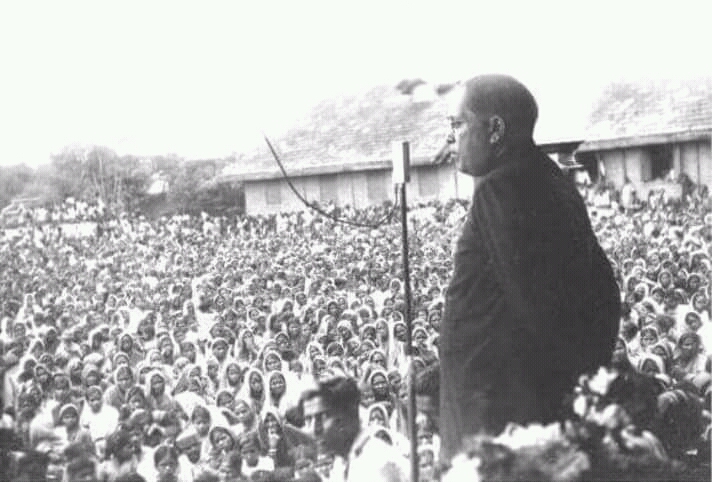
B.R. Ambedkar
Gentlemen, you have gathered here today in response to the invitation of the Satyagraha Committee. As the Chairman of that Committee, I gratefully welcome you all.
Many of you will remember that on the 19th of last March all of us came to the Chavadar Lake here. The caste Hindus of Mahad had laid no prohibition on us; but they showed they had objections to our going there by the attack they made. The fight brought results that one might have expected. The aggressive caste Hindus were sentenced to four months’ rigorous imprisonment, and are now in jail. If we had not been hindered on 19th March, it would have been proved that the caste Hindus acknowledge our right to draw water from the lake, and we should have had no need to begin our present undertaking.
Unfortunately we were thus hindered, and we have been obliged to call this meeting today. This lake at Mahad is public property. The caste Hindus of Mahad are so reasonable that they not only draw water from the lake themselves but freely permit people of any religion to draw water from it, and accordingly people of other religions such as the Islamic do make use of this permission. Nor do the caste Hindus prevent members of species considered lower than the human, such as birds and beasts, from drinking at the lake. Moreover, they freely permit beasts kept by untouchables to drink at the lake.
Caste Hindus are the very founts of compassion. They practise no hinsa and harass no one. They are not of the class of miserly and selfish folk who would grudge even a crow some grains of the food they are eating. The proliferation of sanyasis and mendicants is a living testimony to their charitable temperament. They regard altruism as religious merit and injury to another as a sin.
Even further, they have imbibed the principle that injury done by another must not be repaid but patiently endured, and so, they not only treat the harmless cow with kindness, but spare harmful creatures such as snakes. That one Atman or Spiritual Self dwells in all creatures has become a settled principle of their conduct. Such are the caste Hindus who forbid some human beings of their own religion to draw water from the Same Chavadar Lake! One cannot help asking the question, why do they forbid us alone?
Such are the caste Hindus who forbid some human beings of their own religion to draw water from the Same Chavadar Lake! One cannot help asking the question, why do they forbid us alone?
It is essential that all should understand thoroughly the answer to this question. Unless you do, I feel, you will not grasp completely the importance of today’s meeting. The Hindus are divided, according to sacred tradition, into four castes; but according to custom, into five: Brahmins, Kshatriyas, Vaishyas, Shudras and Atishudras. The caste system is the first of the governing rules of the Hindu religion. The second is that the castes are of unequal rank. They are ordered in a descending series of each meaner than the one before.
Not only are their ranks permanently fixed by the rule, but each is assigned boundaries it must not transgress, so that each one may at once be recognized as belonging to its particular rank. There is a general belief that the prohibitions in the Hindu religion against intermarriage, interdining, inter drinking and social intercourse are bounds set to degrees of association with one another. But this is an incomplete idea. These prohibitions are indeed limits to degrees of association; but they have been set to show people of unequal rank what the rank of each is. That is, these bounds are symbols of inequality.
Just as the crown on a man’s head shows he is a king, and the bow in his hand shows him to be a Kshatriya, the class to which none of the prohibitions applies is considered the highest of all and the one to which they all apply is reckoned the lowest in rank. The strenuous efforts made to maintain the prohibitions are for the reason that, if they are relaxed, the inequality settled by religion will break down and equality will take its place.
The caste Hindus of Mahad prevent the untouchables from drinking the water of the Chavadar Lake not because they suppose that the touch of the untouchables will pollute the water or that it will evaporate and vanish. Their reason for preventing the untouchables from drinking it is that they do not wish to acknowledge by such a permission that castes declared inferior by sacred tradition are in fact their equals.
Gentlemen! you will understand from this the significance of the struggle we have begun. Do not let yourselves suppose that the Satyagraha Committee has invited you to Mahad merely to drink the water of the Chavadar Lake of Mahad.
It is not as if drinking the water of the Chavadar Lake will make us immortal. We have survived well enough all these days without drinking it. We are not going to the Chavadar Lake merely to drink its water. We are going to the Lake to assert that we too are human beings like others. It must be clear that this meeting has been called to set up the norm of equality.
It is not as if drinking the water of the Chavadar Lake will make us immortal. We have survived well enough all these days without drinking it. We are not going to the Chavadar Lake merely to drink its water. We are going to the Lake to assert that we too are human beings like others. It must be clear that this meeting has been called to set up the norm of equality.
I am certain that no one who thinks of this meeting in this light will doubt that it is unprecedented. I feel that no parallel to it can be found in the history of India. If we seek for another meeting in the past to equal this, we shall have to go to the history of France on the continent of Europe. A hundred and thirty-eight years ago, on 24 January 1789, King Louis XVI had convened, by royal command, an assembly of deputies to represent the people of the kingdom. His French National Assembly has been much vilified by historians. The Assembly sent the King and the Queen of France to the guillotine; persecuted and massacred the aristocrats; and drove their survivors into exile. It confiscated the estates of the rich and plunged Europe into war for fifteen years. Such are the accusations leveled against the Assembly by the historians. In my view, the criticism is misplaced; further, the historians of this school have not understood the gist of the achievement of the French National Assembly. That achievement served the welfare not only of France but of the entire European continent. If European nations enjoy peace and prosperity today, it is for one reason: the revolutionary French National Assembly convened in 1789 set new principles for the organization of society before the disorganized and decadent French nation of its time, and the same principles have been accepted and followed by Europe.
To appreciate the importance of the French National Assembly and the greatness of its principles, we must keep in mind the suite of French society at the time. You are all aware that our Hindu society is based on the system of castes. A rather similar system of classes existed in the France of 1789: the difference was that it was a society of three castes. Like the Hindu society, the French had a class of Brahmins and another of Kshatriyas. But instead of three different castes of Vaishya, Shudra, and Atishudra, there was one class that comprehended these. This is a minor difference. The important thing is that the caste or class system was similar. The similarity to be noted is not only in the differentiation between classes: the inequality of our caste system was also to be found in the French social system. The nature of the inequality in the French society was different: it was economic in nature. It was, however, equally intense. The thing to bear in mind is there is a great similarity between the French National Assembly that met on 5 May 1789 at Versailles and our meeting today. The similarity is not only in the circumstances in which the two meetings took place but also in their ideals.
That Assembly of the French people was convened to reorganize French society. Our meeting today too has been convened to reorganize Hindu society. Hence, before discussing on what principles our society should be reorganized, we should all pay heed to the principles on which the French Assembly relied and the policy it adopted. The scope of the French Assembly was far wider than that of our present meeting. It had to carry out the threefold organization of the French political, social and religious systems. We must confine ourselves to how social and religious reorganization can be brought about. Since we are not, for the present, concerned with political reorganization, let us see what the French Assembly did in the matter of the religious and social reorganization of their nation. The policy adopted by the French National Assembly in this area can be seen plainly by anyone from three important proclamations issued by that Assembly. The first was issued on 17 June 1789. This was a proclamation about the class systems in France. As said before, French society was divided into three classes. The proclamation abolished the three classes and blended them into one. Further, it abolished the seats reserved separately for the three classes (or estates) in the political assembly. The second proclamation was about the priests. By ancient custom, to appoint or remove these priests was outside the power of the nation, that being the monopoly of a foreign religious potentate, the Pope. Anyone appointed by the Pope was a priest, whether or not he was fit to be one in the eyes of those to whom he was to preach. The proclamation abolished the autonomy of the religious orders and assigned to the French nation the authority to decide who might follow this vocation, who was fit for it and who was not, whether he was to be paid for preaching or not, and so on. The third proclamation was not about the political, economic or religious systems. It was of a general nature and laid down the principles on which all social arrangements ought to rest. From that point of view, the third proclamation is the most important of the three; it might be called the king of these proclamations. It is renowned the world over as the declaration of human birthrights. It is not only unprecedented in the history of France; more than that, it is unique in the history of civilized nations. For every European nation has followed the French Assembly in giving it a place in its own constitution. So one may say that it brought about a revolution not only in France but the whole world. This proclamation has seventeen clauses, of which the following are important:
Any person is free to act according to his birthright. Any limit placed upon this freedom must be only to the extent necessary to permit other persons to enjoy their birthrights. Such limits must be laid down by law: they cannot be set on the grounds of the religion or on any other basis than the law of the land.
1) All human beings are equal by birth; and they shall remain equal till death. They may be distinguished in status only in the public interest. Otherwise, their equal status must be maintained.
2) The ultimate object of politics is to maintain these human birthrights.
3) The entire nation is the mother-source of sovereignty. The rights of any individual, group or special class, unless they are given by the nation, cannot be acknowledged as valid on any other ground, be it political or religious.
4) Any person is free to act according to his birthright. Any limit placed upon this freedom must be only to the extent necessary to permit other persons to enjoy their birthrights. Such limits must be laid down by law: they cannot be set on the grounds of the religion or on any other basis than the law of the land.
5) The law will forbid only such actions as are injurious to society. All must be free to do what has not been forbidden by law. Nor can anyone be compelled to do what the law has not laid down as a duty.
6) The law is not in the nature of bounds set by any particular class. The right to decide what the law shall be rests with the people or their representatives. Whether such a law is protective or punitive, it must be the same for all. Since justice requires that all social arrangements be based on the equality of all, all individuals are equally eligible for any kind of honour, power and profession. Any distinction in such matters must be owing to differences of individual merit; it must not be based on birth.
I feel our meeting today should keep the image of this French National Assembly before the mind. The road it marked out for the development of the French nation, the road that all progressed nations have followed, ought to be the road adopted for the development of Hindu society by this meeting. We need to pull away the nails which hold the framework of caste-bound Hindu society together, such as those of the prohibition of intermarriage down to the prohibition of social intercourse so that Hindu society becomes all of one caste. Otherwise untouchability cannot be removed nor can equality be established.
To raise men, aspiration is needed as much as outward efforts. Indeed it is to be doubted whether efforts are possible without aspiration. Hence, if a great effort is to be made, a great aspiration must be nursed. In adopting an aspiration one need not be abashed or deterred by doubts about one’s power to satisfy it. One should be ashamed only of mean aspirations; not of failure that may result because one’s aspiration is high. If untouchability alone is removed, we may change from Atishudras to Shurdas; but can we say that this radically removes untouchability? If such puny reforms as the removal of restrictions on social intercourse etc. were enough for the eradication of untouchability I would not have suggested that the caste system itself must go.
Some of you may feel that since we are untouchables, it is enough if we are set free from the prohibitions of interdrinking and social intercourse. That we need not concern ourselves with the caste system; how does it matter if it remains? In my opinion, this is a total error. If we leave the caste system alone and adopt only the removal of untouchability as our policy, people will say that we have chosen a low aim. To raise men, aspiration is needed as much as outward efforts. Indeed it is to be doubted whether efforts are possible without aspiration. Hence, if a great effort is to be made, a great aspiration must be nursed. In adopting an aspiration one need not be abashed or deterred by doubts about one’s power to satisfy it. One should be ashamed only of mean aspirations; not of failure that may result because one’s aspiration is high. If untouchability alone is removed, we may change from Atishudras to Shurdas; but can we say that this radically removes untouchability? If such puny reforms as the removal of restrictions on social intercourse etc. were enough for the eradication of untouchability I would not have suggested that the caste system itself must go. Gentlemen! You all know that if a snake is to be killed it is not enough to strike at its tail – its head must be crushed. If any harm is to be removed, one must seek out its root and strike at it. An attack must be based on the knowledge of the enemy’s vital weakness. Duryodhana was killed because Bheema struck at his thigh with his mace. If the mace had hit Durydhana’s head he would not have died; for his thigh was his vulnerable spot. One finds many instances of a physician’s efforts to remove a malady proving fruitless because he has not perceived fully what will get rid of the disease; similar instances of failure to root out a social disease when it is not fully diagnosed are rarely recorded in history; and so one does not often become aware of them. But let me acquaint you with one such instance that I have come across in my reading. In the ancient European nation of Rome, the patricians were considered upper class, and the plebians, lower class. All power was in the hands of, the patricians, and they used it to ill-treat the plebians. To free themselves from this harassment, the plebians, on the strength of their unity, insisted that laws should be written down for the facilitation of justice and for the information of all. Their patrician opponents agreed to this; and a charter of twelve laws was written down. But this did not rid the oppressed plebians of their woes. For the officers who enforced the laws were all of the patrician class; moreover, the chief officer, called the tribune, was also a patrician. Hence, though the laws were uniform, there was partiality in their enforcement. The plebians then demanded that instead of the administration being in the hands of one tribune there should be two tribunes, of whom one should be elected by the plebians and the other by the patricians. The patricians yielded to this too, and the plebians rejoiced, supposing they would now be free of their miseries. But their rejoicing was short-lived. The Roman people had a tradition that nothing was to be done without the favourable verdict of the oracle at Delphi. Accordingly, even the election of a duly elected tribune – if the oracle did not approve of him – had to be treated as annulled, and another had to be elected, of whom the oracle approved. The priest who put the question to the oracle was required, by sacred religious custom, to be one born of parents married in the mode the Romans called conferatio and this mode of marriage prevailed only among the patricians; so that the priest of Delphi was always a patrician.
The wily priest always saw to it that if the plebians elected a man really devoted to their cause, the oracle went against him. Only if the man elected by the plebians to the position of tribune was amenable to the patricians, would the oracle favour him and give him the opportunity of actually assuming office. What did the plebians gain by their right to elect a tribune? The answer must be, nothing in reality. Their efforts proved meaningless because they did not trace the malady to its source. If they had, they would, at the same time that they demanded a tribune of their election, have also settled the question of who should be the priest at Delphi. The disease could not be eradicated by demanding a tribune; it needed control of the priestly office; which the plebians failed to perceive. We too, while we seek a way to remove untouchability, must inquire closely into what will eradicate the disease; otherwise we too may miss our aim. Do not be foolish enough to believe that removal of the restrictions on social intercourse or interdrinking will remove untouchability.
Remember that if the prohibitions on social intercourse and interdrinking go, the roots of untouchability are not removed. Release from these two restrictions will, at the most, remove untouchability as it appears outside the home; but it will leave untouchability in the home untouched. If we want to remove untouchability in the home as well as outside, we must break down the prohibition against intermarriage. Nothing else will serve. From another point of view, we see that breaking down the bar against intermarriage is the way to establish real equality. Anyone must confess that when the root division is dissolved, incidental points of separateness will disappear by themselves. The interdictions on interdining, interdrinking and social intercourse have all sprung from the one interdiction against intermarriage. Remove the last and no special efforts are needed to move the rest. They will disappear of their own accord. In my view the removal of untouchability consists in breaking down the ban on intermarriage and doing so will establish real equality. If we wish to cut out untouchability, we must recognize that the root of untouchability is in the ban on intermarriage. Even if our attack today is on the ban against interdrinking, we must press it home against the ban on intermarriage; otherwise untouchability cannot be removed by the roots. Who can accomplish this task? It is no secret that the Brahmin class cannot do it.
If we wish to cut out untouchability, we must recognize that the root of untouchability is in the ban on intermarriage. Even if our attack today is on the ban against interdrinking, we must press it home against the ban on intermarriage; otherwise untouchability cannot be removed by the roots. Who can accomplish this task? It is no secret that the Brahmin class cannot do it.
While the caste system lasts, the Brahmin caste has its supremacy. No one, of his own will, surrenders power which is in his hands. The Brahmins have exercised their sovereignty over all other castes for centuries. It is not likely that they will be willing to give it up and treat the rest as equals. The Brahmins do not have the patriotism of the Samurais of Japan. It is useless to hope that they will sacrifice their privileges as the Samurai class did, for the sake of national unity based on a new equality. Nor does it appear likely that the task will be carried out by other caste Hindus. These others, such as the class comprising the Marathas and other similar castes, are a class between the privileged and those without any rights.
A privileged class, at the cost of a little self-sacrifice, can show some generosity. A class without any privileges has ideals and aspirations; for, at least as a matter of self-interest, it wishes to bring about a social reform. As a result it develops an attachment to principles rather than to self-interest. The class of caste Hindus, other than Brahmins, lies in between: it cannot practise the generosity possible to the class above and it does not develop the attachment to principles that develops in the class below. This is why this class is seen to be concerned not so much about attaining equality with the Brahmins as about maintaining its status above the untouchables.
For the purposes of the social reform required, the class of caste Hindus other than Brahmins is feeble. If we are to await its help, we should fall into the difficulties that the farmer faced, who depended on his neighbour’s help for his harvesting, as in the story of the mother lark and her chicks found in many textbooks.
The task of removing untouchability and establishing equality that we have undertaken, we must carry out ourselves. Others will not do it. Our life will gain its true meaning if we consider that we are born to carry out this task and set to work in earnest. Let us receive this merit which is awaiting us.
The task of removing untouchability and establishing equality that we have undertaken, we must carry out ourselves. Others will not do it. Our life will gain its true meaning if we consider that we are born to carry out this task and set to work in earnest. Let us receive this merit which is awaiting us.
This is a struggle in order to raise ourselves; hence we are bound to undertake it, so as to remove the obstacles to our progress. We all know how at every turn, untouchability muddies and soils our whole existence. We know that at one time our people were recruited in large numbers into the troops. It was a kind of occupation socially assigned to us and few of us needed to be anxious about earning our bread. Other classes of our level have found their way into the troops, the police, the courts and the offices, to earn their bread. But in the same areas of employment you will no longer find the untouchables.
It is not that the law debars us from these jobs. Everything is permissible as far the law is concerned. But the Government finds itself powerless because other Hindus consider us untouchables and look down upon us, and it acquiesces in our being kept out of Government jobs. Nor can we take up any decent trade. It is true, partly, that we lack money to start business, but the real difficulty is that people regard us as untouchables and no one will accept goods from our hands.
To sum up, untouchability is not a simple matter; it is the mother of all our poverty and lowliness and it has brought us to the abject state we are in today. If we want to raise ourselves out of it, we must undertake this task. We cannot be saved in any other way. It is a task not for our benefit alone; it is also for the benefit of the nation.
Untouchability is not a simple matter; it is the mother of all our poverty and lowliness and it has brought us to the abject state we are in today. If we want to raise ourselves out of it, we must undertake this task. We cannot be saved in any other way. It is a task not for our benefit alone; it is also for the benefit of the nation.
Hindu society must sink unless the untouchability that has become a part of the four-castes system is eradicated. Among the resources that any society needs in the struggle for life, a great resource is the moral order of that society. And everyone must admit that a society in which the existing moral order upholds things that disrupt the society and condemns those that would unite the members of the society, must find itself defeated in any struggle for life with other societies. A society which has the opposite moral order, one in which things that unite are considered laudable and things that divide are condemned, is sure to succeed in any such struggle.
This principle must be applied to Hindu society. Is it any wonder that it meets defeat at every turn when it upholds a social order that fragments its members, though it is plain to anyone who sees it that the four-castes system is such a divisive force and that a single caste for all, would unite society? If we wish to escape these disastrous conditions, we must break down the framework of the four-castes system and replace it by a single caste system.
Even this will not be enough. The inequality inherent in the four-castes system must be rooted out. Many people mock at the principles of equality. Naturally, no man is another’s equal. One has an impressive physique; another is slow-witted. The mockers think that, in view of these inequalities that men are born with, the egalitarians are absurd in telling us to regard them as equals. One is forced to say that these mockers have not understood fully the principle of equality.
If the principle of equality means that privilege should depend, not on birth, wealth, or anything else, but solely on the merits of each man, then how can it be demanded that a man without merit, and who is dirty and vicious, should be treated on a level with a man who has merit and is clean and virtuous? Such is a counter-question sometimes posed. It is essential to define equality as giving equal privileges to men of equal merit.
But before people have had an opportunity to develop their inherent qualities and to merit privileges, it is just to treat them all equally. In sociology, the social order is itself the most important factor in the full development of qualities that any person may possess at birth. If slaves are constantly treated unequally, they will develop no qualities other than those appropriate to slaves, and they will never become fit for any higher status. If the clean man always repulses the unclean man and refuses to have anything to do with him, the unclean man will never develop the aspiration to become clean. If the criminal or immoral castes are given no refuge by the virtuous castes, the criminal castes will never learn virtue.
The examples given above show that, although an equal treatment may not create good qualities in one who does not have them at all, even such qualities where they exist need equal treatment for their development; also, developed good qualities are wasted and frustrated without equal treatment.
On the one hand, the inequality in Hindu society stuns the progress of individuals and in consequence stunts society. On the other hand, the same inequality prevents society from bringing into use powers stored in individuals. In both ways, this inequality is weakening Hindu society, which is in disarray because of the four-castes system.
Hence, if Hindu society is to be strengthened, we must uproot the four-castes system and untouchability, and set the society on the foundations of the two principles of one caste only and of equality. The way to abolish untouchability is not any other than the way to invigorate Hindu society. Therefore I say that our work is beyond doubt as much for the benefit of the nation as it is in our own interest.
If Hindu society is to be strengthened, we must uproot the four-castes system and untouchability, and set the society on the foundations of the two principles of one caste only and of equality. The way to abolish untouchability is not any other than the way to invigorate Hindu society. Therefore I say that our work is beyond doubt as much for the benefit of the nation as it is in our own interest.
Our work has been begun to bring about a real social revolution. Let no one deceive himself by supposing that it is a diversion to quieten minds entranced with sweet words. The work is sustained by strong feeling, which is the power that drives the movement. No one can now arrest it. I pray to God that the social revolution which begins here today may fulfill itself by peaceful means.
None can doubt that the responsibility of letting the revolution take place peacefully rests more heavily on our opponents than on us. Whether this social revolution will work peacefully or violently will depend wholly on the conduct of the caste Hindus. People who blame the French National Assembly of 1789 for atrocities forget one point. That is, if the rulers of France had not been treacherous to the Assembly, if the upper classes had not resisted it, had not committed the crime of trying to suppress it with foreign help, it would have had no need to use violence in the work of the revolution and the whole social transformation would have been accomplished peacefully.
We say to our opponents too: please do not oppose us. Put away the orthodox scriptures. Follow justice. And we assure you that we shall carry out our programme peacefully.
Purna Swaraj (Lahore, December 1929)
JAWAHARLAL NEHRU
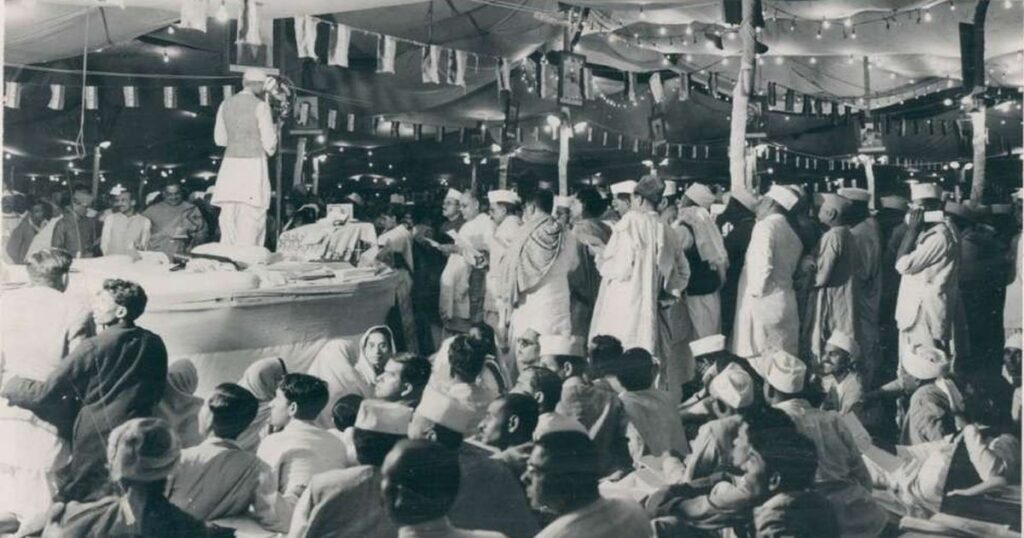
Pledge for Purna Swaraj, Jawaharlal Nehru
Comrades— for four and forty years this National Congress has laboured for the freedom of India. During this period it has somewhat slowly, but surely, awakened national consciousness from its long stupor and built up the national movement. If, today we are gathered here at a crisis of our destiny, conscious of our strength as well as of our weakness, and looking with hope and apprehension to the future, it is well that we give first thought to those who have gone before us and who spent out their lives with little hope of reward, so that those that followed them may have the joy of achievement. Many of the giants of old are not with us and we of a later day, standing on an eminence of their creation, may often decry their efforts. That is the way of the world. But none of you can forget them or the great work they did in laying the foundations of a free India. And none of us can ever forget that glorious band of men and women who, without tacking the consequences, have laid down their young lives or spent their bright youth in suffering and torment in utter protest against a foreign domination.
Many of their names even are not known to us. They laboured and suffered in silence without any expectation of public applause, and by their heart’s blood they nursed the tender plant of India’s freedom. While many of us temporized and compromised, they stood up and proclaimed a people’s right to freedom and declared to the world that India, even in her degradation, had the spark of life in her, because she refused to submit to tyranny and serfdom. Brick by brick has our national movement been built up, and often on the prostrate bodies of her martyred sons has India advanced. The giants of old may not be with us, but the courage of old is with us still and India can yet produce martyrs like Jatin Das and Wizaya. This is the glorious heritage that we have inherited and you wish to put me in charge of it. I know well that I occupy this honoured place by chance more than by your deliberate design. Your desire was to choose another — one who towers above all others in this present day world of ours — and there could have been no wiser choice. But fate and he conspired together and thrust me against your will and mine into this terrible seat of responsibility. Should I express my gratitude to you for having placed me in this dilemma? But I am grateful indeed for your confidence in one who strangely lacks it himself.
Brick by brick has our national movement been built up, and often on the prostrate bodies of her martyred sons has India advanced. The giants of old may not be with us, but the courage of old is with us still and India can yet produce martyrs like Jatin Das and Wizaya. This is the glorious heritage that we have inherited and you wish to put me in charge of it.
You will discuss many vital national problems that face us today and your decisions may change the course of Indian history. But you are not the only people that are faced with problems. The whole world today is one vast question-mark and every country and every people is in the melting pot. The age of faith, with the comfort and stability it brings, is past and there is questioning about everything, however permanent or sacred it might have appeared to our forefathers. Everywhere, there is doubt and restlessness and the foundations of the state and society are in process of transformation. Old established ideas of liberty, justice, property, and even the family are being attacked and the outcome hangs in the balance. We appear to be in a dissolving period of history when the world is in labour and out of her travail will give birth to a new order.
The future lies with America and Asia. Owing to false and incomplete history many of us have been led to think that Europe has always dominated over the rest of the world, and Asia has always let the legions of the West thunder past and plunged in thought again. We have forgotten that for millennia the legions of Asia overran Europe and modern Europe itself largely consists of the descendants of these invaders from Asia. We have forgotten that it was India that finally broke the military power of Alexander.
No one can say what the future will bring, but we may assert with some confidence that Asia and even India, will play a determining part in future world policy. The brief day of European domination is already approaching its end. Europe has ceased to be the centre of activity and interest. The future lies with America and Asia. Owing to false and incomplete history many of us have been led to think that Europe has always dominated over the rest of the world, and Asia has always let the legions of the West thunder past and plunged in thought again. We have forgotten that for millennia the legions of Asia overran Europe and modern Europe itself largely consists of the descendants of these invaders from Asia. We have forgotten that it was India that finally broke the military power of Alexander.
Thought has undoubtedly been the glory of Asia and specially of India, but in the field of action the record of Asia has been equally great. But none of us desires that the legions of Asia or Europe should overrun the continents again. We have all had enough of them.
India today is a part of a world movement. Not only China, Turkey, Persia, and Egypt but also Russia and the countries of the West are taking part in this movement, and India cannot isolate herself from it. We have our own problems — difficult and intricate — and we cannot run away from them and take shelter in the wider problems that affect the world. But if we ignore the world, we do so at our peril. Civilization today, such as it is, is not the creation or monopoly of one people or nation. It is a composite fabric to which all countries have contributed and then have adapted to suit their particular needs. And if India has a message to give to the world as I hope she has, she has also to receive and learn much from the messages of other peoples.
Few things in history are more amazing than the wonderful stability of the social structure in India, which withstood the impact of numerous alien influences and thousands of years of change and conflict. It withstood them because it always sought to absorb them and tolerate them. Its aim was not to exterminate, but to establish an equilibrium between different cultures. Aryans and non-Aryans settled down together recognizing each other’s right to their culture, and outsiders who came, like the Parsis, found a welcome and a place in the social order. With the coming of the Muslims, the equilibrium was disturbed, but India sought to restore it, and largely succeeded. Unhappily for us before we could adjust our differences, the political structure broke down, the British came and we fell.
When everything is changing it is well to remember the long course of Indian history. Few things in history are more amazing than the wonderful stability of the social structure in India, which withstood the impact of numerous alien influences and thousands of years of change and conflict. It withstood them because it always sought to absorb them and tolerate them. Its aim was not to exterminate, but to establish an equilibrium between different cultures. Aryans and non-Aryans settled down together recognizing each other’s right to their culture, and outsiders who came, like the Parsis, found a welcome and a place in the social order. With the coming of the Muslims, the equilibrium was disturbed, but India sought to restore it, and largely succeeded. Unhappily for us before we could adjust our differences, the political structure broke down, the British came and we fell.
Great as was the success of India in evolving a stable society, she failed and in a vital particular, and because she failed in this, she fell and remains fallen. No solution was found for the problem of equality. India deliberately ignored this and built up her social structure on inequality, and we have the tragic consequences of this policy in the millions of our people who till yesterday were suppressed and had little opportunity for growth.
And yet when Europe fought her wars of religion and Christians massacred each other in the name of their saviour, India was tolerant, although alas, there is little of this toleration today. Having attained some measure of religious liberty, Europe sought after political liberty, and political and legal equality. Having attained these also, she finds that they mean very little without economic liberty and equality. And so today politics have ceased to have much meaning and the most vital question is that of social and economic equality.
India also will have to find a solution to this problem and until she does so, her political and social structure cannot have stability. That solution need not necessarily follow the example of any other country. It must, if it has to endure, be based on the genius of her people and be an outcome of her thought and culture. And when it is found, the unhappy differences between various communities, which trouble us today and keep back our freedom, will automatically disappear.
What shall we gain for ourselves or for our community, if all of us are slaves in a slave country? And what can we lose if once we remove the shackles from India and can breathe the air of freedom again? Do we want outsiders who are not of us and who have kept us in bondage, to be the protectors of our little rights and privileges, when they deny us the very right to freedom? No majority can crush a determined minority and no minority can be protected by a little addition to its seats in a legislature. Let us remember that in the world today, almost everywhere a very small minority holds wealth and power and dominates over the great majority.
Indeed, the real differences have already largely gone, but fear of each other and distrust and suspicion remain and sow seeds of discord. The problem is how to remove fear and suspicion and, being intangible, they are hard to get at. An earnest attempt was made to do so last year by the All Parties’ Committee and much progress was made towards the goal. But we must admit with sorrow that success has not wholly crowned its efforts. Many of our Muslim and Sikh friends have strenuously opposed the solutions suggested and passions have been roused over mathematical figures and percentages. Logic and cold reasons are poor weapons to fight fear and distrust. Only faith and generosity can overcome them. I can only hope that the leaders of various communities will have this faith and generosity in ample measure. What shall we gain for ourselves or for our community, if all of us are slaves in a slave country? And what can we lose if once we remove the shackles from India and can breathe the air of freedom again? Do we want outsiders who are not of us and who have kept us in bondage, to be the protectors of our little rights and privileges, when they deny us the very right to freedom? No majority can crush a determined minority and no minority can be protected by a little addition to its seats in a legislature. Let us remember that in the world today, almost everywhere a very small minority holds wealth and power and dominates over the great majority.
I have no love for bigotry and dogmatism in religion and I am glad that they are weakening. Nor do I love communalism in any shape or form. I find it difficult to appreciate why political or economic rights should depend on the membership of a religious group or community. I can fully understand the right to freedom in a religion and the right to one’s culture, and in India specially, which has always acknowledged and granted these rights, it should be no difficult matter to ensure their continuance We have only to find out some way whereby we may root out the fear and distrust that darken our horizon today. The politics of a subject race are largely based on fear and hatred, and we have been too long under subjection to get rid of them easily.
The politics of a subject race are largely based on fear and hatred, and we have been too long under subjection to get rid of them easily.
I was born a Hindu but I do not know how far I am justified in calling myself one or in speaking on behalf of Hindus. But birth still counts in this country and by right of birth I shall venture to submit to the leaders of the Hindus that it should be their privilege to take the lead in generosity. Generosity is not only good morals, but is often good politics and sound expediency. And it is inconceivable to me that in a free India, the Hindus can ever be powerless. So far as I am concerned, I would gladly ask our Muslim and Sikh friends to take what they will without protest and argument from me. I know that the time is coming soon when these labels and appellations will have little meaning and when our struggle will be on an economic basis. Meanwhile, it matters little what our mutual arrangements are, provided only that we do not build up barriers which will come in the way of our future progress.
The time has indeed already come when the All Parties’ Report has to be put aside and we march forward unfettered to our goal. You will remember that the resolution of the last Congress fixed a year of grace for the adoption of the All-Parties scheme. That year is nearly over and the natural issue of that decision is for this Congress to declare in favour of independence and devise sanctions to achieve it.
Recently, there has been a seeming offer of peace. The Viceroy has stated on behalf of the British Government that the leaders of Indian opinion will be invited to confer with the government on the subject of India’s future Constitution. The Viceroy meant well and his language was the language of peace. But even a Viceroy’s goodwill and courteous phrases are poor substitutes for the hard facts that confront us. We have sufficient experience of the devious ways of British diplomacy to beware of it. The offer which the British Government made was vague and there was no commitment or promise of performance. Only by the greatest stretch of imagination could it be interpreted as a possible response to the Calcutta resolution. Many leaders of various political parties met together soon after and considered it. They gave it the most favourable interpretation, for they desired peace and were willing to go half-way to meet it. But in courteous language they made it clear what the vital conditions for its acceptance were.
Many of us who believed in independence and were convinced that the offer was only a device to lead us astray and create division in our ranks, suffered bitter anguish and were torn with doubt. Were we justified in precipitating a terrible national struggle with all its inevitable consequences of suffering for many, when there was even an outside chance of honourable peace? With much searching of heart we signed that manifesto and I know not today if we did right or wrong. Later came the explanations and amplifications in the British Parliament and elsewhere and all doubt, if doubt there was, was removed as to the true significance of the offer. Even so your Working Committee chose to keep open the door of negotiation and left it to this Congress to take the final decision.
During the last few days there has been another discussion of this subject in the British House of Commons and the Secretary of State for India has endeavoured to point out that successive governments have tried to prove, not only by words but by deeds also, the sincerity of their faith in regard to India. We must recognize Mr Wedgwood Benn’s desire to do something for India and his anxiety to secure the goodwill of the Indian people. But his speech and other speeches made in Parliament carry us no further. ‘Dominion Status in action’, to which he has drawn attention has been a snare for us and has certainly not reduced the exploitation of India.
The burdens on the Indian masses are even greater today, because of this ‘Dominion Status in action’ and the so-called constitutional reforms of ten years ago. High Commissioners in London and representatives of the League of Nations, and the purchase of stores, and Indian Governors and high officials are no parts of our demand. We want to put an end to the exploitation of India’s poor and to get the reality of power and not merely the livery of office. Mr Wedgwood Benn has given us a record of the achievements of the past decade. He could have added to it by referring to Martial Law in the Punjab and the Jallianwala Bagh shooting and the repression and exploitation that have gone on continually during this period of ‘Dominion Status in action.’ He has given us some insight into what more of Dominion Status may mean for us. It will mean the shadow of authority to a handful of Indians and more repression and exploitation of the masses.
What will this Congress do? The conditions for cooperation remain unfulfilled. Can we cooperate so long as there is no guarantee that real freedom will come to us? Can we cooperate when our comrades lie in prison and repression continues? Can we cooperate until we are assured that real peace is sought after and not merely a tactical advantage over us? Peace cannot come at the point of the bayonet, and if we are to continue to be dominated over by an alien people, let us at least be no consenting parties to it.
What will this Congress do? The conditions for cooperation remain unfulfilled. Can we cooperate so long as there is no guarantee that real freedom will come to us? Can we cooperate when our comrades lie in prison and repression continues? Can we cooperate until we are assured that real peace is sought after and not merely a tactical advantage over us? Peace cannot come at the point of the bayonet, and if we are to continue to be dominated over by an alien people, let us at least be no consenting parties to it.
If the Calcutta resolution holds, we have but one goal today, that of independence. Independence is not a happy word in the world today; for it means exclusiveness and isolation. Civilization has had enough of narrow nationalism and gropes towards a wider cooperation and inter-dependence. And if we use the word ‘independence’, we do so in no sense hostile to the larger ideal. Independence for us means complete freedom from British domination and British imperialism. Having attained our freedom, I have no doubt that India will welcome all attempts at world-cooperation and federation, and will even agree to give up part of her own independence to a larger group of which she is an equal member.
Independence is not a happy word in the world today; for it means exclusiveness and isolation. Civilization has had enough of narrow nationalism and gropes towards a wider cooperation and inter-dependence. And if we use the word ‘independence’, we do so in no sense hostile to the larger ideal. Independence for us means complete freedom from British domination and British imperialism. Having attained our freedom, I have no doubt that India will welcome all attempts at world-cooperation and federation, and will even agree to give up part of her own independence to a larger group of which she is an equal member.
The British Empire today is not such a group and cannot be so long as it dominates over millions of people and holds large areas of the world’s surface despite the will of their inhabitants. It cannot be a true commonwealth so long as imperialism is its basis and the exploitation of other races its chief means of sustenance. The British Empire today is indeed gradually undergoing a process of political dissolution. It is in a state of unstable equilibrium. The Union of South Africa is not a happy member of the family, nor is the Irish Free State, a willing one. Egypt drifts away. India could never be an equal member of the Commonwealth unless imperialism and all it implies is discarded. So long as this is not done, India’s position in the empire must be one of subservience and her exploitation will continue.
There is talk of world-peace and pacts have been signed by the nations of the world. But despite pacts, armaments grow and beautiful language is the only homage that is paid to the goddess of peace. Peace can only come when the causes of war are removed. So long as there is the domination of one country over another, or the exploitation of one class by another, there will always be attempts to subvert the existing order and no stable equilibrium can endure. Out of imperialism and capitalism peace can never come. And it is because the British Empire stands for these and bases itself on the exploitation of the masses that we can find no willing place in it. No gain that may come to us is worth anything unless it helps in removing the grievous burdens on our masses. The weight of a great empire is heavy to carry and long our people have endured it. Their backs are bent down and their spirit has almost broken. How will they share in the Commonwealth partnership if the burden of exploitation continues? Many of the problems we have to face are the problems of vested interests mostly created or encouraged by the British Government. The interests of the Rulers of Indian States, of British officials and British capital and Indian capital and of the owners of big zamindaris are ever thrust before us, and they clamour for protection. The unhappy millions who really need protection are almost voiceless and have few advocates.
We have had much controversy about independence and Dominion Status and we have quarrelled about words. But the real thing is the conquest of power by whatever name it may be called. I do not think that any form of Dominion Status applicable to India will give us real power. A test of this power would be the entire withdrawal of the alien army of occupation and economic control. Let us, therefore, concentrate on these and the rest will follow easily.
We stand therefore today, for the fullest freedom of India. This Congress has not acknowledged and will not acknowledge the right of the British Parliament to dictate to us in any way. To it we make no appeal. But we do appeal to the Parliament and the conscience of the world, and to them we shall declare, I hope, that India submits no longer to any foreign domination. Today or tomorrow, we may not be strong enough to assert our will. We are very conscious of our weakness, and there is no boasting in us or pride of strength. But let no one, least of all England, mistake or underrate the meaning or strength of our resolve. Solemnly, with full knowledge of consequences, I hope, we shall take it and there will be no turning back. A great nation cannot be thwarted for long when once its mind is clear and resolved. If today we fail and tomorrow brings no success, the day after will follow and bring achievement.
We stand therefore today, for the fullest freedom of India. This Congress has not acknowledged and will not acknowledge the right of the British Parliament to dictate to us in any way. To it we make no appeal. But we do appeal to the Parliament and the conscience of the world, and to them we shall declare, I hope, that India submits no longer to any foreign domination. Today or tomorrow, we may not be strong enough to assert our will. We are very conscious of our weakness, and there is no boasting in us or pride of strength. But let no one, least of all England, mistake or underrate the meaning or strength of our resolve. Solemnly, with full knowledge of consequences, I hope, we shall take it and there will be no turning back. A great nation cannot be thwarted for long when once its mind is clear and resolved. If today we fail and tomorrow brings no success, the day after will follow and bring achievement.
We are weary of strife and hunger for peace and opportunity to work constructively for our country. Do we enjoy the breaking up of our homes and the sight of our brave young men going to prison or facing the halter? Does the worker like going on strike to lose even his miserable pittance and starve? He does so by sheer compulsion when there is no other way for him. And we who take this perilous path of national strife do so because there is no other way to an honourable peace. But we long for peace, and the hand of fellowship will always be stretched out to all who may care to grasp it. But behind the hand will be a body which will not bend to injustice and a mind that will not surrender on any vital point.
With the struggle before us, the time for determining our future Constitution is not yet. For two years or more we have drawn up constitutions and finally the All-Parties’ Committee put a crown to these efforts by drawing up a scheme of its own which the Congress adopted for a year. The labour that went to the making of this scheme was not wasted and India has profited by it. But the year is past and we have to face new circumstances which require action rather than constitution-making. Yet we cannot ignore the problems that beset us and that will make or mar our struggle and our future constitution. We have to aim at social adjustment and equilibrium and to overcome the forces of disruption that have been the bane of India.
I must frankly confess that I am a socialist and a republican and am no believer in kings and princes, or in the order which produces the modern kings of industry, who have greater power over the lives and fortunes of men than even kings of old, and whose methods are as predatory as those of the old feudal aristocracy. I recognize, however, that it may not be possible for a body constituted as in this National Congress and in the present circumstances of the country to adopt a full socialistic programme. But we must realize that the philosophy of socialism has gradually permeated the entire structure of society the world over and almost the only points in dispute are the pace and methods of advance to its full realization. India will have to go that way too if she seeks to end her poverty and inequality, though she may evolve her own methods and may adapt the ideal to the genuine of her race.
We have three major problems, the minorities, the Indian states, and labour and peasantry. I have dealt already with the question of minorities. I shall only repeat that we must give the fullest assurance by our words and our deeds that their culture and traditions will be safe.
The Indian states cannot live apart from the rest of India and their rulers must, unless they accept their inevitable limitations, go the way of others who thought like them. And the only people who have a right to determine the future of the states must be the people of these states, including the rulers. This Congress which claims self-determination cannot deny it to the people of the states. Meanwhile, the Congress is perfectly willing to confer with such rulers as are prepared to do so and to devise means whereby the transition may not be too sudden. But in no event can the people of the states be ignored.
Our third major problem is the biggest of all. For India means the peasantry and labour and to the extent that we raise them and satisfy their wants will we succeed in our task. And the measure of the strength of our national movement will be the measure of their adherence to it. We can only gain them to our side by our espousing their cause which is really the country’s cause. The Congress has often expressed its goodwill towards them; but beyond that it has not gone. The Congress, it is said, must hold the balance fairly between capital and labour and zamindar and tenant.
But the balance has been and is terribly weighed on one side, and to maintain the status quo is to maintain injustice and exploitation. The only way to right it is to do away with the domination of any one class over another. The All-India Congress Committee accepted this ideal of social and economic change in a resolution it passed some months ago in Bombay. I hope the Congress will also set its seal on it and will further draw up a programme of such changes as can be immediately put in operation.
In this programme perhaps the Congress as a whole cannot go very far today. But it must keep the ultimate ideal in view and work for it. The question is not one merely of wages and charity doled out by an employer or landlord. Paternalism in industry or in the land is but a form of charity with all its sting and its utter incapacity to root out the evil. The new theory of trusteeship, which some advocate, is equally barren. For trusteeship means that the power for good or evil remains with the self-appointed trustee and he may exercise it as he will. The sole trusteeship that can be fair is the trusteeship of the nation and not of one individual or a group. Many Englishmen honestly consider themselves the trustees for India, and yet to what a condition they have reduced our country.
We must decide for whose benefit industry must be run and the land produce food. Today the abundance that the land produces is not for the peasant or the labourer who works on it; and industry’s chief function is supposed to be to produce millionaires. However golden the harvest and heavy the dividends, the mud-huts and hovels and nakedness of our people testify to the glory of the British Empire and of our present social system.
Our economic programme must therefore be based on a human outlook and must not sacrifice man to money. If an industry cannot be run without starving its workers, then the industry must be closed down. If the workers on the land have not enough to eat then the intermediaries who deprive them of their full share must go. The least that every worker in the field or factory is entitled to is a minimum wage which will enable him to live in moderate comfort, and human hours of labour which do not break his strength and spirit.
Our economic programme must therefore be based on a human outlook and must not sacrifice man to money. If an industry cannot be run without starving its workers, then the industry must be closed down. If the workers on the land have not enough to eat then the intermediaries who deprive them of their full share must go. The least that every worker in the field or factory is entitled to is a minimum wage which will enable him to live in moderate comfort, and human hours of labour which do not break his strength and spirit. The All-Parties’ Committee accepted the principle and included it in their recommendations. I hope the Congress will also do so and will in addition be prepared to accept its natural consequences. Further that, it will adopt the well known demands of labour for a better life, and will give every assistance to organize itself and prepare itself for the day when it can control industry on a cooperative basis.
But industrial labour is only a small part of India, although it is rapidly becoming a force that cannot be ignored. It is the peasantry that cry loudly and piteously for relief and our programme must deal with their present condition. Real relief can only come by a great change in the land-laws and the basis of the present system of land tenure. We have among us many big landowners and we welcome them. But they must realize that the ownership of large estates by individuals, which is the outcome of a state resembling the old feudalism of Europe, is a rapidly disappearing phenomenon all over the world. Even in countries which are the strongholds of capitalism, the large estates are being split up and given to the peasantry who work on them. In India also we have large areas where the system of peasant proprietorship prevails and we shall have to extend this all over the country. I hope that in doing so, we may have the cooperation of some, atleast of the big landowners.
It is not possible for this Congress at its annual session to draw up any detailed economic programme. It can only lay down some general principles and call upon the All India Congress Committee to fill in the details in cooperation with the representatives of the Trade Union Congress and other organizations which are vitally interested in this matter. Indeed, I hope that the cooperation between this Congress and the Trade Union Congress will grow and the two organizations will fight side by side in future struggles.
All these are pious hopes till we gain power, and the real problem therefore before us is the conquest of power. We shall not do so by subtle reasoning or argument or lawyers’ quibbles, but by the forging of sanction to enforce the nation’s will. To that end, this Congress must address itself.
The past year has been one of preparation for us and we have made every effort to reorganize and strengthen the Congress Organization. The results have been considerable and our organization is in a better state today than at any time since the reaction which followed the non-cooperation movement. But our weaknesses are many and are apparent enough. Mutual strife, even within Congress Committees, is unhappily too common and election squabbles drain all our strength and energy. How can we fight a great fight if we cannot get over this ancient weakness of ours and rise above our petty selves? I earnestly hope that with a strong programme of action before the country, our perspective will improve and we will not tolerate this barren and demoralizing strife.
What can this programme be? Our choice is limited, not by our own constitution, which we can change at our will but by facts and circumstances. Article one of our constitution lays down that our methods must be legitimate and peaceful. Legitimate I hope they will always be, for we must not sully the great cause for which we stand, by any deed that will bring dishonour to it and that we may ourselves regret later. Peaceful I should like them to be, for the methods of peace are more desirable and more enduring than those of violence. Violence too often brings reaction and demoralization in its train, and in our country especially it may lead to disruption. It is perfectly true that organized violence rules the world today and it may be that we could profit by its use. But we have not the material or the training for organized violence and individual or sporadic violence is a confession of despair. The great majority of us, I take it, judge the issue not on moral but on practical grounds, and if we reject the way of violence it is because it promises no substantial results.
Any great movement for liberation today must necessarily be a mass movement and mass movement must essentially be peaceful, except in times of organized revolt. Whether we have the non-cooperation of a decade ago or the modern industrial weapon of the general strike, the basis is peaceful organization and peaceful action. And if the principal movement is a peaceful one, contemporaneous attempts at sporadic violence can only distract attention and weaken it.
Any great movement for liberation today must necessarily be a mass movement and mass movement must essentially be peaceful, except in times of organized revolt. Whether we have the non-cooperation of a decade ago or the modern industrial weapon of the general strike, the basis is peaceful organization and peaceful action. And if the principal movement is a peaceful one, contemporaneous attempts at sporadic violence can only distract attention and weaken it. It is not possible to carry on at one and the same time the two movements, side by side. We have to choose and strictly to abide by our choice. What the choice of this Congress is likely to be I have no doubt. It can only choose a peaceful mass movement.
Should we repeat the programme and tactics of the non-cooperation movement? Not necessarily, but the basic idea must remain. Programmes and tactics must be made to fit in with circumstances and it is neither easy nor desirable for this Congress at this stage to determine them in detail. That should be the work of its executive, the All-India Congress Committee. But the principles have to be fixed.
The old programme was one of the three boycotts—Councils, law courts and schools—leading up to refusal of service in the army and non-payment of taxes. When the national struggle is at its height, I fail to see how it will be possible for any person engaged in it to continue in the courts or the schools. But still I think that it will be unwise to declare a boycott of the courts and schools at this stage.
The boycott of the Legislative Councils has led to much heated debate in the past and this Congress itself has been rent in twain over it. We need not revive that controversy, for the circumstances today are entirely different. I feel that the step the Congress took some years ago to permit Congressmen to enter the Councils was an inevitable step and I am not prepared to say that some good has not resulted from it. But we have exhausted that good and there is no middle course left today between boycott and noncooperation. All of us know the demoralization that these sham legislatures have brought in our ranks and how many of our good men, their committees and commissions lured away. Our workers are limited in number and we can have no mass movement unless they concentrate on it and turn their backs to the palatial Council Chambers of our Legislatures. And if we declare for independence, how can we enter the Councils, and carry on our humdrum and profitless activities there? No programme or policy can be laid down for ever, nor can this Congress bind the country or even itself to pursue one line of action indefinitely. But today I would respectfully urge the Congress that the only policy in regard to the Council is a complete boycott of them. The All-India Congress Committee recommended this course in July last and the time has come to give effect to it.
This boycott will only be a means to an end. It will release energy and divert attention to the real struggle which must take the shape of the nonpayment of taxes, where possible, with the cooperation of the labour movement, general strikes. But nonpayment of taxes must be well organized in specific areas, and for this purpose the Congress should authorize the All India Congress Committee to take the necessary action, wherever and whenever it considers desirable.
I have not so far referred to the constructive programme of the Congress. This should certainly continue but the experience of the last few years shows us that by itself it does not carry us swiftly enough. It prepares the ground for future action and ten years’ silent work is bearing fruit today. In particular we shall, I hope, continue our boycott of foreign cloth and the boycott of British goods.
Our programme must, therefore, be one of political and economic boycott. It is not possible for us, so long as we are actually independent, and even then completely, to boycott another country wholly or to sever all connection with it. But our endeavour must be to reduce all points of contact with the British Government and to rely on ourselves. We must also make it clear that India will not accept responsibility for all the debts that England has piled on her. The Gaya Congress repudiated liability to pay those debts and we must repeat this repudiation and stand by it. Such of India’s public debt as has been used for purposes beneficial to India we are prepared to admit and pay back. But we wholly deny all liability to pay back the vast sums which have been raised, so that India may be held in subjection and her burdens may be increased. In particular the poverty stricken people of India cannot agree to shoulder the burden of the wars fought by England to extend her domain and consolidate her position in India. Nor can they accept the many concessions lavishly bestowed without any proper compensation on foreign exploiters.
I have not referred so far to the Indians overseas and I do not propose to say much about them. This is not from any want of fellow-feeling with our brethren in East Africa or South Africa or Fiji or elsewhere, who are bravely struggling against great odds. But their fate will be decided in the plains of India and the struggle we are launching into is as much for them as for ourselves.
For this struggle, we want efficient machinery. Our Congress Constitution and organization have become too archaic and slow moving, and are illsuited to times of crisis. The times of great demonstrations are past. We want quiet and irresistible action now, and this can only be brought about by the strictest discipline in our ranks. Our resolutions must be passed in order to be acted upon. The Congress will gain in strength, however small its actual membership may become, if it acts in a disciplined way. Small, determined minorities have changed the fate of nations. Mobs and crowds can do little. Freedom itself involves restraint and discipline and each one of us will have to subordinate himself to the larger good.
The Congress represents no small minority in the country and though many may be too weak to join it or to work for it, they look to it with hope and longing to bring them deliverance. Ever since the Calcutta resolution, the country has waited with anxious expectation for this great day when this Congress meets. None of us can say what and when we can achieve. We cannot command success. But success often comes to those who dare and act; it seldom goes to the timid who are ever afraid of the consequences. We play for high stakes; and if we seek to achieve great things it can only be through great dangers. Whether we succeed soon or late, none but ourselves can stop us from high endeavour and from writing a noble page in our country’s long and splendid history.
Success often comes to those who dare and act; it seldom goes to the timid who are ever afraid of the consequences. We play for high stakes; and if we seek to achieve great things it can only be through great dangers. Whether we succeed soon or late, none but ourselves can stop us from high endeavour and from writing a noble page in our country’s long and splendid history.
We have conspiracy cases going on in various parts of the country. They are ever with us. But the time has gone for secret conspiracy. We have now an open conspiracy to free this country from foreign rule, and you comrades, and all our countrymen and countrywomen are invited to join it. But the rewards that are in store for you are suffering and prison and you will have done your little bit for India, the ancient, but ever young, and have helped a little in the liberation of humanity from its present bondage.
The death of God (Madras, December 1933)
MALAYAPURAM SINGARAVELU
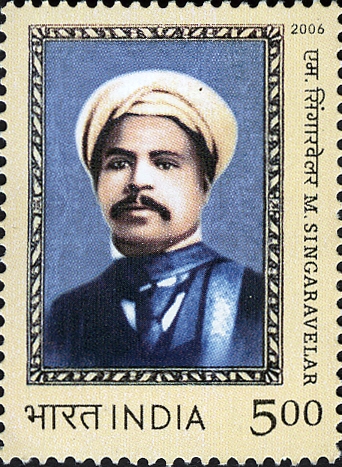
M. Singaravelu
I think this conference is the first of its kind in the whole of India. One can boldly assert that this conference will bring good to the country and people. Unfortunately some people, out of ignorance, have ridiculed this conference. As usual, theists indulge in slander. The bureaucrats try to indulge in repression under some pretext or other. But this is not a new occurrence. In the past all progressive movements have been persecuted and ridiculed.
Not content with ridiculing the progressive movement, this mad and ignorant world has always tried to stop the spread of scientific knowledge. Ingersol, the famous atheist of America was not taken note of during his lifetime and was even ridiculed. But now his birth anniversary is being celebrated in America. Bradlaugh, the British atheist, was put behind bars during his lifetime. Now what happens in Britain? Commemoration meetings in honour of Bradlaugh are being held in Britain. I am sure in due course still bigger conferences of this kind would be held in this country. It is quite likely that people may forget the names of the atheists but their ideas will remain forever in their minds.
Atheism is an ancient doctrine which originated and developed side by side with theism. When the concept of God was ushered in, alongside came the doctrine of ‘no-God’. Till the time man developed his faculty to speak, he was not aware of any God. Some of the primitive tribesmen have confessed their ignorance about God, and can aptly be called ‘primitive atheists’.
Atheism is an ancient doctrine which originated and developed side by side with theism. When the concept of God was ushered in, alongside came the doctrine of ‘no-God’. Till the time man developed his faculty to speak, he was not aware of any God. Some of the primitive tribesmen have confessed their ignorance about God, and can aptly be called ‘primitive atheists’.
In this connection it is really interesting to note the history of religion. Every religion had proclaimed that people belonging to the other religions were atheists. A non-Hindu is an atheist to a Hindu. To a Muslim any non- Muslim is an atheist. Likewise, many more people were termed as atheists. Hence, I would like to say one should really be proud to be an atheist as he is not only non-religious but also does not accept a belief in God.
As the word (God) was man’s own creation, he began to build houses (temples) for his God. Just as he respected his superiors and elders, he began to respect his God. What he did to entertain himself like music, dance, rituals, feasts, he offered to his God. Thus, God advanced as man advanced.
Some shrewd men of those days found an easy way to life and this paved the way for replacing the word with an idol. To make man live perpetually in fear of God, these men did everything possible and thus priesthood came into existence. These priests lived and thrived on the fear and ignorance of men. Thus around the single word ‘God’ the entire edifice of religious and philosophical system of rituals and prayers were built. In the course of history, many beliefs have become obsolete and I am sure that this belief, namely, theism too would become obsolete in due course.
The first and most dangerous affect of theism is that it saps the initiative of man. Ignorance take deep roots in him. People are prevented from acquiring scientific knowledge. Theism is not only a negative evil; it is positively harmful to the people.
The first and most dangerous affect of theism is that it saps the initiative of man. Ignorance take deep roots in him. People are prevented from acquiring scientific knowledge. Theism is not only a negative evil; it is positively harmful to the people. Whatever may be the future of God, we can never forget and forgive his past. It is only atheism that instills confidence in man. It is only atheism which proclaims that social and economic inequalities are only manmade. Hence, it goads man to seek out ways of removing obstacles in the way of progress. It is only atheism that proclaims to man: ‘Man, be a man. You alone can convert this earth into a paradise.’
Comrades, crucial battles are ahead of us. We cannot rest on our laurels now. Though it is put on defence, theism has not been completely routed. Power, money, propaganda, still side with theism. Further, a majority of people, out of ignorance still remain with theism and we have to redeem them. Theism alongwith power and money may over and again attempt to bar the growth and development of human initiative. A concrete example is the development of Hitlerism and fascism. Religious beliefs and other ageold obscurantist ideas are thrust down the throats of people. This is a dangerous trend. Take again some of the views expressed by Gandhiji. He is openly advocating theism. Further, he is crying to make some readjustment in the caste system, to reform it. In our view these are against the principles of atheism. The so-called removal of untouchability is a mere device to strengthen religious beliefs among the people. The untouchables numbering about six crores are economically poor and downtrodden. What they need is neither God or religion. They need a meal a day and an opportunity to earn a decent living.
Comrades, crucial battles are ahead of us. We cannot rest on our laurels now. Though it is put on defence, theism has not been completely routed. Power, money, propaganda, still side with theism. Further, a majority of people, out of ignorance still remain with theism and we have to redeem them. Theism alongwith power and money may over and again attempt to bar the growth and development of human initiative.
However, there is another danger ahead. The Hindu Mahasabha, the Sanatanis, Muslim communalists, etc., are still striving hard to capture the legislative assembly so that theism can be enthroned. These are the worst reactionaries in this unfortunate land. Beware comrades, not to lose this opportunity for contesting and capturing every seat in every village and panchayat, in every taluk and district board. Fearlessly expose the sham of casteism and oppression. Dethrone ignorance and theism. Please, enthrone atheism and socialism in its place.
The great Calcutta killings (Calcutta, September 1946)
SYAMA PRASAD MOOKERJEE
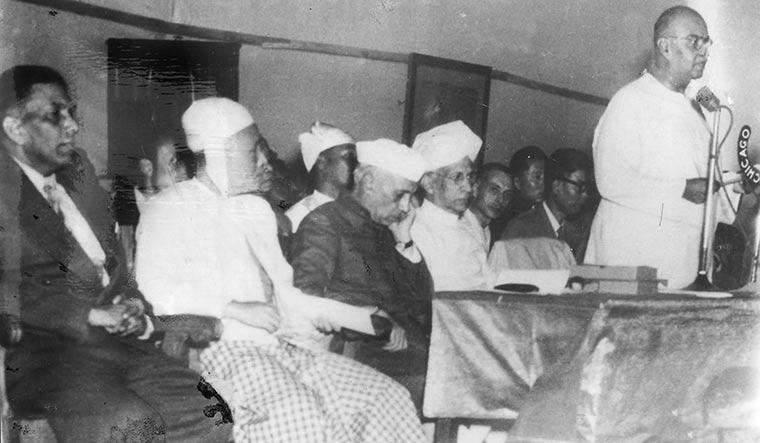
Syama Prasad Mookerjee
Sir, since yesterday we have been discussing the motions of no-confidence under circumstances, which perhaps have no parallel in the deliberations of any Legislature in any part of the civilized world. What happened in Calcutta is without a parallel in modern history. St Bartholomew’s Day of which history records some grim events of murder and butchery pales into insignificance compared to the brutalities that were committed in the streets, lanes and bye-lanes of this first city of British India. We have been discussing, Sir, as to the genesis of these disturbances. Time will not permit me to go through the detailed history and course of events during the last few years.
But let me say this that what has happened is not the result of a sudden explosion, but it is the culmination of an administration, inefficient, corrupt and communal, which has disfigured the life of this great Province. But so far as the immediate cause is concerned, rightly reference has been made by members belonging to the Muslim League and also to the Opposition that we have to look to the resolution that was passed at Bombay at the all-India session of the Council of the Muslim League. Now what happened there? It is said, on behalf of the Muslim League that the Cabinet Mission proved faithless to Muslim interests and thereby created a situation which had no parallel in the history of Anglo-Muslim relationship in this country. What did actually the Cabinet Mission do? The Muslim League, the spoilt and pampered child of the British imperialists for the last thirty years, was disowned for the first time by the British Labour Government…(loud noise from the government benches)…I know it that members when they hear the bitter truth, can hardly repress their feelings. Sir, the fact remains that the old policy of the British Government of no advancement without a Congress-Muslim League agreement was for the first time given up in I946…(loud cries from the government benches)…I have only stated the fact and I do not make any comment on it and still my friends become impatient immediately. Now, the fact remains that the Muslim League was bypassed and the Interim Government has been formed at the Centre. Supposing Mr Jinnah had been asked to form the Interim Government without the Congress, would my friends belonging to the Muslim League have then blamed the government for having betrayed the interests of the Hindu community?
But let me say this that what has happened is not the result of a sudden explosion, but it is the culmination of an administration, inefficient, corrupt and communal, which has disfigured the life of this great Province. But so far as the immediate cause is concerned, rightly reference has been made by members belonging to the Muslim League and also to the Opposition that we have to look to the resolution that was passed at Bombay at the all-India session of the Council of the Muslim League.
Sir, what happened after the Bombay resolution? I have before me a summary of the speeches delivered by distinguished spokesmen on behalf of the Muslim League in every part of India and although it was said that the Direct Action Day itself was not the day for commencing direct action, it was at the same time pointed out that the war had begun, the days of peace and compromise were over and now the jehad … (A member from the Government Benches: Against whom?) War against everyone who did not accept Pakistan. That has been made abundantly clear.
I would ask my friends not to misunderstand me. I am trying to put in brief their point of view as I would ask them also to appreciate our point of view. We are like poles asunder. You say you will plunge the country Pakistan by any means whatsoever. These two points of view are irreconcilable and what I am now telling the House is this that the members speaking on behalf of the Muslim League did not mince matters. Muslim leaders want Civil War. Only a pattern of civil war, according to Mr Jinnah, was witnessed in this very city of Calcutta, but whether civil war will ultimately help Muslims to get Pakistan or not is a matter that remains yet to be seen. It is said that British Imperialists are against the Muslim League. Why talk rot in this way? Who gave you separate electorate and communal award? Who is helping the Sind ministry to remain in power? Is not the Governor a British Governor? Are not the three European members of the Sind Assembly British members of that House? Are they not trying their level best somehow to keep the Muslim League in power and not allow the Congress to go to office although among the Indian members they are in a majority?
Now, Sir, I shall leave this aside. I shall not refer to the detailed speeches which have been delivered by the Muslim League leaders barring one or two illustrative remarks. When Mr Jinnah was confronted at a preconference in Bombay on the 31st July and was asked whether direct action involved violence or non-violence, his cryptic reply was ‘I am not going to discuss ethics’. (The Hon’ble Mr Muhammad Ali: Good.) But Khwajah Nazimuddin was not so good. He came out very bluntly in Bengal and he said that Muslims did not believe in non-violence at all, Muslims knew what direct action meant and there were one hundred and one ways in which this was made clear by responsible League leaders. One said in the Punjab that the zero hour had struck and that the war had begun. All this was followed by a series of articles and statements which appeared in the columns of newspapers— the Morning News, the Star of India, and the Azad. If you read those documents, particularly I would ask my friend Mr Ispahani if he reads those documents, I do not know whether he had learnt Bengali yet, if not, for his benefit a translation can be made of the Bengali article in Azad, he will be able to find out that there was nothing but open and direct incitement to violence. Hatred of Hindus and jehad on the Hindu were declared in highly charged language. That was the background. I am not going to quote the papers, for I have not the time. You have read them and the general Muslim public have acted according to the instructions.
Now, so far as the later events are concerned, what happened on the 16th of August. What were the preparations made? Mr Ispahani says that they were taken unaware. In the Morning News on the 16th there appeared an announcement on behalf of the ‘Pakistan’ Ambulance Corps and there full instructions were given as to how the Ambulance Corps was to act—mind you, Sir, this was done before the troubles started. This ‘Pakistan Ambulance Corps’ was to be utilized in different parts of the city; they were to go out in batches, cars and officers ‘would be available’ and from the 17th morning announcement was to be made every hour as regards the patients who were to be found in the different hospitals of Calcutta. This was announced before any trouble started in Calcutta and Mr Ispahani says there was no preparation. Of course it was sheer bad luck that you allowed this notice, among many kinds of preparations, to be published in the newspapers.
Now, Sir, what happened on the 16th? I shall not refer to the detailed speeches of other members. But I shall certainly hold responsible the Chief Minister of this province who lost his mental balance by saying in Bombay that he was going to declare Bengal to be an independent state. A minister who cannot control his British underling — the Commissioner of Police — is going to make Bengal an independent state! A minister who comes forward and says ‘I am helpless, I could not save the people of the city because the Commissioner of Police would not listen to me’ will declare Bengal an independent state! Now, that was Mr Suhrawardy. He said he was going to carry on a no-rent campaign in this province. He was going to disobey law and order. His speech before the Legislative Council goes to show that he knew fully well that troubles were ahead. If you analyse his speech it will appear that he knew that troubles were brewing and he said he wanted to be as careful as possible.
Now, Sir, what happened on the 16th? I shall not refer to the detailed speeches of other members. But I shall certainly hold responsible the Chief Minister of this province who lost his mental balance by saying in Bombay that he was going to declare Bengal to be an independent state. A minister who cannot control his British underling — the Commissioner of Police — is going to make Bengal an independent state!
I am not raising the question in this debate as to how many Hindus were butchered or how many Muslims were butchered in Bhawanipore, Taltolla, or Watgunge. That is not the issue. The question in issue today is, did government succeed in protecting life and property; not to which community that life and property belonged? Why did government allow so many Muslim lives to be butchered if you look upon Mr Suhrawardy as the great Muslim champion? Why did he allow the entire administration of law and order to collapse in the city? I shall say, Sir, it was a diabolical plan. I say Sir, there was a well-organized plan to make a lightning attack on the city that would take Hindus by surprise, properties were going to be looted and lives were going to be lost. Then Mr Suhrawardy found that he was caught in his own trap when he and others were hit back in their own coin. He could not regain his lost ground and failed to do what his Muslim brethren asked him to do in agony and distress.
I am not raising the question in this debate as to how many Hindus were butchered or how many Muslims were butchered in Bhawanipore, Taltolla, or Watgunge. That is not the issue. The question in issue today is, did government succeed in protecting life and property; not to which community that life and property belonged?
On the 16th, our case is that provocation came from the other side, their case is that provocation came from the Hindu side. That also I am not going to discuss today. Let us leave that for the time being, but let us proceed to the next stage. Mr Suhrawardy said by 12 noon he realized the situation was very bad. Was he not still the Chief Minister of Bengal? What did he do at that time? Why was not the military called out at that time? I have got here a circular issued by the military for the information of its officers and employees in which clear information is given that the military was ready to come out on Friday noon but it was not asked to do so. The civil police failed to protect the life and property as it was expected to do and whenever the military was asked to come out, it came out and it did whatever it could do. But, alas, thousands had been killed meanwhile and crores of rupees looted!
On Friday Mr Suhrawardy knew that trouble had broken out— no matter whether the Hindus were the aggressors or the Muslims were, why did he allow the whole city to be placed at the mercy of goondas, dacoits and murderers? Why did he allow the meeting at all to be held at the maidan in the afternoon over which he presided? He stands charged with the deliberate offence of having played havoc with the life and property of the citizens of this great city, no matter whether they were Hindus or they were Muslims. On Friday night he gave a message to the Associated Press that the condition in the city had improved. Does he remember it? It seems that the Associated Press went to the next day’s newspapers. I would ask my friends to forget for the time being that they belong to the Muslim League. If Mr Suhrawardy says ‘no’, here, Sir, is the statement of Mr H.S. Suhrawardy, Chief Minister of Bengal— I suppose that is the gentleman sitting over there (laughter) interviewed by the Associated Press of India to the effect that the situation was improving. (Uproar) (A voice from the government benches: What paper?) Every newspaper. (Renewed uproar.) I would ask my friends that they must observe the rules of the game and fairplay even in a discussion like this. Why don’t you ask the Chief Minister to explain this?
Mr Speaker, you can certainly look into it. I am not afraid of the truth. Yes, Sir, (Sent the paper to Mr Speaker.) I can produce it to anyone who wants to see it. Now, Sir, Section l44 is supposed to have been promulgated on Friday but was never enforced.
Then on Saturday the curfew order was inaugurated, but neither Section 144 nor the curfew order was enforced. How is it that in spite of Section 144 and the curfew order people were moving about committing loot and plunder, and murder even? How is it that within a stone’s throw, Mr Ispahani has pointed out, from Lalbazar police station shops were looted, people were murdered and all sorts of offences were committed without the Police moving an inch?
Of course, you are responsible. If you have got the guts to say that you are not responsible, let us know that. Now, Sir, that was on the 16th and 17th August. Later on what happened? Mr Suhrawardy knows it very well that he was telling a double-faced lie. On the 23rd he issued a broadcast message, a message of peace for the people of Bengal and within half an hour of that he sent out a special message for the foreign press through foreign correspondents and the things which are mentioned in that document are entirely different from the broadcast message which he issued to the people of Bengal. Can he deny that? (A voice from the Government Benches: That is obvious). He has stated that the Hindus have started the riot. (The Hon’ble Mr H.S. Suhrawardy: Certainly.) He has said that it is the Hindus, who are to blame. He said it was the British Government which was to blame. Say ‘certainly’ (laughter) and lastly, he said that he cannot yet tell what will happen in future if the Interim Government continues in office. Now, Sir, if that is the remark which he wanted to make on that day what was the use of his appealing to the people of Bengal for peace and harmony and saying ‘I have kept an open mind and I would like Hindus and Muslims to work together’. Can history give us a better example of a double-faced minister?
Sir, there are two matters here which may be mentioned. Mr Suhrawardy said that he could not control the Commissioner of Police because he was not under his orders. I shall give you, Sir, one instance out of many which are available from which it will appear how Mr Suhrawardy interfered with the administration of the police offices in a manner which was unworthy of any Home Minister of any Province. In the Park Street police station about seven goondas were taken by a European Inspector on Sunday evening. Sir, that is the remark which Mr Suhrawardy has made namely, ‘I am sorry you are a goonda then.’ I do not know who they are. These persons were found with looted properties. If Mr Suhrawardy says that Muslim gentlemen took away looted properties I shall bow down my head to him, but if he says that I am a goonda then I too can say that he is the best goonda that is available not only in this Province but throughout the world.
(Uproar)
Sir, I shall withdraw it as soon as Mr Suhrawardy withdraws what he has said about me. (Cries of ‘withdraw, withdraw’ from the government benches). Let him withdraw first, what he first has said about me.
Now I withdraw too. Now, Sir, let me pass on. So far as the Park Street incident is concerned, the important point is that goondas or gentlemen whoever they were, seven Muslims who were found in possession of looted properties were brought into Park Street police-station by a European Inspector. Within ten minutes Mr H.S. Suhrawardy appears on the scene. He gets these persons released. It is on record. Let him deny that. (The Hon’ble Mr H.S. Suhrawardy: Yes). (Cries of ‘shame, shame’ from Congress benches.) Then he comes back (Mr H.S. Suhrawardy: Oh! no). This is the way, Sir, in which Mr Suhrawardy has behaved. This is one instance I am giving. (Cries of ‘you have cooked it’ from government benches). No, I have not cooked it. He himself has admitted it.
Then, Sir, the Muslim League party wanted 500 gallons of petrol from the Bengal Government. That was not granted, but petrol coupons were issued in the name of individual ministers — general coupons — 100 gallons being issued in the name of the Chief Minister. Evidence is available that these coupons were used by lorries moving in the streets of Calcutta on those fateful days. That is how arrangements were being made under the very nose of the Home Department over which Mr Suhrawardy was presiding. Can Mr Suhrawardy deny that he himself went to Howrah accompanied by some Muslim League leaders, met local officers in authority there, and had chastized and taken them to task because Muslims were not protected there? Can he deny that? Did Mr Suhrawardy give in any place or at any time the same sort of protection to the suffering Hindus. (The Hon’ble Mr H.S. Suhrawardy: Certainly). Now, Sir, it is quite clear that at least I have said some home truths which have made my friends opposite angry and impatient.
Sir, they, these ministers, have taken oath of allegiance to the British Crown and they are responsible for the life and property of all alike. My friend, Mr Muhammad Ali, admitted this very candidly when the adjournment motion was not allowed to be taken up in this House. Mr Suhrawardy is a great Muslim League leader and he owes his allegiance to the Muslim League. The Muslim League rightly or wrongly ordered that if something does not happen to its liking, it was going to resort to direct action. One cannot serve two masters. Sir, it has been proved beyond doubt that Mr Suhrawardy and his other Ministers are unable to administer the affairs of this Province impartially and efficiently. They have failed hopelessly and wretchedly and on that ground alone they are not fit to occupy offices for a single moment (Interruptions).
Sir, it is not in Calcutta alone that atrocities were committed in a large scale, but we find that troubles are spreading now in the whole of Bengal. The information which is coming from different parts of Bengal would make one shudder to think as to what will happen to this province. These gentlemen, the ministers over there, should not remain in charge of the affairs of this province even a day longer.
Sir, it is not in Calcutta alone that atrocities were committed in a large scale, but we find that troubles are spreading now in the whole of Bengal. The information which is coming from different parts of Bengal would make one shudder to think as to what will happen to this province. These gentlemen, the ministers over there, should not remain in charge of the affairs of this province even a day longer. (Interruptions) If they remain in office the future would be darker still. (Interruptions) The Council of Action of the All-India Muslim League has ordered that preparations have to be made for giving effect to the Direct Action Program. Already Muslim League leaders from the Punjab, North-West Frontier Province and also Sind have openly declared that they are ready with their scheme which can be put into operation at 24 hours’ notice. Am I to believe that the Muslim League in Bengal which is a stronghold of Mr Jinnah’s Muslim League is not similarly prepared to give effect to the order of the Muslim League when the occasion demands it? In other words, my charge is that the present Ministry is utilizing the government machinery for the purpose of launching upon a Direct Action scheme. (The Hon’ble Mr H.S. Suhrawardy: No). Mr Suhrawardy is playing a dual role and this dual role of Mr Suhrawardy and those who are supporting him has got to be exposed and brought to an end in the interest of peace and tranquility.
Why does not the Chief Minister get the reports of the Commissioner of Police through the Criminal Investigation Department as regards some meetings which took place in the city? Mr Suhrawardy has perhaps got the proceedings confidentially of the meetings which were held in the cities where League leaders were invited to attend for the purpose of preparing scheme for direct action. If he has got any report about what happened on the 16th, he will find that even when the Calcutta maidan meeting was being held, over which Mr Suhrawardy presided, disturbances had broken out in several places. Now what happened in that meeting? Was there then any CID officer present taking down notes? Where are those notes?
Sir, it was an astonishing fact that a gun shop within 2 minutes walk from the Government House had been looted. Not a single policeman turned up in the streets to control the situation in any part of the city. It will not help merely making the Commissioner of Police a scapegoat, it is suggested that the city had been ablaze in so many places that the Commissioner of Police did not know how to act. But surely Mr Suhrawardy knew how and when to act. (The Hon’ble Mr H.S. Suhrawardy: Yes, yes). Mr Suhrawardy says that he knew and we also know when he acted. If he had failed without making any effort, then he is charged with criminal negligence and if he failed in spite of efforts, he is certainly inefficient and worthless, and he should not be kept in that position any longer. There is no place for him in the ministry.
Sir, there is one point which I would like to say with regard to the Britishers in this House. My friends are remaining neutral. I cannot understand this attitude at all. In a situation such as this they must decide if the ministry was right or the ministry was wrong. If the ministry was right, support them and if the ministry was wrong, you should say so boldly and not remain neutral merely sitting on the fence which shows signs of abject impotence (Laughter).
If a single Britisher, man or woman or a child, had been strong enough they would have thrown this ministry out of office without hesitation, but because no Britisher was touched so they can take an impartial and neutral view! Are they so sure they will be left untouched next time? There is no question of partiality or impartiality here. The present administration has failed and it must come to an end. Anyone who remains neutral is an aider and abettor.
My friend, Mr Gladding, said that luckily none of his people were injured. It is true, Sir, but that is a statement which makes me extremely sorry. If a single Britisher, man or woman or a child, had been strong enough they would have thrown this ministry out of office without hesitation, but because no Britisher was touched so they can take an impartial and neutral view! Are they so sure they will be left untouched next time? There is no question of partiality or impartiality here. The present administration has failed and it must come to an end. Anyone who remains neutral is an aider and abettor.
I would ask my friends, what about the future. Pakistan will not be accepted under any circumstance. (Mr Fazlur Rahman: It will be accepted). Mr Suhrawardy said in Bombay after the 16th of August, ‘When a nation fights against another nation I cannot guarantee civilized conduct.’ If you are a nation fighting against us, another nation, if that is the attitude of my friends on the other side, then they cannot remain in office any longer. (Cries of ‘Hear, hear’ from the Opposition Benches). Mr Suhrawardy must realize that his office is meant for the good of the entire people of Bengal irrespective of caste, creed and religion, and not for his own so-called ‘nation’. I would say, Sir, that is an abject treachery to the great responsibility that rests on Mr Suhrawardy, as Premier (Interruptions).
Apparently I said many good things, otherwise my friends would not be so jubilant. The Chief Minister was dancing the other day on the polished floor of a Delhi Hotel and I have made my friends dance on the floor of this House. I will now say a few words in connection with the future. What about the future? My friends, the Muslims, say that they constitute 25 percent of India’s population, and that is so big a minority that they will never agree to live under 75 percent Hindu domination. Now if that is their honest and genuine point of view how can they expect that 45 percent of the Hindu population of this Province will ever agree to live under a Constitution where that particular nation represented by Muslims, constituting only of 55 percent, will alone dominate? (The Hon’ble Mr Shamsuddin Ahmed: That is how the trouble began). I will not today enter into controversies as regards the real population of Bengal. I claim it that if a proper census is taken even today the Hindus will not be in a minority but that question cannot be settled by argument from one side or the other. My Muslim friends who are well-organized under the banner of the Muslim League have got to realize that if Bengal is to be ruled peacefully it can be done only with the willing cooperation of the two communities. I am not talking of all India politics for the time being. (The Hon’ble Mr Shamsuddin Ahmed: Why not? What has happened to all India politics?) I would make this appeal to my friends that a choice has to be made by the Hindus and the Muslims together. There is no way out of it because what we witnessed in Calcutta was not an ordinary communal riot: its motive was political, but things may become even far more serious and drastic in the days, weeks and months to come. Now, if the Muslims of Bengal under the leadership of the Muslim League feel that they can exterminate the Hindus, that is a fantastic idea which can never be given effect to: three and a half crores can never exterminate three crores nor can three crores exterminate three and a half crores.
Sir, if it is said that civil war will break out throughout India, will that help anyone, will that help, in particular, 25 percent. Muslims throughout India as against 75 percent of Hindus and other non-Muslims. It is not a question of threat at all; it is a question of facing a stern reality. Either we have to fight or we have to come to some settlement. The settlement cannot be reached so long as you say that one community will dominate over the other, but it can only be reached by a plan which will enable the vast majority of Hindus and Muslims to live under circumstances which will give freedom and peace to the common man.
Now, Sir, if it is said that civil war will break out throughout India, will that help anyone, will that help, in particular, 25 percent. Muslims throughout India as against 75 percent of Hindus and other non-Muslims. It is not a question of threat at all; it is a question of facing a stern reality. Either we have to fight or we have to come to some settlement. The settlement cannot be reached so long as you say that one community will dominate over the other, but it can only be reached by a plan which will enable the vast majority of Hindus and Muslims to live under circumstances which will give freedom and peace to the common man. After all, forget not who suffered most during the Calcutta Killing. It as mainly the poorer people, both amongst the Hindus and the Muslims. Ninety percent of them were poor and innocent and if the leaders lose their heads and go creating a situation which they cannot ultimately control, the time will soon come when the common man will turn round and crush the leaders instead of being themselves crushed. It is therefore vitally necessary that this false and foolish idea of Pakistan or Islamic rule has to be banished for ever from your head. In Bengal we have got to live together. We say as a condition precedent this ministry must go. Only then can we create a state of affairs which will make it possible to build a future Bengal which will be for the good of all, irrespective of any caste, creed, or community.
Opening address to the Constituent Assembly of Pakistan (Karachi, August 1947)
MUHAMMAD ALI JINNAH
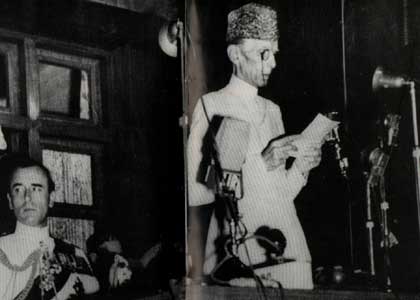
Jinnah speaking at the Constituent Assembly of Pakistan on 14 August 1947
Mr President, Ladies and Gentlemen!
I cordially thank you, with the utmost sincerity, for the honor you have conferred upon me — the greatest honour that is possible for this Sovereign Assembly to confer — by electing me as your first President. I also thank those leaders who have spoken in appreciation of my services and their personal references to me. I sincerely hope that with your support and your cooperation we shall make this Constituent Assembly an example to the world. The Constituent Assembly has got two main functions to perform. The first is the very onerous and responsible task of framing our future Constitution of Pakistan and the second is functioning as a full and complete sovereign body as the Federal Legislature of Pakistan. We have to do the best we can in adopting a provisional constitution for the Federal Legislature of Pakistan. You know really that not only we ourselves are wondering but, I think, the whole world is wondering at this unprecedented cyclonic revolution which has brought about the plan of creating and establishing two independent sovereign dominions in this subcontinent. As it is, it has been unprecedented; there is no parallel in the history of the world. This mighty subcontinent with all kinds of inhabitants has been brought under a plan which is titanic, unknown, unparalleled. And what is very important with regard to it is that we have achieved it peacefully and by means of an evolution of the greatest possible character.
Dealing with our first function in this Assembly, I cannot make any well considered pronouncement at this moment, but I shall say a few things as they occur to me. The first and the foremost thing that I would like to emphasize is this: Remember that you are now a sovereign legislative body and you have got all the powers. It, therefore, places on you the gravest responsibility as to how you should take your decisions. The first observation that I would like to make is this: You will no doubt agree with me that the first duty of a government is to maintain law and order, so that the life, property and religious beliefs of its subjects are fully protected by the state.
Remember that you are now a sovereign legislative body and you have got all the powers. It, therefore, places on you the gravest responsibility as to how you should take your decisions. The first observation that I would like to make is this: You will no doubt agree with me that the first duty of a government is to maintain law and order, so that the life, property and religious beliefs of its subjects are fully protected by the state.
The second thing that occurs to me is this: One of the biggest curses from which India is suffering — I do not say that other countries are free from it, but, I think, our condition is much worse — is bribery and corruption. That really is a poison. We must put that down with an iron hand and I hope that you will take adequate measures as soon as it is possible for this Assembly to do so.
Black-marketing is another curse. Well, I know that black-marketeers are frequently caught and punished. Judicial sentences are passed or sometimes fines only are imposed. Now you have to tackle this monster which today is a colossal crime against society, in our distressed conditions, when we constantly face shortage of food and other essential commodities of life. A citizen who does black-marketing commits, I think, a greater crime than the biggest and most grievous of crimes. These black-marketeers are really knowing, intelligent and ordinarily responsible people, and when they indulge in black-marketing, I think they ought to be very severely punished, because they undermine the entire system of control and regulation of foodstuffs and essential commodities, and cause wholesale starvation and want and even death.
The next thing that strikes me is this: Here again it is a legacy which has been passed on to us. Alongwith many other things, good and bad, has arrived this great evil—the evil of nepotism and jobbery. This evil must be crushed relentlessly. I want to make it quite clear that I shall never tolerate any kind of jobbery, nepotism or any influence directly or indirectly brought to bear upon me. Whenever I will find that such a practice is in vogue or is continuing anywhere, low or high, I shall certainly not countenance it.
Now, if we want to make this great State of Pakistan happy and prosperous we should wholly and solely concentrate on the well-being of the people, and especially of the masses and the poor. If you will work in cooperation, forgetting the past, burying the hatchet, you are bound to succeed. If you change your past and work together in a spirit that every one of you, no matter to what community he belongs, no matter what relations he had with you in the past, no matter what is his colour, caste or creed, is first, second and last a citizen of this state with equal rights, privileges and obligations, there will be no end to the progress you will make.
I know there are people who do not quite agree with the division of India and the partition of the Punjab and Bengal. Much has been said against it, but now that it has been accepted, it is the duty of every one of us to loyally abide by it and honourably act according to the agreement which is now final and binding on all. But you must remember, as I have said, that this mighty revolution that has taken place is unprecedented. One can quite understand the feeling that exists between the two communities wherever one community is in majority and the other is in minority. But the question is, whether it was possible or practicable to act otherwise than what has been done. A division had to take place. On both sides, in Hindustan and Pakistan, there are sections of people who may not agree with it, who may not like it, but in my judgment there was no other solution and I am sure future history will record its verdict in favour of it. And what is more, it will be proved by actual experience as we go on that it was the only solution of India’s constitutional problem. Any idea of a united India could never have worked and in my judgment it would have led us to terrific disaster. May be that view is correct; may be it is not; that remains to be seen. All the same, in this division it was impossible to avoid the question of minorities being in one dominion or the other. Now that was unavoidable. There is no other solution. Now what shall we do? Now, if we want to make this great State of Pakistan happy and prosperous we should wholly and solely concentrate on the well-being of the people, and especially of the masses and the poor. If you will work in cooperation, forgetting the past, burying the hatchet, you are bound to succeed. If you change your past and work together in a spirit that every one of you, no matter to what community he belongs, no matter what relations he had with you in the past, no matter what is his colour, caste or creed, is first, second and last a citizen of this state with equal rights, privileges and obligations, there will be no end to the progress you will make.
I cannot emphasize it too much. We should begin to work in that spirit and in course of time all these angularities of the majority and minority communities, the Hindu community and the Muslim community—because even as regards Muslims you have Pathans, Punjabis, Shias, Sunnis, and so on and among the Hindus you have Brahmins, Vaishnavas, Khatris, also Bengalees, Madrasis, and so on—will vanish. Indeed if you ask me this has been the biggest hindrance in the way of India to attain the freedom and independence and but for this we would have been free peoples long, long ago. No power can hold another nation, and specially a nation of 400 million souls in subjection; nobody could have conquered you, and even if it had happened, nobody could have continued its hold on you for any length of time but for this. Therefore, we must learn a lesson from this. You are free; you are free to go to your temples, you are free to go to your mosques or to any other place of worship in this State of Pakistan. You may belong to any religion or caste or creed—that has nothing to do with the business of the state. As you know, history shows that in England, conditions some time ago, were much worse than those prevailing in India today. The Roman Catholics and the Protestants persecuted each other. Even now there are some states in existence where there are discriminations made and bars imposed against a particular class. Thank God, we are not starting in those days. We are starting in the days when there is no discrimination, no distinction between one community and another, no discrimination between one caste or creed and another. We are starting with this fundamental principle that we are all citizens and equal citizens of one state. The people of England in course of time had to face the realities of the situation and had to discharge the responsibilities and burdens placed upon them by the government of their country and they went through that fire step by step. Today, you might say with justice that Roman Catholics and Protestants do not exist; what exists now is that every man is a citizen, an equal citizen of Great Britain and they are all members of the Nation.
Now, I think we should keep that in front of us as our ideal and you will find that in course of time Hindus would cease to be Hindus and Muslims would cease to be Muslims, not in the religious sense, because that is the personal faith of each individual, but in the political sense as citizens of the state. Well, gentlemen, I do not wish to take up any more of your time and thank you again for the honour you have done to me. I shall always be guided by the principles of justice and fairplay without any, as is put in the political language, prejudice or ill-will, in other words, partiality or favouritism. My guiding principle will be justice and complete impartiality, and I am sure that with your support and cooperation, I can look forward to Pakistan becoming one of the greatest nations of the world.
Now, I think we should keep that in front of us as our ideal and you will find that in course of time Hindus would cease to be Hindus and Muslims would cease to be Muslims, not in the religious sense, because that is the personal faith of each individual, but in the political sense as citizens of the state.
I have received a message from the United States of America addressed to me. It reads:
I have the honour to communicate to you, in Your Excellency’s capacity as President of the Constituent Assembly of Pakistan, the following message which I have just received from the Secretary of State of the United States:
On the occasion of the first meeting of the Constituent Assembly for Pakistan, I extend to you and to the members of the Assembly, the best wishes of the Government and the people of the United States for the successful conclusion of the great work you are about to undertake.
Jama Masjid Speech (Delhi, 1947)
MAULANA ABUL KALAM AZAD
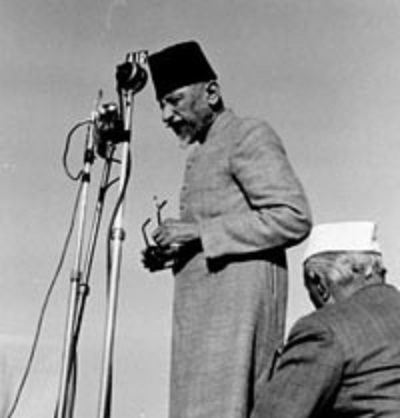
Maulana Abul Kalam Azad
My brethren,
You know what has brought me here today. This congregation at Shahjahan’s historic mosque is not an unfamiliar sight for me. Here, I have addressed you on several previous occasions. Since then we have seen many ups and downs. At that time, instead of weariness, your faces reflected serenity, and your hearts, instead of misgivings, exuded confidence. The uneasiness on your faces and the desolation in your hearts that I see today, reminds me of the events of the past few years.
Do you remember? I hailed you, you cut off my tongue; I picked my pen, you severed my hand; I wanted to move forward, you broke off my legs; I tried to run, and you injured my back. When the bitter political games of the last seven years were at their peak, I tried to wake you up at every danger signal. You not only ignored my call but revived all the past traditions of neglect and denial. As a result the same perils surround you today, whose onset had previously diverted you from the righteous path.
Today, mine is no more than an inert existence or a forlorn cry; I am an orphan in my own motherland. This does not mean that I feel trapped in the original choice that had made for myself, nor do I feel that there is no room left for my ashiana (nest). What it means is that my cloak is weary of your impudent grabbing hands. My sensitivities are injured, my heart is heavy. Think for one moment. What course did you adopt? Where have you reached, and where do you stand now? Haven’t your senses become torpid? Aren’t you living in a constant state of fear? This fear is your own creation, a fruit of your own deeds.
Today, mine is no more than an inert existence or a forlorn cry; I am an orphan in my own motherland. This does not mean that I feel trapped in the original choice that had made for myself, nor do I feel that there is no room left for my ashiana (nest). What it means is that my cloak is weary of your impudent grabbing hands. My sensitivities are injured, my heart is heavy.
It was not long ago when I warned you that the two-nation theory was death-knell to a meaningful, dignified life; forsake it. I told you that the pillars upon which you were leaning would inevitably crumble. To all this you turned a deaf ear. You did not realize that, my brothers! I have always attempted to keep politics apart from personalities, thus avoiding those thorny valleys. That is why some of my messages are often couched in allusions. The Partition of India was a fundamental mistake. The manner in which religious differences were incited, inevitably, led to the devastation that we have seen with our own eyes. Unfortunately, we are still seeing it at some places.
There is no use recounting the events of the past seven years, nor will it serve any good. Yet, it must be stated that the debacle of Indian Muslims is the result of the colossal blunders committed by the Muslim League’s misguided leadership. These consequences however, were no surprise to me; I had anticipated them from the very start.
Now that Indian politics has taken a new direction, there is no place in it for the Muslim League. Now the question is whether or not we are capable of constructive thinking. For this, I have invited the Muslim leaders of India to Delhi, during the second week of November.
The gloom cast upon your lives is momentary; I assure you we can be beaten by none save our own selves! I have always said, and I repeat it again today; eschew your indecisiveness, your mistrust, and stop your misdeeds. This unique triple-edged weapon is more lethal than the two-edged iron sword which inflicts fatal wounds, which I have heard of.
The gloom cast upon your lives is momentary; I assure you we can be beaten by none save our own selves! I have always said, and I repeat it again today; eschew your indecisiveness, your mistrust, and stop your misdeeds. This unique triple-edged weapon is more lethal than the two-edged iron sword which inflicts fatal wounds, which I have heard of.
Just think about the life of escapism that you have opted for, in the sacred name of Hejrat. Get into the habit of exercising your own brains, and strengthening your own hearts. If you do so, only then will you realize how immature your decisions were.
Where are you going and why? Raise your eyes. The minarets of Jama Masjid want to ask you a question. Where have you lost the glorious pages from your chronicles? Wasn’t it only yesterday that on the banks of the Jamuna, your caravans performed wazu? Today, you are afraid of living here. Remember, Delhi has been nurtured with your blood. Brothers, create a basic change in yourselves. Today, your fear is misplaced as your jubilation was yesterday.
The words coward and frenzy cannot be spoken in the same breath as the word Muslim. A true Muslim can be swayed neither by avarice nor apprehension. Don’t get scared because a few faces have disappeared. The only reason they had herded you in a single fold was to facilitate their own flight. Today, if they have jerked their hand free from yours, what does it matter? Make sure that they have not run away with your hearts. If your hearts are still in the right place, make them the abode of God. Some thirteen hundred years ago, through an Arab ummi, God proclaimed, “Those who place their faith in God and are firm in their belief, no fear for them nor any sorrow.” Winds blow in and blow out: tempests may gather but all this is short-lived. The period of trial is about to end. Change yourselves as if you had never been in such an abject condition.
I am not used to altercation. Faced with your general indifference, however, I will repeat that the third force has departed, and along with it, its trappings of vanity. Whatever had to happen has happened. If your hearts have still not changed and your minds still have reservations, it is a different matter. But, if you want a change, then take your cue from history, and cast yourself in the new mould. Having completed a revolutionary phase, there still remains a few blank pages in the history of India. You can make ourselves worthy of filling those pages, provided you are willing.
Brothers, keep up with the changes. Don’t say, “We are not ready for the change.” Get ready. Stars may have plummeted down but the sun is still shining. Borrow a few of its rays and sprinkle them in the dark caverns of your lives.
Brothers, keep up with the changes. Don’t say, “We are not ready for the change.” Get ready. Stars may have plummeted down but the sun is still shining. Borrow a few of its rays and sprinkle them in the dark caverns of your lives.
I do not ask you to seek certificates from the new echelons of power. I do not want you to lead a life of sycophancy as you did during the foreign rule. I want you to remind you that these bright etchings which you see all around you, are relics of processions of your forefathers. Do not forget them. Do not forsake them. Live like their worthy inheritors, and, rest assured, that if you do not wish to flee from this scene, nobody can make you flee. Come, today let us pledge that this country is ours, we belong to it and any fundamental decisions about its destiny will remain incomplete without our consent.
Today, you fear the earth’s tremors; once you were virtually the earthquake itself. Today, you fear the darkness; once your existence was the epicenter of radiance. Clouds have poured dirty waters and you have hitched up your trousers. Those were none but your forefathers who not only plunged headlong into the seas, but trampled the mountains, laughed at the bolts of lightning, turned away the tornadoes, challenged the tempests and made them alter their course. It is a sure sign of a dying faith that those who had once grabbed the collars of emperors, are today clutching their own throats. They have become oblivious of the existence of God as if they had never believed in Him.
Brothers, I do not have a new prescription for you. I have the same old prescription that was revealed to the greatest benefactor of mankind, the prescription of the Holy Quran: “Do not fear and do not grieve. If you possess true faith, you will gain the upper hand.”
Brothers, I do not have a new prescription for you. I have the same old prescription that was revealed to the greatest benefactor of mankind, the prescription of the Holy Quran: “Do not fear and do not grieve. If you possess true faith, you will gain the upper hand.”
The congregation is now at an end. What I had to say, I have said, briefly. Let me say once again, keep a grip on your senses. Learn to create your own surroundings, your own world. This is not a commodity that I can buy for you from the market-place. This can be bought only from the market-place of the heart, provided you can pay for it with the currency of good deeds.
May God’s grace be on you!
ARCHIVE
Jinnah to Nehru – 17 March 1938
New Delhi,
17 March 1938
Dear Pandit Jawaharlal,
I have received your letter of the 8th of March 1938. Your first letter of the 18th of January conveyed to me that you desire to know the points in dispute for the purpose of promoting Hindu-Muslim unity. When in reply I said the subject matter cannot be solved through correspondence and it was equally undesirable as discussing matters in the press you, in your reply of the 4th of February, formulated a catalogue of grievances with regard to my supposed criticism of the Congress and utterances which are hardly relevant to the question for our immediate consideration. You went on persisting on the same line and you are still of opinion that those matters, although not germane to the present subject, should be further discussed, which I do not propose to do as I have already explained to you in my previous letter.
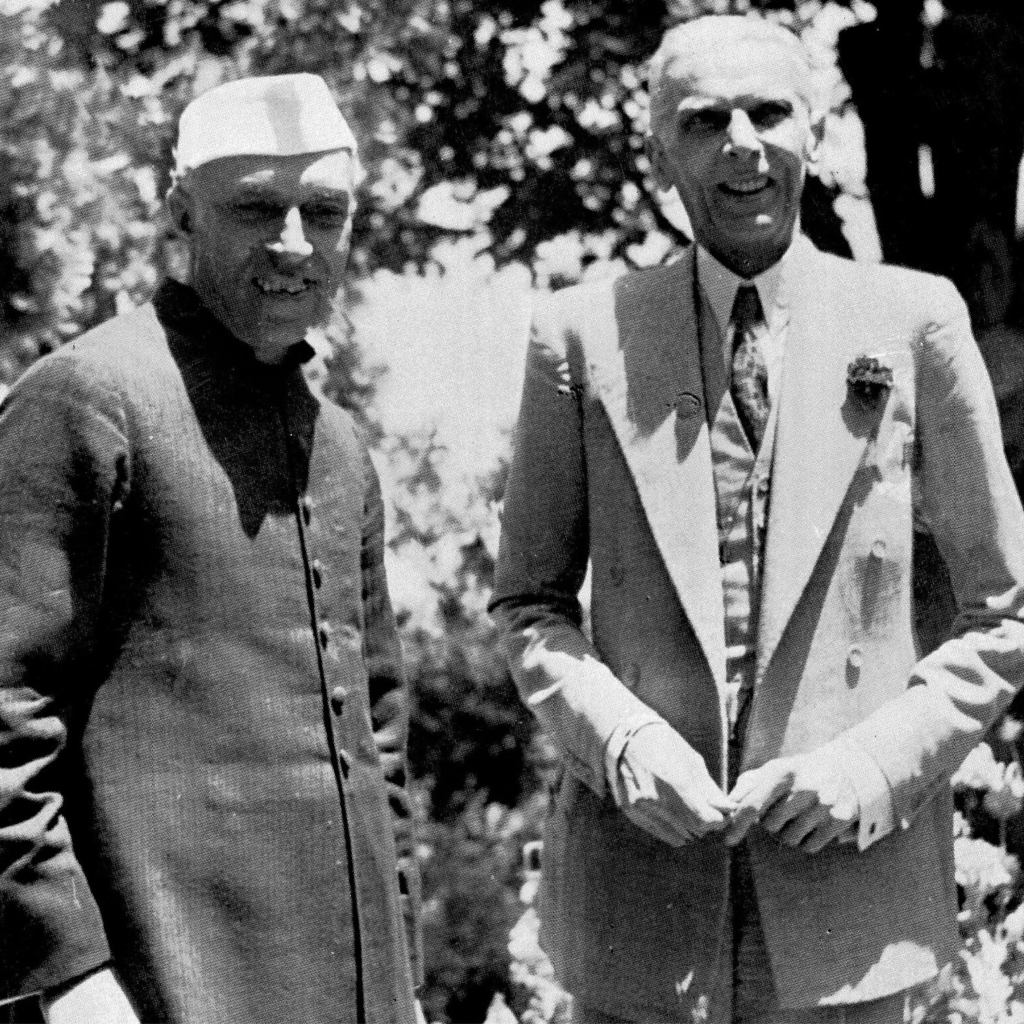
Jawaharlal Nehru and Muhammad Ali Jinnah
The question with which we started, as I understood, is of safeguarding the rights and the interests of the Mussalmans with regard to their religion, culture, language, personal laws and political rights in the national life, the government and the administration of the country. Various suggestions have been made which will satisfy the Mussalmans and create a sense of security and confidence in the majority community. I am surprised when you say in your letter under reply, ‘But what are these matters which are germane? It may be that I am dense or not sufficiently acquainted with the intricacies of the problem. If so, I deserve to be enlightened. If you will refer me to any recent statement made in the press or platform which will help me in understanding, I shall be grateful.’ Perhaps you have heard of the Fourteen Points.
Next, as you say, ‘Apart from this much has happened during these past few years which has altered the position.’ Yes, I agree with you, and various suggestions have appeared in the newspapers recently. For instance, if you will refer to the Statesman, dated the 12th of February 1938, there appears an article under the heading ‘Through “Muslim Eyes’ (copy enclosed for your convenience). Next, an article in the New Times, dated the 1st of March 1938, dealing with your pronouncement recently made, I believe at Haripura sessions of the Congress, where you are reported to have said: ‘I have examined this so-called communal question through the telescope, and if there is nothing what can you see.
This article in the New Times appeared on the 1st of March 1938, making numerous suggestions (copy enclosed for your convenience). Further you must have seen Mr Aney’s interview where he warned the Congress mentioning some of the points which the Muslim League would demand.
I consider it is the duty of every true nationalist, to whichever party or community he may belong to make it his business and examine the situation and bring about a pact between the Mussalmans and the Hindus and create a real united front and it should be as much your anxiety and duty as it is mine, irrespective of the question of the party or the community to which we belong.
Now, this is enough to show to you that various suggestions that have been made, or are likely to be made, or are expected to be made, will have to be analysed and ultimately I consider it is the duty of every true nationalist, to whichever party or community he may belong to make it his business and examine the situation and bring about a pact between the Mussalmans and the Hindus and create a real united front and it should be as much your anxiety and duty as it is mine, irrespective of the question of the party or the community to which we belong. But if you desire that I should collect all these suggestions and submit to you as a petitioner for you and your colleagues to consider, I am afraid I can’t do it nor can I do it for the purpose of carrying on further correspondence with regard to those various points with you. But if you still insist upon that, as you seem to do so when you say in your letter, ‘My mind demands clarity before it can function effectively or think in terms of any action. Vagueness or an avoidance of real issues could not lead to satisfactory results. It does seem strange to me that in spite of my repeated requests I am not told what issues have to be discussed.’ This is hardly a correct description or a fair representation, but in that case I would request you to ask the Congress officially to communicate with me to that effect, and I shall place the matter before the Council of the All-India Muslim League; as you yourself say that you are ‘not the Congress President and thus have not the same representative capacity but if I can be of any help on this matter my services are at the disposal of the Congress and I shall gladly meet you and discuss these matters with you’. As to meeting you and discussing matters with you, I need hardly say that I shall be pleased to do so.
Yours sincerely,
M.A. Jinnah
[Enclosure I to the above letter]
Through Muslim Eyes
By Ain-el-Mulk
Pandit Jawaharlal Nehru’s Bombay statement of January 2 on the Hindu-Moslem question has produced hopeful reactions and the stage has been set for a talk between the leaders of what, for the sake of convenience, may be described as Hindu India and Moslem India. Whether the Jinnah-Jawaharlal talks will produce in 1938 better results than the Jinnah-Prasad talks did in 1935 is yet to be seen. Too much optimism would not, however, be justified. The Pandit, by way of annotating his Bombay statement while addressing the UP delegates for Haripura at Lucknow, at the end of January, emphatically asserted that in no case would Congress ‘give up its principles’. That was not a hopeful statement because any acceptable formula or pact that may be evolved by the leaders of the Congress and the League would, one may guess, involve the acquiescence of the Congress in separate electorates (at least for a certain period), coalition ministries, recognition of the League as the one authoritative and representative organization of Indian Moslems, authoritative and representative organization of Indian Moslems, modification of its attitude on the question of Hindi and its script, scrapping of Bande Mataram altogether, and possibly a redesigning of the tricolour flag or at least agreeing to give the flag of the League an equal importance. It is possible that with a little statesmanship on both sides agreement can be reached on all these points without any infringement of the principles of either, but the greatest obstacle to a satisfactory solution would still remain, in the shape of the communalists of the Mahasabha, and the irreconcilables of Bengal, all of whom are not of the Mahasabha alone.”
The right of the Congress to speak in the name of Hindus has been openly challenged and even the Jinnah-Prasad formula which did not satisfy the Moslems – and nothing on the lines of which is now likely to satisfy them – has been vehemently denounced by the Bengal Provincial Conference held at Vishnupur which recently passed an extremely communal resolution, and that the latest utterances of the Congress President-elect on the communal situation generally and the Jinnah-Prasad formula in particular show some restraint. The only thing for Moslems to do in the circumstances is to wait and hope for the best, without relaxing their efforts to add daily to the strength of the League, for it will not do to forget that it is the growing power and representative character of the Muslim League which has compelled Congress leaders to recognize the necessity for an understanding with the Moslem community.
The Statesman, New Delhi Edition, 12 February 1938.
[Enclosure II to the above letter]
The Communal Question
In its last session at Haripura, the Indian National Congress passed a resolution for assuring minorities of their religious and cultural rights. The resolution was moved by Pandit Jawaharlal Nehru and was carried. The speech which Pandit Jawaharlal Nehru made on this occasion was as bad as any speech could be. If the resolution has to be judged in the light of that speech, then it comes to this that the resolution has been passed not in any spirit of seriousness, but merely as a meaningless assurance to satisfy the foolish minorities who are clamouring ‘for the satisfaction of the communal problem’. Mr Jawaharlal Nehru proceeded on the basis that there was really no communal question. We should like to reproduce the trenchant manner in which he put forward the proposition. He said: ‘I have examined the so-called communal question through the telescope and, if there is nothing, what can you see.’ It appears to us that it is the height of dishonesty to move a resolution with these premises.
We should like to tell Pandit Jawaharlal Nehru that he has completely misunderstood the position of the Muslim minority and it is a matter of intense pain that the President of an All-India organization, which claims to represent the entire population of India, should be so completely ignorant of the demands of the Muslim minority.
If there is no minority question, why proceed to pass a resolution? Why not state that there is no minority question? This is not the first time that Pandit Jawaharlal Nehru has expressed his complete inability to understand or see the communal question. When replying to a statement of Mr Jinnah, he reiterated his conviction that in spite of his best endeavour to understand what Mr Jinnah wanted, he could not get at what he wanted. He seems to think that with the Communal Award, which the Congress has opposed, the seats in the Legislature have become assured and now nothing remains to be done. He repeats the offensive statement that the Communal Award is merely a problem created by the middle or upper classes for the sake of few seats in the Legislature or appointments in Government service or for Ministerial positions. We should like to tell Pandit Jawaharlal Nehru that he has completely misunderstood the position of the Muslim minority and it is a matter of intense pain that the President of an All-India organization, which claims to represent the entire population of India, should be so completely ignorant of the demands of the Muslim minority. We shall set forth below some of the demands so that Pandit Jawaharlal Nehru may not have any occasion hereafter to say that he does not know what more the Muslims want. The Muslim demands are:
1. That the Congress shall henceforth withdraw all opposition to the Communal Award and should cease to prate about it as if it were a negation of nationalism. It may be a negation of nationalism but if the Congress has announced in its statement that it is not opposing the Communal Award, the Muslims want that the Congress should at least stop all agitation for the recession of the Communal Award.
2. The Communal Award merely settles the question of the representation of the Muslims and of other minorities in the Legislatures of the country. The further question of the representation of the minorities in the services of the country remains. Muslims demand that they are as much entitled to be represented in the services of their motherland as the Hindus and since the Muslims have come to realize by their bitter experience that it is impossible for any protection to be extended to Muslim rights in the matter of their representation in the services, it is necessary that the share of the Muslims in the services should be definitely fixed in the constitution and by statutory enactment so that it may not be open to any Hindu head of any department to ride roughshod over Muslim claims in the name of ‘Efficiency’. Pandit Jawaharlal Nehru knows that in the name of efficiency and merit, the rights of Indians to man the services of their country was denied by the bureaucracy. Today when Congress is in power in seven Provinces, the Muslims have a right to demand the Congress leaders that they shall unequivocally express themselves in this regard.
3 Muslims demand that the protection of their Personal Law and their culture shall be guaranteed by the statute. And as an acid test of the sincerity of Pandit Jawaharlal Nehru and the Congress in this regard, Muslims demand that the Congress should take in hand the agitation in connection with the Shahidganj Mosque and should use its moral Pressure to ensure that the Shahidganj Mosque is restored to its original position and that the Sikhs desist from profane uses and thereby injuring the religious susceptibilities of the Muslims.
4. Muslims demand that their right to call Azan and perform religious ceremonies shall not be fettered in any way. We should like to tell Pandit Jawaharlal Nehru that in a village, in the Kasur Tehsil, of the Lahore District, known as Raja Jang, the Muslim inhabitants of that place are not allowed by the Sikhs to call out their Azans loudly. With such neighbours it is necessary to have a statutory guarantee that the religious rights of the Muslims shall not be in any way interfered with and on the advent of Congress rule to demand of the Congress that it shall use its powerful organization for the prevention of such an event. In this connection we should like to tell Pandit Jawaharlal Nehru that the Muslims claim cow slaughter as one of their religious rights and demand that so long as the Sikhs are permitted to carry on Jhatka and to live on Jhatka, the Muslims have every right to insist on their undoubted right to slaughter cows. Pandit Jawaharlal Nehru is not a very great believer in religious injunctions. He claims to be living on the economic plane and we should like Pandit Jawaharlal Nehru to know that for a Muslim the question of cow slaughter is a measure of economic necessity and that therefore it [is] not open to any Hindu to statutorily prohibit the slaughter of cows.
5. Muslims demand that their majorities in the Provinces in which they are at present shall not be affected by any territorial redistributions or adjustments. The Muslims are at present in majority in the provinces of Bengal, Punjab, Sind, North West Frontier Province and Baluchistan. Let the Congress hold out the guarantee and express its readiness to the incorporation of this guarantee in the Statute that the present distribution of the Muslim population in the various provinces shall not be interfered with through the medium of any territorial distribution or re-adjustment.
6. The question of the national anthem is another matter. Pandit Jawaharlal Nehru cannot be unaware that Muslims all over have refused to accept the Bande Mataram or any expurgated addition of that anti-Muslim song as a binding national anthem. If Pandit Jawaharlal Nehru cannot succeed in inducing the Hindu majority to drop the use of this song, then let him not talk so tall, and let him realize that the great Hindu mass does not take him seriously except as a strong force to injure the cause of Muslim solidarity.
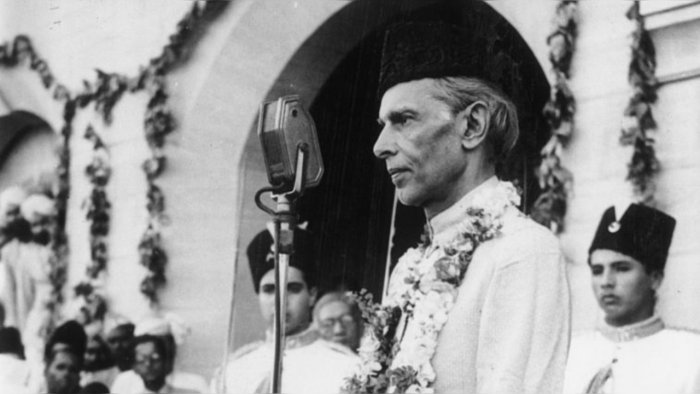
Muhammad Ali Jinnah
7. The question of language and script is another demand of the Muslims. The Muslims insist on Urdu being practically their national language; they want statutory guarantees that the use of [the] Urdu tongue shall not in any wiser manner be curtailed or damaged.
8. The question of the representation of the Muslims in the local bodies is another unsolved question. Muslims demand that the principle underlying the Communal Award, namely, separate electorates and representation according to population strength should apply uniformly in all the various local and other elected bodies from top to bottom.
We can go on multiplying this list but for the present we should like to know the reply of the Congress and Pandit Jawaharlal Nehru to the demands that we have set forth above. We should like Pandit Jawaharlal Nehru fully to understand that the Muslims are more anxious than the Hindus to see complete independence in the real sense of that term established in India. They do not believe in any Muslim Raj for India and will fight a Hindu Raj tooth and nail. They stand for the complete freedom of the country and of all classes inhabiting this country, but they shall oppose the establishment of any majority raj of a kind that will make a clean sweep of the cultural, religious and political guarantees of the various minorities as set forth above. Pandit Jawaharlal Nehru is under the comforting impression that the question set forth above are trivial questions but he should reconsider his position in the light of the emphasis and importance which the minorities which are affected by the programme of the Congress place on these matters. After all it is the minorities which are to judge and not the majorities. It appears to us that with the attitude of mind which Pandit Jawaharlal Nehru betrayed in his speech and which the seconder of that resolution equally exhibited in his speech, namely, that the question of minorities and majorities was an artificial one and created to suit vested interests, it is obvious that nothing can come out of the talks that Pandit Jawaharlal Nehru recently initiated between himself and Mr Jinnah. If the Congress is in the belief that this reiteration of its inane pledge to the minorities will satisfy them and that they will be taken in by mere words, the Congress is badly mistaken.
New Times, Lahore, 1 March 1938
Nehru to Jinnah – 6 April 1938
Calcutta,
6 April 1938
Dear Mr Jinnah,
Your last letter of the 17th March reached me in the Kumaun hills where I had gone for a brief holiday. From there I have come to Calcutta. I propose to return to Allahabad today and I shall probably be there for the greater part of April. If it is convenient for you to come there we could meet. Or if it suits you better to go to Lucknow I shall try to go there.
I am glad that you have indicated in your last letter a number of points which you have in mind. The enclosures you have sent mention these and I take it that they represent your viewpoint. I was somewhat surprised to see this list as I had no idea that you wanted to discuss many of these matters with us. Some of these are wholly covered by previous decisions of the Congress, some others are hardly capable of discussion.
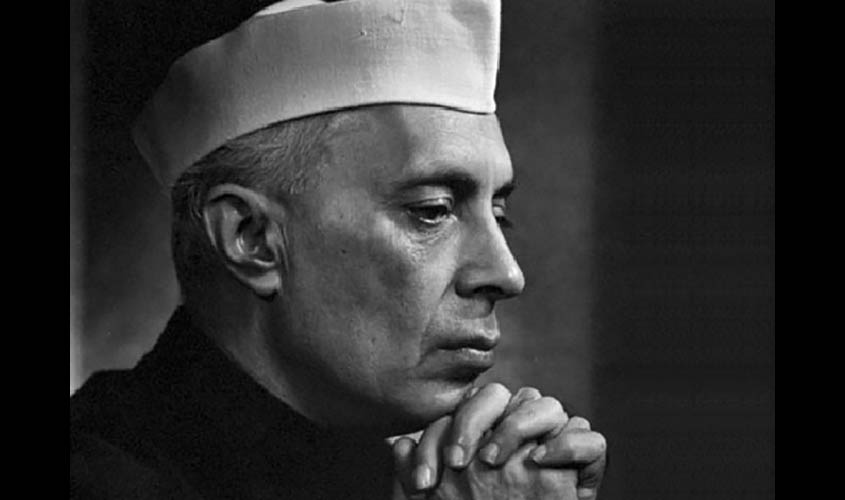
Jawaharlal Nehru
As far as I can make out from your letter and the enclosures you have sent, you wish to discuss the following matters:
1. The Fourteen Points formulated by the Muslim League in 1929.
2. The Congress should withdraw all opposition to the Communal Award and should not describe it as a negation of nationalism.
3. The share of the Muslims in the state services should be definitely fixed in the Constitution by statutory enactment.
4. Muslim Personal Law and culture should be guaranteed by Statute.
5. The Congress should take in hand the agitation in connection with the Shahidganj Mosque and should use its moral pressure to enable the Muslims to gain possession of the mosque.
6. The Muslim’s right to call Azan and perform religious ceremonies should not be fettered in any way.
7. Muslims should have freedom to perform cow-slaughter.
8. Muslim majorities in the Provinces, where such majorities exist at present, must not be affected by any territorial redistribution or adjustments.
9. The Bande Mataram song should be given up.
10. Muslims want Urdu to be the national language of India and they desire to have statutory guarantees that the use of Urdu shall not be curtailed or damaged.
11. Muslim representation in the local bodies should be governed by the principles underlying the Communal Award, that is separate electorates and population strength.
12. The tricolour flag should be changed or, alternatively, the flag of the Muslim League should be given equal importance.
13. Recognition of the Muslim League as the one authoritative and representative organization of Indian Muslims.
14. Coalition ministries.
It is further stated that the formula evolved by you and Babu Rajendra Prasad in 1935 does not satisfy the Muslims now and nothing on those lines will satisfy them. It is added that the list given above is not a complete list and that it can be augmented by the addition of further ‘demands’. Not knowing these possible and unlimited additions I can say nothing about them. But I should like to deal with the various matters specifically mentioned and to indicate what the Congress attitude has been in regard to them.
But before considering them, the political and economic background of the free India we are working for has to be kept in mind, for ultimately that is the controlling factor. Some of these matters do not arise in considering an independent India or take a particular shape or have little importance. We can discuss them in terms of Indian independence or in terms of the British dominance of India continuing. The Congress naturally thinks in terms of independence, though it adjusts itself occasionally to the pressure of transitional and temporary phases. It is thus not interested in amendments to the present constitution, but aims at its removal and its substitution by a constitution framed by the people through a Constituent Assembly.
But before considering them, the political and economic background of the free India we are working for has to be kept in mind, for ultimately that is the controlling factor. Some of these matters do not arise in considering an independent India or take a particular shape or have little importance. We can discuss them in terms of Indian independence or in terms of the British dominance of India continuing. The Congress naturally thinks in terms of independence, though it adjusts itself occasionally to the pressure of transitional and temporary phases. It is thus not interested in amendments to the present constitution, but aims at its removal and its substitution by a constitution framed by the people through a Constituent Assembly.
Another matter has assumed an urgent and vital significance and this is the exceedingly critical international situation and the possibility of war. This must concern India greatly and affect her struggle for freedom. This must therefore be considered the governing factor of the situation and almost everything else becomes of secondary importance, for all our efforts and petty arguments will be of little avail if the very foundation is upset. The Congress has clearly and repeatedly laid down its policy in the event of such a crisis and stated that it will be no party to imperialist war. The Congress will very gladly and willingly cooperate with the Muslim League and all other organizations and individuals in the furtherance of this policy.
I have carefully looked through the various matters to which you have drawn attention in your letter and its enclosures and I find that there is nothing in them which refers to or touches the economic demands of the masses or affects the all-important questions of poverty and unemployment. For all of us in India these are the vital issues and unless some solution is found for them, we function in vain. The question of state services, howsoever important and worthy of consideration it might be, affects a very small number of people. The peasantry, industrial workers, artisans and petty shop-keepers form the vast majority of the population and they are not improved in any way by any of the demands listed above. Their interests should be paramount.
Many of the ‘demands’ involve changes of the constitution which we are not in a position to bring about. Even if some such changes are desirable in themselves, it is not our policy to press for minor constitutional changes. We want to do away completely with the present constitution and replace it by another for a free India.
In the same way, the desire for statutory guarantees involves constitutional changes which we cannot give effect to. All we can do is to state that in a future constitution for a free India we want certain guarantees to be incorporated. We have done this in regard to religious, cultural, linguistic and other rights of minorities in the Karachi resolution on fundamental rights. We would like these fundamental rights to be made a part of the constitution.
I now deal with the various matters listed above.
1. The Fourteen Points, I had thought, were somewhat out of date. Many of their provisions have been given effect to by the Communal Award and in other ways, some others are entirely acceptable to the Congress; yet others require constitutional changes which, as I have mentioned above, are beyond our present competence. Apart from the matters covered by the Communal Award and those involving a change in the constitution, one or two matters remain which give rise to differences of opinion and which are still likely to lead to considerable argument.
2. The Congress has clearly stated its attitude towards the Communal Award, and it comes to this that it seeks alterations only on the basis of mutual consent of the parties concerned. I do not understand how anyone can take objection to this attitude and policy. If we are asked to describe the Award as not being anti-national, that would be patently false. Even apart from what it gives to various groups, its whole basis and structure are anti-national and come in the way of the development of national unity. As you know it gives an overwhelming and wholly underserving weightage to the European elements in certain parts of India. If we think in terms of an independent India, we cannot possibly fit in this Award with it. It is true that under stress of circumstances we have sometimes to accept as a temporary measure something that is on the face of it anti-national. It is also true that in the matters governed by the Communal Award we can only find a satisfactory and abiding solution by the consent and goodwill of the parties concerned. That is the Congress policy.
3. The fixing of the Muslims’ share in the state services by statutory enactment necessarily involves the fixing of the shares of other groups and communities similarly. This would mean a rigid and compartmental state structure which will impede progress and development. At the same time it is generally admitted that state appointments should be fairly and adequately distributed and no community should have cause to complain. It is far better to do this by convention and agreement. The Congress is fully alive to this issue and desires to meet the wishes of various groups in the fullest measure so as to give to all minority communities, as stated in No. 11 of the Fourteen Points, ‘an adequate share in all the services of the state and in local self-governing bodies having due regard to the requirements of efficiency’. The state today is becoming more and more technical and demands expert knowledge in its various departments. It is right that, if a community is backward in this technical and expert knowledge, special efforts should be made to give it this education to bring it up a to higher level.
I understand that at the Unity Conference held at Allahabad in 1933 or thereabouts, a mutually satisfactory solution of this question of state services was arrived at.
4. As regards protection of culture, the Congress has declared its willingness to embody this in the fundamental laws of the constitution. It has also declared that it does not wish to interfere in any way with the personal law of any community.
5. I am considerably surprised at the suggestions that the Congress should take in hand the agitation in connection with the Shahidganj Mosque. That is a matter to be decided either legally or by mutual agreement. The Congress prefers in all such matters the way of mutual agreement and its services can always be utilized for this purpose where there is no opening for them and a desire to this effect on the part of the parties concerned. I am glad that the Premier of the Punjab has suggested that this is the only satisfactory way to a solution of the problem.
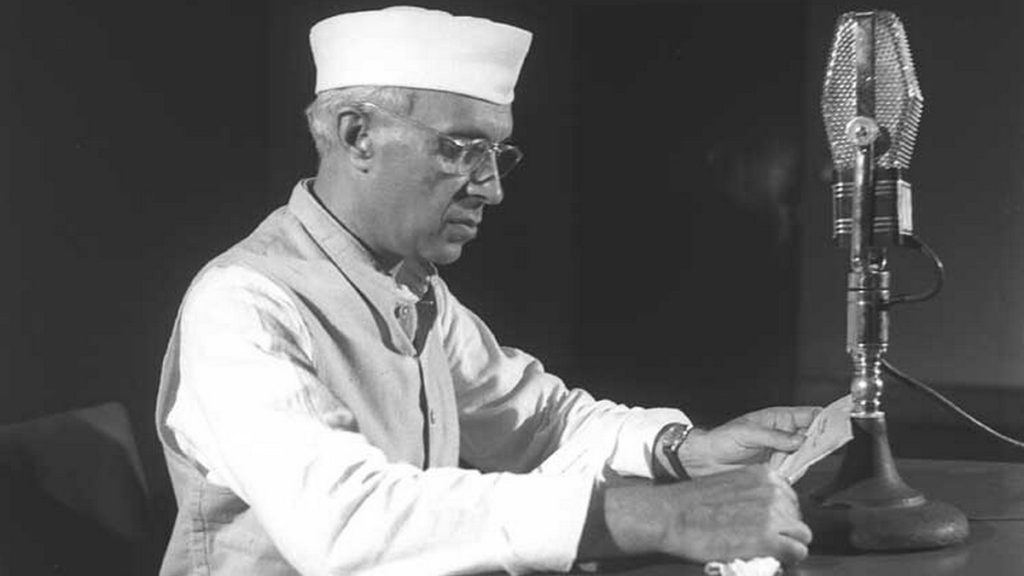
Jawaharlal Nehru
6. The right to perform religious ceremonies should certainly be guaranteed to all communities. The Congress resolution about this is quite clear. I know nothing about the particular incident relating to a Punjab village which has been referred to. No doubt many instances can be gathered together from various parts of India where petty interferences take place with Hindu, Muslim or Sikh ceremonies. These have to be tactfully dealt with wherever they arise. But the principle is quite clear and should be agreed to.
7. As regards cow-slaughter there has been a great deal of entirely false and unfounded propaganda against the Congress suggesting that the Congress was going to stop it forcibly by legislation. The Congress does not wish to undertake any legislative action in this matter to restrict the established rights of the Muslims.
8. The question of territorial distribution has not arisen in any way. If and when it arises it must be dealt with on the basis of mutual agreement of the parties concerned.
9. Regarding the Bande Mataram song the Working Committee issued a long statement in October last to which I would invite your attention. First of all, it has to be remembered that no formal national anthem has been adopted by the Congress at any time. It is true, however, that the Bande Mataram song has been intimately associated with Indian nationalism for more than thirty years and numerous associations of sentiment and sacrifice have gathered round it. Popular songs are not made to order, nor can they be successfully imposed. They grow out of public sentiment. During all these thirty or more years the Bande Mataram song was never considered as having any religious significance and was treated as a national song in praise of India. Nor, to my knowledge, was any objection taken to it except on political grounds by the Government. When, however, some objections were raised, the Working Committee carefully considered the matter and ultimately decided to recommend that certain stanzas, which contained certain allegorical references, might not be used on national platforms or occasions. The two stanzas that have been recommended by the Working Committee for use as a national song have not a word or a phrase which can offend anybody from any point of view and I am surprised that anyone can object to them. They may appeal to some more than to others. Some may prefer another national song. But to compel large numbers of people to give up what they have long valued and grown attached to is to cause needless hurt to them and injure the national movement itself. It would be improper for a national organization to do this.
10. About Urdu and Hindi I have previously written to you and have also sent you my pamphlet on ‘The Question of Language’. The Congress has declared in favour of guarantees for languages and culture. I want to encourage all the great provincial languages of India and at the same time to make Hindustani, as written both in the Nagri and Urdu scripts, the national language. Both scripts should be officially recognized and the choice should be left to the people concerned. In fact this policy is being pursued by the Congress Ministries.
About Urdu and Hindi I have previously written to you and have also sent you my pamphlet on ‘The Question of Language’. The Congress has declared in favour of guarantees for languages and culture. I want to encourage all the great provincial languages of India and at the same time to make Hindustani, as written both in the Nagri and Urdu scripts, the national language. Both scripts should be officially recognized and the choice should be left to the people concerned.
11. The Congress has long been of opinion that joint electorates are preferable to separate electorates from the point of view of national unity and harmonious co-operation between the different communities. But joint electorates, in order to have real value, must not be imposed on unwilling groups. Hence the Congress is quite clear that their introduction should depend on their acceptance by the people concerned. This is the policy that is being pursued by the Congress Ministries in regard to Local bodies. Recently in a Bill dealing with local bodies introduced in the Bombay Assembly, separate electorates were maintained but an option was given to the people concerned to adopt a joint electorate, if they so chose. This principle seems to be in exact accordance with No. 5 of the Fourteen Points, which lays down that ‘representation of communal groups shall continue to be by means of separate electorate as at present, provided that it shall be open to any community, at any time, to abandon its separate electorate in favour of joint electorate’. It surprises me that the Muslim League group in the Bombay Assembly should have opposed the Bill with its optional clause although this carried out the very policy of the Muslim League.
May I also point out that in the resolution passed by the Muslim League in 1929, at the time it adopted the Fourteen Points, it was stated that ‘the Mussalmans will not consent to join electorates unless Sind is actually constituted into a separate province and reforms in fact are introduced in the NWF Province and Baluchistan on the same footing as in other provinces’. Since then Sind has been separated and the NWF Province has been placed on a level with other provinces. So far as Baluchistan is concerned the Congress is committed to a levelling up of this area in the same way.
12. The national tricolour flag was adopted originally in 1929 by the Congress after full and careful consultation with eminent Muslim, Sikh and other leaders. Obviously a country and national movement must have a national flag representing the nation and all communities in it. No communal flag can represent the nation. If we did not possess a national flag now we would have to evolve one. The present national flag had its colours originally selected in order to represent the various communities, but we did not like to lay stress on this communal aspect of colours. Artistically I think the combination of orange, white and green resulted in a flag which is probably the most beautiful of all national flags. For these many years our flag has been used and it has spread to the remotest village and brought hope and courage and a sense of all India unity to our masses. It has been associated with great sacrifices on the part of our people, including Hindus, Muslims and Sikhs, and many have suffered lathi blows and imprisonment and even death in defending it from insult or injury. Thus a powerful sentiment has grown in its favour. On innumerable occasions Maulana Mohamed Ali, Maulana Shaukat Ali and many leaders of the Muslim League today have associated themselves with this flag and emphasized its virtues and significance as a symbol of Indian unity. It has spread outside the Congress ranks and been generally recognized as the flag of the nation. It is difficult to understand how anyone can reasonably object to it now.
Communal flags cannot obviously take its place for that can only mean a host of flags of various communities being used together and thus emphasizing our disunity and separateness. Communal flags might be used for religious functions but they have no place at any national functions or over any public building meant for various communities.
May I add that during the past few months, on several occasions, the national flag has been insulted by some members or volunteers of the Muslim League. This has pained us greatly but we have deliberately avoided anything in the nature of conflict in order not to add to communal bitterness. We have also issued strict orders, and they have been obeyed, that no interference should take place with the Muslim League flag, even though it might be inappropriately displayed.
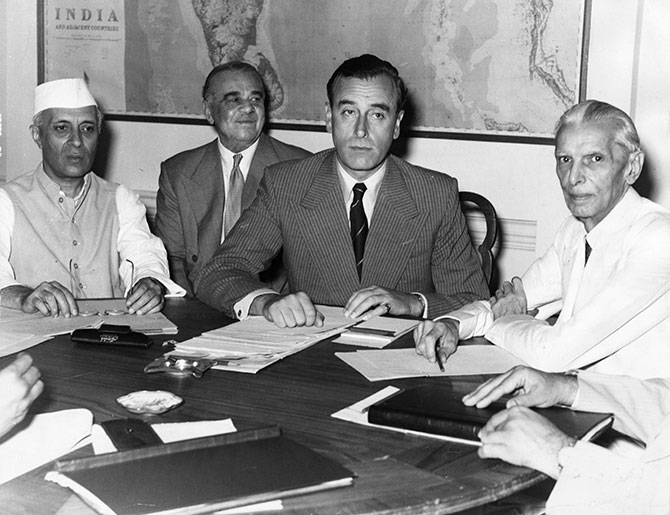
Jawaharlal Nehru and Muhammad Ali Jinnah in a meeting with Lord Mountbatten
13. I do not understand what is meant by our recognition of the Muslim League as the one and only organization of Indian Muslims. Obviously the Muslim League is an important communal organization and we deal with it as such. But we have to deal with all organizations and individuals that come within our ken. We do not determine the measure or importance or distinction they possess. There are a large number, about a hundred thousand, of Muslims on the Congress rolls, many of whom have been our close companions, in prisons and outside, for many years and we value their comradeship highly. There are many organizations which contain Muslims and non-Muslims alike, such as trade unions, peasant unions, kisan sabhas, debt committees, zamindar associations, chambers of commerce, employers’ association, etc., and we have contacts with them. There are special Muslim organizations such as the Jamiat-ul-Ulema, the Proja Party, the Ahrars and others, which claim attention. Inevitably the more important the organization, the more the attention paid to it, but this importance does not come from outside recognition but from inherent strength. And the other organizations, even though they might be younger and smaller, cannot be ignored.
14. I should like to know what is meant by coalition ministries. A ministry must have a definite political and economic programme and policy. Any other kind of ministry would be a disjointed and ineffective body, with no clear mind or direction. Given a common political and economic programme and policy, cooperation is easy. You know probably that some such cooperation was sought for and obtained by the Congress in the Frontier Province. In Bombay also repeated attempts were made on behalf of the Congress to obtain this cooperation on the basis of a common programme. The Congress has gone to the assemblies with a definite programme and in furtherance of clear policy. It will always gladly cooperate with other groups, whether it is a majority or a minority in an assembly, in furtherance of that programme and policy. On that basis I conceive of even coalition ministries being formed. Without that basis the Congress has no interest in a ministry or in an assembly.
I have dealt, I am afraid at exceeding length, with the various points raised in your letter and its enclosures. I am glad that I have had a glimpse into your mind through this correspondence as this enables me to understand a little better the problems that are before you and perhaps others. I agree entirely that it is the duty of every Indian to bring about [a] harmonious joint effort of all of us for the achievement of India’s freedom and the ending of the poverty of her people. For me, and I take it for most of us, the Congress has been a means to that end and not an end in itself. It has been a high privilege for us to work through the Congress because it has drawn to itself the love of millions of our countrymen, and through their sacrifice and united effort, taken us a long way to our goal. But much remains to be done and we have all to pull together to that end.
Personally the idea of pacts and the like does not appeal to me, though perhaps they might be necessary occasionally. What seems to me far more important is a more basic understanding of each other, bringing with it the desire and ability to cooperate together. That larger cooperation, if it is to include our millions must necessarily be in the interests of these millions. My mind therefore is continually occupied with the problems of these unhappy masses of this country and I view all other problems in this light. I should live to view the communal problem also in this perspective for otherwise it has no great significance for me.
Personally the idea of pacts and the like does not appeal to me, though perhaps they might be necessary occasionally. What seems to me far more important is a more basic understanding of each other, bringing with it the desire and ability to cooperate together. That larger cooperation, if it is to include our millions must necessarily be in the interests of these millions. My mind therefore is continually occupied with the problems of these unhappy masses of this country and I view all other problems in this light. I should live to view the communal problem also in this perspective for otherwise it has no great significance for me.
You seem to imagine that I wanted you to put forward suggestions as a petitioner, and then you propose that the Congress should officially communicate with you. Surely you have misunderstood me and done yourself and me an injustice. There is no question of petitioning either by you or by me, but a desire to understand each other and the problem that we have been discussing. I do not understand the significance of your wanting an official intimation from the Congress. I did not ask you for an official reply on behalf of the Muslim League. Organizations do not function in this way. It is not a question of prestige for the Congress or for any of us, for we are keener on reaching the goal we have set before us, than on small matters of prestige. The Congress is a great enough organization to ignore such petty matters, and if some of us have gained a measure of influence and popularity, we have done so in the shadow of the Congress.
You will remember that I took the initiative in writing to you and requesting you to enlighten me as to what your objections were to the Congress policy and what, according to you, were the points in dispute. I had read many of your speeches, as reported in the press, and I found to my regret that they were full of strong attacks on the Congress which, according to my way of thinking, were not justified. I wanted to remove any misunderstandings, where such existed, and to clear the air.
I have found, chiefly in the Urdu press, the most astounding falsehoods about the Congress. I refer to facts, not to opinions, and to facts within my knowledge. Two days ago, here in Calcutta, I saw a circular letter or notice issued by a secretary of the Muslim League. This contained a list of the so-called misdeeds of the UP Government. I read this with amazement for there was not an atom of truth in most of the charges. I suppose they were garnered from the Urdu press. Through the press and the platform such charges have been repeated on numerous occasions and communal passions have thus been roused and bitterness created. This has grieved me and I have sought by writing to you and to Nawab Ismail Khan to find a way of checking this deplorable deterioration of our public life, as well as a surer basis for cooperation. That problem still faces us and I hope we shall solve it.
I have mentioned earlier in this letter the critical international situation and the terrible sense of impending catastrophe that hangs over the world. My mind is obsessed with this and I want India to realize it and be ready for all consequences, good or ill, that may flow from it. In this period of world crisis all of us, to whatever party or group we might belong and whatever our differences might be, have the primary duty of holding together to protect our people from perils that might encompass them.
I have mentioned earlier in this letter the critical international situation and the terrible sense of impending catastrophe that hangs over the world. My mind is obsessed with this and I want India to realize it and be ready for all consequences, good or ill, that may flow from it. In this period of world crisis all of us, to whatever party or group we might belong and whatever our differences might be, have the primary duty of holding together to protect our people from perils that might encompass them.
Our differences and arguments seem trivial when the future of the world and of India hangs in the balance. It is in the hope that all of us will succeed in building up this larger unity in our country that I have written to you and others repeatedly and at length.
There is one small matter I should like to mention. The report of my speech at Haripura, as given in your letter and the newspaper article, is not correct.
We have been corresponding for some time and many vague rumours float about as to what we have been saying to each other. Anxious inquiries come to me and I have no doubt that similar inquiries are addressed to you also. I think that we might take the public into our confidence now for this is a public matter on which many are interested. I suggest, therefore, that our correspondence might be released to the press. I presume you will have no objection.
Yours sincerely,
Jawaharlal Nehru
Jinnah to Nehru – 12 April 1938
Bombay,
12 April 1938
Dear Pandit Jawaharlal,
I an in receipt of your letter of the 6th April 1938. I am extremely obliged to you for informing me that you propose to return to Allahabad and shall probably be there for the greater part of April and suggesting that, if it would be convenient for me to come there, we could meet, or, if it suits me better to go to Lucknow, you will try to go there. I am afraid that it is not possible for me owing to my other engagements, but I shall be in Bombay about the end of April and if it is convenient to you, I shall be very glad to meet you.
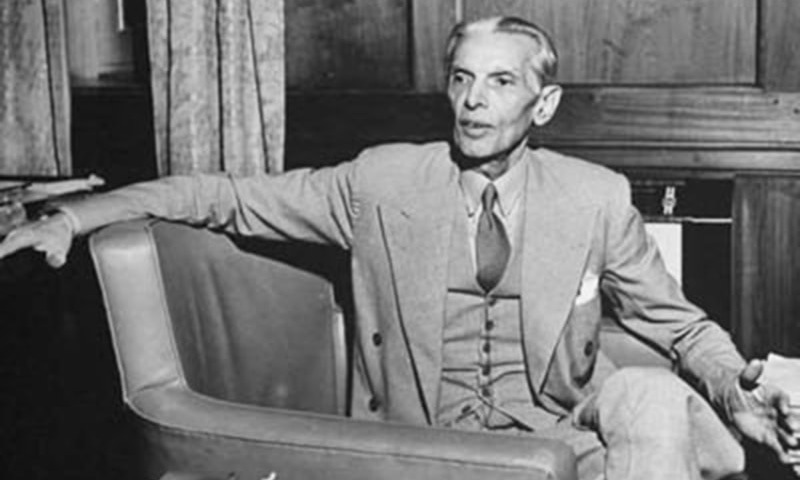
Muhammad Ali Jinnah
It seems to me that you cannot even accurately interpret my letter, as you very honestly say that your ‘mind is obsessed with the international situation and the terrible sense of impending catastrophe that hangs over the world’, so you are thinking in terms entirely divorced from realities which face us in India. I can only express my great regret at your turning and twisting what I wrote to you and putting entirely a wrong complexion upon the position I have placed before you at your request.
As to the rest of your letter, it has been to me a most painful reading. It seems to me that you cannot even accurately interpret my letter, as you very honestly say that your ‘mind is obsessed with the international situation and the terrible sense of impending catastrophe that hangs over the world’, so you are thinking in terms entirely divorced from realities which face us in India. I can only express my great regret at your turning and twisting what I wrote to you and putting entirely a wrong complexion upon the position I have placed before you at your request. You have formulated certain points in your letter which you father upon me to begin with as my proposals. I sent you extracts from the press which had recently appeared simply because I believed you when you repeatedly asserted and appealed to me that you would be grateful if I would refer you to any recent statements made in the press or platform which would help you in understanding matters. Those are some of the matters which are undoubtedly agitating Muslim India, but the question how to meet them and to what extent and by what means and methods, is the business, as I have said before, of every true nationalist to solve. Whether constitutional changes are necessary, whether we should do it by agreement or conventions and so forth, are matters, I thought, for discussion, but I am extremely sorry to find that you have in your letter already pronounced your judgment and given your decisions on a good many of them with a preamble which negatives any suggestion of discussion which may lead to a settlement, as you start by saying ‘I was somewhat surprised to see this list as I had no idea that you wanted to discuss many of these matters with us; some of these are wholly covered by previous decisions of the Congress, some others are hardly capable of discussion’, and then you proceed to your conclusions having formulated the points according to your own notions. Your tone and language again display the same arrogance and militant spirit as if the Congress is the sovereign power and, as an indication, you extend your patronage by saying that ‘obviously the Muslim League is an important communal organization and we deal with it as such, as we have to deal with all organizations and individuals that come within our ken. We do not determine the measure of importance or distinction they possess,’ and then you mention various other organizations. Here I may add that in my opinion, as I have publicly stated so often, that unless the Congress recognizes the Muslim League on a footing of complete equality and is prepared as such to negotiate for a Hindu-Muslim settlement, we shall have to wait and depend upon our inherent strength which will ‘determine the measure of importance or distinction it possesses’. Having regard to your mentality it is really difficult for me to make you understand the position any further. Of course, as I have said before, I do not propose to discuss the various matters, referred to by you, by means of and through correspondence, as, in my opinion, that is not the way to tackle this matter.
Your tone and language again display the same arrogance and militant spirit as if the Congress is the sovereign power and, as an indication, you extend your patronage by saying that ‘obviously the Muslim League is an important communal organization and we deal with it as such, as we have to deal with all organizations and individuals that come within our ken. We do not determine the measure of importance or distinction they possess,’ and then you mention various other organizations.
With regard to your reference to certain falsehoods that have appeared about the Congress in the Urdu press, which, you say, have astounded you, and with regard to the circular letter referred to about the misdeeds of the UP Government, I can express no opinion without investigation, but I can give you [a] number of falsehoods that have appeared in the Congress press and in statements of Congressmen with regard to the All-India Muslim League, some of the leaders and those who are connected with it. Similarly I can give instances of reports appearing in the Congress press and speeches of Congressmen which are daily deliberately misrepresenting and vilifying the Muslim composition of the Bengal, Sind, Punjab and Assam Governments with a view to break those governments, but that is not the subject matter of our correspondence and besides no useful purpose will be served in doing so.
With regard to your request that our correspondence should be released to the press, I have no objection provided the correspondence between me and Mr Gandhi is also published simultaneously, as we both have referred to him and his correspondence with me in ours. You will please therefore obtain the permission of Mr Gandhi to that effect or, if you wish, I will write to him, informing him that you desire to release the correspondence between us to the press and I am willing to agree to it provided he agrees that the correspondence between him and myself is also released.
With regard to your request that our correspondence should be released to the press, I have no objection provided the correspondence between me and Mr Gandhi is also published simultaneously, as we both have referred to him and his correspondence with me in ours. You will please therefore obtain the permission of Mr Gandhi to that effect or, if you wish, I will write to him, informing him that you desire to release the correspondence between us to the press and I am willing to agree to it provided he agrees that the correspondence between him and myself is also released.
Yours sincerely,
M.A. Jinnah
These letters have been republished from Nehru: The Debates that Defined India, courtesy the permission of Tripurdaman Singh and Adeel Hussain. You can buy the book here.
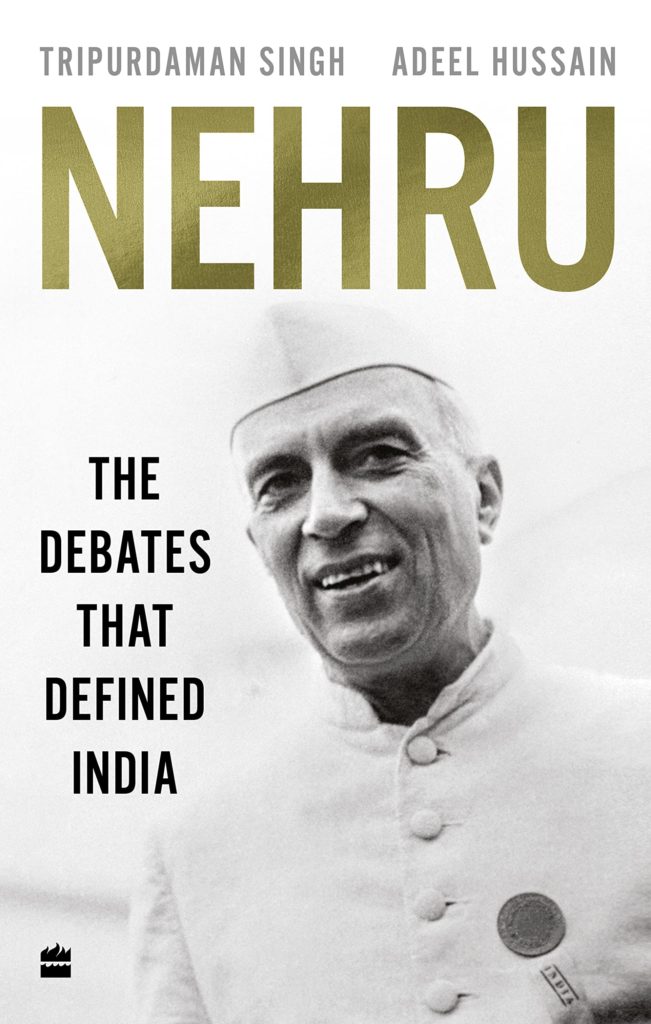
ARCHIVE
The Commission of Enquiry
Two months after the surrender, a Commission of Enquiry was announced. This turned out to be just a smokescreen for displaying the so-called British sense of fair play and an attempt to cool the political temperature. It served more as a political tool than a judicial enquiry.
The mutiny was discussed in the Central Legislative Assembly on 22 and 23 February and by the Defence Consultative Committee on 8 March 1946. The navy had already appointed boards of enquiry to study the events at every individual establishment and ship in detail.
At this 8 March meeting the C-in-C of Indian armed forces, Claude Auchinleck, announced that he would recommend that the Government of India appoint a commission to enquire into the causes and origin of the mutiny.
Following this, an announcement was made by the Government of India in early April. ‘The Central government has been pleased to appoint a commission of enquiry to enquire into and report on the causes and origin of the recent mutinies in the Royal Indian Navy in February 1946.’
The Commission of Enquiry would have as chairman, the Honourable Sir Sayyid Fazl Ali, chief justice of the Patna High Court (Judge, Supreme Court of India [1951–52], later Governor of Orissa [1952–56], and Assam [1956–59]). The judicial members were Justice K.S. Krishnaswami Iyengar (chief justice, Cochin State), and Justice Meher Chand Mahajan (Chief Justice, Supreme Court of India, January 1954 to December 1954; prime minister Jammu and Kashmir [1947–48]; judge, Lahore High Court). The service members were Vice Admiral W.R. Patterson, Flag Officer Commanding, Cruiser Squadron in the East Indies Fleet and Major-General T.W. Rees, Indian Army, commanding the 4th Indian Division.
The secretary to the commission was Lt Col Visheshar Nauth Singh. Sardar Patel and Aruna Asaf Ali asked the well-known Bombay lawyer, Purshottam Tricumdas, president of the Ex- Services Association, to appear on behalf of the Congress Defence Committee.
It was decided that the proceedings would be public, unless the chairman decided that it was in public interest to hold some part in camera. A total of 229 witnesses were examined, and a large number of official documents were studied.
At Bombay and Karachi, members of the commission visited a number of naval establishments and ships to see their galleys and mess decks. They even tasted the food served to the ratings.
The commission held its first sitting on 18 April 1946 in Delhi. Its first witness was Lt Col. Malik Haq Nawaz of the Morale Directorate at the General HQ. He deposed that he saw seeds of unrest in December 1945, when he enquired into the state of morale of the officers and ratings in Bombay and Karachi. Along with Col A.A. Rudra, security liaison officer, who was the second witness, Nawaz admitted that racial discrimination and political awakening were the primary causes.
The proceedings of the committee were, like the INA trials, open to the public, but it turned out to be a prosaic affair by comparison to the dramatic INA trials. The commission concluded its sitting in Delhi on Saturday, 27 April. It moved to Bombay on the 2nd of May, where it sat on the third floor of the Bombay High Court.
The witnesses included the FOCRIN, Admiral J.H. Godfrey, who was examined on 22 April 1946. He was memorably pulled up by Justice Sayyid Fazl Ali when he contended, ‘But in this country where there is nothing like public opinion, not one word has been raised against this (ratings’ complaint of bad food)’. Hearing this, Justice Fazl Ali replied sharply, ‘I consider the statement made by you ill advised. Aren’t you prepared to revise your opinion?’ The admiral apologized.
Speaking about the causes of the mutiny itself, Admiral Godfrey contended that left-wing Congressmen and Communists had considerable influence on the RIN ratings and this, along with the strong political spirit among many of the ratings, were the root causes which eventually led to the mutiny. The FOCRIN contended that media too had played its role with papers such as the Free Press Journal promoting anti-British feelings.
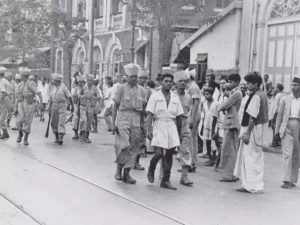
Ratings arrested credits https://news.abplive.com/blog/militants-strike-britain-out-the-1946-naval-indian-mutiny-1513953
Questioned about his controversial broadcast that had enraged the ratings to boiling point, Admiral Godfrey said that the broadcast was directed mainly at the mutineers in Bombay who had their guns trained on barracks and other establishments, and not towards the other ratings. He contended that such actions warranted the use of force and it was for this reason that large military forces were deployed in Bombay, along with two squadrons of Mosquitoes.
The atmosphere within the courtroom was very tense as Admiral Godfrey’s testimony continued through the day. He remained unapologetic about his actions, as he believed that force was the only means he had at his disposal to get the ratings to surrender unconditionally. At the same time, he expressed his regret that the RIN men had been made to return their kit when they were demobilized. This was not in the tradition of the British Navy, he admitted.
It was clear from Admiral Godfrey’s tone that he and other British officers firmly believed that the mutiny was pre-planned. How else could the ratings have had Congress, Muslim League and Communist Party flags at hand when they hoisted them on all the ships and shore establishments and lorries used by them? These flags were not on the ships, or readily available.
Admiral Godfrey also pointed that in Bombay there was a very good wireless organization between the shore establishments and ship-borne mutineers, which must have taken some time to work out. As a result, the HMIS Chamak in Karachi was ready for mutiny and only waiting for a signal from Bombay.
On their part, giving evidence few days later, the RIN ratings and others pointed out several fallacies in Admiral Godfrey’s testimony. They continued to emphasize that it was not a mutiny, but a mass strike against brutal treatment by the British officers, who routinely called them ‘bastards’ and assaulted them if they complained. Often, they claimed, the officers got drunk and slapped and kicked ratings who could not hit back.
Kusum Nair had been part of the uprising, albeit clandestinely. On Saturday, 27 April 1946 the Bombay Chronicle published a syndicated column under her pseudonym ‘Birbal’, which ridiculed Admiral Godfrey for saying that terrible food was not one of the causes of the mutiny.
The column also questioned Colonel Malik Haq Nawaz’s contentions that some of the most senior and outstanding leaders of the strike were Muslims, and said communal and provincial unity and harmony was one of the most marked features of the strike. Condemning the summary trial and sentencing of the ratings it alleged that the British put pressure on the police to forcibly put them on trains under custody, and then put them in jails of the respective districts to which they belonged. This was to ensure that these ratings could not depose in front of the commission.
On a lighter note, some of the ratings complained that while British seamen of Royal Navy were allowed to smoke on work, and take girls on dates outside the barracks, Indian ratings were punished if they ever dared to do that.
One of the early witnesses in Bombay, when the commission started its hearing on 2 May, was Lt Surendra Nath Kohli, who later become chief of naval staff. Well-built and smart, Kohli had joined the RIN in 1936 where he began his initial training in England and joined Talwar on 4 February 1946, barely a fortnight before the strike began.
At the time of the mutiny, he was the chief instructional officer. Thus, he was well-positioned to give an assessment of the state of the ratings’ minds before the mutiny. Cross examined on the first day, Kohli stated that he was one of the officers who had made reports about the mutiny to the CO.
Asked as to his opinions to the causes of the mutiny, he pointed to the officer and rating ratio. While there were 1,150 ratings in Talwar, there were just ten executive officers. These officers were technically qualified but lacked experience of sailing and administrative abilities to keep in proper touch with the ratings. More than double the number of officers was needed to maintain morale at the Talwar.
But this, he said, was a long-term problem and not the proximate cause.
Kohli believed the immediate trigger points was the arrest of B.C. Dutt, Commander King’s use of foul language, and the uncertainty caused by a poorly managed demobilization.
Some of the exchanges went like this:
Mr Justice Mahajan: We have been told that some of the British and Indian officers were having drinks and dances at the time these complaints (inedible food) were lodged. Is that correct?
Lt Surendra Nath Kohli: That is true. In the ratings’ club, though the dances are completely prohibited.
Justice Mahajan: Would you regard the arrest of Dutt for shouting ‘Jai Hind’ justifiable?
Kohli: If ‘Jai Hind’ is said to mean ‘Long Live India’, I feel his arrest was unjustifiable.
Kohli also agreed with the commission member, Major General Rees, that the more educated ratings were highly motivated and influenced by politics.
On Friday, 3 May 1946, Chief Petty Officer Sher Alam, master of arms at Mulund and drafting master of arms at Castle Barracks was the first witness. He was asked frivolous questions like, ‘I believe you are a chain smoker and that you spend as much as Rs 30 per month on smoking. How would you manage when you resign the service?’ His simple reply was, ‘Yes it will be difficult for me to maintain the same standard.’
Another leading telegraphist, E. D’Cullie narrated an incident when a telegraphist, fed up of constant abuse and ill treatment in Talwar, had committed suicide by hanging himself from a tree.
From Bombay the commission went to Poona and visited HMIS Shivaji at Lonavla, where 900 trainees had gone on strike in support of their brethren. On the way, they also inspected HMIS Akbar at Thana. After the weekend, the committee returned to Bombay where they interviewed more ratings.
Among them was nineteen-year-old P.G. Bokle, a Saraswat Brahmin who complained that when he joined the navy his sacred thread (janeyu) had been cut off as he was told that in the navy no rating could wear the thread. Bokle also claimed that he was called an ‘Indian bastard’ on many occasions by British officers.
In a startling statement on Thursday, 9 May 1946, Lt Mahendra Pal Singh of the HMIS Clive, a training ship in Bombay, contended that the COs of various ships on hearing the first rumbles of the mutiny became ‘funky’ and ran away from their posts ‘to rest in peace and return after a couple of days.’ The officers did not bother to show leadership but instead were content to hide themselves in the confines of the nearby Sea Green Hotel on Marine Drive.
Asked if the situation that first took place aboard the Talwar could have been averted, Singh said it could have been. ‘The situation in the Talwar would have been averted if the authorities had sent officers who had the confidence of the ratings to handle the situation, such men as Lt Hassan or Lt Batra. But instead, they sent Lt Kohli and Lt Nanda, who were hooted out by the ratings.’
‘It is my personal opinion that when officers became unpopular there is something definitely wrong with them.’ He added: ‘The allegation that the strike was pre-planned was totally untrue.’
He also denied that the Congress and League flags that were hoisted on the ships and establishments during the mutiny were purchased from the market. He deposed these were made on the ships itself, from parts of other flags. All the posters that were seen were put up only after the mutiny had started.
Another Indian officer, Lt Ghatak, speaking from his personal experience said: ‘Although the Indian and British officers messed together, British always sat on one side.’ Excessive drinking and disorderly behaviour under the influence of liquor brought the officers into contempt with their men. Dances and parties had often been the subject of derisive comments among the ratings.
Testifying in Bombay on Monday, 13 May 1946, a leading telegraphist bitterly complained about the medical officers who instead of taking care of the ratings ended up harming and even getting them killed through sheer callousness. Giving the example of a deceased rating, Gulam Hussein, he stated that Hussein had complained of acute abdominal pain to a doctor who instead of giving him medicine advised to take a swift run around the courtyard. Putting faith in the doctor’s ‘prescription’, Hussein ran around once and then dropped dead. But his death did not change the attitude of the doctors.
The most startling testimony the commission heard was probably from Ahmed K. Brohi. A customs clerk before he joined the navy as a telegraphist, Brohi was arrested as soon as the mutiny ended and first put in Mulund camp before being transferred to the dreaded Kalyan camp.
Termed one of the kingpins in the RIN Mutiny as joint secretary of the NCSC, Brohi appeared before the commission in a dark brown jacket and white shorts, sporting a small unkempt beard. Calm and collected, Brohi spoke in a low determined voice which made his testimony all the more compelling.
‘Have you ever noticed why we like to read Russian literature or why communism is spreading in India at atomic speed? Why do we not read instead French literature? We are not revolutionary because we have fallen in love with the reds of Moscow but because we know they are the staunch enemies of your system of government, which has proved to be a second edition of Nazimrule.
Our aim, ambition, and future policy is to revolt against British imperialism.’

Naval Uprising Memorial, Bombay, Credits- Wikipedia.
Questioned by the committee as to the strike and his role in it, Brohi had this to say.
Q. Did you know that the strike was to begin on the 18th of February?
A. I knew only by intuition, it was only an accident that the strike occurred that day. In my mind, the 17th of February has got some association. On that date in 1942, 30,000 Indian soldiers were handed over to the Japanese in Singapore by their British colonel. That made me think it had something to do with INA. Yes, some INA literature was distributed among the ratings.
When asked why he did not report his misgivings to higher authorities, he replied, ‘I am not a member of the CID.’ During his testimony, Brohi read out a long statement to the commission, which was termed as a ‘fine essay’ by the chairman, Justice Fazl Ali.
In his written statement, Brohi said the main causes for the strike were: the INA trials, disappointing demobilization conditions, hatred of the British, the Indonesian issue where Indian ratings were reluctant to fight for the Dutch colonizers agains the Indonesians, the RIAF strike, free availability of communist literature, and press propaganda regarding disturbances specially in Calcutta, loose discipline in HMIS Talwar, and the abusive language of Commander King.
Impressed by his statement, Justice Fazl Ali asked how long it took him to write the statement. Brohi’s short reply was: ‘Six hours.’ Speaking during his cross-examination, Brohi said, ‘Mischiefmongers among the RIN strikers in February last, signalled to ships in Bombay harbour to open fire, and if the men on the ships had done so thinking that the instructions had come from responsible persons, terrible havoc would have been caused.’
Purshottam Tricumdas then asked him for further elucidation of the statement to which Brohi replied that he was referring to some signals given from the Gateway of India and Ballard Pier to ships to open fire.
Confirming what others had said, Brohi also categorically stated that 99 per cent of the ratings were interested in politics, and bore deep hatred against the British. They also felt that like the INA personnel, they wanted to do something outstanding for the country.
Brohi went on to blame national leaders for misguiding the ratings by preaching non-violence to men who had been taught to fight. So, national leaders were responsible in a big way. ‘Till the moment the ratings took up the arms, the national leaders were red hot in their speeches. But when the ratings actually took up the arms, what did they find? The leaders began to talk of non-violence. How could men trained in warfare think in terms of spinnin wheels? How could men taught to kill take up the charkha?’
During cross-examination, Brohi contended that despite everything the strike would have remained peaceful if the British had not pushed the men into taking up arms.
He pointed out that the British had imprisoned B.C. Dutt and R.K. Singh – heroes to many of the ratings. He added, ‘Government forced them to take up arms. They imprisoned their brothers. They stopped the water and food supply. The ratings therefore had no other way but to take up arms. Admiral Godfrey made his threat to sink the navy and this made the ratings adamant. I do not mind what will happen to me in the future, whether I live or whether I receive bullets in my chest, but the butchering of so many of my comrades will ever haunt my memory in days to come.’
On being asked by Justice Mahajan which newspapers incited the mutiny, he named the Free Press Journal, the Bombay Chronicle, and Blitz. ‘The ratings were dead against imperialism. Indeed, British imperialism was a second edition of Nazi rule. Hence the ratings looked for a friend, everybody who was anti-imperialist. They know of the historic Mutiny of 1857.’
Basant Singh, one of the ratings transferred to and detained at the Kalyan camp, deposing in front of the commission on 14May, stated: ‘Some kind of matters and literature about INA, Subhas Bose’s pictures and pamphlets such as “Blood and Thunder” were freely distributed among the ratings. The situation in India was peculiar. Political prisoners had been released, INA trial had started. In some respects, we became jealous of the INA deeds. They are being worshipped as heroes. But we are looked down upon as British stooges and despised. We too are patriots. We wanted to make clear to the public what we wanted to do and we struck work.’
The other notable witness after this was B.C. Dutt, the man who had started the mutiny by writing nationalist slogans on the walls of the Talwar. Testifying before the commission, Dutt described serving in the naval service in India as a ‘living hell’.
Dutt claimed that he was disillusioned by his life in the navy and wrote of this in a letter to his brother, which was found and heavily censored and he himself was threatened with dismissal. A diary seized from Dutt’s locker in the Talwar was produced in the court. It contained references to a ‘boss’, ‘HQ’ and to a ‘Whisp Camp’. The last, Dutt explained, meant ‘Whispering Campaign’ and referred to his effort to educate other ratings.
Dismissing the charges of mutiny, Dutt claimed that he was charged with political affiliation solely because at the time of his arrest when his locker was searched, a communist book was found. British records reveal that when Dutt’s locker was opened and searched, a number of articles and papers that included two diaries, a receipt for Rs 206 from Azad Hind Army Relief fund, a copy of INA pledge and a book on the Indian Mutiny of 1857 by Asoka Mehta, and a letter on a postcard from the secretary of the Indian Ex-Services Association Y.K. Menon were found. Clearly, this was all much more than just a ‘communist book’.
During his testimony, Dutt refused to answer questions on a few occasions saying he had already stated the answers before the Board of Enquiry, which had inquired into the Talwar incident. However, he was more forthcoming on his political beliefs. On being asked when he gained a liking for political activity, Dutt replied that after joining the navy he had the opportunity of visiting places, mixing with British soldiers and seeing how people lived in free countries. That is how his interest in politics began.
‘When Indians are struggling for freedom, I think every Indian should join in the struggle… I would have joined the INA, if I was in Malaya.
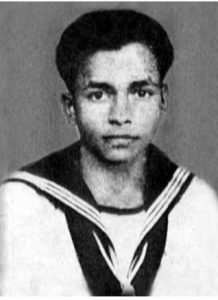
Balai Chand Dutt, Credit- Twitter
Questioned about his views on the ‘Azad Hindis’ and the fact that they were referred to as ‘Dutt and his group’, Dutt had little to say. The question was: This cadre (Azad Hindis) would join no political organization but would infiltrate into all services. Do you agree with this?
Answer: ‘For the cause of freedom anything can be done.’
He did add, ‘I would take the Azad Hind Fauj pledge as all Indians should,’ and he pointed out that all the ratings had contributed to the INA fund. He was however, quick to emphasize that the mutiny started in spite of him, as he was under detention on 17 February.
While Dutt was most forthcoming about his interest in politics, he was understandably less so about the entries in his diary. When asked about his visits to ‘N’, and ‘HQ’, he purposely gave misleading answers stating N stood for Nambiar, who was not in Bombay, and not Lt Nayyar, and HQ stood for the Headquarter of Communist Party on Sandhurst Road (and not to any headquarters of any secret organization). In reality this was the Riviera, Marine Drive home of Kusum and P.N. Nair where all the planning for the mutiny was done.
Q. Do you remember that you gave a book called March of Events to Rishi Dev Puri?
A. I had some books at the signal school and sometimes he used to give me one or two books, but I can’t remember what happened to this book. So many things have happened after that.
Q. On 3 January you entered in your diary: ‘Went with Devu to HQ.’ May I suggest that it was Lt Nair’s flat?
A. No.
In this way, Dutt continued his bid to mislead and stonewall the commission. When asked about the ‘Whisp Camp’ reference in his diary, he said it meant ‘whispering campaign’ which was to educate some ratings about the history of the Indian National Congress and not to excite them. Asked about references in the diary to meetings with RIAF men, Dutt explained that these were made in connection with the formation of Ex-Services Association. In reality though, the British contended that Dutt was meeting them at the Nairs’ home in a bid to get them to support and join the RIN Mutiny. The material seized from Dutt’s locker was placed before the commission as exhibits.
As the cross-examinations continued, other interesting stories emerged. One of these was about Lieutenant J.A.G. Tottham who testified as one of the witnesses at Kalyan camp on 1 May 1946. In his evidence, Tottham related an incident, which highlighted the contempt and lack of trust the British held for Indians:
‘In the Persian Gulf one of our leading signalmen reported one evening at 5.30 p.m. that he had sighted three suspected German U-Boats. This was subsequently reported to the senior officer commanding at Bandar Abbas, who asked for the name, ranking and the ability of the rating who had reported. He was told “RIN rating, signalman of very good ability.” (On hearing that he was an Indian), we got back the reply, “Do not rely much upon RIN leading signalman’s report.” The same night, in that very area, three ships were sunk. The commander in the Persian Gulf stationed at Basra put an enquiry board on it and the officers in Bandar Abbas practically told us “to keep our mouths shut about the incident”.’
By 16 May, almost 100 witnesses, Indian and British, had been cross-examined. Another interesting witness was Commander S.G. Karmarkar who was transferred from an establishment in Lonavla to HMIS Talwar on 19 February after the outbreak of the mutiny. This was the Indian officer who had kept an eye on the Riviera ‘HQ’ from his flat in the same building. He deposed that there was no serious ground for the mutiny. The grievances and discontent, he claimed, were not of a serious nature. He blamed political influence for the mutiny. He said he believed the prime cause was acute political tension in the country.
Karmarkar added that the other trigger was the effect of articles published in newspapers. He admitted that he had got threatening letters from the ratings stating that if he did not mend his ways of siding with British officers, they would ‘make Commander King out of him’.
He admitted that when in Bombay, he stayed in a building at Marine Drive. ‘Until recently Mr Nayyar, formerly a lieutenant in the navy, lived in the same building, and he noticed that ratings visited Nayyars.’
Despite his full support to the British and the navy, he said: ‘Alleged abusive language of Commander King was another incentive for the Mutiny.’ He also admitted that the effect of Admiral Godfrey’s threat to destroy the navy was unfavourable.
There were some lighter moments when Karmarkar was cross examined.
Justice: You said that the WRINS (Women ratings of Royal India Navy) had preferential treatment.
A. Fortunately I had nothing to do with WRINS [laughter].
Tricumdas: Is it wrong on the part of the ratings to meet a politician?
A. It depends upon the type of political leaders he meets [laughter].
Q. You met Pandit Jawaharlal Nehru. Is Pandit Nehru a safe person? [Laughter]
Karmarkar did not reply.
Q. When you met Pandit Nehru, was a British intelligence officer with you? A.
You may ask Pandit Nehru himself [loud laughter].
Captain Inigo-Jones was the CO of the Castle Barracks until 18 February. On the 18th he was sent to the Talwar to take over from Commander King. He was described by a young rating before the commission as ‘Butcher of the RIN’. His testimony added some colour to the proceedings. Inigo-Jones repeatedly wore a monocle to read extracts from his statement made before the Board of Enquiry at the HMIS Talwar. When asked if he had made those statements, he replied, ‘I presume so.’
Lt Sachdev was a colleague of Lt Batra at the Talwar during the mutiny. Both of them were well-liked by the ratings as they were sympathetic to their grievances. Testifying before the commission he said, ‘It was the frustration of the ratings’ representation to the junior officers, and the frustration of the junior officers’ representation to the authorities, which suddenly exploded into the Mutiny.’
* * *
The most striking testimony from the British officers’ side was that of Commander Frederick William King, CO of the Talwar until 18 February. Giving his testimony on Monday, 20 May 1946, King denied his use of foul language was one of the reasons for the mutiny, and denied having used any foul language at all.
He asserted that there was not just the political but revolutionary movement behind the mutiny. ‘Unfortunately, navy was not in a position to show them the other side of the picture.’ King said the revolutionary fervour only grew especially when on a particular day the ‘Quit India’ slogan was found written on his motor car and the tyres deflated. He regarded this as a serious act of sabotage and consequently tried to get the number of ratings reduced.
Replying to a question if he knew any of those fourteen ratings who had complained against him, King replied that he did not remember having seen any of them. When asked if his administration had through being over-strict, created resentment, King replied that the ratings themselves had his deepest sympathy, especially Dutt who was very clever and who would do credit to any navy.
‘Most of the complaints against me were influenced by outsiders. I tried to call them to my office but it’s very different when there are a large number of men involved and they are refusing to take orders from their immediate senior.’
Q. It has been stated in the evidence before us that when you came to know of the trouble, you gave no instructions to the officers.
A. All that is in the report of the Talwar enquiry. When I came to know of the trouble, I visited Vithal House. I saw the admiral there. He did not give me any instructions. He may have said, “Try to get hold of the representatives of the ratings” and that is what I have been trying to do.’
Q. You stated in the Talwar enquiry that some catcalls were made against the WRINS. What were they like?
A. I can’t imitate the calls.
Q. What was the implication behind them?
A. It was embarrassing for the women – bad discipline and bad manners.
When Chairman Fazl Ali asked if the accusation that he was accustomed to using bad language was correct, King replied he sometimes used ‘friendly language to his friends’.
Q. Which may not be parliamentary?
A. May not be.
Fazl Ali: You cannot categorically refute that you use language that may not be parliamentary, and may be misconstrued as bad language.
A: I use words occasionally which are not in the dictionary. Some words are more expressive.
Sayyid Fazl Ali then read out a statement by Lt Nanda before the Talwar board of enquiry which stated: ‘Have had quite a lot of conclave (sic) with Commander King. I have heard him very often use bad language, which comes to him unintentionally. Commander King explained he sometimes expressed himself freely.’
Testifying next before the commission was Lt S.M. Nanda (then a divisional officer in the HMIS Talwar, and later the navy chief). Lt Nanda stated that he had gone to Vallabhbhai Patel during the mutiny and gathered from him that Lt Nayyar and Mrs Aruna Asaf Ali had approached Sardar Patel to get the support of the Congress for the mutineers and that they had been disappointed. He also stated that ratings wanted Mrs Asaf Ali to mediate between them and the authorities.
Speaking in support of Commander King, Lt Nanda categorically said ‘No’, when asked if Commander King’s statement that ‘ratings would not mind overcrowding if they got good food’ was indeed true. On the actions of mutiny, he was more forthcoming.
Lt Nanda emphatically said that the writing of slogans in Talwar on the eve of Navy Day was not the work of certain disgruntled ratings. ‘It was the work of some organized body which was trying to disrupt the discipline of the establishment in general, and to rouse feelings against the government and to magnify the service grievances.’ He also emphasized that the presence of revolutionary elements in Talwar was well known.
‘On the Navy Day the slogan writing was in full form and the officers were quite handicapped on how to put a check upon it. The indifferent attitude of the authorities towards the hunger strike at two messes added fuel to the fire. Lt Cole and myself volunteered to speak with the ratings. I asked the ratings that the authorities wanted to know their grievances. I also asked them to appoint representatives from amongst themselves, but they resented the idea and expressed a keen desire to have some national political leader represent them.’
Members of the Ex-Services Association, the organization accused of having political affiliations with the mutineers, also came forward to testify before the commission. It was here that Lt Commander Powar, a member of the commission, who was said to be a British sympathizer, began aggressively cross-questioning the witnesses.
Lt Powar asked Lt Nanda if a rating in the Talwar named Rishi Dev, was related to Lt Nayyar, an officer in Talwar. To that Justice Mahajan interrupted that Rishi Dev was a Puri, a Punjabi Brahmin (incidentally incorrect because Puris are Punjabi Khatri) and that Nayyars came from South India (also incorrect because this Nayyar was also a Punjabi). This remark led to some laughter in the court. Lt Cdr Powar sat down, protesting that every time he puts a question, he is ridiculed.
The next interesting witness was an officer of the Indian army, Lt Sachdev. The commission first asked whether he was a member of the Ex-Services Association and then read out a resolution passed by them on 20 February 1946 supporting the mutiny. Did he, they asked Lt Sachdev, know of this resolution? If so, did he condone it?
In reply Lt Sachdev said he was a member of the association but did not support this resolution. He was then asked.
Q. Who took you to the meeting?
A. I was told by Lt Commander Arland to go over there.
The commission then drew attention to the picture published in the Blitz. It was a picture of Jayaprakash Narayan with Lt Chandramani of the RIN, while contingents of the three Indian services gave the guard of honour.
Asked for his comments on the picture, Lt Sachdev simply replied, ‘I want to keep aloof from the party politics.’ Sachdev continued to play this game of cat and mouse until finally a question came up that ended all doubts about his loyalties.
Q. Do you realize under what government you are serving?
A. Yes, it is the British government of which we are all slaves… We are ruled by the Britishers as slaves and I do mean what I say.
Y.K. Menon, secretary of the Indian Ex-Services Association was the next important witness to be cross-examined. He described himself as author, journalist, correspondent of many foreign papers and contributor to the Tribune (which until recently had been associated with Sir Stafford Cripps). During his cross-examination, he mentioned that the association was mainly concerned with the resettlement of discharged servicemen and it would be wrong and libellous to say that one of its objects was to subvert the loyalty of people in the armed forces. There was no political tinge to the association.
Menon also pointed out that the association was formed on 20 February, which was after the mutiny had already broken out and that the resolution passed by the association to congratulate the strikers was not political but a humanitarian one. It should be viewed in that context.
He explained that the first meeting of fourteen persons was held on 17 December 1945 to consider a Draft Constitution. After four such provisional meetings, the association came into existence on 20 February 1946, when a resolution expressing sympathy towards the RIN strikers was also carried by the house. He said the association had almost 1,000 members in Bombay alone.
Both Tricumdas and Menon put up a strong effort before the commission to prove that the Ex-Services Association was not a political body and not responsible for the RIN Mutiny. They cited examples of other organizations such as the Indian Merchants Chamber, the Forward Bloc, British Portuguese Chamber of Commerce, and other important organizations, which were represented by well-known members of these bodies when they conducted a joint meeting.
Dr P.A. Wadia, a noted economist, was present as well in this 20 February meeting, where Mrs Lilavati Munshi was in the chair and a small committee was formed to collect funds. Some other prominent people who attended the meeting were Mr Gazdar representing the Tatas, Mrs Violet Alva of the Forum, wellknown actor Prithviraj Kapoor, and Miss Lynette Solomon of the Bombay Sentinel.
It had been decided that Jayaprakash Narayan should be invited to inaugurate the fund and Tricumdas mentioned that it was recommended that the association should seek support from the government of Bombay and the collector of Bombay. He even suggested that it should work hand-in-hand with the district sailors, airmen and soldiers’ association of which the collector was the chairman.
Menon denied that the association in any way was political in nature and that it had any hand in the mutiny though there were many members who had associations with the navy. Tricumdas added that the Ex-Services Association was moved by the pitiable condition of the demobbed soldiers and navy men. It was with the intention of doing some good for them that the association was formed.
Judge advocate Powar asked Menon: ‘If non-violence were to fail would you believe in violent methods?’ Without even a hint of hesitation, Menon answered, ‘I would,’ and emphatically added that he would adopt any means to get freedom. He, however, denied that he knew Dutt before the mutiny nor could he single him out in a crowd. Menon admitted, however, that he did know R.D. Puri.
The next witness was Prem Nath (P.N.) Nair, or Nayyar. Formerly a welfare officer in the HMIS Talwar, Nayyar stated that he joined the navy ‘as he loved the sea’ but left it when he found that conditions there were terrible.
‘I have never seen more callous people who have utter disregard for human sentiments as in the navy,’ he shared. However, he denied taking part in any subversive activities saying such accusations were baseless.
Nayyar, however, was quick to point out the follies and discriminatory practices carried out by the British. Talking about racial prejudice, he said that a young British officer, Lt Horabin, who was a favourite with everyone in the Talwar, fell into disfavour after he married an Indian girl whom he loved. His wife was never invited to any of the naval functions or parties just because he had married a ‘black girl’.
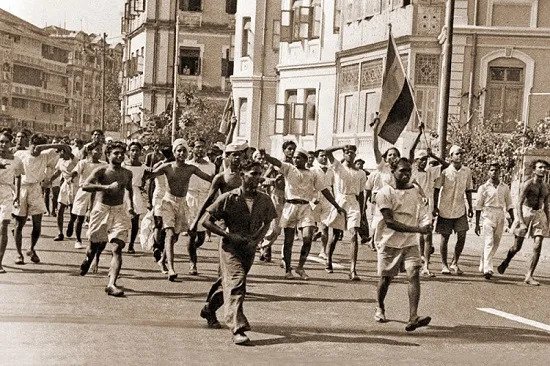
Indian ratings during RIN mutiny, credits- https://www.newsintervention.com/a-mutiny-that-petrified-london/
By 23 May 1946 the commission had completed three weeks in Bombay and, according to local newspaper reports, its hearings were humdrum affairs. It needed Mrs Nair, the only lady witness to be called, to inject some excitement into the proceedings.
Smartly dressed, Kusum Nair’s answers delivered with quick confidence impressed everyone and she lent the commission an aura of glamour, which had hitherto been missing. One of the prominent visitors in the packed courtroom when she was examined, was Kamaladevi Chattopadhyay, former president of the All-India Women’s Conference.
Describing herself formerly a member of the Women’s Auxiliary Corps (India) [WAC (I)] Mrs Nair also stated that she was a journalist and the owner of a newspaper syndicate company in Bombay. Asked for her views on the mutiny, she said the mutiny was entirely an internal matter, and credit or discredit for it should go to the ratings.
Then asked to account for her movements, she admitted that she was seen near the HMIS Talwar on 22 February, and at Castle Barracks and other places in Bombay during the days of the mutiny. But she said she went there only to fulfil her journalistic duties.
Reiterating the objectives of Menon, Kusum Nair said the common man felt that the armed forces should participate in the freedom struggle and added daringly that she believed that it was the patriotic duty of every Indian to fight for freedom. Though she denied knowing B.C. Dutt, she admitted she knew R.D. Puri.
Kusum Nair’s true sentiments came to the fore though when she stated that she felt sure that demobbed personnel would join the armed forces of free India at half their current salary. Questioned about a message attributed to her that the ratings should salute Azad Hind style, she denied it. She also admitted that an article ‘Indian Mutiny’ had been sent out through her syndicate.
No one could be in any doubt as to where her sympathies lay. Kusum Nair’s statements were all the more impressive given the cross-examination that Lt Commander Powar the judge-advocate, and a supporter of the British, subjected her to.
He pointed towards her writings in an INA pamphlet, ‘Even the armed forces are in a ferment.’ She replied that she was referring to the RIAF strikes, the arrest of B.C. Dutt, and the statement to that effect by Auchinleck in the Assembly, concluding: ‘I hadn’t the faintest idea that there would be widespread trouble in RIN.’
Powar, however, was determined to drive her to admit that she had full knowledge about the strike from beforehand. However, she was unperturbed. Being asked by him about a quotation in a piece distributed under her pen-name Birbal, which said: ‘Just wait for the next struggle. The fighting forces will walk over next time,’ she replied with authority, ‘This is an assurance to the Congress leaders that the armed forces are with the country… If there is a mass uprising, I think every Indian should participate in the struggle.’
However, Powar was not done yet. He then asked her, ‘Were you in sympathy with the strikers?’ a dangerous and leading question. Circumventing it with ease, she said, ‘I tried to do my best to help the situation. I even went personally to Sardar Patel and persuaded him to use his good offices with the authorities and with the boys to stop it.’
Kusum Nair was a rock-solid witness on the stand. None of the commission’s questions could shake her. On being asked accusingly by Vice Admiral Patterson that if she agreed, or was willing to concede that a reading of her political views in print would weaken the loyalty of the armed forces, and might have incited the mutiny, she replied firmly in the negative. She also said she believed that the mutiny was a spontaneous action by the ratings themselves.
‘No political organization could have commanded the mutiny. If an organization like the Indian National Congress could not influence the Muslims during August 1942 (Quit India Movement), when there was a spontaneous action and mass upsurge all over the country and even the army remained aloof from the struggle, how could outside political influence have any affect during February 1946, when the international situation was far more favourable to the government than in 1942?’
* * *
Everyone was most interested to hear the testimonies of the mutineers themselves. The commission cross-examined Lt Sobhani, the only officer to be arrested and punished for ‘making seditious speeches’ and ‘inciting other fellow officers’. Facing court martial on twelve charges, he was brought from a naval prison to appear before the commission under guard. Asked about the causes for the RIN mutiny, Subhani said that strike was due to long frustration among the ratings.
The newspapers gave wide coverage to the Commission of Enquiry proceedings and revealed some interesting sidelights. The column ‘Twilight Twitters’ (Bombay Sentinel, 17 May), was ironical. ‘You will hardly believe – That Ahmed Brohi told RIN Court that politics was a vast and confusing subject. Who said it was also the last refuge of a scoundrel?
‘That Telegraphist Brohi told the commission that as it was accustomed to deal with criminal cases, it suspected everything under the sun. Another way of saying a man is known by the company he keeps?
‘That the witness informed the judges if he had good memory, he would have been the premier of some province. Brohi should know that Premiers have short memories, as they forget their election promises.’ The commission concluded its last hearing on Saturday, 1 June 1946 in Karachi after five consecutive days of sitting in Muslim Hostel. It examined over forty witnesses there, including two COs, and three other officers. Commander A.K. Chatterji, CO of Chamak was the first witness on the last day, and the last to be examined was Jaswant Singh, a rating who was discharged and had recently emerged from jail after serving a term of imprisonment.
After concluding the cross-examination in Karachi, the commission left for Simla on Tuesday, 4 June 1946, to draft the report. It was expected that the report would be submitted to the government within a month. The report was duly submitted in October but it was not made public until the third week of January 1947. Even now, it’s not entirely clear if the full report has been placed in the public domain, although 598 pages of it are available.
The Times of India and other newspapers carried excerpts from the report on 21 January 1947. Wrote the TOI: ‘The lessons of the mutiny, the government say are, first, that officers must consider the welfare of their men before their own comfort or safety and that grievances must not be explained away but redressed and, secondly, too rapid an expansion without proper provision for the training of officers is unwise, and the aim for the services in peace must be to prepare for expansion in war. ‘
The government mentioned that the inquiry commission is unanimous that the basic cause of the mutiny was widespread discontent arising mainly from a number of service grievances which had remained un-redressed for some time and were aggravated by the political situation.
‘With references to politics, the Government of India expresses their belief that healthy interest in the affairs of the country is to be encouraged but that the use of politics as a lever to get the grievances redressed is highly dangerous and must be discouraged in the interest of the service.
‘Officers and men are being instructed that although every man is entitled to his personal views, participation in party politics is not admissible to members of such a service.’
The report stated as follows: Nine ratings, one officer, killed (34 were missing and reported as deserter), 41 ratings and one officer wounded. [Looking at the scale of mayhem this appeared to be highly understated data.]
It further concluded
1. Mutiny was not organized by outside agency. It was not pre-planned.
2. Politics and political influence had great effect in unsettling the men’s loyalty and in preparing the ground for the mutiny and its prolongation.
3. The glorification of the INA had undoubtedly the most unsettling effect on the morale of the men of the services.
4. The mutiny never assumed the shape of a political revolt.
5. Naval authorities did not take more active steps before the mutiny.
6. FOB Rear-Admiral Rattray did not step in over Commander King’s head on hearing of the complaint about his conduct.
7. The duty officer in Talwar did not take active steps on 17/18 February over food and did not bring the grievances to the attention of Flag Officer Bombay.
8. There was indecision and inaction on the part of Commander King.
9. There was delay in taking action on 18 February by FOB, CO and other officers.
10. FOB Rattray failed to isolate Talwar and prevent rumours, which often becomes news and did not prevent news from travelling.
‘It seems to us,’ the commission said, ‘that but for these mistakes this great catastrophe which caused so much damage, suffering and bloodshed, which has ruined so many young lives and careers which have left so much unhappiness and bitterness in the services would not have occurred.’
The naval authorities, as a result of the report issued the following instructions:
1. European officers will be encouraged by all means to acquire a full knowledge of their men not only in the services but in their homes too.
2. Everything possible is being done to eliminate any suspicion of racial discrimination and Indian officers are being posted to the command of the ships or to posts of executive officer in ships, and to higher staff appointments, as they acquire sufficient seniority and experience.
The Free Press Journal of 21 January 1947 carried the headline ‘ALL STEPS TO REDRESS GRIEVANCES of RIN, Government Assurance. FORGET THE PAST NOW AND LOOK TO THE FUTURE…’
The FPJ further added that only Indians should be selected for permanent commission and the present naval canteens should be improved in India. It also deplored the fact that the report ignored the victimized men.
‘The Report may have generally satisfied the Navy but has been severely criticized by the officers for recommending nationalization of the navy. The ratings, and ex-ratings are unhappy and despondent over non-references to the “victimized young men called as mutineers” and that they are not in general viewed favourably by the men of the navy.’
Aruna Asaf Ali criticized the report, ‘The interim government’s steps to implement the recommendations have curiously enough the white man’s touch about them. There is surprisingly enough no reference to measures for reinstating of ratings discharged for mutiny… The tragic chapter in the RIN history could very well have become grim if the ratings had continued their resistance. They surrendered only after they were assured by eminent leaders now in the interim government that no vindictive action would be taken against them. Many were court martialled and many more were dismissed summarily.’
Aruna also added that the commission’s conclusions suggest that the causes that led to RIN revolt were related to genuine grievances.
‘This justification is further upheld by the government’s somewhat reluctant admission that the mutiny “may not be entirely without good results”. After having realized this, to ignore the men who risked their lives to revolutionize this denationalized branch of India’s fighting services is to submit to the arguments of the White bosses of India.’
She further said, ‘Left to himself the British Admiral would not have hesitated to destroy the entire Indian Navy for reasons of prestige. …or again to be apologetic about these individuals who owing to war and post war strain acted mistakenly.’
In a narrow sense, the enquiry did lead to better service conditions for Indians on other ranks in the RIN. But it ignored the way in which the ratings had been mistreated, imprisoned and summarily dismissed, without receiving their dues.
This excerpt has been carried courtesy the permission of Roli Books. You can buy 1946 Royal Indian Navy Mutiny: Last War of Independence, here.
ARCHIVE
Mark Tully reads ‘Operation Blue Star’, a chapter from his book ‘Amritsar: Mrs Gandhi’s Final Battle’ for the Indian History Collective.
OPERATION BLUE STAR
At seven o’clock on the evening of 5th June, tanks of the 16th Cavalry Regiment of the Indian army started moving up to the Golden Temple complex. They passed the Jallianwala Bagh, the enclosed garden where General Dyer massacred nearly 400 people. That massacre dealt a mortal blow to Britain’s hopes of continuing to rule India and was one of the most powerful inspirations of the freedom movement. When Mrs. Gandhi was told that Operation Blue Star had started, she must have wondered whether it would provide the decisive inspiration for the Sikh independence movement, a movement which at that time had very little support outside Bhindranwale’s entourage and small groups of Sikhs living in Britain, Canada and the United States.
Major-General Brar had addressed his men before he ordered them to enter the Golden Temple complex. He was commanding a mixed bag of troops, representative of the widespread recruiting pattern of the modern Indian army, which has broken with the British tradition of limiting recruitment to certain ‘martial castes’. There were Dogras and Kumaonis from the foothills of the Himalayas, India’s northern border. There were Rajputs, the desert warriors from Rajasthan. There were Madrasis from Tamil Nadu, one of the most southern states. There were Biharis from the tribes of central India, and there were some Sikhs. Major- General Brar told his men that entering the Golden Temple complex was a ‘last resort’, that they had to do it to ‘stop the country being held to ransom any longer.’
Bhindrawale was identified as ‘the enemy’, and the attacking force was told that he had ‘seized control of the Temple’. Every man was told that he must not fire at either of the shrines inside the Temple complex, the Golden Temple and the Akal Takht, without direct orders.It was almost thirty years to the day since Brar had joined the Maratha Light Infantry as a lieutenant. He had fought in the Bangladesh war under Lieutenant-General Jagjit Singh Aurora, the Sikh general who was to be one of the most outspoken critics of Operation Blue Star. Brar had been decorated for gallantry. He had also held an important staff post in the Defence Ministry, and was now commanding one of the crack Infantry Divisions, the 9th. Brar was a stylish soldier with curly grey hair emerging from under the beret he wore pulled well down over his right ear.
Brar’s superior officer was Lt-General Krishnaswamy Sunderji, the General Officer Commanding-in-Chief, Western Command. He had joined the Mahar Regiment, a new regiment designed to bring a ‘non-martial’ caste into the army. During the 1965 war with Pakistan, Sunderji commanded a battalion and during the Bangladesh war he was a brigadier on the staff in the Eastern Sector. Sunderji had also commanded the College of Combat at Mhow, one of the most important training institutes of the Indian army. He had a reputation as a strategist, and was in the running for the number one job, the Chief of the Army Staff.
Bhindrawale was identified as ‘the enemy’, and the attacking force was told that he had ‘seized control of the Temple’. Every man was told that he must not fire at either of the shrines inside the Temple complex, the Golden Temple and the Akal Takht, without direct orders.
Sunderji asked his Chief Staff Officer, Lt-General Ranjit Singh Dayal, to draw up the plans for Operation Blue Star. Dayal, like Brar, was a Sikh, but he had not shaved his beard or cut his hair, and still wore a turban. Dayal was also an infantry soldier, having served in the 1st Battalion, the Parachute Regiment, which was to spearhead the attack on the Golden Temple complex. During the 1965 war with Pakistan, Dayal became a legend by capturing a pass which had previously been thought to be impregnable, and blocking off one of the most important routes from Pakistan- controlled Kashmir into the Indian state of Jammu and Kashmir. A frontal assault was impossible and so Lt-General Daval climbed up the mountain towering over the Haji Pir Pass and came down on top of the Pakistanis. He described the operation himself:
I then sought permission of my commanding officer to capture the Haji Pir Pass. The permission was granted, and then began the march forward. The enemy fired from two directions. I sent one platoon to silence the enemy guns. I and the rest of my men continued to advance and reached Hyderabad Nullah by 7 p.m.
From then on it was bad going. The pass from there was a 4,ooo-foot-steep climb. It was raining heavily. The ground was slushy. I left the beaten track and took another route. In fact, it was not a route at all. It was a steep climb. Despite the heavy odds, we reached the road leading to the pass at 4.30 a.m. on August 28. I decided to give my men carrying guns and batteries the much needed rest. After two hours, we again started climbing and at 8 a.m. we reached a bund [embankment] near the pass.
Leaving some men there to keep the enemy engaged, along with the rest of the party, I climbed another hill feature and from there rolled down and stormed the enemy position at the pass. The enemy fled in confusion leaving their guns. By 10.30 a.m. we were in complete control of the pass.
When he briefed the press after Operation Blue Star, Lt-General Sunderji described the orders the government had given him:
![Snipers taking aim from buildings, overlooking the streets leading to the Temple. [Credits: 47roots.com]](http://indianhistorycollective.com/wp-content/uploads/2021/06/47roots.jpeg)
Snipers taking aim from buildings, overlooking the streets leading to the Temple. [Credit: 47roots.com]
Dayal also gave an example of the piety of Indian army soldiers from his own experience.
Lieutenant-General Sunderji also stressed the religious aspect of the operation. He said, ‘We went inside with humility in our hearts and prayers on our lips. We in the army hold all places of religion in equal reverence.’
Lieutenant-General Dayal told the press, ‘The principle of minimum force was to be applied throughout.’ He described Operation Blue Star as ‘a typical infantry operation.’ Dayal also stressed that all troops were ordered not to damage the Golden Temple. He was a deeply religious man who had been coming to the Golden Temple to pray since he was fourteen years old. The Lieutenant-General told the press that he never doubted that his men would obey their orders not to damage the shrine.
To achieve his objectives of ‘flushing out’ the extremists from the Golden Temple complex, doing minimum damage to the shrines, and preventing a battle breaking out in the hostel complex, Dayal drew up a twofold plan. The essence of the plan was to separate the hostel complex from the Temple complex, so that the hostels could be evacuated without becoming involved in the main battle. To achieve his prime objective of getting Bhindranwale out of the Temple complex, Dayal had planned commando operations. The commandos were to be supported by infantry. Tanks were only to be used as platforms for machine-guns to neutralise fire on troops approaching the Golden Temple complex, and to cover the Temple exits in case anyone tried to escape. Armoured personnel carriers were to be positioned on the road separating the hostels from the Temple complex to keep the two potential battle fields apart.
The three Generals succeeded in achieving only one of their objectives. The Golden Temple complex was cleared, but to say that Bhindranwale was flushed out would be, to put it mildly, an understatement. He was blasted out of the Akal Takht by the 105 mm. main armament of Indian Vijayanta (Victory) tanks. In the process much of the Akal Takht, the shrine which according to the original orders was to suffer ‘as little as possible damage’, was reduced to rubble. At the start of the operation troops had even been forbidden to use automatic weapons against the Akal Takht. The evacuation of the hostel complex was completed but not without heavy civilian casualties.
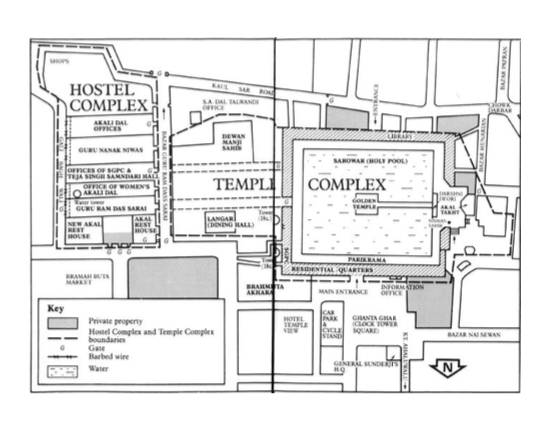
Sketch map of the Golden Temple and hostel complex. [Credits: Amritsar: Mrs. Gandhi’s Last Battle]
The essence of the plan was to separate the hostel complex from the Temple complex, so that the hostels could be evacuated without becoming involved in the main battle. To achieve his prime objective of getting Bhindranwale out of the Temple complex, Dayal had planned commando operations. The commandos were to be supported by infantry. Tanks were only to be used as platforms for machine-guns to neutralise fire on troops approaching the Golden Temple complex, and to cover the Temple exits in case anyone tried to escape.
Major-General Brar said that he ordered artillery to blast off the tops of the three towers. However he decided not to capture the seventeen houses because he did not have ‘the resources to do so’. Firing continued from these houses for days after the Golden Temple complex had been captured. The use of artillery in an area as crowded and densely populated as the old city of Amritsar proved, not surprisingly, to be very costly. Artillery is an ‘area weapon’, used to kill and suppress fire over a wide area, and is not commonly used against special targets. Severe damage was caused to several bazaars, but Brar had to secure the posts commanding the entrance to the Temple and the inside of the Temple itself before he could send his soldiers into the historic headquarters of the Sikh religion.
It was only when he was convinced the approaches to the Temple complex were clear that Brar ordered the tanks to move into the square in front of the northern entrance to the Golden Temple, known as the ghantaghar, or clock tower entrance. One of the tank commanders said, ‘As soon as I turned right from Jallianwala Bagh I heard the tik-tik sound of shells landing on my tank. Over the headphones I got the order to neutralise the fire.’ According to the Lieutenant of the 16th Cavalry, there were four tanks and three armoured cars. He said that Shahbeg Singh appeared to be monitoring their movements because, once the armour was in position, firing from the walls of the Temple stopped. The Lieutenant reported back to his commanding officer that the firing had been neutralised. But as soon as the assault on the Temple started it became clear that Shahbeg Singh’s firepower was far from neutralised.
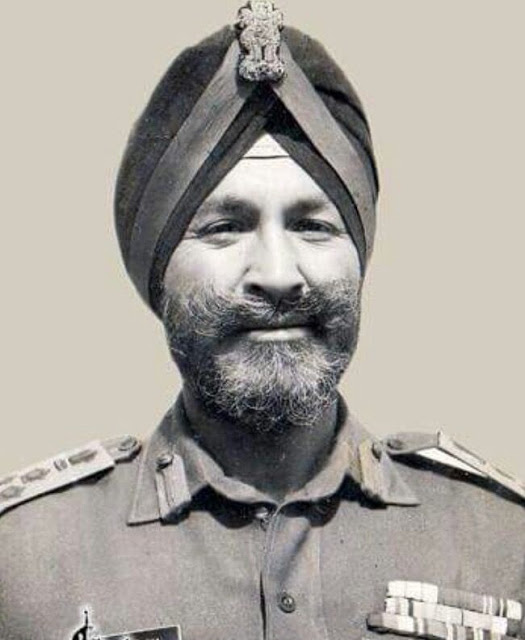
Major-General Shabeg Singh, who was dismissed from the army on corruption charges one day before his retirement. A civil court later acquitted him.
Meanwhile in the narrow alley behind the Akal Takht, those paramilitary commandos who had trained on the model of the Golden Temple complex were trying to get into Bhindranwale’s fortress. This operation was a dismal failure. Some commandos did get on to the roof of the shrine, but they were caught in the crossfire and had to withdraw. For some reason this part of the operation was not mentioned at all by the Generals when they briefed the press after it was all over.
It was between ten and ten-thirty in the evening that Major-General Brar decided he must launch a frontal attack on the Akal Takht. Commandos from the 1st Battalion, the Parachute Regiment, wearing black denims, were ordered to run down the steps under the clock tower on to the parikrama, or pavement, turn right and move as quickly as they could round the edge of the sacred tank to the Akal Takht. But as the paratroopers entered the main gateway of the Temple they were mown down. Most of the casualties were caused by Sikhs with light machine-guns who were hiding on either side of the steps leading down to the parikrama. The few commandos who did get down the steps were driven back by a barrage of fire from the buildings on the south side of the sacred pool. In the control room, in a house on the opposite side of the clock-tower square, Major- General Brar was waiting anxiously with his two superior officers to hear that the commandos had established positions inside the complex. When no report came through he was heard over the command network saying, ‘You bastards, why don’t you go in.’
However he decided not to capture the seventeen houses because he did not have ‘the resources to do so’. Firing continued from these houses for days after the Golden Temple complex had been captured. The use of artillery in an area as crowded and densely populated as the old city of Amritsar proved, not surprisingly, to be very costly. Artillery is an ‘area weapon,’ used to kill and suppress fire over a wide area, and is not commonly used against special targets.
The few commandos who survived regrouped in the square outside the Temple, and reported back to Major- General Brar. He reinforced them and ordered them to make another attempt to go in. The commandos were to be followed by the 10th Battalion of the Guards commanded by a Muslim, Lieutenant-Colonel Israr Khan. This battalion had Sikh soldiers in its ranks. The second commando attack managed to neutralise the machine-gun posts on either side of the steps and get down on to the parikrama. They were followed by the Guards who came under withering fire and were not able to make any progress towards their objective, the Akal Takht. Lt-Colonel Israr Khan radioed for permission to fire back at the buildings on the other side of the tank. That would have meant that the Golden Temple itself, which is in the middle of the tank, would have been in the line of fire. Brar refused permission. He still believed it would be possible to achieve all his objectives, including preserving the Golden Temple and the Akal Takht intact. But then he started to get messages from the commander of the Guards reporting heavy casualties. They had suffered almost 20 per cent casualties without managing to turn the corner of the parikrama to the western side of the complex where the Akal Takht is situated. The Guards were not only being fired at from the northern and western sides. Sikhs would also suddenly appear from man-holes in the parikrama the Guards were fighting from, let off a burst of machine-gun fire or throw lethal grenades, made in the complex itself, and disappear into the passages which run under the Temple. These machine-gunners had been taught to fire at knee-level because Major-General Shahbeg Singh expected the army to crawl towards its objective. But the Guards and commandos were not crawling, and so many of them received severe leg injuries.
Brar then decided on a change of plan. As he said after the battle, ‘I realised that it was difficult for this battalion to progress operations any further and there was no point in them remaining at the ground-floor level. Unless you got on to the first floor and to the rooftop, and got it to control the situation, you would continue suffering casualties. So the task given to them was, under all circumstances, to get a lodgement in spite of all the casualties they had suffered and I must give full credit to the battalion commander, a very dashing young soldier, Lt-Colonel Israr Khan, who rallied his boys together and worked his way up and did succeed in getting an allotment in this particular area.’ That allotment enabled the Guards to neutralise some of the positions on the south side of the tank, but they were still hampered by the order not to fire in any direction which would endanger either of the historic shrines.
The second commando attack managed to neutralise the machine-gun posts on either side of the steps and get down on to the parikrama. They were followed by the Guards who came under withering fire and were not able to make any progress towards their objective, the Akal Takht. Lt-Colonel Israr Khan radioed for permission to fire back at the buildings on the other side of the tank. That would have meant that the Golden Temple itself, which is in the middle of the tank, would have been in the line of fire. Brar refused permission
In spite of the very heavy firing, some of the commandos did manage to get round that corner of the parikrama and make their way to the courtyard in front of the Akal Takht. But they fought their way into a lethal trap. The Akal Takht itself was heavily fortified; there were sandbag and brick gun emplacements in its windows and arches, and holes had been made in its sacred marble to provide firing positions. On either side of the shrine are buildings which overlook the courtyard. They had been fortified too, as had the Toshakhana or Temple Treasury opposite the Akal Takht and the houses which overlooked the building from behind. So when the commandos got into that courtyard, bullets rained down on them from all sides. They were driven back suffering 30 per cent casualties. The courtyard in front of the Akal Takht had been turned, in Major-General Brar’s words, ‘into a killing ground’. To make matters worse, there was no sign of the Madrasis who were meant to be entering the Golden Temple complex from the southern side to form the other half of a pincer movement on the Akal Takht. When it became clear that the Madrasis had either got bogged down or lost in the narrow alleys, Brar asked his superiors for permission to use troops from another Division, the 15th. The infantry from his own division was fully deployed. The Guards were inside the Temple on the northern side, the Madrasis were trying to make their way to the eastern entrance, the Kumaons were clearing the hostel complex, and the Bihars had thrown a cordon round the Temple. Their main responsibility was to ensure that neither Bhindranwale nor any of his followers escaped.
Sunderji and Dayal agreed to reinforcing the operation and so two companies of the 7th Garhwal Rifles were put under Brar’s command. The Garhwals also come from the foothills of the Himalayas in the state of Uttar Pradesh. Brar ordered them to enter the Temple from the southern side and try to relieve the pressure on the Guards and the commandos on the northern side. As soon as they entered the southern gate they came under heavy fire. An officer of the Garhwals said, ‘They seemed to be firing on us from everywhere. It was impossible to know where to fire back.’ But the Garhwals did manage to establish a position on the roof of the Temple library. Their commanding officer reported this to his Brigadier, A.K. Dewan.
Dewan was very much a soldier’s soldier, always wanting to be in the thick of it. His nickname was, surprisingly, Chicken. Apparently he was called Chicken when he was an officer cadet because he had a very long and thin neck. The Brigadier should have left the fighting inside the complex to the battalion officers, but he could not resist the temptation to join in himself. The Lieutenant-Colonel commanding the Garhwals tried to dissuade him, saying that his men were under very heavy fire, but this was an added attraction for Dewan. When he got into the Temple he reported to Major- General Brar on the wireless. Brar, whose temper was wearing a little thin by this time, could be heard over the whole network shouting at Dewan: ‘What the hell are you doing in there? I am in command of this operation. You don’t move without my orders.’
The Akal Takht itself was heavily fortified; there were sandbag and brick gun emplacements in its windows and arches, and holes had been made in its sacred marble to provide firing positions. On either side of the shrine are buildings which overlook the courtyard. They had been fortified too, as had the Toshakhana or Temple Treasury opposite the Akal Takht and the houses which overlooked the building from behind. So when the commandos got into that courtyard, bullets rained down on them from all sides.
Then Brar calmed down and asked Dewan to stay inside and let him have a sitrep as soon as possible. Dewan realised that it was very unlikely that the Guards and the commandos would be able to achieve their objective. But he did reckon that his position on the southern side was fairly secure and that if he could reinforce it, he might be able to storm the shrine. When he reported this back to Brar he was given permission to call up two companies of the 15th Kumaons. By this time the operation had been in progress for about two hours and Brar was nowhere near achieving his objective. His short, sharp commando operation had got bogged down; so he decided to allow Dewan to fight his own battle inside the Temple complex.
Dewan made repeated attempts to storm the Akal Takht but each time the Kumaons or Garhwals turned the corner of the parikrama and ran into the courtyard in front of the Akal Takht, they came under withering fire and had to retreat. Dewan himself was striding up and down the southern side of the parikrama encouraging his men. But their task was impossible. Although both the northern and southern sides of the parikrama were by now in the control of the army, they had not been able to make any impression on the main fortress and the defences surrounding it, and the four companies had suffered 137 casualties. Of course they were still hampered by the order not to fire in any direction which would endanger the Golden Temple.
![General Kuldip Singh Brar, General Krishnaswamy Sundarji and General AS Vaidya at the Golden Temple after Operation Bluestar. [Credit: Gateway to Sikhism Foundation]](http://indianhistorycollective.com/wp-content/uploads/2021/06/3genmain.jpeg)
General Kuldip Singh Brar, General Krishnaswamy Sundarji and General AS Vaidya at the Golden Temple after Operation Blue Star. [Credit: Gateway to Sikhism Foundation]
There was no way anyone could get into that fortress without taking out its defences first. Dewan’s repeated charges were as futile as the charge of the Light Brigade, and he now realised it. He got on the wireless and told Brar that he would have to call up tanks to bombard the Akal Takht. He said, ‘I can’t afford to lose any more men. I can’t accept defeat.’ Brar later told the press his version of what happened next:
Although both the northern and southern sides of the parikrama were by now in the control of the army, they had not been able to make any impression on the main fortress and the defences surrounding it, and the four companies had suffered 137 casualties. Of course they were still hampered by the order not to fire in any direction which would endanger the Golden Temple.
Sunderji’s reaction was not instantaneous. He first contacted Delhi where a special operations room had been set up to keep track of the battle. The Deputy Defence Minister, K.P. Singh Deo, a former army officer himself, was in charge, assisted by Rajiv Gandhi’s most trusted aide, Arun Singh, who, although not a practising Sikh, came from one of the Punjab royal families. The army and the government were now faced with a dilemma. Sunderji had always insisted that the operation must be completed by daybreak, otherwise his men inside the Temple would be sitting ducks for Bhindranwale’s snipers. There could be no question of withdrawing and trying again the next night, because the news that Bhindranwale and Shahbeg Singh had forced the Indian army to withdraw would certainly leak out somehow. That would have disastrous consequences in the villages of Punjab and among Sikhs in the army. The only answer seemed to be tanks. They were the only equipment with the firepower and the accuracy to blast a way into Bhindranwale’s fortress. But tanks meant that the army would fail in one of its tasks – the preservation of the Akal Takht. They also meant the horrifying prospect of one mistake by a gunner seriously damaging the Golden Temple itself. In the end Delhi agreed that the tanks should be used and a message was sent back to Lieutenant-General Sunderji, nearly two hours after Chicken Dewan had asked for them.
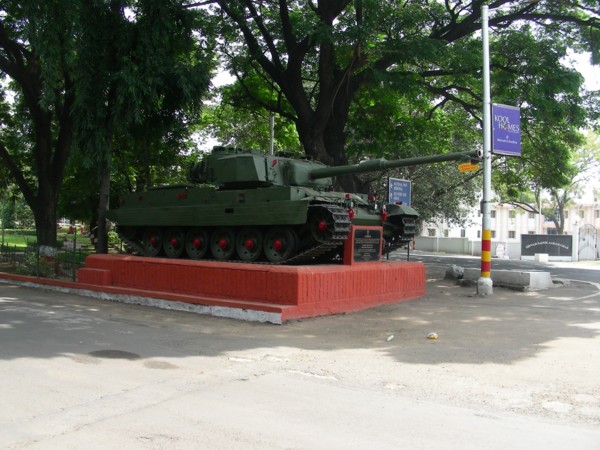
Vijayanta Tanks used in the operation.
In the meanwhile Major-General Brar had made one more effort to get his men into the Akal Takht. He called up a Skot OT64 armoured personnel carrier. Tanks had to break down the steps leading to the parikrama from the hostel side so that the eight-wheeled, Polish-built APC could get in. The aim was to drive the APC right up to the Akal Takht so that the men from the mechanised infantry, one of the newest units of the Indian army, could get into the fortress under the cover of its wall. But as the armoured personnel carrier approached the Akal Takht it came under fire from two Chinese-made, rocket-propelled grenade launchers. One of the grenades found its target and the armoured personnel carrier was knocked out. The Captain commanding the platoon was wounded.
This forced the Generals to rethink their strategy once again. They had no intelligence reports of Shahbeg Singh having armour-piercing weapons at his disposal. Even the tanks, which had by now made their way on to the parikrama to await government clearance to open fire, were now at risk, although the maximum armour of the tanks was more than twice as thick as the APC’s. The tanks had been trying to blind the marksmen in Bhindranwale’s fortress with their searchlights. As soon as Brar realised that the enemy had armour-piercing weapons, he ordered the tank commanders to switch off their searchlights. The tanks had ploughed up the parikrama, each of whose marble slabs was inscribed with the name of the devotee who had donated it to the Temple.
Sunderji had always insisted that the operation must be completed by daybreak, otherwise his men inside the Temple would be sitting ducks for Bhindranwale’s snipers. There could be no question of withdrawing and trying again the next night, because the news that Bhindranwale and Shahbeg Singh had forced the Indian army to withdraw would certainly leak out somehow…The only answer seemed to be tanks. They were the only equipment with the firepower and the accuracy to blast a way into Bhindranwale’s fortress.
The Vijayanta was the army’s main battle tank, being an Indian-built version of the Vickers 38-ton tank. When the orders came, they opened up with their main armament. Photographs of the shattered shrine indicate quite clearly that the Vijayantas 105 mm. main armaments pumped high- explosive squash-head shells into the Akal Takht. Those shells were designed for use against ‘hard targets’ like armour and fortifications. When the shells hit their targets, their heads spread or ‘squash’ on to the hard surface. Their fuses are arranged to allow a short delay between the impact and the shells igniting, so that a shock-wave passes through the target and a heavy slab of armour or masonry is forced away from the inside of the armoured vehicle or fortification. Lieutenant- General Jagjit Singh Aurora, who studied the front of the Akal Takht before it was repaired, reckoned that as many as eighty of these lethal shells could have been fired into the shrine. The advantage of a tank’s main armament is that it fires with pinpoint accuracy. Indian army officers talk of the Vijayanta’s ability to post shells through letter-boxes.
The effect of this barrage on the Akal Takht was devastating. The whole of the front of the sacred shrine was destroyed, leaving hardly a pillar standing. Fires broke out in many of the different rooms blackening the marble walls and wrecking the delicate decorations dating from Maharaja Ranjit Singh’s time. They included marble inlay, plaster and mirror work, and filigree partitions. The gold-plated dome of the Akal Takht was also badly damaged by artillery fire. At one stage during the night Major-General Brar had ordered his Colonel (Administration) to mount a 3.7-inch Howell gun on to the roof of a building behind the shrine and fire at the dome in an attempt to frighten the Sikhs into surrender. Brar explained to his Colonel, ‘Maybe the noise and the sting will have its effect.’
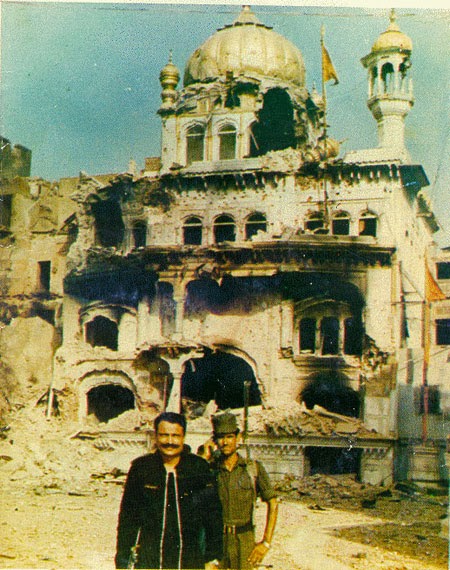
Damaged front facade of the Akal Takht after the operation.
The artillery did not scare Bhindranwale’s men; but the tank barrage was a different matter. The effect it must have had is impossible to imagine. As shockwave after shockwave rocked the building, the gallant, if misguided, defenders must have feared it was going to come down on top of them. Deafened by the explosions, they were driven to the back of the building by the flames and falling masonry. The deadly machine-gun fire which had been raining down on the army stopped.
Still sporadic resistance continued from some of the buildings overlooking the courtyard in front of the Akal Takht. By now it was light and Brar decided it was too dangerous to make the final assault necessary to re-establish control over the shrine from which Bhindranwale and Shahbeg Singh had withstood the Indian infantry attack. So Brigadier Dewan was ordered not to follow up the tank attack until darkness fell again. The three Generals at the command post knew that they had knocked out Bhindranwale’s fortress, but they still faced the agonising possibility that the Sant himself might have escaped.
The effect of this barrage on the Akal Takht was devastating. The whole of the front of the sacred shrine was destroyed, leaving hardly a pillar standing. Fires broke out in many of the different rooms blackening the marble walls and wrecking the delicate decorations dating from Maharaja Ranjit Singh’s time. They included marble inlay, plaster and mirror work, and filigree partitions. The gold-plated dome of the Akal Takht was also badly damaged by artillery fire.
After the battle Brar told the press that only one tank had been driven on to the parikrama, and that it had only fired its secondary armament, a 7.62 mm. machine-gun. But the damage to the Akal Takht tells a different story. There was no machine-gun which could have brought down so much masonry, and the shell marks were clearly those of high- explosive squash-heads. As for the number of tanks involved, other officers Satish Jacob talked to said that as many as six were brought into the complex. As one Vijayanta only carries forty-four rounds of main armament ammunition, it is certain that more than one was used. It also seems likely that the gunners fired from more than one position because the Golden Temple itself was in their arc of fire, standing as it does in the middle of the sacred tank.
The battle for the Akal Takht was not the only one raging that night. Across the road running along the eastern side of the Golden Temple complex, another battalion of the Kumaon Regiment was involved in the second operation that Lieutenant-General Sunderji had been ordered to carry out. He had been told by the government to ‘prevent internecine fighting between the two major groups lodged in the Temple and the hostel complexes, the one of Jarnail Singh Bhindranwale and the second of Mr Longowal and his followers’. To prevent the two groups fighting each other, the Generals had decided that the hostel complex housing Longowal and his men must be cleared at the same time as the Golden Temple.
The first problem was to get into the complex. The iron gates at the top of the public road between the hostels and the Temple had been barred. A tank had to break them down. Armoured cars were then positioned along that road to separate the two battlefields, and the 9th Kumaons moved in. They came under fire from the roofs on both sides of the road but unlike their colleagues inside the Temple complex, they managed to fight their way into the buildings they had been ordered to clear.
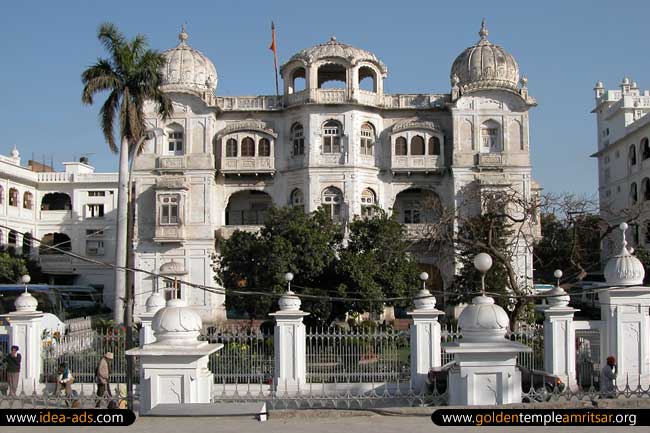
The Teja Singh Samundri Hall, Amritsar, which preserves the bullet marks from Operation Blue Star.
Most of the terrified pilgrims, supporters of the Akali Morcha, and of course the two members of the Akali Trinity with their staff were huddled together in two buildings. They were without water because the water tower had been destroyed during the preliminary operations, and without electricity. Longowal, Tohra, and some of their senior colleagues were in Tohra’s office on the ground floor of the Teja Singh Samundari Hall. The SGPC Secretary, Bhan Singh, later described the situation in that building:
The army entered the Teja Singh Samundari Hall at about one o’clock in the morning. According to one officer, Tohra and Longowal were in their vests and underpants. The army says they surrendered. Bhan Singh did not accept that statement. He said, ‘We did not give ourselves up. The army forced its way in and took us prisoners.’ That is really just a matter of semantics. What is absolutely clear is that Longowal and Tohra made no attempt to resist the army.
Across the road running along the eastern side of the Golden Temple complex, another battalion of the Kumaon Regiment was involved in the second operation that Lieutenant-General Sunderji had been ordered to carry out. He had been told by the government to ‘prevent internecine fighting between the two major groups lodged in the Temple and the hostel complexes, the one of Jarnail Singh Bhindranwale and the second of Mr Longowal and his followers’.
The Akali leaders were kept inside one of their offices. The rest of the people in the building were ordered to come out and sit in a courtyard of the Guru Ram Das Hostel. According to Bhan Singh, there were about 250 of them. Some terrorists, seeing the people pouring out of the offices and surrendering, threw a grenade at them. Bhan Singh explained what happened.
The White Paper admitted that seventy people including thirty women and five children died in that incident; but the government put all the blame on the terrorists, saying nothing about the army firing.
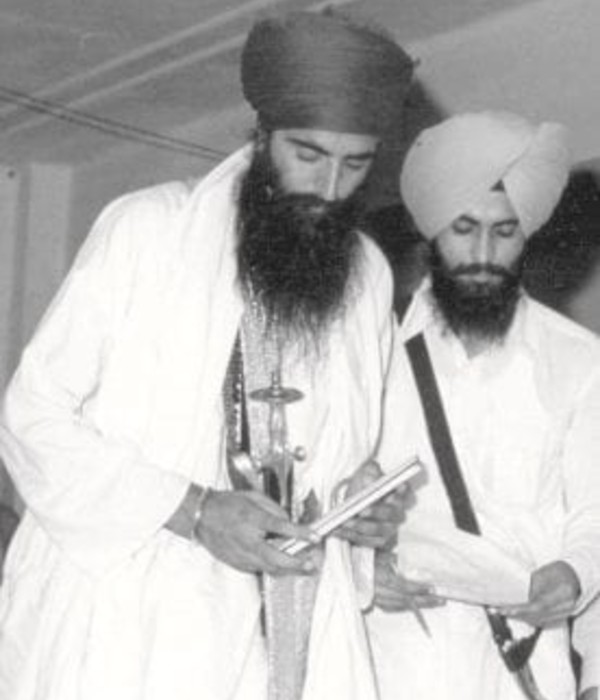
Harminder Singh Sandhu, Bhindrawale’s interpreter and close associate, General Secretary of All India Sikh Students’ Federation. [Credit: sikh24.com]
Bhan Singh also told the journalist and historian, Khushwant Singh, that the army did shoot some of the young men they had brought out from the Teja Singh Samundari Hall. He said:
But not everyone the army rounded up in the Teja Singh Samundari Hall was innocent. Among those who surrendered was Bhindranwale’s talkative young interpreter, Harminder Singh Sandhu, who was also the General Secretary of the All India Sikh Students Federation. When I had seen him on the day before the army action started, he had boasted, ‘Every one of Santji’s followers will lay down their lives to save the Golden Temple.’ But when the time came Harminder Singh Sandhu surrendered meekly.
Bhan Singh also told the journalist and historian, Khushwant Singh, that the army did shoot some of the young men they had brought out from the Teja Singh Samundari Hall. He said: “I saw about thirty-five or thirty-six Sikhs lined up with their hands raised above their heads. And the major was about to order them to be shot. When I asked him for medical help, he got into a rage, tore my turban off my head, and ordered his men to shoot me.”
Inside the Guru Ram Das Hostel, where the rooms were crowded with pilgrims, conditions were reminiscent of the Black Hole of Calcutta. The school teacher Ranbir Kaur and her husband had locked themselves into Room 141 with the twelve children they were looking after. Ranbir Kaur said:
The Kumaon Regiment also entered the Hostel at about one o’clock in the morning and ordered everyone to come out; but this was not the end of their ordeal. Ranbir Kaur described what happened next.
The people in the basement were Muslims from Bangladesh who had nothing to do with the Akali agitation. They were non-Bengalis known as Biharis, who had sided with the Pakistan army during the liberation struggle in 1971, and had been living in refugee camps in Bangladesh for the last thirteen years. The Pakistan government had refused to accept responsibility for any more Biharis and so Bhindranwale and his followers were operating a profitable sideline smuggling them across the border.
Two young Sikhs, Sardul Singh and Maluk Singh, who had gone to the Golden Temple to celebrate Guru Arjun’s martyrdom day, were not released when the army entered the hostel. An elder from their village wrote to the Sikh President of India, Zail Singh, about their experiences. In his letter the elder, Sajjan Singh Margindpuri, said:
The five survivors of that night of horror were arrested by the army and taken away to interrogation camps. So were Ranbir Kaur, her husband, and the children in their care. Two months later three of the children that Ranbir Kaur had been looking after were released after a well-known social worker had filed a petition in the Supreme Court in Delhi. Ranbir Kaur was released at the end of August. She rejoined the three children who had been released but no one could tell her what had happened to the other nine.
The five survivors of that night of horror were arrested by the army and taken away to interrogation camps. So were Ranbir Kaur, her husband, and the children in their care. Two months later three of the children that Ranbir Kaur had been looking after were released after a well-known social worker had filed a petition in the Supreme Court in Delhi. Ranbir Kaur was released at the end of August. She rejoined the three children who had been released but no one could tell her what had happened to the other nine.
Speaking later of the battle of the hostel complex, Major- General Brar said:
That claim is not borne out by eye-witness accounts.
This excerpt has been carried courtesy the permission of Mark Tully. You can buy Amritsar: Mrs Gandhi’s Last Battle here.
ARCHIVE
The Romance of Power
I
The city was still—the trams, the trees whose leaves were covered with a film of dust, the junctions, Lower Circular and Lansdowne road, the three-storeyed houses on Southern Avenue, the ten-storeyed buildings on Ballygunge Circular Road. Soon the machinery would start working again, not out of any sense of purpose, but like a watch that has been wound daily by someone’s hand. Almost without any choice in the matter, people would embark upon the minute frustrations and satisfactions of their lives. It was at this moment of postponement that the azaan was heard, neither announcing the day nor keeping it a secret.
Amit Chaudhuri, Freedom Song
In Holy Bondage
1977 was an unusual year in Indian politics—not just for the country as a whole but also for West Bengal. The extraordinariness of that ‘magical year’ manifested itself in the ascendancy of a new set of rulers in Delhi and Calcutta, in the beginnings of a political culture that has lived ever since. The political convulsions hit India’s oldest party hard, and one of its most charismatic leader, Indira Gandhi, bit the dust. The Congress prime minister and architect of the infamous Emergency lost the general elections to a coalition of diverse political parties, ranging from Right to Left. The winners laid down a plinth, though somewhat fragile, for multi-party coalition rule, bringing the curtain down on three decades of Congress monopoly over governance at the Centre.
Within a span of three months, Indian political parties put together new power structures that resembled nothing we had seen in the past. In March that year a Janata government headed by Morarji Desai, supported by the CPI-M from outside, took charge of the Central government. Three months down the line the hammer-and-sickle-emblazoned flag of the Communist Party of India (Marxist) was flying high from the seat of power in West Bengal. Trouncing the Congress and its infamous Chief Minister Siddhartha Shankar Ray, a CPI-M-led Left Front government — the state’s new ruling ‘elite’ – embarked on an uninterrupted journey of thirty-three long years, a journey that still continues. The Left Front won 230 seats and a 54 per cent vote share in the 294-member Assembly. The CPI-M on its own ratcheted up a clear majority; what a fall it was for the high and mighty Congress, suddenly finding itself stripped down to 20 seats with a mere 23 per cent vote share.
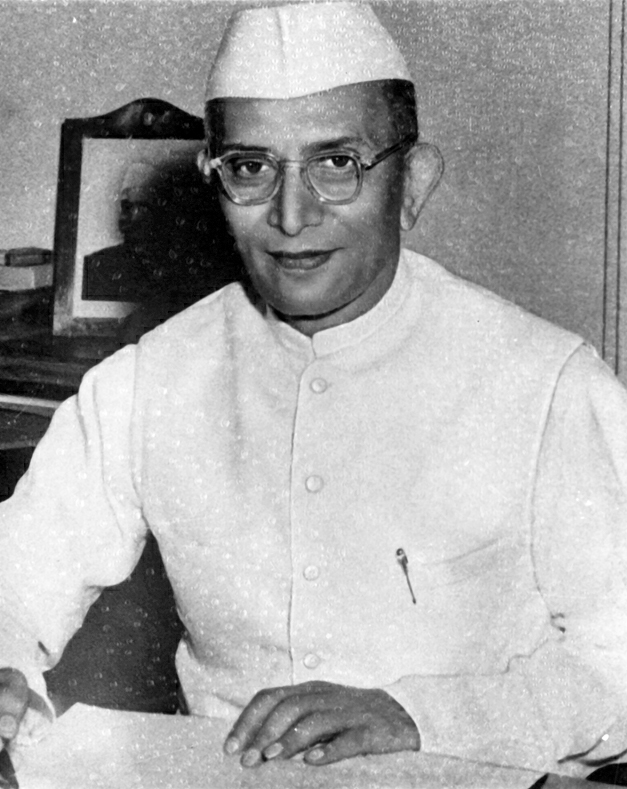
Morarji Desai, who replaced Indira Gandhi as Prime Minister in 1977.
Who would have imagined such a stunning change of political equations? Who would have believed the ‘party of struggle’ would be in the seat of governance for the next three decades; that it would walk a tightrope, balancing contradictions arising out of its past history and present obligations? In the years and decades to come, compulsions of governance would increasingly collide with the politics of militant struggle, in the process making the ‘revolutionary’ party an expert at doublespeak. The compulsions of governance landed the CPI-M in a predicament it would hardly have anticipated. With each passing year in Writers’ Building, the CPI-M found it more and more complex to balance the obligations of governance with its core politics of struggle. The doublespeak became inevitable as the party grappled with contradictory pulls and tried to address the conflicting needs by adopting multi-layered strategies.
But that is a story that would unfold later.
Back in June 1977 it was a moment of relief and euphoria for the victorious Marxists. Not only were their days of being on the run over, it was an hour of ‘sweet revenge,’ when the party could call the shots from West Bengal’s citadel of power. In that moment of glorious victory the CPI-M spoke a language of assurance and promise that eventually disappeared. Chief Minister Jyoti Basu promised to run his government not from Writers’ Building, the imposing red brick building built by British designer Thomas Lyon in 1780, but from run-down villages and dusty small towns scattered through West Bengal.
Back in June 1977 it was a moment of relief and euphoria for the victorious Marxists. Not only were their days of being on the run over, it was an hour of ‘sweet revenge,’ when the party could call the shots from West Bengal’s citadel of power. In that moment of glorious victory the CPI-M spoke a language of assurance and promise that eventually disappeared.
In the flush of victory Jatin Chakraborty, the Left Front government’s public works minister, painted bright scarlet the dome of Calcutta’s iconic Shaheed Minar, rising regally from the grounds of the Maidan. To me and in the perception of the public, the sudden burst of aesthetic defiance was like swishing a red cloth in front of the Congress! The sight of the red dome glinting in Calcutta’s scorching sun did not go down well with the Bengalis. Hissing under their breath each time the gleaming red turret came into their line of vision, they cursed Chakraborty, responsible for sullying one of Calcutta’s prized monuments and creating an eyesore. An incessant lament over the disfigurement and the ‘unaesthetic, propagandist’ souls of the ruling communists!
As the fresh coat of paint began to dry under a merciless Calcutta sun, the Left Front got down to its mammoth and daunting job of governance. The first ten years felt like walking on a bed of hot coals, a legacy left by the Congress.
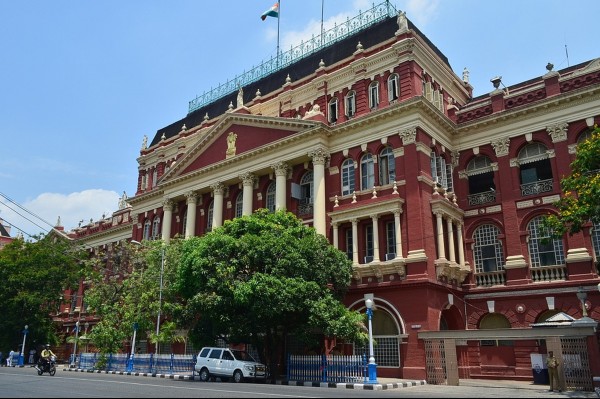
Writers’ Building, Kolkata. Photo Credit: Matt Stabile, Flickr.
In the collective memory of West Bengal, 1977 was a special year. During the previous five years people had watched in disbelief the frenzy of political violence—the bloody clashes masterminded by the Siddhartha Shankar Ray government. Tens of thousands of CPI-M cadres had lived in the depths of shadows, chased and hounded by the ruling Congress. The relentless terror had groomed the CPI-M well to withstand the assault of the Emergency. When Indira Gandhi trained her guns on her opponents, the Marxists tested by fire, trained in the teeth of violence, were more than equipped to counter the excesses of the Emergency. ‘The intensity of state repression unleashed in the city [Calcutta] between 1970 and 1973 was of such magnitude that, unlike many other parts of India, Calcutta saw little in the year and a half of the Emergency to add to what it already knew about the ways of an authoritarian regime,’ writes political scientist Partha Chatterjee. In West Bengal more than 18,000 people had been rounded up under the Maintenance of Internal Security Act (MISA). Perhaps few other Indian states were then so torn by political violence. When the Left Front won the people’s mandate it inherited a state in tatters, where everything apart from violence seemed to have come to a standstill. Once considered among the best educational institutions in the country, Calcutta University was haemorrhaging. Examination schedules were running late by more than a couple of years. Results were delayed long enough to prevent students from applying to universities outside West Bengal. At Calcutta University’s Department of Ancient History and Archaeology, where I did my post-graduation between 1978 and 1979, students of Law College, next to our department, often spoke of the rough times. ‘This was where a bomb exploded that morning. I had just come in. Chhatra Parishad (Congress’s student wing) activists were on the other side. They hurled a bomb. It was all smoke. Students ran for cover,’ said Parthada, a student of Law College. (Since he was a couple of years older than me I had succumbed to the Bengali tradition of adding a ‘da’ after his name)
Parthada spoke of many similar mornings when lecturers and students fled classes as activists of the Chhatra Parishad and SFI hurled bombs at each other, across the street. In 1978 I found it difficult to imagine the delirium of violence described by him. The street outside my department hummed with normalcy – with its steady stream of traffic, buses and cars honking madly, the rush of chattering students. I often thought Parthada, despite his cut-and-dried, pragmatic Marxism, secretly nurtured the imagination of a storyteller.
In West Bengal more than 18,000 people had been rounded up under the Maintenance of Internal Security Act (MISA). Perhaps few other Indian states were then so torn by political violence. When the Left Front won the people’s mandate it inherited a state in tatters, where everything apart from violence seemed to have come to a standstill.
But repairing the badly damaged system took time. My MA examination in archaeology, scheduled in 1980, was held two years later. The chief minister said the government was doing its best to bring the examination schedule back on track. The backlog was stunningly high. The results almost never came on time. It was not just the education system that was mangled—essential services like electricity supply were in a complete mess. I remember studying by the light of lanterns through much of my school and college days. The Calcutta State Electricity Board, crippled by a chronic shortage of power supply, plunged the city into darkness after the sun went down. Through the day you sweated and grumbled. Generators were yet to become part of household furniture. Summers, always agonising in Calcutta with its heat and humidity, became excruciating with long stretches of power cuts. Fans would suddenly taper off to a halt as we wrestled with Brahmi and Kharoshthi scripts in epigraphy and inscription classes. Calcuttans had to submit themselves to a gruelling regime of rationed power. Each area had its daily chart of power cuts, which turned your fans and lights off at least twice, for a minimum of a couple of hours. Often unscheduled power cuts would drag on for five to six hours, if supply from the Damodar Valley Corporation’s mega thermal power plant dried up. Sometimes for half the night you would battle droning mosquitoes, fanning yourself with newspapers. The sale of hathpakhas (hand fans) made of bamboo prospered. I remember days when I would leave home hot and sticky, have a few hours respite at the department till load-shedding struck and then return home to darkness. It seemed Calcuttans were mandated to spend their evenings in the flickering shadow of candlelight. In buses and local trains people cursed the government and the power supply, spinning yarns and jokes around the ubiquitous phenomenon of load-shedding which dictated their lives.
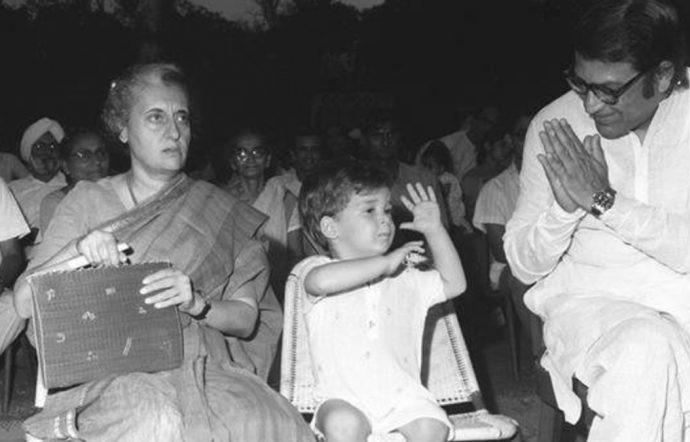
Siddhartha Shankar Ray (Right), CM of West Bengal from 1972 – 1977, pictured with Indira Gandhi. Photo Credit: Twitter.
Calcuttans did not just have to plough through the darkness; the mayhem on the city’s roads made travel an agonising ordeal. The city was being turned upside down to build India’s first and Asia’s fifth underground metro railway; its faltering, chaotic construction went on for years. People dreaded hitting the roads, which looked like they had been bombed. Traffic was a crazy maze in which buses and cars would stay knotted for hours on end, without moving an inch. Work went on endlessly inside trenches dug at crucial traffic junctures, where the tangle of vehicles was especially thick. Through the pile of mud and rubble people would make their way. Suddenly the rains would come, flooding the trenches, leaving the ground slushy. Metro traffic cops, the kind we see around Delhi’s Metro construction sites, standing to attention and waving road diversion signs, did not exist. There were no signboards indicating what lay ahead on the jagged stretch of road. Anyway Calcutta never had the luxury of road space like Delhi to flag off endless diversionary routes. So traffic mayhem raged unchecked.
In Freedom Song author Amit Chaudhuri describes a deadly traffic jam, which was fast becoming to Calcutta what local trains were to Mumbai and DTC (Delhi Transport Corporation) buses to Delhi.
But repairing the badly damaged system took time… The backlog was stunningly high. The results almost never came on time. It was not just the education system that was mangled—essential services like electricity supply were in a complete mess.
`It took them forty-five minutes to negotiate Circular Road, Chowringhee, the junction before Bentinck Street and finally to pass Mahajati Sadan and to arrive at the small lane on the left. By then, they felt they’d come to what was probably another city. Just on the right what looked like a deep ditch had been dug in Central Avenue, where actually unfinished work for the underground had been begun and then interrupted. Although the ditch almost looked fearful, there were in fact two children playing and rushing upon it, climbing from one side to the other and then disappearing again’. This ‘jam’ as it was called in popular parlance, became the emblem of Calcutta long before any of the other metropolises had even heard of it.
The genesis of Calcutta Metro went back to 1949 when West Bengal’s first Chief Minister Bidhan Chandra Ray planned it. Two decades later in 1972, Prime Minister Indira Gandhi laid the foundation stone. It took almost another two years for the work to start. Dogged by lack of funds, court injunctions, shifting of underground facilities, the work continued with long pauses in between. After the Left Front government came to power the people waited another seven years for the Metro to start even a partial service. And meanwhile the Calcutta Metropolitan Development Authority, which really had nothing to do with the digging, became in popular rendering khurchhi maati dekhbi aaye (come, watch us digging earth).
*
Jyoti Basu had inherited a badly messed up state from his Congress predecessor, which had to be cleaned up fast. Expectations were running high. Communists, yet to metamorphose into ‘power junkies’, had a clean and pro-poor image, unlike their predecessors, known to be a refuge for the rich and influential.
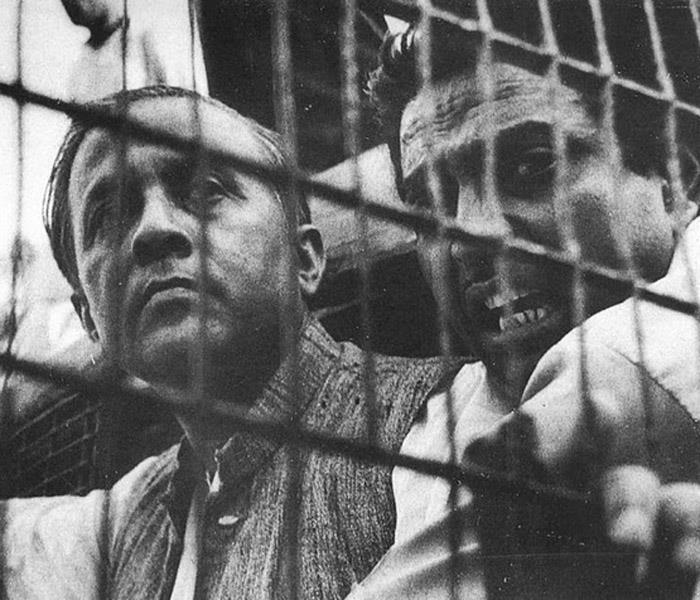
Jyoti Basu (Left) during his days of activism. Photo Credit: Communist Party of India (Marxist), Facebook.
The educational system had to be overhauled on a priority basis. Bit by bit university examinations reclaimed their schedules on the academic calendar. Students received degrees in time for them to appear in competitive examinations outside the state. The power situation started improving. Summers became bearable as fans and lights stopped playing whimsical pranks. Street lights came on and stayed that way. Lanterns were tucked away; candles were brought out only on special occasions. Calcutta moved from ‘darkness to light’ and the term ‘load shedding’ gradually lost its currency in conversations. It took the Left Front government time but it finally managed to retrieve the power sector from the depths of darkness; effectively enough to provide West Bengal with a surfeit of electricity. However, an apprehension that load shedding could return with a vengeance once factories started functioning, lurked somewhere at the back of the mind.
The raw political violence that lashed Calcutta for more than a decade ebbed. The macho aggression displayed by the Congress in the early 70s disappeared with the Assembly election results. Parts of Calcutta that had been swathed in smoke from explosions of crude bombs, ‘off-limits’ for youngsters, reclaimed their normal rhythm. But the spirit of violence, like the spirit of resilience, has a way of surviving. The oxygen of violence on which the politics of that decade survived and flourished never ran out of reserves; not even after the Left Front government brought enduring stability to the state. Violence was merely tamed and brought under control. West Bengal till today has the highest incidence of political violence.
But the spirit of violence, like the spirit of resilience, has a way of surviving. The oxygen of violence on which the politics of that decade survived and flourished never ran out of reserves; not even after the Left Front government brought enduring stability to the state. Violence was merely tamed and brought under control.
How do I describe this city of dreams, madness and desire?
On the body of each city are etched the marks of identification by which it wants to be recognised and known. Suketu Mehta writes in his book Maximum City: Bombay Lost and Found, ‘The history of each city is marked by a catalytic event just like each life has a central event around which it is organised. For New York it is now September 11, 2001, attacks on the World Trade Center. For the Bombay of my time it is the riots and the blasts of 1993. Bombay was spared the horrors of Partition in 1947’. He then adds, ‘But there was an earlier trauma in the psychic life of the city, which marked the before and after for old-timers: the explosion of the Fort Stikine on 14 April 1944…. Fort Stikine, a ship carrying bales of cotton, a secret cargo of gold and silver and wartime explosives caught fire and went up in smoke as it stood in the harbour waiting to be docked. The sky over Bombay was filled with gold and silver, masonry, bricks, steel girders and human limbs and torsos flying through the air as far as Crawford Market,’ writes Mehta.
When I try to think of the catalytic events that made Calcutta what it is today, simply too many of them jostle for attention: the stormy agitation against the one paise hike in tram fare in the heart of Calcutta, killings of CPI-M activists by the Siddhartha Shankar Ray government, the slaughter of Marxist-Leninist cadres by the men of the CPI-M and the Congress, the birth of the Left Front government, the announcement of Operation Barga and then the hail of bullets putting to death resisting peasants at Nandigram…
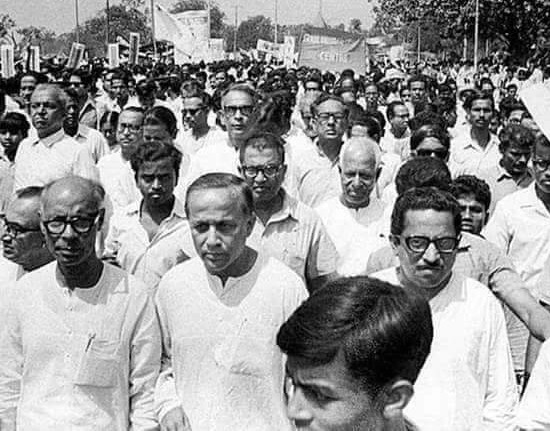
Jyoti Basu at the head of a march along with other leaders of the Left Front government. Photo Credit: Surjya Kanta Mishra, Twitter.
The Left Front’s raison d’etre, which actualised itself with Operation Barga, was lost forever at the barricades of Nandigram. The two developments were woven by a special bond – a history of land reforms, initiated in 1977. Later in the book, I will talk about how the reforms were derailed a decade later, how the ruling CPI-M lost the will to carry them to their logical conclusion. For the moment let me return to 1977 and the landmark Operation Barga. Few people, even dyed-in-the-wool supporters of the Left, would have believed the Marxists would preside over the state for more than three decades. Given its past experience of President’s Rule and sudden dismissals of state governments by the Congress at the Centre, the Left Front was looking at a short run on the pitch. Its aim was simple: initiate landmark policies carving out a political and electoral niche as a buffer against storms in the future; an investment necessary to reap dividends later.
Not the first instance of land reforms in the state, the Left’s ascendancy definitely unleashed for the first time a sincere effort to implement them.
The Left Front’s raison d’etre, which actualised itself with Operation Barga, was lost forever at the barricades of Nandigram. The two developments were woven by a special bond – a history of land reforms, initiated in 1977.
Between 1972 and 1977 the Congress regime of Siddhartha Shankar Ray had listlessly dabbled in land reforms without any serious inclination to implement them. The Land Reform Act was amended as far back as 1955. The Congress government had even passed legislation to introduce a three-tier panchayat system. The decisions, which would have significantly changed the power structure in rural Bengal, remained on paper till the Left Front government won the elections. The Front had gone to the Assembly polls with a 36-point programme which included promises of land reforms, reorganisation of Panchayati Raj, improvement in agriculture, new roads, better irrigation system, safer drinking water, improvement in health and education systems. When the CPI-M came to power in 1977, it did not anticipate the destiny that would unfold over the next three decades; never did it perceive itself as running a State government year after year. The leadership readied itself for a short stint in power—at best a five-year term, at worst a sudden guillotine by the Centre. Undoubtedly the party was under pressure to bring about, in what it perceived as borrowed time, a qualitative change in the balance of power, fulfil its ideological commitment as well as build a solid reservoir of political and electoral support. The CPI-M gave land reforms top priority, combining its ideological belief with the need for a mass social base. It must be remembered that even during the earlier United Front governments in the late 1960s, the CPI-M had made agrarian reforms its main plank. The food movement, the engine of change, created a groundswell of support for the party, enhancing its credibility and image as an ally of the poor. Under the leadership of Land Reform Minister Harekrishna Konar, the party had seized large tracts of benami land, tilting the power balance in favour of the poor in the countryside. But once the United Front governments collapsed, retaining these gains became difficult. After coming to power this time round, the Left Front wanted to ensure that the changes would endure: Operation Barga was a milestone in this direction, a wise strategic political investment, which, as time passed, became the fulcrum of the Left Front’s continued existence at the helm of power.
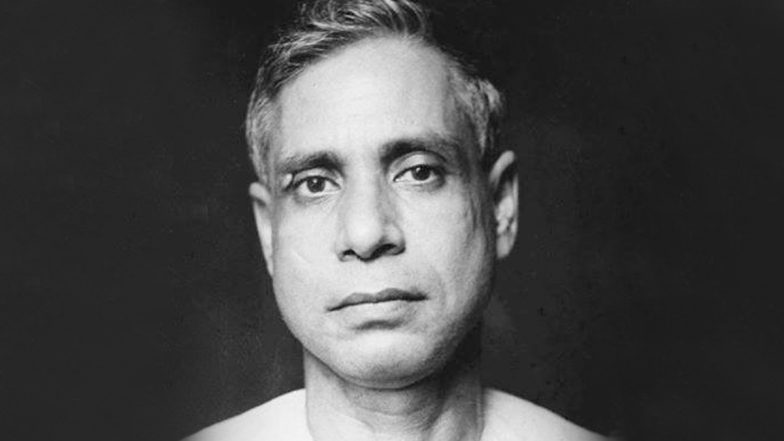
Ajoy Mukherjee, leader of the Bangla Congress and Chief Minister of Bengal in the United Front government.
Operation Barga set in motion this process of building the indispensable political tools the party used to electorally preserve itself so well. An expansive, well-knit network, politicised to the hilt stood at the beck and call of Alimuddin Street, ready to execute every command. The sharecroppers registered under the programme were provided with protection from eviction and given their due share of crop under the Land Reform Act. The Left Front government mobilised the bureaucracy and the party cadres on a war footing to put the programme in place. Side by side the CPI-M organised elections to the country’s first three-tier panchayat structure. ‘Prior to 1977, only some 275,000 sharecroppers had bucked the rural power structure and registered. By December 1985 as many as 1.3 million of the estimated 2 million West Bengal sharecroppers-96 per cent of all `tenants’—were recorded,’ writes T J. Nossiter of Operation Barga. Later I will talk at length about the CPI-M’s manipulation of the institution of panchayati raj and its subsequent abandonment of land reforms.
The leadership readied itself for a short stint in power—at best a five-year term, at worst a sudden guillotine by the Centre. Undoubtedly the party was under pressure to bring about, in what it perceived as borrowed time, a qualitative change in the balance of power, fulfil its ideological commitment as well as build a solid reservoir of political and electoral support. The CPI-M gave land reforms top priority, combining its ideological belief with the need for a mass social base.
Before June 1977 the world of constitutionality and governance was far removed from the CPI-M’s concerns. If anything, the party was engaged in direct conflict with that world. Inside the secretariat it was time to shift to Plan B. Disengaging itself bit by bit from the path of struggles the new ruling elite, in the beginning, leveraged the state machinery to provide relief to the people but gradually that gave way to something else: being in power became the means to endlessly reproduce itself. Cynical manipulation of power saw an end to the romantic age of innocence as the CPI-M lost that distinctive edge which had once set it apart from the rest of the political class. Plan B was not something that the CPI-M had in mind when it came to power. It was crafted bit by bit over the years as the CPI-M struggled with its internal contradictions—moving away from its ideological axis. Once it became clear that the party would have to rule and produce results and not just for a brief period, the strategies diversified, some conflicting with the CPI-M’s essential political philosophy. Matters started becoming complicated. In fact in 1984-85 after the party suffered serious electoral losses, following the assassination of Prime Minister Indira Gandhi, there seemed to have been some sort of disquiet within the party. Paragraph 112 of the party constitution allowed the CPI-M to run state governments, but with the rider that in this process, it should impact and change the state machinery, as well as mobilise the people. The paragraph was added to the new constitution of the CPI-M in 1964 when, in the light of the 1957 experience of the Namboodiripad government, the party debated whether it should form a government in case the possibility arose. In a sense, it was the CPI-M’s Plan B.
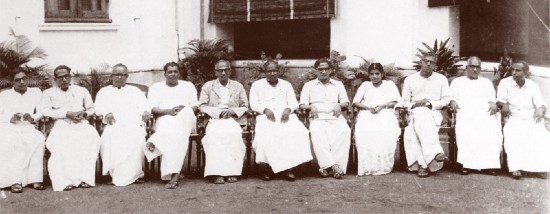
Kerala’s Council of Ministers, 1957, led by EMS Namboodiripad. One of the first democratically elected state governments of the world, it was dismissed in 1959 by the Central Government.
In the 1980s M. Basavapunnaiah, in an article in Desh Hitaishi raised certain questions about the spirit of Para 112 and whether the ruling CPI-M in West Bengal was being true to it. The questions he posed were: How much has the CPI-M been able to do in West Bengal? Has the party been able to provide relief, rally the people and scale up their political consciousness? Without being overly critical, the tone of the article suggested that all was not well. A discussion followed in the party but it was muted. The fall of the socialist bloc subsequently lent weight to the debate on whether socialism can flourish in a multi-party democracy, a debate that found a lively platform in the 1992 party congress in Chennai.
As Operation Barga got off the ground, its impact could be seen in the outcome of the 1978 panchayat elections. The Left Front won 69 per cent of seats and polled 54 per cent of votes. The dominance of landlords, rich peasants and moneylenders, which had been the bedrock of Congress support, broke. ‘For the first time in West Bengal, democratic devolution of powers took place. The new leaders of the panchayats were not moneylenders or rich peasants. They were marginal farmers, primary or secondary teachers, unemployed young men, or landless agricultural labourers’, writes Sudhir Ray. ‘During the panchayat elections of 1993 and 1998, it was found that Marxist parties could retain their support base in the rural areas. The reason for these successive victories is to be found in the changed co-relation of classes. The landlords, rich peasants and moneylenders no longer dominate in the rural areas,’ he continues. The panchayats included a large number of the rural poor, marginal peasants, teachers, women and Dalits.
Disengaging itself bit by bit from the path of struggles the new ruling elite, in the beginning, leveraged the state machinery to provide relief to the people but gradually that gave way to something else: being in power became the means to endlessly reproduce itself.
Even as rural Bengal was coming to life, West Bengal’s straggling, moribund industries were still gasping for breath, Outlining the historic backdrop stunting the state’s industrial growth T J. Nossiter writes, ‘At partition in 1947 West Bengal was deprived of its hinterland; its key industries, in key instances have been overtaken by technological innovation; communications are poor, and from the point of view of available investors, private, public, international, other areas of India have seemed more attractive, in some measure because of the uncertainty of the political situation at least prior to 1977 and because of industrial agitation.’
Political unrest and violence that crippled the state in the 60s and 70s deepened the severity of industrial depression. Small scale industries located on Calcutta’s outskirts, the hotbed of clashes between Naxals and men of the CPI-M and the Congress, disappeared one after another. Militant trade union activities led by the CPI-M’s trade union wing, Centre of Indian Trade Unions (CITU), which continued even after 1977, did not help matters. Employers retaliated with lockouts. Shutters were downed, gates padlocked. Lockouts happened in the blink of an eye. The industrial belt along the Hoogly river became a haunted expanse of dilapidated buildings, their padlocked gates corroded by rust and moss. The responsibility for the corrosive decay lay in multiple quarters: at the door of the party and the government—for pretending to look the other way even as industries were vanishing overnight; with managements for their flightiness and financial corruption; with the CITU — for sticking to old strategies. Ostrich-like, the trade union had a habit of walling itself in, every time workplaces reinvented themselves, keeping pace with technological changes, launching modernisation drives. Failing to anticipate the rush of technological innovations, CITU in the 1980s slammed the door on computers and modernisation of factories, chanting instead the tired old slogans.
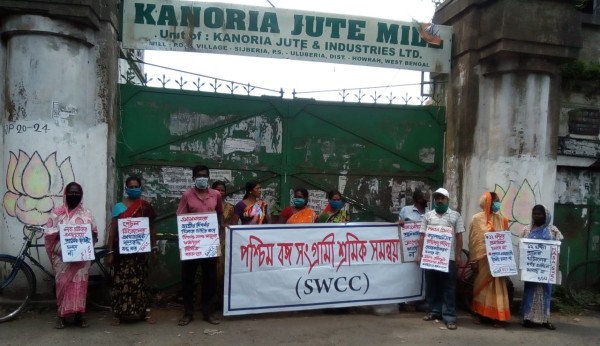
Workers protesting outside Kanoria Jute Mills in 2020. Photo Credit: Workers’ Unity Bengali, Facebook.
There was no single cause behind the stagnation. Post 1977 the workers were virtually left to fend for themselves as the CPI-M and the CITU tried to fulfil the economic mandate thrust on them by liberalisation. But the working class in Bengal, with its tradition of militant activism in the late 60s and 70s, had come to regard the notion of work not simply as a source of income and material incentive, but also of rights and entitlements. ‘It was a potent political construct for all workers,’ writes Nandini Gooptu. The Left Front could not turn its back on the electoral support of workers but the transformation of the CPI-M from a party of struggles to the ruling elite hit them hard as the CITU, cutting corners, tried moulding itself to suit the government’s new economic plans. Labour militancy had to be contained and eventually snuffed out. Functioning within the neo-liberal system the Left Front government started distancing itself from the concerns of the working class, thrown into a state of anxiety, as liberalisation sounded the death knell for traditional industries like textile and jute. Unwilling to support labour agitations, the government and the CITU hastened to clinch deals with employers. Pushed to the wayside by the party and the trade union, workers struck out on their own. Through the 1990s, labour unrest assumed different forms. Violence broke out at Victoria Jute Mills in 1992 as workers turned on trade union leaders, attacking the union office and policemen. One person lost his life. In Howrah’s Kanoria Jute Mills the workers adopted a different path, declaring autonomy from the party and the trade union. They instituted the Sangrami Shramik Union, an independent non-party trade union in February 1993, sending a clear message of their loss of trust in the CPI-M and the CITU. Rather than in vain for a successful negotiation with the management, the union occupied the closed mill and resumed production. The unusual and spontaneous workers’ movement taking off without trade union banners created a ripple, even though the experiment did not translate into enduring results. Many middle-class members, including artistes, allied with Kanoria workers who hoped to turn the mill into a workers’ cooperative. Despite public support to the notion of workers’ participation in the management, the CPI-M-led government offered the union no help, sealing the fate of a Kanoria workers’ cooperative. The mill was turned over to the management. Though short-lived and unsuccessful, the Kanoria Jute Mills experiment pointed to a new direction in the labour movement, not adopting the most practiced form of resistance like striking work.
The Left Front could not turn its back on the electoral support of workers but the transformation of the CPI-M from a party of struggles to the ruling elite hit them hard as the CITU, cutting corners, tried moulding itself to suit the government’s new economic plans. Labour militancy had to be contained and eventually snuffed out.
The transformation of the CPI-M from a livewire, organic party to a vote-spinning machine became more and more evident from the 1980s, when the party and the government became virtually one. Without a demanding opposition breathing down its neck, it was easy to get away with poor governance; easy to win a two-thirds mandate in election after election. The democratic cycle of elections, the principle of rewards and punishments came to a halt.
Writers’ Building on Kolkata’s bustling B. B. D. Bagh stood as indelible proof to the sloth that had crept in and settled on the government. Nothing in the secretariat—the Left Front’s nerve centre—seemed to have changed in the last three decades. As if the grand old building had settled into an inexorable time warp. In thirty-three years of Left Front rule, Jyoti Basu alone ruled for 23 years (1977-2000). The babus of Writers’ Building have been taking orders from the same cabinet and implementing them desultorily, unlike their predecessors during colonial rule who worked long and hard. The first inhabitants of Writers’ Building, which started functioning as early as 1690, worked under tough conditions. Employed by the East India Company, the clerks lived in mud hovels at the present site of the brick-red structure. In 1965 a storm destroyed the huts. A second Writers’ Building was built followed by a new structure—from where the state secretariat now functions.
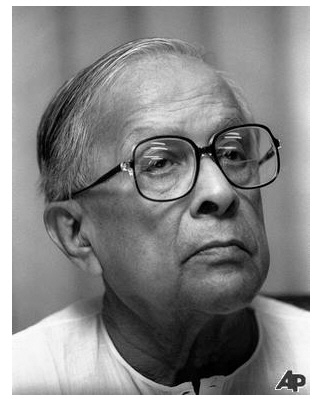
Jyoti Basu was West Bengal’s CM for 23 years (1977 – 2000).
The ‘modern’ Writers’ Building inhabitant is the quintessential babu, who rarely keeps office hours but seldom forgets to take his chhata (umbrella) and jhola (cotton bag) to work. He goes through the motions of a daily routine: gets off a jam-packed local train at Howrah station, boards an equally packed, rickety state bus, steps down at Dalhousie Square, ambles into the secretariat after the clock has ticked well past the hour of reporting for work.
The area around the secretariat has the lazy somnolence of a holiday. Stalls cluttering the footpath outside the building sell a variety of food, from toast to fish curry, rice, pakoras and phuluris. Famous for its street food, Calcutta is a hedonist’s paradise and a nutritionist’s nightmare. For the babus the food mart outside the secretariat is a place to ‘pass time’ when the files get too boring. Every once in a while they stroll out for a bite. Rows of honey jars stand at one corner and the air hangs heavy with the aroma of frying and cooking. Not surprisingly Jyoti Basu found the ‘eating disorder’ annoying and detrimental to the efficiency of his government. Hemming and hawing for a long time, the exasperated chief minister finally slapped a curfew on food vendors, restraining them from camping out on the footpath and tempting the Writers’ Building staff through the day. You can find them engaged in brisk business only between one and two-thirty now.
The transformation of the CPI-M from a livewire, organic party to a vote-spinning machine became more and more evident from the 1980s, when the party and the government became virtually one. Without a demanding opposition breathing down its neck, it was easy to get away with poor governance; easy to win a two-thirds mandate in election after election.
Like he would pull up the CITU, Basu, from time to time lectured Writers’ Building employees—also unwavering supporters of his party—on reporting to work on time, resisting the temptation of leaving the building before the sun went down. But counsel and caution came late when the employee was secure in the CITU’s protection. As liberalisation settled in and the economic environment became competitive, the Marxists felt the nudge to shed sloth and instil an efficient work culture. They had been ‘efficient’ in capturing political, educational and cultural institutions; taking them over systematically, appointing in key positions persons loyal to them, regardless of qualification or merit. From the very beginning, people inhabiting the world of the CPI-M were split into two categories: ‘aamader lok’ (our people) and ‘amader lok na’ (not our people). True, the Left Front government had ended the anarchy of the past that was destroying educational institutions. But in that process it also appropriated them, striking at the autonomy of academia. The universities and institutions had already begun to lose their shine and intellectual vibrancy in the early 1970s, the years of anarchy, and the decline continued after the takeover by the Left. Presidency College, a centre of excellence, caught in the throes of violence between the CPI-M and the Congress, later by the Naxal upsurge, deteriorated further during the Left Front government. Law College, a site of political violence in the 1970s, never regained its academic eminence. In place of intellectual autonomy reigned a dull culture of patronage, a relentless search for amenable, loyal appointees who would intone the party’s position on every issue of consequence. The challenge of a lively intellectual debate of contesting beliefs, in which the proponents heard each other out, was strictly absent. Those who played the game of passive compliance were rewarded; the ‘deviants’ who refused to extend intellectual endorsement were subtly and often not so subtly punished.
Moving from one election to the other, emerging a clear victor each time, the CPI-M over the decades came-to acquire the status of a ‘feel-good’ party. In the past the Congress had exuded a similar aura, before people started delivering fractured mandates, stripping the party of its monopolistic rule over India. We had journalistic slang for those drawn like a magnet to a party in power, regardless of its creed and politics. We called it the Opportunistic Party of India (OPI)! Its members were forever ready to do a 180-degree turn and switch loyalties to the party at the steering wheel at any given time!
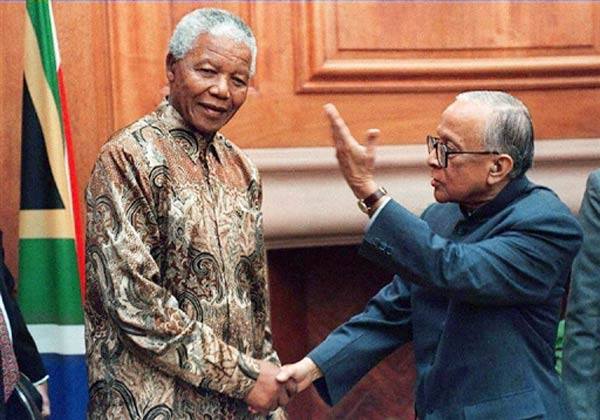
Jyoti Basu with Nelson Mandela. Photo Credit: Communist Party of India (Marxist), Facebook.
West Bengal had more than its share of OPI members. In the political context of the state it ensured loyalty to only one party—the CPI-M. No other political party in India, or for that matter in the rest of the world, has held on to ‘absolute’ power electorally, without a break for so long. The people of West Bengal, some who would never have ordinarily crossed the path of communists, suddenly found in them a safe and lucrative refuge. The CPI-M appeared to offer the incentives of an attractive investment policy. The ‘jholawala shabby Marxist’ suddenly became the cynosure of all eyes. Joining the party was like signing up with a football club that unfailingly kicked the winning goal in the goalpost. The party’s membership in West Bengal galloped even as it floundered and lost whatever faltering base it had in the Hindi heartland to the Mandal parties. The irresistible pull of power worked wonders for the CPI-M when it came to a headcount of its members.
They had been ‘efficient’ in capturing political, educational and cultural institutions; taking them over systematically, appointing in key positions persons loyal to them, regardless of qualification or merit. From the very beginning, people inhabiting the world of the CPI-M were split into two categories: ‘aamader lok’ (our people) and ‘amader lok na’ (not our people).
Hunter Thompson in Kingdom of Fear said: ‘Res ipsa loquitur’ (Let the good times roll). Good times indeed were rolling for the CPI-M. In that heady process however, the inherent democratic principle propelling change ended up as the casualty. The withering of a credible opposition perpetuated the stagnation of the political status quo. For a while Trinamool Congress leader Mamata Banerjee seemed to rattle the Left Front’s composure, especially around 1999, when she called for a mahajot or a Grand Alliance with the Congress against the Left Front and did draw significant popular response. However, she lost that moment, oscillating between opposing and supporting the Bharatiya Janata Party (BJP)-led National Democratic Alliance (NDA) government and quitting her cabinet post as Railway Minister. It took the Nandigram-Singur developments for the Trinamool Congress leader to return to West Bengal’s political centre stage.
How does the CPI-M’s balance sheet look at the end of thirty-three years?
A graph of losses and gains would show the party neck-deep in bankruptcy following the drain of ‘ideological wealth’. A comfortable existence of political dominance without resistance worth its name broke the party’s ideological spine. Driven by prospects of easy opportunity, all shades of people invaded the CPI-M. Once discerning, exacting in its choice of members, the party’s gruelling `rite of passage’, mandatory and inflexible in the past, became loose and flexible. The party loomed like a powerful corporation beckoning one and all, political and social climbers, ideological ignoramuses, rank opportunists, tantalising them all with possibilities that had nothing to do with the ideology of politics.
Before the ‘feel good times’ set in, becoming a card-holding member of the CPI-M wasn’t easy. It was like sitting for a test, one that went on for years. Only after passing through that critical wringer could you be certified as a card holding member – the term itself not part of the CPI-M language, but a quaint leftover from the days of the united CPI. There were no shortcuts and few lateral entries from the top. It was a little like the way journalists functioned before the onset of the internet and easy news gathering through wires. Editors then were tough, ensuring by the time the afternoon sun rose high, that reporters would be out of their air-conditioned offices; no short cuts. Bracing the heat and the cold was clubbed under `leg work.’ In the CPI-M’s terminology ‘leg work’ meant organising, mobilising students, youths, workers, peasants, women, teachers. You had to prove your skills as a ‘mass worker’ in any one of the party’s mass organisations and get at least a minimal idea of Marxist-Leninist philosophy. In fact it was considered infra dig to graduate to membership within a short time. Since I joined the party in West Bengal in the early 1980s – when the Left Front had its feet firmly planted in Writers’ Building – I knew myself to be part of that ‘non rigorous,’ maybe a trifle ‘looked-down upon’ membership, with an easy entry.
But even in those days of laxity you could not barge in like you could in the 1990s, the period of confusion and disenchantment when members started dropping out, disillusioned with the emerging face of socialism. These were also the times when the CPI-M further lowered its ideological guard and drafted new members without making too much of a fuss. The ‘nouveau’ communist—the ‘Marxist come lately’—strutted about, brandishing the ‘party card,’ using ‘brand CPI-M’ to further his/her interests. Gone was the Spartan communist epitomised by Harekrishna Konar or Promode Dasgupta—almost Gandhian in frugality, honed razor sharp in political battles, far removed from the labyrinthine power games of the establishment. The new lot went about ‘doing’ their politics like unscrupulous businessmen; bullying, extorting, terrorising became part of the ‘ideology.’ The West Bengal party leadership regularly carried out ‘cleansing’ operations to weed out the rot. But it ran too deep, too thick.
A graph of losses and gains would show the party neck-deep in bankruptcy following the drain of ‘ideological wealth’. A comfortable existence of political dominance without resistance worth its name broke the party’s ideological spine. Driven by prospects of easy opportunity, all shades of people invaded the CPI-M.
The CPI-M’s organisational documents circulated at its congress every three years routinely regretted the ideological downturn, but the slide, too rapid by then, could not be halted. Here lies one of the keys to the transformation of the CPI-M machine. For it was the machine that was supposed to cleanse, that itself got mired in a whole range of corrupt nexuses – with builders, contractors, police and local anti-socials. Try as they might, the state leaders never managed to control these new nexuses. Media and human rights groups regularly revealed the involvement of CPI-M members – often district level leaders – in incidents of rape and murder. Alimuddin Street almost unfailingly responded by scoffing at the allegations as part of a political conspiracy, or promising an inquiry, which invariably made its way into the files of unresolved crimes. This expressed more than anything else, Alimuddin Street’s helplessness rather than its complicity. Eventually, one can say, it was the leadership that was dependent on the monster it had created.
II
Anatonia was living in a communal apartment where the house elder was an ardent Stalinist, widely suspected as an informer, who made her suspicions of Anatonia clear. On one occasion, when a neighbour showed off her new pair of shoes, Anatonia had let her guard down by saying that her father would have made them better because he had been a shoemaker (a trade associated with the `kulaks’ in the countryside). Frightened that she would be exposed, it was a huge relief for Anatonia when Georgii Znamensky asked her to marry him. Marriage to Znamensky, an engineer and a citizen of Leningrad, would give her a new name and a new set of documents to let her stay in Leningrad.
Orlando Figes, The Whisperers
Fear, Suspicion and the Third Eye
The CPI-M presides over a Kafkaesque world mapped by an `invisible third eye’—tracking, recording, filing. Communists have been known to make good, though not artful snoops. In West Bengal, under their thumb for more than thirty-odd years, comrades keep an eagle eye not just on each other, but on each other’s families and friends. ‘Guilty by association’, a dictum practiced by and consummated in communist regimes across the world, still carries with it a frightening respectability.
Chandrayee Gupta, daughter of Sadhan Gupta, among the six Lok Sabha MPs fielded by the undivided Communist Party in the first general elections of independent India in 1953, found herself condemned under the CPI-M’s ‘guilty by association’ fiat. Chandrayee’s was a classic ‘communist family’, bound intrinsically to the communist movement for at least two decades before its romance with Writers’ Building had bloomed. Her mother Manjari Gupta was the first president of the CPI-M backed All India Democratic Women’s Association. ‘I grew up in the party. I remember participating in the 1965 khadya andolan (food movement), civil liberties movement, in every election from 1967 to 1991,’ said Chandrayee. A member of Indian People’s Theatre Association (IPTA) since 1971, Chandrayee became active in the SFI from 1974. She joined the party in 1977.
The CPI-M presides over a Kafkaesque world mapped by an `invisible third eye’—tracking, recording, filing. Communists have been known to make good, though not artful snoops. In West Bengal, under their thumb for more than thirty-odd years, comrades keep an eagle eye not just on each other, but on each other’s families and friends.
Her whole-timer husband Badshah Alam had been in active Left politics since the 1967 general elections. Two years later he became a member of the CPI-M, and then Democratic Youth Federation of India’s (DYFI) Calcutta district secretary. In 1983 Badshah was elevated to the post of the first CPI-M secretary of Padmapukur local committee, which included Beck Bagan and Bhowanipur – areas with highly diverse economic, religious and linguistic populations. His conflict with the party began after the Left Front, completing its second term in power, started shifting its priorities from the poor to the powerful vested interest groups – the land mafia and realtors. ‘The so-called class enemies were being wooed by key personalities in the party. Badshah’s differences grew with party leaders who wanted him to yield to money power. The strained relations exploded in 1990,’ said Chandrayee.
Following a brutal attack on Mamata Banerjee on 16 August 1990 by CPI-M workers in Calcutta, an influential section of the Calcutta District Committee wanted Badshah to make statements according to their diktat, contradictory to the truth. Already in an uneasy co-existence with the party, Badshah’s refusal led to his expulsion in 1991. `We knew if we compromised nothing would happen but we were determined not to. We were also aware that the party was making an example of Badshah’s expulsion to rein in other restless workers,’ said Chandrayee. The party accused Badshah of making money from the Muslim-dominated area of Padmapukur – an important one on the CPI-M’s list of local committees.
A visit to Chandrayee’s flat inside an alley in the Bek Bagan area would leave you wondering why Badshah and his family would choose to inhabit such a cramped place, when they, according to the CPI-M, had stockpiled such wealth. A narrow flight of tacky, ill-lit stairs takes you upstairs. For additional space Badshah had turned the roof into a kind of a make-shift room where you could cook in one cornet In the middle lay a few chairs. Sitting here Chandrayee and I chatted, returning to the events that changed the drift of her life.
‘After Badshah was expelled someone close to the party visited us. As he entered our home, he could not hide his surprise. He asked me “Is this where Badshah Alam lives?”’ since nothing in that humble flat suggested a hidden stash. With the expulsion began the party’s hounding of the family, economically and emotionally. `The party attempted to disrupt our family life. It spread rumours of our divorce. Badshah’s siblings were all party members. The party engineered a rift within the family,’ said Chandrayee. ‘We went through hard times. Could not send our two sons to the best schools. Virtually overnight people we were familiar with and knew for ages stopped recognising us,’ she added. Though she had not expressed any wish to sever association with the CPI-M, the party refused to renew her membership, throwing her into the ‘guilty by association’ lot.
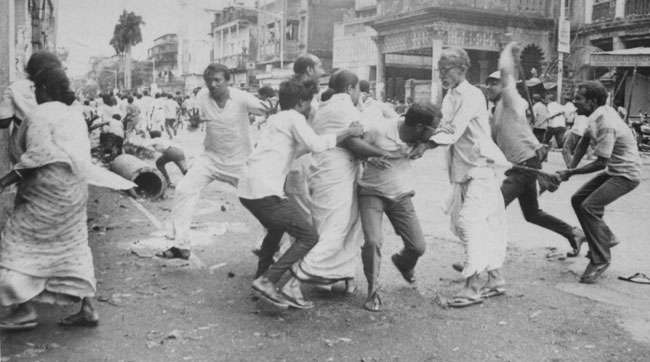
Mamata Banerjee was attacked in 1991 by communist party goons. Photo Credit: AITC Official
That was not all. The CPI-M began to squeeze Chandrayee out of the court where she practiced. ‘The party stopped giving references for the public sector cases that used to come to me from different districts. State government briefs which had been dwindling from 2000, finally stopped in 2004. These have again begun to come to me after Nandigram in 2007.’
‘We went through hard times. Could not send our two sons to the best schools. Virtually overnight people we were familiar with and knew for ages stopped recognising us,’ she [Chandrayee] added. Though she had not expressed any wish to sever association with the CPI-M, the party refused to renew her membership, throwing her into the ‘guilty by association’ lot.
A year following his expulsion, Badshah and some of his ‘axed’ comrades formed a group, Marxbadi Kendra, trying to consolidate other Left forces in a common platform against the Left Front’s misrule. It did not take long to realise that the CPI-M would not allow them to function democratically. By-elections to Calcutta’s Ballygunge Assembly seat were held that year. The CPI-M fielded Rabin Deb, and Marxbadi Kendra, Swapan Chakraborty, once a popular CPI-M councillor, later thrown out by the party. ‘That election experienced unprecedented rigging, resulting in a CPI-M victory by a vote margin of 30,000. The sitting CPI-M MLA, however, had won by just 1500 votes,’ said Chandrayee. She described the way cadres from all parts of Calcutta poured into the constituency and the violence that followed. `Badshah protested when voters of Swinhoe Lane were prevented by the police from entering the polling station. In retaliation the police threw him into the van took him into “safe custody”. When the deputy superintendent came he found Badshah sleeping. Throwing him on the floor, he began hitting him, opening his eyes with his boot. All along the DSP shouted: “Take dekhte hobe, police manusher upore (you have to concede police is above the common man).”‘ ‘At about 9.00 p.m. I went to the barracks and found Badshah with boot marks on his face, injured and unattended. After my written complaint, he was given medical attention at 1.00 a.m.,’ she added. A case is still pending against Badashah, the trial continuing since 1996.
Marxbadi Kendra, however, proved a short lived experiment as Badshah joined the BJP in 1997, which seemed to him the only party capable, at that time, of taking on the CPI-M. ‘I cannot say the decision made me happy. But he needed a political platform,’ said Chandrayee. Quitting the BJP in 2007, Badshah joined the land movement led by Siddiqullah Chowdhury, secretary of the People’s Democratic Conference of India (PDCI). He found the agitation for land more effective.
After more than a decade Chandrayee went with her father Sadhan Gupta to Alimuddin Street following the death of Nripen Chakraborty. The veteran communist leader expelled by the party had been taken back a day before his death. His body was kept at the CPI-M headquarters. `Nripen Chakraborty had lived at our 47 Theatre Road residence for some time. He enjoyed being with the family, playing with the kids. When he passed away, Baba wanted to go to the party office. I went with him. It was strange. Nobody would talk to us. We just stood there. After some time Anil Biswas came and spoke with me. As if on cue others followed, though not Buddhada (Buddhadeb Bhattacherjee). He did not even bother to speak to baba,’ said Chandrayee.
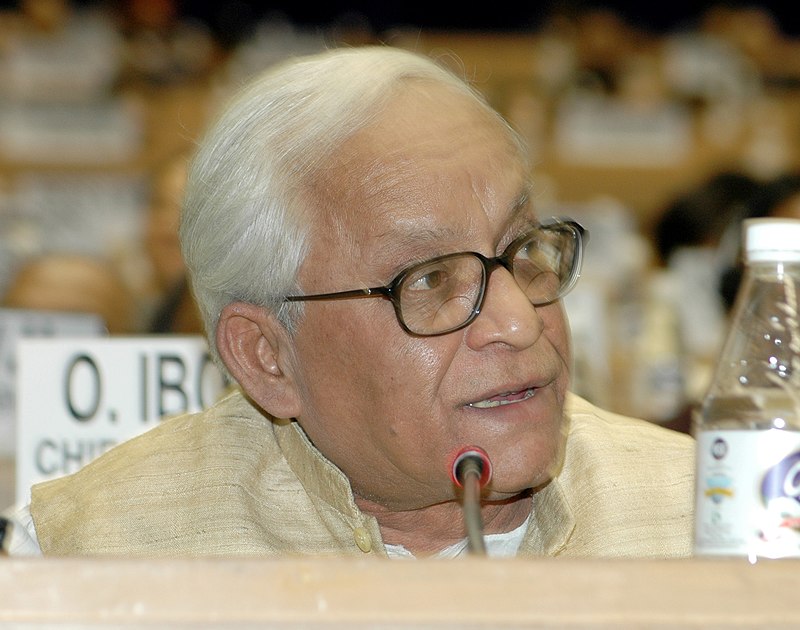
Buddhadeb Bhattacharjee was the Chief Minister of West Bengal from 2000 to 2011.
Within a year of taking over the reins, the CPI-M had become a ubiquitous presence in West Bengal, sometimes with open aggression, but more often a lurking shadow — a snooping, hovering third eye.
Maimoona, an acquaintance of Chandrayee, tells of how her husband, a party member in Beck Bagan, was a victim of the snooping brigade. `The Municipal Corporation was proposing to hand over Park Circus Market to Reliance. Siddiqullah of PDCI had organised a meeting protesting the move. My mother wanted to listen to Siddiqullah. So I took her to the meeting. We sat at the back’.
Within a year of taking over the reins, the CPI-M had become a ubiquitous presence in West Bengal, sometimes with open aggression, but more often a lurking shadow — a snooping, hovering third eye. Maimoona, an acquaintance of Chandrayee, tells of how her husband, a party member in Beck Bagan, was a victim of the snooping brigade
‘At the party’s local committee office the next day a CPI-M leader asked my husband if he had attended yesterday’s meeting. My husband said no. The leader promptly fished out a photograph of me sitting with my mother at the meeting! Party workers were actually present at the meeting, snooping, taking photographs,’ said Maimoona.
`The CPI-M is calling us communal. But a day before the meeting party cadres went around Beck Bagan saying Sidiqullah was going to hold a meeting of Muslims and the Hindus should stay away,’ said Chandrayee.
*
Since the 1980s much of the party machinery was wielded through suspicious means. One of these important ‘bonding’ activities was party ‘collection’. No longer were party members assessed by their organisational skills, and the ability to attract new members. The CPI-M now seemed to measure the political worth of its members from their fund-raising skills.
Every unit of the party – student, youth, women and trade union – was caught up in the collection drive, ‘Collecting funds and mobilising people for rallies and meetings are two of my main political activities,’ said Aparna De, a former attendant in Calcutta’s Modern High School. A member of the party and the Ganatantrik Mahila Samiti since 1982, Aparna went around with her comrades on house-to-house, shop-to-shop fund collection. ‘We have shops allotted to us and the collections can range between Rs 5 to Rs 100. We also visit people at home and at clubs. No, there is no coercion. They give the money because they love our party’.
If this is the state of affairs with those who are the party’s ‘own’, one can easily imagine what happens to those who do not belong there. Often, they simply disappear.
The list of missing persons has grown too long to be dismissed or taken lightly. West Bengal, in the last two decades, has been home to many mysterious deaths and inexplicable disappearances, explained by theories of political conspiracy.
I remember Manisha Mukherjee from my years in the Department of Archaeology. Most students on the campus knew her – a slim, attractive student, who sat on the steps and joined our addas. An active member of the SFI, I guess it was part of Manisha’s ‘mass work’ to chat with the students. But she had a genuine, endearing friendliness, and it came as a shock more than a decade later to learn about her disappearance. In December 1994, Manisha, then Calcutta University’s deputy controller of examinations, suddenly vanished from her house. As of May 2010, there is still no word of what happened to her. Manisha’s mother, Chinu Devi, knocking on every possible door, trying to get news of her daughter, is believed to have told the police where she could be hiding. Said a news report, ten years after her disappearance: ‘Calcutta University’s deputy controller of examinations Manisha Mukherjee disappeared from her house in December 1994. Her mother, Chinu Devi, initially gave the police a lot of information about the possible places where she could be hiding, apparently to save herself from “some university people” who wanted to kill her, as she knew about a lot of corrupt deals on for her all over eastern India, and amidst talk of political “fixing”, Manisha remained untraced. But the case file, the thickest with the Calcutta Police, hasn’t been opened for a while.’
The list of missing persons has grown too long to be dismissed or taken lightly. West Bengal, in the last two decades, has been home to many mysterious deaths and inexplicable disappearances, explained by theories of political conspiracy.
Or take for example, this story: On 30 October 1993, a police team led by Harmanprit Singh, then Additional Superintendent of Police in Hoogly, picked up Bhikari Paswan, a jute mill worker from his residence. That was the last that people heard of Bhikari Paswan. The case was handed over to the Central Bureau of Investigation (CBI) but the inquiry resolved nothing. Why was the jute mill worker picked up from his home? Where did he disappear to?
Bhikari Paswan was a casual worker in Victoria Jute Mill in Telinipara, in the Hoogly district, which witnessed massive workers’ unrest following unpaid wages, Provident Fund and bonus dues. The workers’ anger was directed, in large part, against the unions. Following the outbreak of clashes and the police crackdown on agitating workers, Bhikari Paswan was allegedly one of the workers picked up and sent to police custody. Though the police denied arresting Paswan, the Association of Protection of Democratic Rights, investigating the case, concluded in its report, ‘in the light of the facts which have come to light during the investigations, it can be concluded that Bhikari Paswan was indeed picked up by the police party from his residence on the night of 30/31 October 1993 at about 12.30 a.m. His whereabouts since then are not known.’
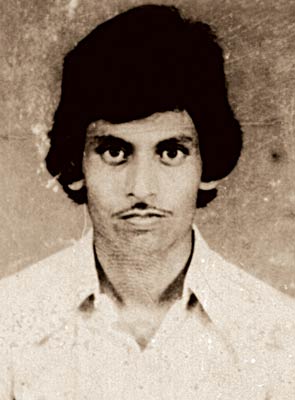
Bhikari Paswan was a worker at the Victoria Jute Mill.
In an earlier incident in the mid eighties, CPI-M goondas attacked, molested and murdered a senior officer of United Nations Children’s Fund (UNICEF), severely hurting another officer of the Central government in Bantala, on the outskirts of Calcutta. ‘The reason was that these two lady officers had detected huge embezzlement of UNICEF funds and relief materials by CPI-M functionaries. When the matter was reported to the then Chief Minister Jyoti Basu, he reacted saying: “Such incidents happen, don’t they?” And that was the end of the matter.’
In 2009 the sessions court at Ranaghat in Nadia convicted four persons in connection with the looting of a marriage party in February 2003, in which the driver of the bus was killed and six women passengers raped. However the court let off 17 others, including two local CPI-M leaders Subal Bagchi and Saidul Islam, for lack of evidence. ‘Bagchi was then a member of the CPI-M zonal committee from Ranaghat and Islam was the pradhan of Kamalpur gram panchayat. A large number of witnesses had turned hostile in the case affecting the prosecution. Ninety per cent of the witnesses out of the 158 turned hostile, said Dilip Chatterjee, the counsel of the state government.’
In an earlier incident in the mid eighties, CPI-M goondas attacked, molested and murdered a senior officer of United Nations Children’s Fund (UNICEF), severely hurting another officer of the Central government in Bantala, on the outskirts of Calcutta… ‘When the matter was reported to the then Chief Minister Jyoti Basu, he reacted saying: “Such incidents happen, don’t they?” And that was the end of the matter.’
In fact membership has become so easy that a person like Subal Bagchi, and many more like him nesting with the party, could not only enter the membership ranks but elevate their stature to that of a ‘leader’. These incidents speak volumes for the slackening of the political and ideological rigour that had perhaps once given a place of distinction to the CPI-M, setting it apart from the wider political class.
*
The stories of political murders and disappearances in West Bengal are endless. And they do not usually come out into the open. But sometimes they do. To be more precise, of late they have started coming out. This is no doubt due to the winds of change blowing in the state, where the domination of the CPI-M and the Left Front is breaking. For the first time the effect of the ‘fear factor’ is declining. The well-known Rizwanur Rehman case was a turning point.
Sujato Bhadra—member of the Association for Protection of Democratic Rights (APDR) and a key person to blow the whistle on the Rizwanur murder case—can, by the mere whisper of his name, raise Buddhadeb Bhattacharjee’s blood pressure by several notches. Given the CPI-M’s chilling disregard for transparency and democratic norms, Buddha’s revulsion towards Sujato is predictable. But the genesis of the bad blood between the two individuals, the omnipresent chief minister and the much vilified human rights activist, goes back to an incident that begs to be told.
In 1992 Jyoti Basu hosted a conference as a prelude to instituting a Human Rights Commission in West Bengal. Ironic, since the comrades have a human rights record humiliating enough to make them hang their heads in shame. Custodial deaths stand at a record high under the Left Front’s vigilant eye. The state government bears the infamy of extricating the police whenever they are in deep trouble. Thirty-three years of uninterrupted rule gave the CPI-M ample time and expansive leverage to make ‘party cadres’ out of the state police, waiting to be co-opted. Arrogance running high, the party’s writ turned into commands to which every ancillary of the state bowed its head. The party feared no one.
Custodial deaths stand at a record high under the Left Front’s vigilant eye. The state government bears the infamy of extricating the police whenever they are in deep trouble. Thirty-three years of uninterrupted rule gave the CPI-M ample time and expansive leverage to make ‘party cadres’ out of the state police, waiting to be co-opted.
Before instituting the State Human Rights Commission the government put out a notification in newspapers about a conference on human rights—an open meeting anybody could participate in. `We decided to attend the meeting and made the necessary preparations,’ says Sujato. APDR members charted out a list of human rights violations in West Bengal, distributing it among the speakers a day before the conference. ‘I even gave one to Buddhadeb Bhattacharjee’s secretary, who happens to be my cousin,’ says Sujato.
The next day APDR members turned up at Shishir Mancha, the venue of the meeting. Naranarayan Gooptu was delivering the inaugural address, in the course of which he denounced the manner in which the Congress government in Tripura had hushed up reports on mass killing probed by a judicial commission. I raised my hand. Jyoti Basu was on the podium. He did not want to allow me my question. But Dr Bela Dutta Gupta (former chairperson, West Bengal Women’s Commission) sitting next to him, allowed, me. I drew the speaker’s attention to similar instances in West Bengal in which the state government had swept judicial commission reports under the carpet.’
Buddhadeb Bhattacharjee, then minister in charge of the police, information and culture (a pungent cocktail!) was not on the podium. The moment the question rang out he rushed to the dais, took the mike, and asked the person asking the question to meet him outside the hall. ‘This sparked a furore. APDR members scattered in the hall rose to their feet, protesting the muzzling of questions at a seminar. We walked out.’
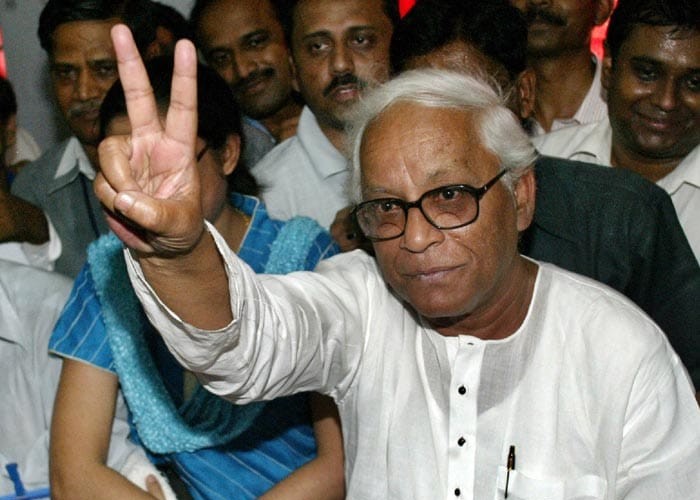
Buddhadeb Bhattacharjee after the 2006 Assembly Elections Victory.
‘The moment I stepped out of the hall Buddha came towards me—rolling his sleeves and asking who had raised the question. When I identified myself he asked me to repeat the question. As I did so there was an altercation. Buddha signalled to the police who started to thrash me.’
Amid all this, unnoticed by most in the audience, was Maitreyo Ghatak, well-known litterateur. ‘None of us saw him,’ says Sujato. When he was being whisked away from the seminar hall Ghatak voiced his protest. Raising his hand, he stood up and kept repeating in a well-mannered tone: `Seminare prashna kora to anyay noi’ (It is not a crime to raise questions at a seminar).
It was rather funny. This man who had just casually walked into the meeting got caught in the fracas. As Buddha ordered the police to arrest us, he also gave an order, to arrest Ghatak, who passed off unrecognised in the ruckus. We were in the police van when we noticed the author sitting with us. I asked him “Aaapni ekhane ki korchhen?” (What are you doing here?) He looked at me and said: “All I said was that it’s not a crime to ask questions at a seminar!”‘
The police van disgorged the APDR members and Ghatak at the Lai Bazaar headquarters. Here the police discovered they had messed up by rounding up Ghatak in the melee. The police then would not register a case. They just asked us to leave their headquarters. We refused, insisting our names had to be recorded since we were arrested,’ narrates Sujato.
‘The moment I stepped out of the hall Buddha came towards me—rolling his sleeves and asking who had raised the question. When I identified myself he asked me to repeat the question. As I did so there was an altercation. Buddha signalled to the police who started to thrash me.’
The arrest could not be stamped out of the public glare. The state government was in a spot. It was learnt Buddhadeb later attempted a conciliatory meeting with APDR. It was also subsequently learnt that as chief minister he refused to meet any delegation that had Sujato in it.
III
‘Mothers and Sisters’
Of its many baffling, conflicting cultural traits, Bengal’s attitude towards women is worth a discussion. Bengalis like to believe they are intrinsically ‘superior’ vis-a-vis other communities in the way they treat their women. A popular myth in wide circulation propagates that the women in this state are treated with unique respect, absent in most ‘uncivilised’ parts of the country. Marxists would like to claim a large share of this glory, combating patriarchy in addition to being the most deserving inheritors of the legacy of the ‘Bengal Renaissance’ and the participation of women in the national movement. The Left movement, according to the communists, humanised gender relations. The ground situation, however, testifies to a different fact: patriarchy is as native to Bengal as its inalienable Rabindrasangeet; male chauvinism as deeply entrenched as the roots of Left politics.
The qualities that Bengal in general and the CPI-M in particular would like to bestow on themselves are rather imaginary – fond illusions in the light of the collective experience of Bengal’s women. The tragedy is compounded by the fact that the ruling Communist Party, which perhaps could have initiated a different culture, is itself yet to break free from male chauvinism.
During my years in Calcutta as an SFI activist I remember my exasperation over the sexist division of labour that would invariably mark organisational conclaves. In 1982, preparations were underway for the SFI conclave in Dum Dum. We were meeting in Calcutta University, deciding on delegation of responsibilities. The dadas instructed us women to come in Bengal’s traditional red-bordered white sarees; it was also our duty to put tikas on foreign delegates and shower flower petals on them. As if this were not galling enough we were also given the duty of distributing water! Questioning such stereotypical division of labour would usually brand me a `feminist’ – as if it were a curse!
The idea of respect for women goes with the expectation of conforming to a stereotypical image of womanhood – women primarily as mothers and nurturers – as a necessary pre-requisite for earning any form of social regard. Essentially conservative, the CPI-M unfailingly stays away from critiques of the patriarchal family, let alone from controversial issues like gay rights, sexuality – now dominant strands of feminist discourse. Like much of our political and social class, the CPI-M too fights shy of discussing, much less taking a decisive position on the rights of marginalised groups, lesbians, homosexuals, transgender persons. Instances of this crippling reluctance are many.
Let’s take a look at some of the scenes witnessed on the floor of Parliament. The somewhat desultory protests in a somnolent post-lunch session of Lok Sabha, following the attack on Deepa Mehta’s Fire, indicate the social psyche of our secular political class.
The idea of respect for women goes with the expectation of conforming to a stereotypical image of womanhood – women primarily as mothers and nurturers – as a necessary pre-requisite for earning any form of social regard. Essentially conservative, the CPI-M unfailingly stays away from critiques of the patriarchal family, let alone from controversial issues like gay rights, sexuality – now dominant strands of feminist discourse.
The Congress and Left MPs jointly criticised attackers from the Hindu fringe groups – but that criticism was articulated solely in political party terms; an attack on the sangh parivar and BJP which in no way added up to a defence of the right to sexual preference. Whenever such cultural/gender issues have surfaced in and outside Parliament nothing has really distinguished the CPI-M from the rest of the political class. Congress and BJP governments in succession banned dancing in Maharashtra’s bars, putting thousands of bar dancers out of jobs, pushing them into the sex trade. The imposition of the fiat was an exercise in morality. Not surprisingly the CPI-M did not take a vocal stand defending the rights of bar dancers – probably fearing such a stand could be interpreted as defence of the right to choose a ‘dishonourable’ livelihood.
In Jotodur Mone Pore Jyoti Basu provides a glimpse into the conservative, brahmanical culture of the CPI-M. ‘I got married on 5 December 1958. This was my second marriage. The leadership at the Centre and state then felt I was unwilling to go underground. This was not at all true. The party’s instruction to me was to stay out and continue as far as possible to work in public.
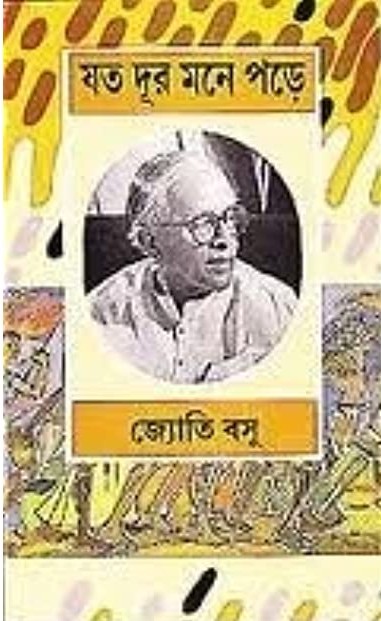
Jotodur Mone Pore by Jyoti Basu.
`I received a letter from the party’s secret cell, seeking an explanation as to why I was not going undercover. The letter also raised questions about my marriage [Italics added]. In reply I informed them that it was at the instruction of the party that I was working in public. I was ready to go undercover even at one-hour notice if the party issued a new instruction. I requested the secret cell to circulate my reply within the party. The letter sent to me by the secret cell was circulated, I do not know if my reply was,’ he writes [Italics added].
Basu made two interesting revelations: The puritanical Communist Party ‘raised questions’ about his second marriage, which it did not seem to approve. That cryptic one line indicated the party’s disapproval of a personal choice made by Basu—one which, in the CPI-M’s view was somehow detrimental to the institution of marriage; a view often shared by hardcore conservatives in right-wing organisations like the RSS. Sexual orientation, free/subversive love, non-traditional personal choices are derided by both the Left-and Right-wing-under the worn-out rubric of ‘Indian culture and values.’ Within the organisation the CPI-M is known to intrude into the personal lives of its leaders and cadres. This conservatism manifests itself in the party’s attitude towards women, the sanctimonious glorification of ‘Mother’ and ‘Sister’, and the exclusion of the modern, radicalised woman.
Basu also pointed to an endemic organisational flaw ingrained in the Communist Party culture. He said the secret cell’s critical letter to him was circulated but he did not know whether his reply was. I would like to recollect here Tapas’s criticism that while the CPI-M would widely circulate its official stand on a controversial issue, it would invariably sweep under the carpet the views contradicting the dominant line (Chapter 1).
Basu also pointed to an endemic organisational flaw ingrained in the Communist Party culture. He said the secret cell’s critical letter to him was circulated but he did not know whether his reply was. I would like to recollect here Tapas’s criticism that while the CPI-M would widely circulate its official stand on a controversial issue, it would invariably sweep under the carpet the views contradicting the dominant line.
Historian Tanika Sarkar believes the Leftist and radical imagination is uneasy about the ‘will of the woman to appropriate the world or even to move freely within it. Tribal or peasant women have been the main repositories of class militancy, not so much the middle class urban women’. Even the CPI-M’s women’s organisation speaks a patriarchal language. Ironic indeed for the Ganatantrik Mahila Samiti to address its gatherings as Mayera aar Bonera (Mothers and Sisters); implicit in such a form of address is the exclusion of other categories – particularly women of ‘loose character’ (a term in great currency in Bengal)!
The tone and tenor of Marxist speak on women and culture has been distressingly moralistic and puritanical, the arguments full of references to the West’s cultural invasion, its debilitating influence on Indian morals. The CPI-M, much of the time, has joined in demands for greater control and banning of TV channels promoting ‘degenerate’ values. If there were one issue on which MPs across the spectrum have struck a unanimous chorus it would be banning ‘wild’, ‘corrupting’ Western channels. One of the CPI-M’s common arguments against allowing foreign universities in India has been grounded in the threat perceived to Indian ‘values’. Western academic syllabi, according to the party, would destroy India’s unique values.
Perhaps the long-standing complaints of women in the party are reflected in an organisational document in which the CPI-M pulled up its male comrades: ‘Communist families should discourage conformity to stereotypical roles expected of women, particularly of newly-wed women, of covering heads, taking to purdah, shouldering the main burdens of domestic responsibility,’ said Women’s Issues and Tasks, adopted by the Central Committee in 2005 and circulated in 2006. ‘There have been many cases of two active comrades in the party deciding to get married. In some cases, the marriage then becomes a barrier for the woman’s advance, because … she is expected to give up her political life and become a housewife…. By not intervening, the party actually loses a talented and committed cadre, apart from having a negative impact on the woman….The woman comrade is expected to find a job to support the family although both may be equally qualified in terms of the party’s assessment,’ it pointed out, urging the members to end discrimination between sons and daughters.
Despite its active support to the Women’s Reservation Bill, the CPI-M has been stingy towards its own women comrades. The party’s decision-making bodies – Central Committee, Politburo – are packed with men, with only a handful of women. Protesting the skewed gender balance, Brinda Karat had even once quit the Central Committee, though without much impact.
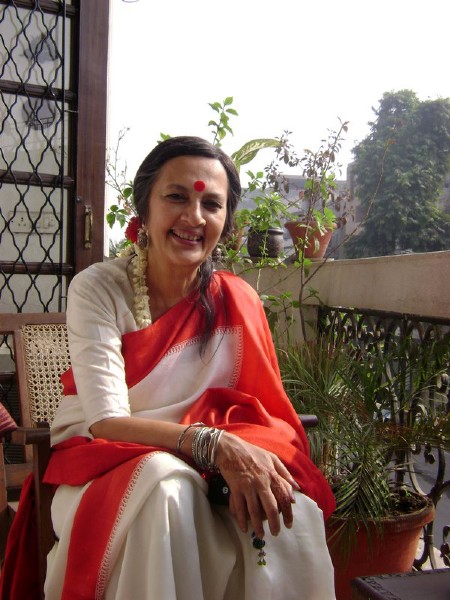
Brinda Karat, first woman to be a member of the CPI-M Politburo and Vice-President of AIDWA.
Like political violence, gender violence has been executed at a range of levels. Few would forget the brutal, broad daylight lynching and killings at Bantala in May 1990 in a public space and subsequently Jyoti Basu’s insensitive comments, blithely transferring culpability of the crime to unidentifiable ‘anti-socials’. Two months later that year, following the rapes of three Bangladeshi women in Birati, a senior woman leader of the party and its women’s wing made a statement: ‘A group of anti-socials attacked and raped Sabitri Das, Reba Sen and Shanti Sen, the three women who stayed in the unauthorised hutments along the railway tracks…. Although so many women of that area, including Shanti Das, the mistress of a notorious anti-social, were involved in foul professions and such honeymoons of these women with the anti-socials were an open secret, that day’s event appeared to be a sequel to the rivalry between these anti-socials with Pradip Sarkar, of whom Sabitri Das was a mistress,’ wrote Shyamali Gupta, in no less a forum than the party mouthpiece (Italics mine). This was no wild, personal statement shot off by an individual. In the party mouthpiece, the statement conveyed the CPI-M’s official position on the Birati rapes. Even more shocking is the fact that the comments came from the general secretary of the Ganatantrik Mahila Samiti!
Despite its active support to the Women’s Reservation Bill, the CPI-M has been stingy towards its own women comrades. The party’s decision-making bodies – Central Committee, Politburo – are packed with men, with only a handful of women. Protesting the skewed gender balance, Brinda Karat had even once quit the Central Committee, though without much impact.
A crude attempt indeed, to whitewash the crimes, to stave off the responsibility of the party and government by situating the rapes within the boundaries of law and order and morality: the CPI-M was employing an age-old tactic used by men in power. Use of words like mistress, honeymoon, anti-socials, foul professions and unauthorised hutments were significant pointers to the party’s mindset. ‘The only relevance for such description resides in the unstated assumption that there are degrees of culpability in a crime like rape, that women require certain sexual, property qualifications to be classified as fully legitimate victims,’ observed Tanika Sarkar. She pointed out that apart from gender, the comments were even more ‘unexpected’ from the class angle with their emphasis on ‘unauthorised hutments’. ‘It was precisely among refugees clinging to unauthorised hutments that the Left movement had found a major base in Calcutta in the 1950s,’ wrote Sarkar.
Through the years top CPI-M leaders have been on record, making statements smacking of male chauvinism and making a mockery of the party’s official stand on gender. Eight years after the Bantala incident, E. K. Nayanar, then Kerala chief minister, responded to the revelations of the Kozhikode call girl racket with this: ‘As long as there are women, there will be sex scandals’. On increasing crimes against women, rape and molestations, Nayanar, defending Kerala’s record, said, ‘In the US, rape is like drinking a cup of coffee’. On denying Susheela Gopalan the chief minister’s post, his comment was, ‘If you want to run after women you are free to do so. I will not’.
Like the administration, the police and different institutions, gender too is expected to faithfully serve the party and its interests. Seen in this context it is hardly surprising that the CPI-M and its women’s wing situated the Nandigram rapes within the familiar rhetoric of ‘anti-socials, conspiracies and opposition propaganda.’ In fact every organisation of the party ostensibly protecting the rights and interests of women – Ganatantrik Mahila Samiti, All India Democratic Women’s Association and National Commission for Women – pooled their resources to do a cover-up job on the Nandigram rapes.
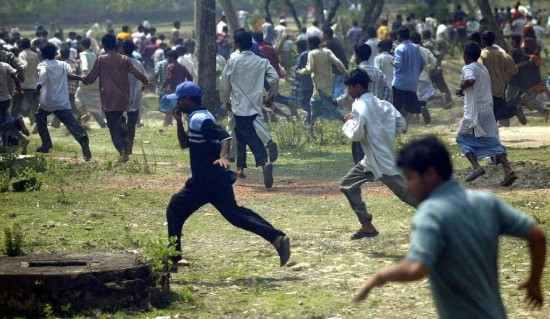
Villagers run as police fire teargas shells in Nandigram, 15 March 2007. Photo Credit: Reuters.
The ‘serve the party’ mindset also takes an upper hand when confronted with complaints of domestic violence – especially when the aggressor happens to be a party fund-raiser or leader. Pratyush Kumar (‘Bachhu’) Dutta, secretary of the Padma Pukur local committee, a former CPI-M councillor, took full benefit of this political immunity. For two decades Bachhu had been abusing his wife Rita. After running from pillar to post, finally abandoning her faith in the party, Rita decided to go public with her story. A meeting against domestic violence was organised by the UN-backed Institute of International Social Development on 27 September 2008, deliberately held in the heart of Padma Pukur – the local committee secretary’s preserve of influence. ‘The party had even tried hinting that Rita was mentally unstable,’ said Chandrayee Gupta, addressing the meeting as a lawyer. ‘I met Shyamali Gupta, president of Ganatantrik Mahila Samiti to talk about Rita’s case. Bachhu turned up at the meeting and called Shyamali Gupta aside. I can guess what he said. After returning to her room Shyamali mumbled something about the heat and left,’ said Chandrayee.
When I met Rita that day, far from revealing any signs of dormant or raging insanity she seemed in perfect control, greeting the guests, introducing them to each other. You could hear her despair and frustration at the party’s shoddy treatment, when she took the mike. ‘I have been physically, mentally and financially abused by Bachhu – a dada in this locality for 20 years. Every night he came home drunk, beat me up. He threatened my family, threatened to kill me. I was scared for my life and for my daughter Pamela.’
Like the administration, the police and different institutions, gender too is expected to faithfully serve the party and its interests. Seen in this context it is hardly surprising that the CPI-M and its women’s wing situated the Nandigram rapes within the familiar rhetoric of ‘anti-socials, conspiracies and opposition propaganda.’
Moving out of their shared flat Rita took up separate lodgings in the same locality. Bachhu went around using his clout with rickshaw pullers, and shopkeepers, harassing her. ‘I thought a party with Left ideology, friend of the people would help me. I knocked on the door of every possible leader. But they refused to intervene. It encouraged Bachhu to become more abusive,’ Rita told the meeting.
Apprehensive for her life, Rita registered a case under section 498 A-506 at the Bhowanipur police station on 21 June 2008. ‘Under the ruling party’s thumb and the benefit of Bachhu’s money the police did not take action,’ said Rita. She petitioned the deputy commissioner of police (South Division), the assistant commissioner, informing the Human Rights Commission of the police’s refusal to act on her FIR. ‘Today I stand before you after being turned away by every individual, every forum in the party,’ Rita told the meeting.
The public shaming did work after all. Last I heard was that the party had finally suspended Bachhu.
This excerpt has been carried courtesy the permission of Monobina Gupta. You can buy Left Politics in Bengal: Time Travels Among Bhadralok Marxists here
ARCHIVE
Sj. Subhas C. Bose – Under Regulation III OP 1818
The moment Sj. Subhas Chandra Bose touched the Indian soil on the 8th of March, he was arrested under Regulation No. III of 1818. We would like to discuss here primarily the legal and constitutional aspect of his detention.
The Home Member of the Government of India has declared in the Legislative Assembly that Sj. Bose was involved in a terrorist crime. There is clear provision both in the Bengal Criminal Law Amendment Act and in the Bengal Suppression of Terrorist Outrages Act to deal with offenders who are in any way connected with terrorism. The provisions of these enactments are so wide and all-comprehensive that any activities connected with terrorism can be effectively dealt with under the various sections.
If Government seriously maintains that Sj. Subhas Bose is in any way connected with terrorism, it is the bounden duty of the Government to deal with his case under any of those emergency legislations. The only ground for not proceeding against him under the Emergency Laws, as stated by the Hon’ble Home Member, is that the sources of information might be dried up and the life of the witnesses would be endangered. The argument of the Law Member Sir Nripendra Nath Sircar that the reason for not enforcing the Criminal Law Amendment Act was that Government out of kindness was giving him better facilities due to his higher station in life is not only frivolous but also very unkind.
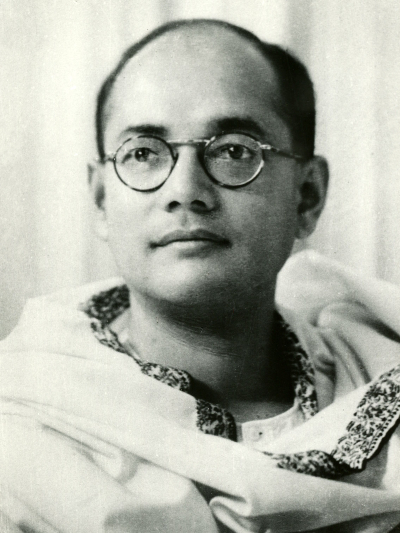
Subhas Chandra Bose
It was demanded by Sj. Bose and all his friends as well as in the public Press that he should be placed under regular trial. We propose to quote some of the sections from the recently enacted Emergency Laws to show conclusively that the apprehensions of the Home Member of the Government of India are also without any foundation.
Under section 31 of Bengal Act XII of 1932 the trying courts have power to exclude persons or the public from the precincts of courts. The section runs thus:
“The Special Magistrate may, if he thinks fit, order at any stage of a trial that the public generally, or any particular person, shall not have access to, or be or remain in, the room or building used by the Special Magistrate as a court.
“Provided that where in any case the public prosecutor or Advocate-General, as the case may be, certifies in writing to the Special Magistrate that it is expedient in the interests of the public peace or safety or of the peace or safety of any of the witnesses in the trial that the public generally should not have access to, or be or remain in, the room or building used by the Special Magistrate as a court, the Special Magistrate shall order accordingly.”
There is clear provision both in the Bengal Criminal Law Amendment Act and in the Bengal Suppression of Terrorist Outrages Act to deal with offenders who are in any way connected with terrorism… The argument of the Law Member Sir Nripendra Nath Sircar that the reason for not enforcing the Criminal Law Amendment Act was that Government out of kindness was giving him (Bose) better facilities due to his higher station in life is not only frivolous but also very unkind. It was demanded by Sj. Bose and all his friends as well as in the public Press that he should be placed under regular trial.
The same powers of exclusion of the public for safety of witnesses were extended to trials by commissioners by Secs. VIIIA and VIIIB by the Bengal Criminal Law Second Amendment Act, 1932. So it is clear that the plea of the safety of the witnesses and the fear of drying up of the sources of police information are now absolutely groundless.
The court will certainly take the initiative or in any case the Public Prosecutor will not hesitate in the least to have in-camera trials when there is the least danger to the life of the witnesses. It is a fact that various terrorist offences have been tried in Bengal by Special Commission under these sections of Emergency legislation and no witnesses to our knowledge during recent years have been murdered or interfered with. The Bengal Suppression of Terrorist Outrages Act is so drastic that under its provision any officer of Government authorized in this behalf may arrest and detain, have power to take possession of immovable and movable properties and have also the power to prohibit or limit access to any building or place in their occupation and may requisition the assistance of any person and can prohibit the use of any place and can take possession of places used for purposes of certain association and also have the general power of searches, can impose collective fines on inhabitants of a locality, and can make offences cognizable and non-bailable, while under the ordinary law they are not such.
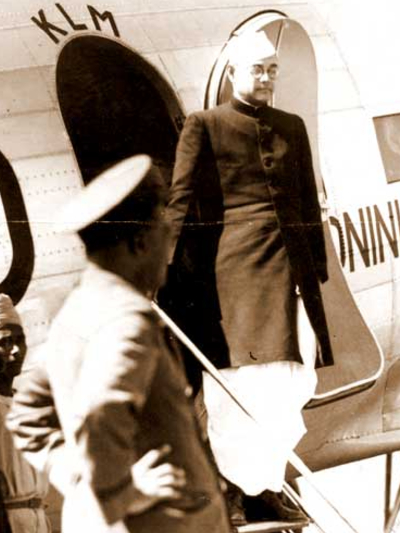
Subhas Chandra Bose arrives at Calcutta’s Dum Dum Aerodrome
As we have already quoted, special arrangements have been made for the trial of such cases and of special rules of evidence to be adopted, if found necessary, and of trial en camera.
We are not contending about the rigour of the law. But we maintain that when the scope of the law is so wide and every safeguard has been provided for the protection of witnesses and against the fear of drying up of the sources of police information, it does not lie in the mouth of the Government now further to plead that a person like Sj. Subhas Chandra Bose cannot have a trial.
During recent years there have been several big conspiracy cases connected with terrorist crimes which have been tried under the Emergency laws and convictions have been secured, unattended by any of the evil effects as apprehended by the Home Member. In the eye of the law there should be no distinction between one person and another. If other people can be tried and convicted with impunity under the Emergency Laws, why should Sj. Subhas Chandra Bose, who does not pray for any special mercies, be spared the consequences of his alleged action? We know from our long and intimate acquaintance with Sj. Subhas Bose that he is incapable of having any connection with terrorist crime, and that is the reason why we challenge Government to deal with him legally. We shall now show that Regulation No. III of 1818 is inapplicable in his case.
In the preamble to the Regulation it is stated that it would apply:
(i) “For the due maintenance of alliances formed by the British Government with foreign powers.
(ii) “For the preservation of tranquillity in the territories of Native Princes entitled to the protection of the British Government.
(iii) “For the security of the British Dominions from foreign hostility or internal commotion.’’
It is on one of these three grounds that a person can be arrested and kept under detention under Regulation III.
We maintain that when the scope of the law is so wide and every safeguard has been provided for the protection of witnesses and against the fear of drying up of the sources of police information, it does not lie in the mouth of the Government now further to plead that a person like Sj. Subhas Chandra Bose cannot have a trial… We know from our long and intimate acquaintance with Sj. Subhas Bose that he is incapable of having any connection with terrorist crime, and that is the reason why we challenge Government to deal with him legally.
We shall try to show that none of these provisions are applicable in Sj. Bose’s case. When this Regulation was made there were in the country numerous and powerful feudatories of the sovereign recently conquered and several ceded provinces, nominally subjects of His Majesty but from whom danger might at any time be apprehended. So this regulation was not intended for application against political agitators, sedition-mongers or terrorists.
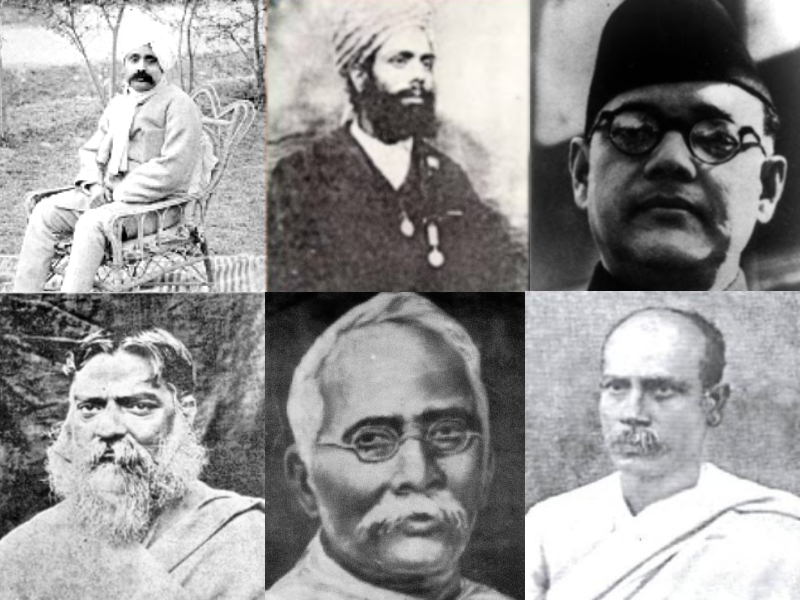
Victims of Regulation III First Row (L to R): Lala lajpat Rai, Sirdar Ajit Singh, Subhas Chandra Bose; Second Row (L to R): Sj. Krishna Kr. Mitra, Ashwini Kumar Dutt, Sj. Pulin Behary Das.
The first application of this regulation was in July, 1869, in connection with the Wahabi movements when Ameer Khan was a victim of Regulation III in Bengal. The next case was in 1897 when the two Natu brothers of Poona were dealt with under the same regulation. In 1907, Lala Lajpat Rai and Sirdar Ajit Singh were deported under the provision of the Regulation and in 1908 the late Aswini Kumar Dutt, Sj. Krishna Kr. Mitra, Raja Subodh Ch. Mallik, the late Shyam Sundar Chakravarty, Sj. Pulin Behary Das, Sj. Satish Ch. Chatterjee, the late Monoranjan Guha Thakurta, Sj. Sachindra Prasad Bose, and Sj. Bhupesh Chandra Nag were deported under the same regulation.
During the Great War numerous persons were dealt with under the same regulation.
So there is no reason why the ordinary laws should be suspended at a time when there is no war in which England is involved or there is any insecurity of the British Dominions “from foreign hostility and from internal commotion.”
We do not know what were the charges framed against Sj. Subhas Chandra Bose for his arrest and detention. All that we can gather from the speeches of the Home Member of the Government of India is that Mr. Bose is guilty of possessing intellectual powers and organizing capacity and the bold assertion is that he is deeply involved in terrorist crime.
During the recent discussion on the question of the repeal of repressive laws in the Legislative Assembly both the Home Member and the Law Member made large promises that they would substantiate by facts the complicity of Sj. Subhas Chandra Bose with terrorist crime.
From the scrappy report that appeared in the daily press it appeared that the only point there to be made was about the letter of Sj. Krishnadas, the paid secretary of the All-India Congress Office, who in one of his intercepted letters to Gandhiji wrote that Sj. Subhas Chandra Bose was connected with the Jugantar group.
Krishnadas himself in a recent statement said that his information about several schools of revolutionaries in Bengal was gathered by him in prison from all sorts of people including a host of Government emissaries and agent provocateurs. He made it clear that he had no direct knowledge of Sj. Subhas Chandra Bose’s complicity with the Jugantar party of the revolutionaries and what he wrote was based on hearsay or gossip.
All that we can gather from the speeches of the Home Member of the Government of India is that Mr. Bose is guilty of possessing intellectual powers and organizing capacity and the bold assertion is that he is deeply involved in terrorist crime… From the scrappy report that appeared in the daily press it appeared that the only point there to be made was about the letter of Sj. Krishnadas… who in one of his intercepted letters to Gandhiji wrote that Sj. Subhas Chandra Bose was connected with the Jugantar group. Krishnadas himself in a recent statement… made it clear that he had no direct knowledge of Sj. Subhas Chandra Bose’s complicity with the Jugantar party of the revolutionaries and what he wrote was based on hearsay or gossip.
It is to be regretted that Government sometimes comes to conclusion from such flimsy and unsubstantial evidence. It is much to be regretted that the lives and liberties of such respected citizens are jeopardized on such untrustworthy evidence, and that Government could not disclose any better evidence than the flimsy hearsay evidence contained in the letter of Sj. Krishnadas. All this would appear to show that their declaration of having definite proof against Sj. Subhas Chandra Bose is a mere myth. They dare not face a trial in open court when the witnesses may be properly tested by thorough cross-examination.
With a view to find out if any substantial allegation has been made out against Sj. Subhas Chandra Bose, we have carefully gone through the Note presented by the Secretary of State for India on terrorism in India which he laid before the Joint Committee on Indian Constitutional Reforms.
There are a few references to Sj. Subhas Chandra Bose in that note and we shall presently mention them to evaluate their worth. On page 333 of the said report it is said:
“According to the confession of Dr. Narayan Roy, ‘his mind had been inflamed’ by speeches made by Subhas Chandra Bose and another well-known political agitator.”
If those speeches of Sj. Subhas Bose were seditious which inflamed the mind of Dr. Narayan Roy, it was the clear duty of the Government to prosecute him for sedition. But if they have failed to do so, it is no use arguing now that he was involved in terrorism.
On page 348 it is stated:
“Dr. Bhupendra Nath Dutta (an old terrorist), Kanai Lal, Subhas Bose (detained twice under Regulation III), Bankim Chandra Mukherjee and others devoted their energies, from varying motives, to the development and growth of organizations based on communist or semicommunist ideas.”
There was a conspiracy case known as the Meerut Conspiracy case in which alleged communist leaders of varying degrees were arraigned and found convicted, but Sj. Subhas Chandra Bose is not one of them. In the same report it is stated:
“At the instance of Subhas Chandra Bose, Pandit Jawahar Lal Nehru presided over the All-Bengal Students’ Conference in 1928 and in his speech advocated communism and internationalism for India. Immediately on his departure an Independence League was started by Subhas Bose with a number of ex-detenus and State Prisoners. They drew up a manifesto on Bolshevik lines, which evoked some protest. When later, however, Jawahar Lal himself started the ‘Independence for India League,’ having for its object the achievement of Swaraj for India, with the help and support of Kanai Ganguli and Bhupendra Dutt, it met with strong opposition from Subhas Chandra Bose and his followers, who now formed a separate ‘Independence for India League’ in Bengal.”
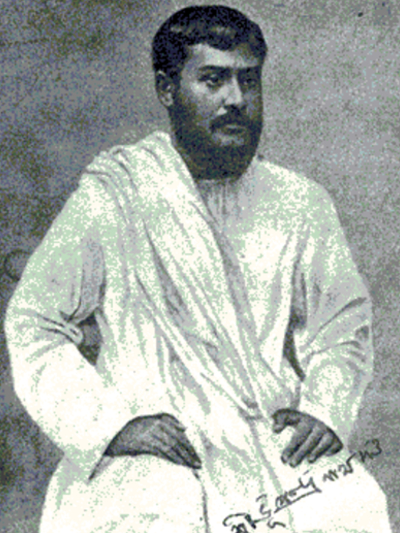
Bhupendra Nath Dutta
“At the instance of Subhas Chandra Bose, Pandit Jawahar Lal Nehru presided over the All-Bengal Students’ Conference in 1928 and in his speech advocated communism and internationalism for India. Immediately on his departure an Independence League was started by Subhas Bose with a number of ex-detenus and State Prisoners. They drew up a manifesto on Bolshevik lines, which evoked some protest.” —Note presented by the Secretary of State for India on terrorism in India which he laid before the Joint Committee on Indian Constitutional Reforms
In a later passage it is said:
“During the Jute Mills Strike of 1929 there were indications that the Congress Scheme was to get the intelligentsia to organize a mass upheaval through the youth and students’ and volunteer movements with a view to coerce the Government. The scheme did not materialize and the Meerut case has for the time being ended attempts to form organizations on communist lines.”
There are other passages as on page 338 as follows:
“To complete the picture it is necessary to say a word about the connection of the Congress Committee, and the Calcutta Corporation and the manner in which subversive movements in general and terrorism in particular have received encouragement from the Corporation.
The present Calcutta Corporation was the creation of the Act of 1923. In 1929 the Congress under the leadership of late Mr. C. R. Das obtained a large majority in it and since then has dominated it under the leadership successively of late Mr. J. M. Sen Gupta and Mr. Subhas Ch. Bose, both ex-presidents of the Bengal Provincial Congress Committee and of Dr. B. C. Roy. The former two were bitter critics of Government and at various times were incarcerated under Regulation III of 1818 and the latter suffered imprisonment during the Civil Disobedience Movements.”
Those are some of the specimens cited by the Secretary of State as indicative of terrorism in Bengal. It has been opined that:
“It is true that the Congress formally dissociated itself from terrorism but it was equally clear that, if some of the workers and leaders of Congress were given a free hand, they would not be averse to giving their general support to terrorism.”
This is the bold inference of the Secretary of State on Mahatma Gandhi’s Civil Disobedience Movement, which, according to him, “aroused anti-British sentiment and a spirit of lawlessness in the province” and that “seditious literature of the most violent description was being broadcast in the shape of pamphlets and books”. It is certainly claimed that the Government saved the situation by passing of ordinances and emergency legislation and the “situation had apparently greatly improved” and we do not see any reason why the law was not applied against Sj. Subhas Chandra Bose, if the Government considered him guilty, and why the old Regulation, which was not designed to meet such situations, was misapplied. Sj. Bose has been suffering from serious intestinal troubles for the last four or five years and he was away from India for his treatment.
His immediate arrest on his return from the continent of Europe to his native land after a prolonged absence makes it clear that his detention is not due to his activities but to his pronounced views about Swaraj for India. That Government officials are not known for consistency or accuracy of their remarks about Indian leaders will be evident from the following anecdote.
Lord Morley in his letter to Lord Minto wrote:
“You have nine men locked up a year ago by ‘letter de cache!’ because you believed them to be criminally connected with criminal plots, and because you expected their arrest to check these plots.”
“You have nine men locked up a year ago by ‘letter de cache!’ because you believed them to be criminally connected with criminal plots, and because you expected their arrest to check these plots.” — Lord Morley in his letter to Lord Minto
But speaking on the 7th January, 1924, on the Ordinance Bill in the Bengal Legislative Council Sir Hugh Stephenson referred to those arrests and said that Sj. Krishna Kumar Mitra and others were deported because of violent boycott speeches and not for their connection with terrorist crime.
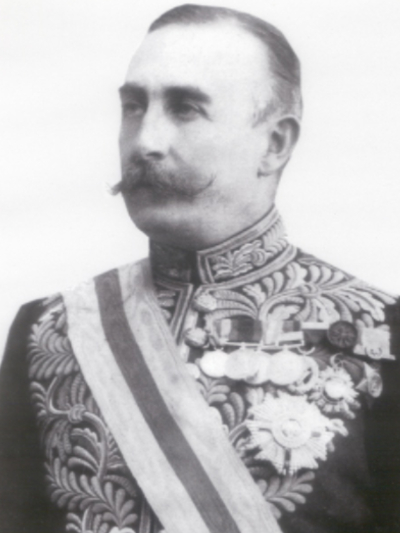
Lord Minto
But speaking on the 7th January, 1924, on the Ordinance Bill in the Bengal Legislative Council Sir Hugh Stephenson referred to those arrests and said that Sj. Krishna Kumar Mitra and others were deported because of violent boycott speeches and not for their connection with terrorist crime. We quote his exact words:
“The first two are those of Babu Aswini Kumar Dutta and Babu Krishna Kumar Mitra. It has been said that no one will believe that they had anything to do with terrorist crime and that therefore the secret information of the police must have been false and Government may equally well be deceived by such false information now.
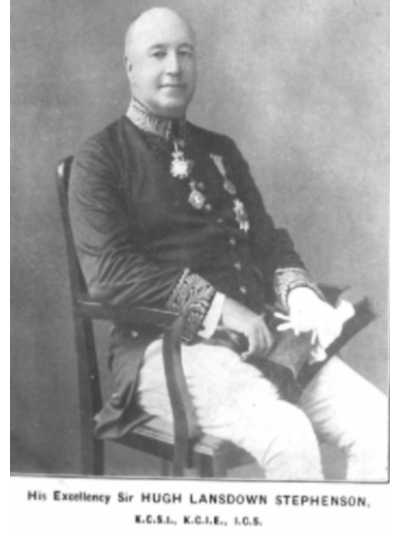
Sir Hugh Stephenson
“I never knew Babu Aswini Kr. Dutta but I hope Babu Krishna Kumar will not be ashamed if I call him my friend and I wholeheartedly acquit him of sympathy with terrorist crime, but as far as I know no one has ever accused him or Babu Aswini Kumar Dutta of promoting crime still less of taking part in it. The Bengal Government asked for the arrest under the Bengal Regulation III of 1818 of Babu Krishna Kumar Mitra in 1908 because of his violent boycott speeches and his activity in organising volunteers involved in the danger of internal commotion. In the same way the Eastern Bengal Government asked for the use of the said Regulation in the case of Babu Aswini Kumar Dutta because of his whirlwind campaign of anti-Government speeches and of his control of the Brojo Mohan Institution, from which a stream of Swadeshi preachers was constantly pouring.
“We believe the time will come when an equally highly placed official from his place in the Government will declare that Sj. Subhas Chandra Bose could not be conceived of being implicated in any terrorist crime, but that his arrest and detention were due to his great love for his country, his high intellectual power and his great organizing abilities, his unbounded influence over the youth of the country and the great love and respect in which he is held by his countrymen at large.”
Lord Morley has truly said:
“Excess of severity is not the path to order. On the contrary it is the path to the bomb.”
If Government sincerely believe that Sj. Subhas Chandra Bose is implicated in any terrorist activities, it is the clear duty of the Government to haul him up before a Court of Law. Arbitrary detention for an indefinite period as a regular weapon of Government should now cease. Punishment without trial is abhorrent. Sir Surendra Nath Banerjea rightly said that:
“Security of life and property are the great foundation upon which rests the vast, the stupendous, the colossal fabric of British rule in India. What becomes then of these inestimable blessings, if at any moment your property may be confiscated, you may be arrested, kept in custody for months together without a trial and without a word of explanation? What becomes of the boasted vaunt of the boon of personal liberty and personal security under British rule under the circumstances?”
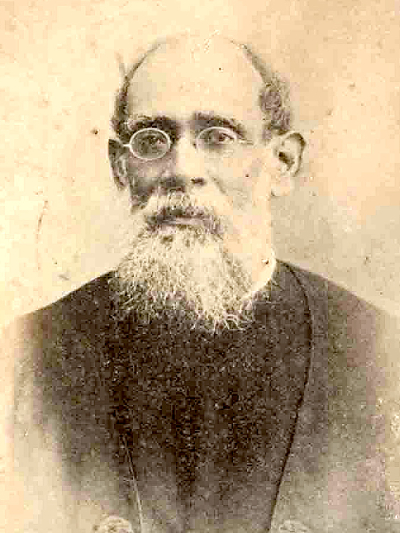
Sir Surendra Nath Banerjea
“Excess of severity is not the path to order. On the contrary it is the path to the bomb.” —Lord Morley
Arbitrary detention for an indefinite period as a regular weapon of Government should now cease. Punishment without trial is abhorrent.
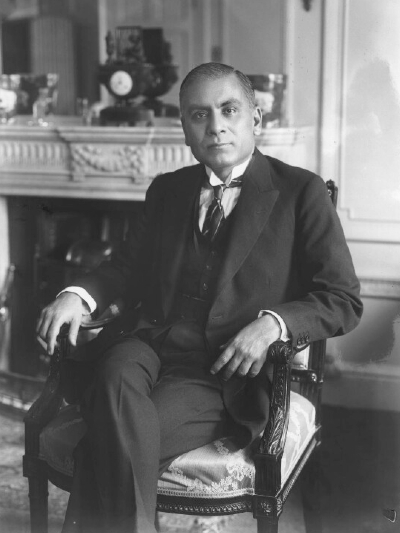
Sir Tej Bahadur Sapru
The Repressive Laws Committee was constituted in compliance with a resolution passed by the Council of State in 1921 with Sir Tej Bahadur Sapru, the then Law Member, as its President. In their report they said that Regulation III of 1818 should not, in future, be put in operation anywhere, except the North-western Frontier Province. The Government of India accepted the recommendations of the Committee. But it seems they have resiled from their former position and are now making free use of the old Regulation.
All that we want is that there should be the rule of law and persons should not suffer merely for their love of their country.
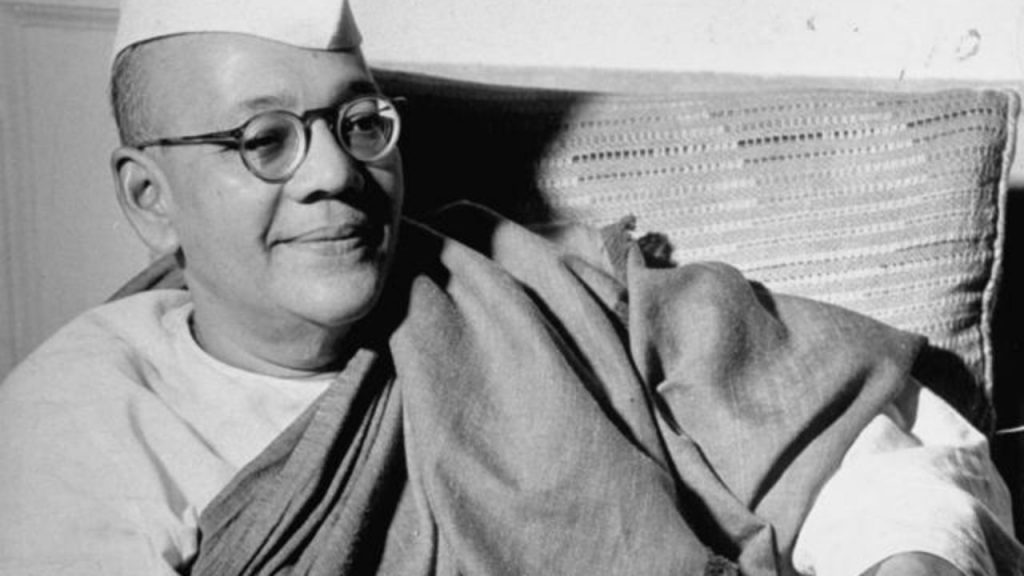
Sarat Chandra Bose
Addendum, June 1936:
Removal of Subhas Chandra Bose to Kurseong
It is some relief that Mr. Subhas Chandra Bose has been removed from the sultry climate of Poona, where he was confined in Yeravada Central Prison, to the cool heights of Kurseong in the Darjeeling district, where he is interned in the house of his brother Mr. Sarat Chandra Bose, who had himself been interned there.
The (unproved) allegations made by Government against both the brothers are similar. Both in turn have been interned in the same town and house. May it be hoped then that Mr. Subhas Chandra Bose will be now released as his brother was? That will give some satisfaction to the public.
But nothing can completely satisfy the public except the repeal of all laws, regulations and other measures sanctioning the arbitrary imprisonment of men and women for indefinite periods without trial and conviction according to ordinary judicial processes.
May 1936
ABOUT ‘THE MODERN REVIEW’:
The Modern Review was founded in 1907 by Ramananda Chatterjee, who also founded and edited the Bengali magazine, Prabasi and the Hindi magazine, Vishal Bharat. All three periodicals can be best described as journals of opinion.
The Modern Review published essays by practically every well-known leader of the Indian nationalist movement, along with the views of foreign sympathisers. It also carried rousing editorials from Ramananda Babu himself. After his demise in 1943, his son Kedarnath carried on the good work until he passed away in 1965. The magazine also published fiction, book and art reviews, travelogues, etc., including essays by pioneers like the anthropologist Verrier Elwin and historian, Jadunath Sarkar.
Ramananda Babu allowed his contributors to present every shade of opinion and argue their cases, while ensuring the magazine itself maintained an impartial editorial stance. He was happy to publish long multi-issue arguments between luminaries like Tagore-Gandhi and Subhas Bose-Sardar Patel about the shape and direction of the nationalist movement. Contemporary opinions about topics such as education, women’s rights, the relations between religions and castes, electoral politics, India’s place in the world, and international relations can be accessed and contextualised by leafing through the archives of this journal of record.
—Devangshu Datta
To read a select anthology of articles, interviews, poetry and fiction published from 1907-1947 in the Modern Review, you can buy‘Patriots, Poets and Prisoners’ here.
ARCHIVE
An excerpt from Gyan Prakash’s Emergency Chronicles: Indira Gandhi and Democracy’s Turning Point that will make you shudder, remember and, most importantly, understand what one of Indian democracy’s darkest chapters felt like, and how it came to pass. And why we must never allow it to come to pass again.
It is important to remember the night of June 25th, 1975, when – as Gyan Prakash writes in the introduction to the chapter ‘Lawful Suspension of Law’ in his ‘Emergency Chronicles: Indira Gandhi and Democracy’s Turning Point’ – President Fakhruddin Ali Ahmed signed a draft Emergency proclamation and then “swallowed a tranquilizer and went to bed”.
We have republished a section called ‘Shadow Power’ from the same chapter because – even as that day, 45 years hence, passes by, and before the night arrives – it is important to remember the hundreds, then thousands, then well over hundred thousand arrests, the clampdown on and ignominious defeat of a free press – both by direct action and chilling effect – and the arbitrariness with which the shadowy figures of the night-state (for what else should one call this) were appointed and operated. It is equally important to remember the victims of this night-state, and the horrors they experienced. The mother of a JNU student – “lifted” from campus without a warrant – pushed to a nervous break-down. The brother of a socialist leader, tortured, then denied medical care. A woman “whisked off” upon arrival at the airport, with her eight year old child. This is just the tip of the iceberg. More students tortured, killed. More parents left distraught, without information of their children’s whereabouts. More dissent quelled, even as the comedy of horrors laid out by the government by way of propaganda regressed from the banal to the ridiculous. Many of us know all this. But we must try to relive it – the horror and the grief – else those small but significant acts of defiance, of those whose heads were held high above this darkness, will mean nothing.
But there is another reason we must remember. “After all,” writes Prakash in his prologue to the book. “Indira Gandhi and her distortion of the political system did not fall out of the sky, however much the remembrance of the trauma of the Emergency persuades us to believe it is so.” “Prakash argues… ” writes political scientist Ben Margulies in his review of ‘Emergency Chronicles’. “That the Emergency was not a departure from Indian norms, but rather an intensification of authoritarian practices New Delhi had employed from independence.”
“The operation of the political will… did not mean lawlessness because the constitution provided for the declaration of emergency,” Prakash writes. “The regime used a combination of existing laws on preventive detention, decrees and constitutional amendments passed by the Parliament to dress its rules in a legal disguise.” The following excerpt outlines how recommendations for police reforms from as early on as 1902, and by so many committees in the post-colonial era, have remained on paper enabling a deep state to act with varying degrees of impunity at various times, often in service of their political masters, often serving themselves.
It is interesting to note that the anniversary of the Emergency comes close on the heels of the anniversary of the Battle of Plassey (on which Sudeep Chakravarti – whose insights you can read here – has written a book recently). One event set in motion a series of consequences that saw our freedoms being held in a stranglehold by powers from afar. The other saw the suspension of our freedoms courtesy the powers within.
While Prakash holds Indira Gandhi squarely responsible for the abhorrence that was the Emergency, he traces – in his epilogue – the enablement of this terror way back to constituent assembly debates: “For all his concerns about inequality, Ambedkar was also worried about the danger posed by the ‘grammar of anarchy’ (you can read an excerpt of Ambedkar’s speech, being referred to, here) of popular politics. Additionally, the postwar turmoil and the violence of Partition drove lawmakers to craft a powerful state that would secure national unity. They set aside the criticisms of emergency powers and the removal of due process and restrictions on rights to freedom.”
Margulies writes, “Consequently, India’s ruling elites embedded sweeping emergency provisions in the Indian constitution (adopted in 1950), while working to strengthen the central government and limit restrictions on its executive power.”
Our obsession with a “powerful” or ‘strong’ “central government” persists. This manifests itself not just in the sword of an Emergency 2.0 hanging over our heads but, equally, in the laws of preventive detention we see in force around us. While writing about an “afterlife” of the Emergency, Prakash notes how “the short-lived Charan Singh government brought back preventive detention in spite of the Janata Party’s rhetoric about fully undoing the emergency”.
The afterlife continues. And as one reads in the following excerpt about the state excesses that MISA enabled during the Emergency, can one truly ignore the excesses that the UAPA is enabling today?
‘SHADOW POWER’
The suspension of law released a spectral force of power that was a gift from heaven for someone like Bansi Lal, the Haryana chief minister and Sanjay’s hatchet man. An ambitious man of action, he was not wont to let the law and official rules of conduct stand in the way when it came to outdoing his master’s bidding. Since June 12, the chief minister had been directing government officers in his state to round up people and send them to Delhi for rallies in support of Indira. On the afternoon of June 25, he asked his principal secretary to tell the police to prepare a list of people “prejudicial to the state.” Around 10 p.m., the principal secretary was summoned to the chief minister’s residence, where he handed over the list. Soon, he was in Bansi Lal’s bedroom. The chief minister was sitting on the bed, reading out names on the list to another minister, who was concurring and also suggesting fresh names. The principal secretary and another senior officer in the bedroom stood as silent spectators.
Bansi Lal already enjoyed authority as a chief minister, but his power grew exponentially on June 25. He had been present that afternoon at a meeting called by Dhawan in his office at the PM’s residence. Om Mehta, the minister of state for Home, and Krishan Chand, the former Indian Civil Service officer whom Sanjay had anointed as Delhi’s lieutenant governor, were in attendance. Also present was K. S. Bajwa, the Delhi SP (Crime Investigation Department) (Special Branch), a thirty- seven-year-old intelligence officer tasked with compiling a list of possible detainees. The discussion concluded with directions to carry out arrests in the night, before the president had even signed the Emergency proclamation.
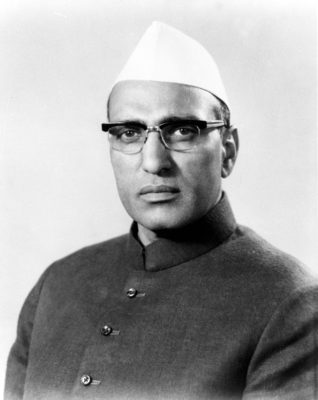
Bansi Lal
While Bansi Lal returned to Haryana to gleefully implement the order, the LG assembled his senior administrative and police officials at his residence late on the evening of June 25. In attendance, among others, was Navin Chawla, the lieutenant governor’s London School of Economics–educated secretary and Sanjay’s friend. Also present was Bhinder, the forty-year-old Sikh police officer who had an uncanny instinct to be present at all such occasions. He was already privy to arrest plans, having been present a day earlier in the discussion of impending arrests with Dhawan and Sanjay at the PM’s residence. LG Krishan Chand opened the meeting by informing the assembled officials that the president was going to declare an Emergency and that they should prepare for arrests. District Magistrate Sushil Kumar protested that there was not enough time to prepare the MISA detention orders and suggested using the ordinary provisions of criminal law instead. But another officer objected to this suggestion, pointing out the absurdity of detaining respected national leaders under criminal law. The LG overruled all objections and directed them to carry out arrests under MISA using the list supplied by the Delhi police officer Bajwa, who was also in attendance. Bajwa then returned to his office, prepared a list of 159 targets for arrest, including 17 top national leaders, and handed it to Bhinder.
On the afternoon of June 25, he (Chief Minister Bansi Lal) asked his principal secretary to tell the police to prepare a list of people “prejudicial to the state.” Around 10 p.m., the principal secretary was summoned to the chief minister’s residence, where he handed over the list. Soon, he was in Bansi Lal’s bedroom. The chief minister was sitting on the bed, reading out names on the list to another minister, who was concurring and also suggesting fresh names.
DM Kumar had his orders, but issuing so many MISA warrants within a short time was a problem. Dhawan kept phoning him to ask for progress reports. Finally, he went to the PM’s residence to explain the problem to Dhawan. It was to no avail. Left with no option, he assembled his subordinate officers, including ADM Ghosh, handed them the lists supplied by Bajwa, and directed them to make arrests under MISA. The task of typing out individual warrants was so time-consuming that Kumar asked Ghosh to go to the Tees Hazari Court and cyclostyle five hundred copies of blank MISA orders. Ghosh did as directed, but the task took a long time because there was only one machine in working order. Finally, when the job was done, he took the forms to Kumar, who asked him to fill in the names and addresses from Bajwa’s list. Some were left blank to be filled in later with the details of persons arrested. Then Ghosh went to the residence of the SP (South), who organized the raids in his area. The officers conducting the raids were instructed not to investigate the genuineness of charges. The same procedure was followed in other police districts of Delhi.
Writers have described many of these details to highlight the inauguration of the Emergency’s tyranny. I recount them to draw attention to the shadowy power unchained in the darkness before dawn. It was almost lawful but not quite. MISA warrants were used but on cyclostyled forms. Lawful agents of the state conducted the raids and made arrests but the underlying legality of their actions was suspect. Pulling the strings was Sanjay, who occupied no official position but drew his force from the reflected power of Indira. He relied on Indira’s personal assistant and his cronies Dhawan, Bansi Lal, and Om Mehta—all of whom exceeded their official authority. The enforcers were Bajwa, Chawla, and Bhinder. Young and action-oriented, they were dubbed by critics as Sanjay’s crude and ruthless upstarts who had displaced his mother’s suave and talented Kashmiri advisors, willing to ride roughshod over senior leaders and bureaucrats. The suspension of law gave them license to play fast and loose with the rules. Disobeying them ran the risk of retaliation that no one could challenge because the source of their power was shrouded in the enigma of the “PM’s House.”
Delhi’s chief secretary dared to bring to the LG’s notice the questions raised by the law secretary on the legality of grounds for detention in certain cases. LG Chand exploded, saying that it was “legal pettifogging.” When his secretary Chawla heard about the objection raised by the law secretary, his senior by several years and rank, he first chewed him out and then informed him that he had saved him with great difficulty: “I thanked him for the kind turn done to me and saving me from disgraceful exit at the fag end of my career. I left his room a sad man.” Another officer, who arrested only 60 out of the 136 detention requests, found himself transferred. Chawla told ADM Ghosh, a stickler for rules and procedures, that if the grounds for arrest were deficient, “we should fabricate such grounds as might be felt sufficient.” When the magistrate returned several detention orders, Chawla summoned him and threatened both him and his wife, who was also an IAS officer: “The penalty for not cooperating with the Administration in the matter of MISA orders will not be the usual ones like transfer to Andamans, etc. If I know the mind of the present LG, I can say categorically that he will not have the slightest hesitation in putting even senior IAS officers behind the bars under MISA.” Navin Chawla was to deny this later and called ADM Ghosh a liar. But ADM Ghosh, who had been Chawla’s classmate in the IAS, did not want to take chances. He started issuing detention orders as asked by the end of July.
The task of typing out individual warrants was so time-consuming that Kumar asked Ghosh to go to the Tees Hazari Court and cyclostyle five hundred copies of blank MISA orders. Ghosh did as directed, but the task took a long time because there was only one machine in working order. Finally, when the job was done, he took the forms to Kumar, who asked him to fill in the names and addresses from Bajwa’s list. Some were left blank to be filled in later with the details of persons arrested.
Bajwa generated the list of suspects to be detained and distributed them unsigned to police officers to execute arrests. This was troubling to some in a bureaucracy that was trained to act on written instructions both as a matter of official record and as protection from charges of unlawful conduct. One officer initially took to making a secret note of the detention request to protect himself from possible prosecution later: “Most of us thought that within a day or two the magistracy and the police will be called upon to explain the propriety of these arrests. However, subsequent events belied our apprehension.” As time went on, SP Bajwa began phoning in the list. Some resisted but were pushed back into line. They continued making arrests based on the list furnished by Bajwa, who supplied the grounds some days later. People released on bail by courts were immediately re-arrested.
Second to none in orchestrating and carrying out arrests was Bhinder. On July 11, he wrote to Prakash Singh, SP (North), supplying him with a list of teachers and students at Delhi University who were likely to cause trouble. He urged him to “kindly make arrangements for lifting these teachers and students as early as possible and report compliance.” Bhinder appears to have had a penchant for “lifting.” Thus, on September 25, he lifted Prabir Purkayastha from JNU. In spite of his claim that it was not a case of mistaken identity, and that Prabir had been a target all along, there was no police record on him until after he was abducted. The police field officer assigned to collect information on student activities at JNU had not filed any report mentioning Prabir. But once he was in police custody without a warrant, the paperwork had to be set right to make the unlawful lawful. ADM Ghosh issued a MISA warrant under the direction of his superiors. It was only on September 30, 1975, five days later, that a police report supplied the grounds for the warrant. It claimed that Prabir was a “staunch SFI worker” who had tried to stop students from attending classes, a claim unsupported by the field officer. The report went on to assert that though Prabir had joined JNU only in 1975, so powerful was his political image that Ashoka Lata Jain came under its spell and became romantically involved with him. The report was wrong. Though Prabir joined JNU only in August 1975, he had been spending time on its campus for over a year while conducting computer calculations at the nearby Indian Institute of Technology for his master’s thesis. Unaware of its faulty intelligence, the Delhi police proceeded to invent itself as an expert in matters of the heart. Prabir was a subversive who had beguiled Ashoka with his “political image” within a month of his arrival in JNU.
Four Parliament members wrote to Home Minister Brahmananda Reddy, pointing out that JNU teachers had condemned Prabir’s abduction and requested that he examine the propriety of the police action. Reddy, whom Om Mehta, his junior minister and Sanjay’s pawn, had upstaged, ordered an inquiry. To clear discrepancies, the Home Ministry asked for a report from the Intelligence Bureau, which stated that it had no information to indicate Prabir’s active role in organizing the student boycott of classes. But the Delhi administration closed ranks and flatly asserted otherwise. Prabir’s mother, Mrs. S. Purkayastha, submitted a parole application for her son to the chief secretary of the Delhi administration on November 5, 1975. On November 24, Dr. N. M. Ghatate filed a habeas corpus writ petition under Article 226 on Prabir’s behalf in Delhi High Court. While this was pending, he also filed a parole petition for him to appear in his viva voce examination in Allahabad to complete his master’s degree from Motilal College of Engineering. On December 1, three senior JNU faculty members submitted a petition for Prabir’s release, with supporting affidavits from students who had witnessed the police abduction.
In preparing the legal brief against these petitions, the Delhi administration asked the concerned officers for their opinion. ADM Ghosh recommended parole, but SP Bajwa did not. The police officers closed ranks. No, it was not a case of mistaken identity. The police did not grab Prabir and whisk him off and produce a warrant post facto late that night. Contrary to all documentary records, the SP (South) claimed that a police inspector accompanied by two subinspectors entered the JNU compound in a vehicle and executed a pending MISA warrant at 9:30 a.m. in an orderly fashion. Even Ghosh concurred in the cover-up. Bhinder read the petitions on Prabir’s behalf and recommended no response, as the matter was sub-judice. But everyone lied to protect Bhinder. Even Maneka Gandhi came to his defense. She stated that Prabir was one of the students who stopped her and claimed that she did not go home immediately but sat in the lawns. It was then that some officers in plainclothes came and arrested Prabir. No, there was no Sikh gentleman among them. The logbook of the car contradicted her account.
Bhinder appears to have had a penchant for “lifting.” Thus, on September 25, he lifted Prabir Purkayastha from JNU. In spite of his claim that it was not a case of mistaken identity, and that Prabir had been a target all along, there was no police record on him until after he was abducted. The police field officer assigned to collect information on student activities at JNU had not filed any report mentioning Prabir. But once he was in police custody without a warrant, the paperwork had to be set right to make the unlawful lawful… The report went on to assert that though Prabir had joined JNU only in 1975, so powerful was his political image that Ashoka Lata Jain came under its spell and became romantically involved with him. The report was wrong… Unaware of its faulty intelligence, the Delhi police proceeded to invent itself as an expert in matters of the heart.
Meanwhile, the police finally netted Devi Prasad Tripathi, DIG Bhinder’s original target. Along with two friends, Tripathi was walking from Old Campus to New Campus when a posse of policemen grabbed him, dumped him in a waiting van, and spirited him away. A month later, Sitaram Yechury, another JNU SFI leader, also found himself behind bars. These successes did not make the Delhi police go easy on Prabir. When the Delhi High Court ordered his release on parole, the Delhi administration wanted to appeal. But the Supreme Court was closed for winter vacation and would not reopen until January 4. Left with no path of resistance to the court order for parole, the Delhi administration nevertheless defied it by not releasing him and transferred him in handcuffs to Naini Jail in Uttar Pradesh near Allahabad on January 1, 1976. He appeared for his viva voce examination in the prison. Three days later, he was brought back to Tihar Jail in Delhi. His distraught parents ran from pillar to post to obtain his release. Using her Bengali connections, his mother contacted D. P. Chattopadhyaya, a minister in Indira’s government, for help. He wrote to Om Mehta in February 1976, prompting further inquiry by Home Ministry officials. Asked to reexamine the case and revoke Prabir’s detention, the Delhi administration cited Bajwa’s questionable evidence as the truth to rebuff the request. On March 3, Prabir was transferred to Agra Jail, where he spent the remaining days of his imprisonment. The news of his solitary confinement for twenty-five days caused his mother to have a nervous breakdown. There appeared to be no way to get her son released, no way to move, let alone hold accountable, the mysterious power birthed by the suspension of constitutional rights.
Beginning on June 29, the government introduced a series of presidential ordinances to amend MISA that extracted further life out of the rule of law. These ordinances forbade the courts from applying the concept of “natural justice” in cases involving MISA detainees, rendered inapplicable the provisions for the communication of grounds for arrest, and prevented advisory boards from reviewing detentions. No one, including a foreigner, could challenge detention on grounds of natural or common law; and grounds for detention were defined as confidential matters of the state and their disclosure, including to the detainee, against the public interest. This made preventive detention far more draconian and placed it beyond even the quasi-judicial scrutiny of advisory boards. It is worth recalling that critics in the Constituent Assembly had warned against the abolition of due process, fearing that it would lead to executive overreach. A much milder Preventive Detention Bill moved by Patel in 1950 had also provoked objections. The central government went on to immediately use the law. Over the years, various state governments also used versions of preventive detention laws. When MISA was first introduced in 1971 in the wake of the Bangladesh war, the government had stated, in the face of vociferous criticism, that it would not be used against internal dissent. It did not keep its promise. The MISA amendments tightened the screw further.
However, the amended MISA law, draconian as it was, did not permit the state to conduct arrests without recording the grounds for incarceration, even if they were not to be communicated to the detainee. But, as we have seen in Bajwa’s practice of communicating lists of persons to be arrested, often on the telephone, the police routinely violated the law. This was true not just in Delhi but everywhere. The required four-month review of individual cases also remained on paper. The government was callous in responding to requests for parole because of death or illness in the family, or to appear for examinations, as in Prabir’s case. Secretary Chawla warned an official against noting recommendations for parole on the file. It was “friendly advice,” he added.
Licensed to arrest on the flimsiest of grounds, the police detained over 110,000 people under MISA and Defence of Internal Security of India Rules. Many of them were members of banned organizations like the RSS, Anand Marg, Jamaat-e-Islami, and the Maoist CPI(ML), as well as non-CPI opposition parties. Mere membership in the banned organizations or alleged sympathy for them, not any documented prejudicial activity, was grounds for arrest. Alleged participation in secret meetings, criticism of the Emergency or the prime minister in the public arena or private conversations, and opposition to government policies were grounds for detention. A large number of suspected criminals in several states were also put behind bars under MISA. In several cases, their alleged offenses were committed more than five years before 1975. Several trade union activists were rounded up on the grounds that they previously participated in agitations against the management. New Delhi advised state governments against the indiscriminate use of MISA, but it could not control what it had unleashed. The Shah Commission, appointed in 1977 to investigate the Emergency’s “excesses,” concluded: “MISA was used as a weapon against all kinds of activities, not even remotely connected with the security of the state, public order or maintenance of essential supplies.”
Licensed to arrest on the flimsiest of grounds, the police detained over 110,000 people under MISA and Defence of Internal Security of India Rules. Many of them were members of banned organizations like the RSS, Anand Marg, Jamaat-e-Islami, and the Maoist CPI(ML), as well as non-CPI opposition parties. Mere membership in the banned organizations or alleged sympathy for them, not any documented prejudicial activity, was grounds for arrest… New Delhi advised state governments against the indiscriminate use of MISA, but it could not control what it had unleashed.
There are many examples, including Prabir’s, that substantiate Justice Shah’s conclusion. A notable example was the arrest of Primila Lewis. On July 2, Lewis arrived in Delhi along with her eight-year-old son, Karoki, on a flight from London. At the airport, the immigration officer examined her passport and read out her name with a tone of recognition. Soon, she and Karoki were whisked off to the International Departure Lounge. A long wait followed while Primila tried to reassure her tired and anxious son. Around 12:30 p.m., a posse of police officers entered the lounge and escorted the two into a waiting taxi, which took them to the Parliament Street Police Station. Another long wait followed. Primila knew the Emergency had let loose random arrests. But knowing what could now happen, with a child restless after a long international flight, heightened her anxiety. Around 5 p.m., she was served with a warrant of arrest under MISA. Her crime? She had ruffled some powerful feathers.
Primila, who was then thirty-five years old, had earned a master’s degree from Mount Holyoke College in the United States and taught English literature first at Indraprastha College for Women in Delhi and later at University College, Nairobi. After five years in Nairobi, she returned to India along with her English husband, Charles Lewis. She lived for a year in Bombay, where she became involved in working with those living in poor neighborhoods. The family moved in 1971 when Charles was posted to Delhi. Wishing to live simply, she chose to rent a farmhouse in Mehrauli, on Delhi’s outskirts. The area retained the flavor of the village that it had originally been, except now it sported the farmhouses of the Delhi gentry.
The elite list of farmhouse owners included Indira and her cousin B. K. Nehru, retired generals, prominent industrialists, former royalty, and senior civil servants, whose farmhands were mostly Dalit immigrants from northern and eastern India. Their children became Karoki’s playmates. This is how Primila became involved in their lives. One thing led to another, and she was soon organizing the farmhands. She formed a union that fought against unjust evictions and pressed for the implementation of the minimum wage law. The union scored one success after another, but it also brought Primila in the crosshairs of Navin Chawla, then the ADM of the area, who was soon to become a powerful force in the Delhi administration. The press was beginning to pick up the story of how the rich and powerful were flouting the law on minimum wages. Indira heard the complaints of the incensed elite and chastised LG Chand, who turned up the heat on Chawla. By 1975, Chawla was no longer the ADM of the area but was now the secretary to LG Chand and the power behind the throne. So, when Primila stepped off that plane on July 2, the immigration staff was briefed and the police were ready. She would spend the next eighteen months in prison and was released on parole on January 9, 1977.
As Primila’s swift dumping from an international flight to the prison shows, shadow power was capricious and unrestrained, and it could be brutal. Among the many who suffered was Lawrence Fernandes. The police picked up Lawrence from his home in Bangalore on May 1, 1976. They immediately began torturing him to extract information on the whereabouts of his brother George Fernandes, the Socialist leader who had gone underground. Lawrence knew nothing. Unconvinced, the police continued to interrogate and torture him for days. When his physical condition became grave and the police feared his death in custody, they summoned a doctor. He was not told Lawrence’s identity. With the patient obviously appearing physically abused, the doctor advised immediate admission into a hospital, but he was not taken to a hospital. The police had not even formally recorded Lawrence’s arrest. They fabricated the date of his arrest as May 10, nine days after the actual date, on the false charge of involvement in sabotaging railway tracks with bombs. Later, he was transferred to the Bangalore Central Prison in a broken physical condition. Initially housed with condemned prisoners, he was placed after protest with other MISA detainees. When he was released toward the end of the Emergency, the physical toll of torture and ill treatment was still visible on his body.
Primila knew the Emergency had let loose random arrests. But knowing what could now happen, with a child restless after a long international flight, heightened her anxiety. Around 5 p.m., she was served with a warrant of arrest under MISA. Her crime? She had ruffled some powerful feathers.
Lawrence was seized and tortured because he happened to be the brother of George Fernandes, who had led the crippling 1974 railway strike and was conducting an underground resistance. Lawrence’s misfortune was that he was the elusive George’s brother, but there were others who suffered brutal treatment without association to famous opposition leaders. A case in point is Jasbir Singh, a JNU student and an opposition party activist. The police arrested him and planted some posters and Naxalite pamphlets in his bag. They tied his hands and feet to a pole, which was suspended between two chairs that were dragged apart to make Jasbir swing in the middle. He vomited blood. When he complained, the inspector threatened to kill him and discard his body in the river. Dutifully following the law, the police produced him before a magistrate. Jasbir complained, but the magistrate paid no heed, and the torture became worse.
With no public knowledge and scrutiny allowed, the authorities were able to act without restraint. Jasbir, Prabir, Primila, and countless others were left with no recourse. This was not, however, the first time in India’s history that the police were able to act with impunity. As early as 1902, the Fraser Commission had identified corruption, brutality, and inadequate supervision of the constabulary at the local level as problems. Its recommendations for reforms remained on paper, however. The problem was structural. The British colonial rule established a modern state external to society. The population experienced the arms of the civilian administration and the police as alien forces with coercive command over them. The independent Indian government inherited this coercive structure and its laws but saw no need for a fundamental structural change in how the administrative state functioned.
Several committees in the postcolonial era made recommendations for reforms, but the government did not implement them. The poorly paid and trained police continued to govern the population with habitual arbitrariness and impunity. In 1977 the Shah Commission pointed to widespread police misconduct and suggested reforms, once again. The National Police Commission, established in November 1977 by Morarji Desai’s Janata government, studied policing comprehensively. Its report showed conclusively that the post-Independence monopoly of power by the Congress party produced a pattern of political interference in police work. The interaction between politicians and the administration for implementing government policies degenerated into daily intercession for political advantage. During elections, the police would look the other way as politicians employed criminal elements to intimidate voters. Politicians secured police compliance by wielding the threat of transfer. Under political pressure, the police routinely flouted norms and rules. In the absence of a concerted effort to cultivate a democratic culture, police misconduct at the behest of the socially and politically powerful was endemic.
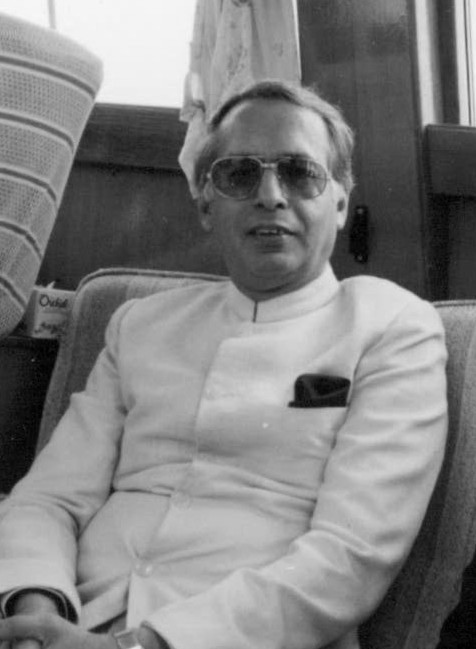
V. C. Shukla
The imposition of press censorship ensured that there was no public knowledge or discussion of police atrocities. Western newspapers, which had universally condemned the imposition of the Emergency, were warned to follow the censorship rules. Sanjay saw to it that his mother booted out Information and Broadcasting Minister I. K. Gujral, who was seen as insufficiently enthusiastic of the new dispensation. Gujral’s replacement was V. C. Shukla, a Sanjay loyalist, who summoned foreign correspondents on June 29 and, “breathing fire and smoke,” warned them they risked expulsion if they defied the censor. On June 30, the government expelled Lewis M. Simons, the Washington Post correspondent. He was given twenty-four hours to leave. Apparently this was in retaliation for his dispatch of June 20 mentioning that the defense minister had asked the army chief to send soldiers in plainclothes for a rally in support of the prime-minister and that the order was withdrawn when the news leaked. Peter Gill of the Daily Telegraph and Peter Hazelhurst of The Times were expelled on July 22 for refusing to pledge that they would comply with the censorship guidelines, and the BBC withdrew Mark Tully rather than have him sign a written undertaking. Kevin Rafferty of the Financial Times was accused of acting as a courier for other foreign journalists and was refused entry. Martin Woollacott of the Guardian, who was then outside India, was told that he would not be admitted unless he signed the pledge.
This was not, however, the first time in India’s history that the police were able to act with impunity. As early as 1902, the Fraser Commission had identified corruption, brutality, and inadequate supervision of the constabulary at the local level as problems. Its recommendations for reforms remained on paper, however. The problem was structural. The British colonial rule established a modern state external to society. The population experienced the arms of the civilian administration and the police as alien forces with coercive command over them. The independent Indian government inherited this coercive structure and its laws but saw no need for a fundamental structural change in how the administrative state functioned.

Indira and Sanjay Gandhi
The Western press posed a nuisance with editorial denunciations of the Emergency and press censorship and criticism of Indira from afar. Protest statements and letters from old India hands and intellectuals in the United States and Britain, including her long-time American friend Dorothy Norman, rankled Indira. But irritating and disappointing as these were, she remained defiant. In any case, far more important was the job of taming the Indian press. Having given them a taste of its intentions by cutting off electricity on the night of June 25, the government warned that publishing blank editorials, as the Hindustan Times and Indian Express had done, would not be tolerated. K. R. Malkani, the editor of the RSS daily, the Motherland, which had published sensational stories on Indira and Sanjay, was arrested early on the morning of June 26. A month later, the police arrested the senior journalist Kuldip Nayar. He drew official ire because of his work for the Indian Express, a newspaper sympathetic to JP. The government did not spare his eighty-one-year-old father-in-law, Bhim Sen Sachar. A life-long congressman, he had served twice as the Punjab chief minister and several terms as governor of different provinces. But none of this mattered. The police arrested him for his audacity in writing to the prime minister and demanding the removal of press censorship and the restoration of freedom.
To tame the press, the government circulated detailed censorship guidelines on June 26 under the Defence of India Rules that prohibited any publication of news about the Emergency and actions under MISA without the scrutiny of the censor’s officer. In February 1976, it enacted the Prevention of Publication of Objectionable Matter Act against the printing of “incitement of crime and other objectionable matter.” In addition, daily censorship orders were communicated over the phone to newspapers to prevent the publication of anything considered against or embarrassing to the regime. Navajivan Press, established by Mahatma Gandhi, saw its printing facilities confiscated. Himmat, a weekly edited by Rajmohan Gandhi, the Mahatma’s grandson, was suddenly asked to make a substantial deposit because it published allegedly objectionable reports. Romesh Thapar, who was once Indira’s confidant but had turned a critic by 1974, miraculously continued to publish Seminar until July 1976. Perhaps the ax did not fall on the journal because of its limited subscription and because of Thapar’s previous association with Indira. Seminar published an issue called “Judgments” in December 1975. It contained articles on the laws of detention, writ petitions, the prime minister’s election case, and a statement by Palkhivala on constitutional amendments. As was the journal’s practice, the articles were not overtly political but there was no mistaking the political implications of the interpretations of the laws. There was nothing covert about the politics of its July 1976 issue devoted to “Where do we go from here.” It included an article by political scientist Rajni Kothari on restoring the political process and one by the writer Nirmal Verma on the importance of freedom. That was it. The ax fell, and Seminar ceased publication rather than submit the journal to pre-censorship. The Indian Express and the Statesman also encountered punitive measures from the government for showing signs of resistance.
All these measures had the desired effect. The newspapers complied and published official press releases, statements, and speeches by Indira and her minions. Political cartoons disappeared overnight. The dailies dutifully reported on Indira’s faux socialism, the highlight of which was her vaunted twenty-point program to remove poverty, abolish bonded labor, implement laws on land ceilings, advance social equality, and improve the economy. To this, Sanjay added his five-point program on birth control, slum rehabilitation, and beautification. With the party apparatus destroyed and the administration in a state of paralysis, there was no way to implement even the long-desired and uncontroversial social objectives. The only instrument at the regime’s command was its coercive power, which Sanjay and his lackeys deployed with abandon, as we will see later.
As information and broadcasting minister and Sanjay’s foot soldier, Shukla missed no opportunity to enforce compliance and mount propaganda. One that fell into his lap was a triptych presented to the prime minister in June 1975 by the famous artist M. F. Husain. Later hounded into exile by right-wing Hindu activists, Husain called his work “The Triptych in the Life of a Nation.” It was his response to the political crisis, though it was widely used and seen as an endorsement of the Emergency.
All these measures had the desired effect. The newspapers complied and published official press releases, statements, and speeches by Indira and her minions. Political cartoons disappeared overnight. The dailies dutifully reported on Indira’s faux socialism, the highlight of which was her vaunted twenty-point program… As information and broadcasting minister and Sanjay’s foot soldier, Shukla missed no opportunity to enforce compliance and mount propaganda. One that fell into his lap was a triptych presented to the prime minister in June 1975 by the famous artist M. F. Husain. Later hounded into exile by right-wing Hindu activists, Husain called his work “The Triptych in the Life of a Nation.” It was his response to the political crisis, though it was widely used and seen as an endorsement of the Emergency.
The first, titled Twelfth June ’75 shows the figure of Janaki, the daughter of Earth, set high above in the sky and beyond the reach of the accusing fingers from the menacing headless body below named Janata. The second, titled Twenty fourth June ’75, depicted Mother Earth in turmoil, her hair scattered over the Himalayas, her knees pulled up toward the Bay of Bengal, her breasts drowned in the Indian Ocean, and her gaze fixed on the scales of justice titled “Supreme.” The third, and the most controversial, called Twenty sixth June ’75, was an image of Goddess Durga riding a roaring tiger, determined to eliminate evil.
The Information and Broadcasting Ministry arranged for the exhibition of the triptych in Delhi, Bombay, Calcutta, New York, and Prague. Reporting on the response, the ministry noted that it was favorable, though in Prague some young and old Czechoslovak artists were reportedly startled by the triptych’s “high degree of sex symbolism.” They were assured that the work was not pornographic but modern interpretations of India’s traditional mythology. Perhaps drawing from Husain’s note describing his motivations for the triptych, the ministry’s secretary enthusiastically compared the paintings to Picasso’s Guernica and asked the director of the National Gallery of Modern Art in New Delhi to house them permanently in the museum. The director refused, calling the comparison to Picasso an insult to the great master. Thwarted, the ministry directed that the paintings be returned to Husain’s son, although they were gifts to the prime minister. So tainted was the triptych by its association with the Emergency, it is no longer in public circulation.
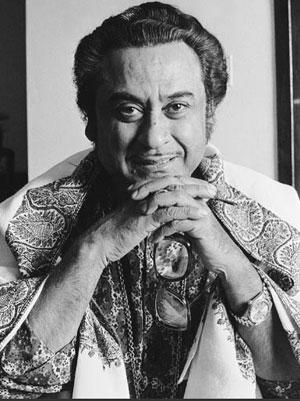
Kishore Kumar
Another instance in which the ministry’s propaganda efforts failed spectacularly, though not for want of trying, involved the famous film actor and playback singer Kishore Kumar. Ministry officials traveled to Bombay and summoned him to a meeting to discuss their proposal that he compose and sing songs lauding the twenty-point program. The mercurial singer came on the phone and “curtly and bluntly” declined to meet them, pleading illness, and adding that he did not sing on the radio and TV. Used to compliance, the mandarins from the ministry were enraged by his defiance. They ordered a ban on his recorded songs being played on All India Radio and government-controlled television and unsuccessfully tried to get the record companies to withdraw his records.
When Kishore Kumar’s songs stopped playing on All India Radio, his fans did not know the reason for it. They could guess and speculate, but the real cause remained hidden from them. This was the general condition under strict censorship. It was not a matter of abstract freedom, affecting editors and reporters, and the singer’s fans alone. The news blackout, the absence of public knowledge and accountability, could devastate lives. This is what happened to P. Rajan, an engineering student in Kerala, and his father, Professor T. V. Echara Varier.
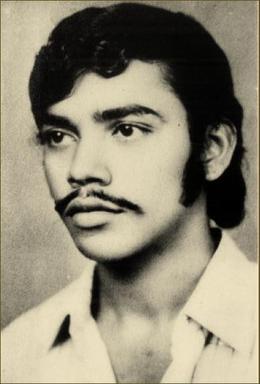
P. Rajan
On February 29, 1976, the police arrested twenty-one-year-old Rajan along with another student from their dormitory at the Regional Engineering College in Calicut. Suspected of being Naxalite sympathizers, they were taken to a nearby police camp and tortured. Rajan’s father, a professor of Hindi, learned of his son’s arrest the following day and immediately went to the police camp. Although Varier was denied entry, the sentry at the gate confirmed that his son was being held inside. This camp was one of several torture chambers, called “workshops” in police parlance, in operation in the state. Among the torture methods they employed was one called the “ruler treatment,” or “rolling.” It involved placing the victim on his back on a bench with his head dangling off one end. The victim’s mouth would then be stuffed with his undergarments to muffle the sound of his cries of pain. A heavy wooden ruler would be placed on his legs and two policemen sitting on either end would roll it up the thighs of the victim. The pain would be excruciating, and the torture would tear the ligaments from the bone, which often cracked under pressure.
On February 29, 1976, the police arrested twenty-one-year-old Rajan along with another student from their dormitory at the Regional Engineering College in Calicut… Rajan’s father, a professor of Hindi, learned of his son’s arrest the following day and immediately went to the police camp… This camp was one of several torture chambers, called “workshops” in police parlance, in operation in the state. Among the torture methods they employed was one called the “ruler treatment,” or “rolling.” It involved placing the victim on his back on a bench with his head dangling off one end. The victim’s mouth would then be stuffed with his undergarments to muffle the sound of his cries of pain. A heavy wooden ruler would be placed on his legs and two policemen sitting on either end would roll it up the thighs of the victim. The pain would be excruciating, and the torture would tear the ligaments from the bone, which often cracked under pressure.
From the time he was turned away from the dreaded police camp, Professor Varier’s life, as he relates in his moving Memories of a Father, was consumed by the effort to find his missing son. He tried to move heaven and earth to get information, meeting the CPI leader and Kerala chief minister Achutha Menon and the home minister, petitioning Members of Parliament, and writing to newspapers. But no one was able or willing to provide any information on the whereabouts of his son. Acquaintances shunned him, afraid of associating with the father of a son accused of subversion. He suffered unspeakably, but the experience did not break him. The determined father pressed on, fortified by the memory of and love for his son. When the Emergency was lifted, he filed a habeas corpus petition before the Kerala High Court. The police denied that they had ever had Rajan in custody, but the evidence proved that they had arrested and taken him to the police camp, where he was tortured. The DIG (Crime Branch) was later convicted, but the conviction was overturned on appeal. Rajan’s body was never found. Apparently the police disposed of his body after torturing him. Professor Varier died in 2006, still grieving for the son whose body he never found:
My son is standing outside drenched in the rain.
I still have no answer to the question whether or not I feel vengeance.
But I leave one question to the world:
why are you making my innocent child stand in the rain even after his death.
I don’t close the door.
Let the rain lash inside and drench me.
Let my invisible son at least know that his father never shut the door.
This excerpt has been carried courtesy the permission of Gyan Prakash and Penguin Random House India. You can buy Emergency Chronicles: Indira Gandhi and Democracy’s Turning Point here.
ARCHIVE
The second in a series of articles from The Modern Review (1907-1965). In September, 1935, Jawaharlal Nehru wrote this essay for The Modern Review from Almora District Jail (now in Uttarakhand, then in the United Provinces). The essay, while delving deep into its subject, grows beyond this mandate to act as a window to the times and raises questions – on the use of force and violence by the state – that remain relevant today.
Some 85 years ago, sitting in Almora Jail, Jawaharlal Nehru penned some thoughts on the Indian justice system. Although he called it The Mind of a Judge, his essay ranged across the nature of the justice system and also touched upon the state’s use of violence to maintain law and order and prevent “smaller violences” as he termed it.
It is important to note that Nehru was a barrister, and the son of a famous barrister, and also that he had spent many years in jail by this period. He knew the justice system inside out and this lends an air of authenticity to the essay.
It is also worth noting that, by 1935, the Indian Imperial Police Service was largely staffed by Indians, and so was the Indian Civil Service. There were plenty of Indians officiating in the judiciary as well. The “other ranks” of the Raj’s justice system, policemen, prison staff, were entirely Indian in composition.
Reading this essay in 2020, one might be driven to despair because the abuses that Nehru so eloquently rails against are still very much in evidence nine decades later. But that continuity offers us a historical perspective that helps, to some extent, to make this explicable. Independence made little difference to the contours of the justice system. Exactly the same people, trained in the same Imperial Macaulay-ite tradition, continued to run it in 1947 and their successors inherited their mind-set too.
Nehru speaks of the gulf between the class of the typical judge and the typical criminal and how there is this utter lack of empathy between the one who passes down a sentence and the prisoner who serves it. That gulf remains.
He speaks of the fact that “a harsh penal code does not improve the social morals of a group, nor a harsh sentence those of an individual who has lapsed from grace.” This was hardly the prevailing opinion when the Indian Penal Code was imposed in the 1860s and it was an unpopular point of view in 1935. The deterrent value of harsh punishment was considered the best policy. Unfortunately the IPC remains stuck in 1861 and so apparently does the mindset of those who manage the justice system.
In addition, there was the shambolic mismanagement and lack of capacity which led, in 1935, to thousands of petty accused sitting in jail for years while awaiting trial. That situation is even worse in 2020. There were also the absurd charges where a criminal who stole one rupee (about Rs 75 in 2020 purchasing power) was sentenced to serve three years. A similar situation prevails today when somebody accused of stealing a light bulb spends years in jail.
It is when Nehru speaks of the treatment of political prisoners that the resonances are the strongest and most bitter.
“The usual political sentence now for a speech or a song or a poem which offends the Government is two years rigorous imprisonment (in the Frontier Province it is three years) and a lavish use of this is being made from day to day; but even this seems trivial when compared with the cases of large numbers of those people who are kept confined for four or five years or more, indefinitely, without conviction or sentence.”
“It is also well known that many people, who are considered politically undesirable by the police, are proceeded against under the bad livelihood or similar sections of the code and clapped in prison as bad characters with no special offence being brought up against them.”
Sundry anti-terrorism acts have been patched onto the IPC to make this an even more common situation circa 2020. Political prisoners are eliminated by encounters, or routinely incarcerated without bail for speaking up. The Bhima Koregaon case, the incarceration of a pregnant woman and of barely legal teens for expressing opinions that the government doesn’t like, are occurrences that barely make it to the mainstream news.
At the extreme limit of libertarian philosophy, one of the definitions of a state is that it has the right to collect taxes and that it has a monopoly on lawful violence. Nehru acknowledges that when he says state violence may be preferable to “numerous petty private violences”.
But as he adds that “when a State goes off the rails completely and begins to indulge in disorderly violence, then indeed it is a terrible thing, and no private or individual effort can compete with it in horror and brutality”.
Those of us who have witnessed the engineered pogroms that started in the 1980s – and have since been raised to an art-form – will concur wholeheartedly with this sentiment. Ditto for those who have witnessed the policing methods commonly used to combat left wing insurgencies and separatists in the North East and Kashmir.
Nehru offered few policy prescriptions beyond the Utopian: those who run the Justice system should voluntarily spend some time in prison.
It is a sad, sad commentary on our justice system and on our ritualistic observances of the forms of parliamentary democracy that Nehru’s essay could have been written yesterday.
—Devangshu Datta
The days when I practiced at the Bar are distant and far-off, and I find it a little difficult now to recapture the moods that must have possessed me. And yet it was only sixteen years ago that I walked out of the web of the law in more ways than one. Sometimes when I look back on those days, for in prison one grows retrospective and, as the present is dull and monotonous and full of unhappiness, the past stands out, vivid and inviting. There was little that was inviting in that legal past of mine and at no time have I felt the urge to revert to it. But still my mind played with the ifs and possibilities of that past – a foolish but an entertaining pastime when inaction is thrust on one – and I wondered how life would have treated me if I had stuck to my original profession. That was not an unlikely contingency, though it seems odd enough now: a slight twist in the thread of life might have changed my whole future. I suppose I would have done tolerably well at the Bar and I would have had a much more peaceful, a duller, and physically a more comfortable existence than I have so far had. Perhaps I might even have developed into a highly respectable and solemn-looking judge with wig and gown, as quite a number of my old friends and colleagues must have done.
How would I have felt as a judge? I have wondered. How does a judge feel or think? This second question used to occupy my mind to some extent even when I was in practice conducting or watching criminal cases, lost in wonder at the speed and apparent unconcern with which the judge sent men to the scaffold or long terms of imprisonment. That question, in a more personal form, has always faced me when I have stood in the prisoner’s dock and awaited sentence, or attended a friend’s trial for political offences. That question is almost always with me in prison, surrounded as I am with hundreds or thousands of persons whom judges have sent there. (I am not concerned for the moment with political offenders; I am only referring to the ordinary prisoners.) The judge had considered the evil deed that was done and he had meted out justice and punishment as he had been told to do by the penal code. Sometimes he had added a sermon of his own, probably to justify a particularly heavy sentence. He had not given a thought to the upbringing, environment, education (or want of it) of the prisoner before him. He had paid no heed to the psychological background that led to the deed, or to the mental conflict that had raged within that dumb, frightened creature who stands in the dock. He had no notion that perhaps society, of which he considers himself a pillar and an ornament might be partly responsible for the crime he is judging.
He is, let us presume, a conscientious judge, and he weighs the evidence carefully before pronouncing sentence. He may even give the benefit of the doubt to the accused, though our judges are not given to doubting very much. But, almost invariably, the prisoner and he belong to different worlds with very little in common between them and incapable of understanding each other. There may sometimes be an intellectual appreciation of the other’s outlook and background, though that is rare enough, but there is no emotional awareness of it, and without the latter there can never be true understanding of another person.
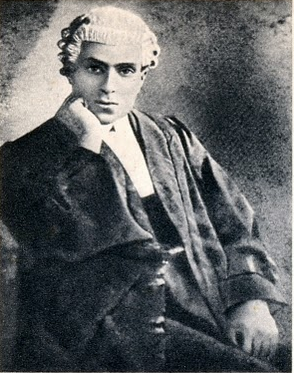
How would I have felt as a judge? I have wondered. How does a judge feel or think? This second question used to occupy my mind to some extent even when I was in practice conducting or watching criminal cases, lost in wonder at the speed and apparent unconcern with which the judge sent men to the scaffold or long terms of imprisonment. That question, in a more personal form, has always faced me when I have stood in the prisoner’s dock and awaited sentence, or attended a friend’s trial for political offences.
Sentence follows, and these sentences are remarkable. As the realization comes that crime is not decreasing, and may even be increasing, the sentences become more savage in the hope that this may frighten the evil-doer. The judge and the power behind the judge have not grasped the fact that crime may be due to special reasons, which might be investigated, and that some of these may be capable of control; and further that in any event a harsh penal code does not improve the social morals of a group, or a harsh sentence those of an individual who has lapsed from grace. The only remedy they know, both for political and non-political offences, is punishment and an attempt to terrorise the offender by what are called deterrent sentences. The usual political sentence now for a speech or a song or a poem which offends the Government is two years rigorous imprisonment (in the Frontier Province it is three years) and a lavish use of this is being made from day to day; but even this seems trivial when compared with the cases of large numbers of those people who are kept confined for four or five years or more, indefinitely, without conviction or sentence.
Political cases, however, depend greatly on the moods of Government and a changing situation, and do not help us in considering the ordinary administration of the criminal law. To some extent the two overlap and affect each other, for instance, many agrarian and labour cases in courts are often definitely political in origin. It is also well known that many people, who are considered politically undesirable by the police, are proceeded against under the bad livelihood or similar sections of the code and clapped in prison as bad characters with no special offence being brought up against them. Ignoring such cases and considering what might be called the unadulterated crimes, two facts stand out: both the numbers of convictions and the length of sentences are growing. Every year the various provincial prison reports complain of the increasing number of prisoners and the necessity of additional accommodation. The peak years, when the civil disobedience movement sent its scores of thousands to prison, become the normal years even without this special influx of political. Occasionally the difficult is overcome by discharging a few thousand short timers before their time, but the strain continues.
The usual political sentence now for a speech or a song or a poem which offends the Government is two years rigorous imprisonment (in the Frontier Province it is three years) and a lavish use of this is being made from day to day; but even this seems trivial when compared with the cases of large numbers of those people who are kept confined for four or five years or more, indefinitely, without conviction or sentence.
The Central Prisons are full of ‘lifers’, prisoners sentenced for life, and others sentenced to long terms. Most of these ‘lifers’ come in huge bunches in dacoity cases and probably a fair proportion are guilty, though I am inclined to think that many innocent people are involved also, as the evidence is entirely one of identification. It is obvious that the growing number of dacoities are due to the increasing unemployment and poverty of the masses as well as the lower middle classes. Most of the other criminal offences involving property are also due to this terrible prospect of want and starvation that faces the vast majority of our people.
Do our judges ever realise this or give thought to the despair that the sight of a starving wife or children might produce even in a normal human being? Is a man to sit helplessly by and see his dear ones sicken and die for want of the simplest human necessities? He slips and offends against the law, and the law and the judge then see to it that he can never again become a normal person with a socially beneficial job of work. They help to produce the criminal type, so-called, and then are surprised to find that such types exist and multiply.
The major offences lead to a life sentence of ten years or so. But the petty offences and the way they are treated by judges are even more instructive. The vast majority of these are buried in court files and get no publicity: only rarely do the papers mention such a case. Three such cases, taken almost at random from recent issues of newspapers, are given below:
Rahman was an old offender with 12 previous convictions, the first of which dated back to 1913. The present offence was one of theft of clothes valued at a few rupees. Rahman pleaded guilty and requested the court to send him to a reformatory or some such place from where he could emerge thoroughly reformed. The judge, who was the Judicial Commissioner in Sind, refused this request and sentenced him to seven years, adding: “If this seven-year sentence of hard labour does not reform you, God alone must come to your aid.” (Karachi: May 23, 1935.)
Badri who had four previous convictions, was sentenced to two years’ rigorous imprisonment under Sections 411/75 IPC for having dishonestly received a stolen cheddar (cloth sheet). (Lucknow: July 3, 1935.)
Ghulam Mohammad, an old offender, was sentenced to three years’ rigorous imprisonment for stealing one rupee by picking the pocket of a man. (Sialkot: July 15, 1935.)
These and similar sentences may be perfectly correct from the point of view of the Indian Penal Code but it does seem to me astonishing that any judge should imagine that by inflicting such sentences he is reforming the offender. Evidently the Judicial Commissioner in Sind had himself some doubts about the efficacy of his treatment for he hinted that God might be given a chance on the next occasion.
Badri who had four previous convictions, was sentenced to two years’ rigorous imprisonment under Sections 411/75 IPC for having dishonestly received a stolen cheddar (cloth sheet)… Ghulam Mohammad, an old offender, was sentenced to three years’ rigorous imprisonment for stealing one rupee by picking the pocket of a man… These and similar sentences may be perfectly correct from the point of view of the Indian Penal Code but it does seem to me astonishing that any judge should imagine that by inflicting such sentences he is reforming the offender.
There they sit, these judges, in their courts, and a procession of unfortunates passes before them – some go to the scaffold, some to be whipped, some to imprisonment, to which may be added solitary confinement. They are doing their duty according to their abstract ideas of justice and punishment; they must consider themselves as the protectors of society from anti-social criminal elements. Do their thoughts ever go beyond these set ideas and take human shape considering the miserable offender as a human being with parents, wife, children, friends? They punish the individual but at the same time they punish a group also, for the ripples of suffering spread out and go far. Those who have to die at least die swiftly, the agony is brief. But the agony is long for those who enter prison.
“Behind the door, within the wall
Locked, they sit the numbered ones…”
Two years, three years, seven years stolen from life’s brief span – each year of twelve months, each month of thirty days, each day of twenty-four hours – how terribly long it all seems to the prisoner, how wearily time passes!
All this is very sad and deplorable no doubt, but what is the poor judge to do? Is he to wallow in a sea of sentimentality and give up sentencing offenders against the laws? If he is so soft and sensitive he is not much good as a judge and will have to give place to another. No, no one expects the judge to embrace every offender and invite him to dinner, but a human element in a trial and sentence would certainly improve matters. The judges are too impersonal, distant, and too little aware of the consequences of the sentences they award. If their awareness could be increased, as well as a sense of fellow-feeling with the prisoner, it would be a great gain. This can only come when the two belong to more or less the same class. A financier who has embezzled vast sums of public money will have every sympathy from the judge, not so the poor wretch who has picked up a rupee or stolen a sheet to satisfy an urgent need. For the judge and the average offender to belong to the same class means a fundamental change in social structure, as indeed every great reform does. But even apart from and in anticipation of that, something could certainly be done.
It was Bernard Shaw, I think, who suggested that every judge and magistrate, as well as every prison official, should spend a period in prison, living like ordinary prisoners. Only then would they be justified in sentencing people to imprisonment, or to governing them there. The suggestion is an excellent one although it may be difficult to give effect to it. I ventured to suggest it once to the Home Member and the Inspector-General of Prisons of the U.P. Government for their personal adoption, but they did not seem to favour it. At least one well-known prison official, however, has adopted it. This was Thomas Mott Osborne of the famous Sing Sing prison in New York. He trained himself by undergoing a term of voluntary imprisonment and, as a result of this, he introduced later on many remarkable improvements in the social rehabilitation and education of the prisoners.
It was Bernard Shaw, I think, who suggested that every judge and magistrate, as well as every prison official, should spend a period in prison, living like ordinary prisoners. Only then would they be justified in sentencing people to imprisonment, or to governing them there. The suggestion is an excellent one although it may be difficult to give effect to it. I ventured to suggest it once to the Home Member and the Inspector-General of Prisons of the U.P. Government for their personal adoption, but they did not seem to favour it.
Such a term of voluntary imprisonment will do a world of good to the bodies and souls of our judges, magistrates and prison officials. It will also give them a greater insight into prison life. But obviously no such voluntary effort can ever approach the real thing. The sting of imprisonment will be absent as well as the peculiarly helpless and broken feeling before the armed and walled power of the State, which a prisoner experiences. Nor will the voluntary prisoner ever have to face bad treatment from the staff. The essence of prison is a psychological background of having been cast off from society like a diseased limb. That will necessarily be absent. But with all these drawbacks the experience will be worthwhile and will help in making the administration of the criminal law more human and beneficial. The great invasions of our prisons by middle-class people during the non-co-operation and civil disobedience movements had indirectly a marked effect. As the prison-goers did not become judges or prison officials the direct effect was little. But a knowledge of prison conditions and a sympathy for the prisoner’s lot became wide-spread, and public opinion and the crusading efforts of some Congressmen bore substantial results.
I do not know whether I am over soft but I do not think I err on the musky and sentimental side. Other people and even many of my close colleagues have considered me rather hard. Mr. C. R. Dass once referred to me at a meeting of the All-India Congress Committee as being “cold-blooded”. Perhaps it all depends on the standard of comparison as well as on the fact that some display their emotions more than others. However that may be, I do hate the idea of punishment and especially “deterrent” punishment and all the suffering, deliberately caused, that it involves. Perhaps it cannot be done away with completely in this present-day world of ours, but it can certainly be minimized, toned down and almost humanized.
The great invasions of our prisons by middle-class people during the non-co-operation and civil disobedience movements had indirectly a marked effect… a knowledge of prison conditions and a sympathy for the prisoner’s lot became wide-spread, and public opinion and the crusading efforts of some Congressmen bore substantial results.
At one time I was strongly opposed to the death penalty and, in theory, my opposition still continues. But I have come to realize that there are many things far worse than death, and if the choice had to be made, and I was given it, I would probably accept a death sentence rather than one of imprisonment for life. But I would not like to be hung; I would prefer being shot or guillotined or even electrocuted; most of all other methods I would like to be given, as Socrates was of old, the cup of poison which would send me to sleep from which there was no awaking. This last method seems to me to be by far the most civilized and humane. But in India we favour hangings, and last year the official mind showed us the texture of which it was made by organizing public hangings in Karachi or somewhere else in Sind. This was meant to terrify would-be evil-doers. It turned out to be a huge mela where thousands gathered to witness the ghastly spectacle. I suppose the mentality behind such public exhibitions bears a family resemblance to that which prompted the autos-da-fé of the Spanish Inquisition.
A friend of mine who became a High Court Judge had a ‘crisis of conscience’ when he had first to sentence a man to death. The idea seemed hateful to him. He overcame his repugnance, however, (he had to or else he would not have long continued in his job) and I suppose he soon got used to sending people to the scaffold without turning a hair. He was an exception and I doubt if many others in his position have ever had such scruples. It is probably easier to sentence a man to death than to see the sentence carried out. And yet even sensitive people get used to this painful sight. A young English member of the Indian Civil Service had to attend hangings in the local gaol. At his first hanging, he told me, he was thoroughly sick and felt bad all day. But very soon the sight had no unusual effect on him whatever and he used to go straight from the execution to his breakfast table and have a hearty meal.
I have never seen a death sentence being carried out. In most of the gaols where I have lived as a prisoner executions did not take place, but on three or four occasions there were hangings in my gaol. These took place in a special enclosure, cut off from the rest of the prison, but the whole gaol population knew of it, perhaps because the unlocking of the various barracks and cells took place at a later hour on those mornings. I experienced a peculiar feeling on those days, an ominous stillness and a tendency for people to talk in low voices. It is possible that all this was the product of my own imagination.
And yet with all my repugnance for executions, I feel that some method of eliminating utterly undesirable human beings will have to be adopted and used with discretion. The real objection to the infliction of capital punishment as well as other punishments is of course not so much the resultant suffering of the person punished, as the brutalization of the community that authorizes such punishment, and more particularly of the individuals who carry it out. This is especially noticeable in the case of whipping, which is widely prevalent in India. The official defence for the punishment of whipping is that it is meant for horrible crimes, like rape with violence. In practice it has a much wider range and in 1932 (as was stated in the British House of Commons) five hundred civil disobedience prisoners were whipped. This was the official figure, unofficial jail beatings not being included. These political prisoners were whipped either for purely political offences or for breaches of gaol discipline. No violence or crime was involved. It has now been laid down officially that in serious cases of hunger-strikes in gaol whipping may be resorted to. We thus have it that in the opinion of the British Government in India a hunger-strike or breaches of gaol discipline stand on the same level as rape with violence.
The official defence for the punishment of whipping is that it is meant for horrible crimes, like rape with violence. In practice it has a much wider range and in 1932… five hundred civil disobedience prisoners were whipped. This was the official figure, unofficial jail beatings not being included. These political prisoners were whipped either for purely political offences or for breaches of gaol discipline. No violence or crime was involved. It has now been laid down officially that in serious cases of hunger-strikes in gaol whipping may be resorted to.
Whipping is usually administered in prisons by some low caste prisoner. No prisoner likes the job but he has little choice in the matter. The higher caste prisoners would in any event refuse to whip, and even the warders are reluctant to do so. A case came to my notice once when a warder was asked to whip. He refused absolutely and was punished for this contumacy. It is interesting to compare the sensitiveness to whipping of the prisoners and warders with that of our judges and prison officials who order it and our Government which authorizes and defends it.
I was reading the other day about the film censorship in Britain. It was stated that one of the grounds for censorship was the avoidance of cruelty scenes. In animal films no kill was to be shown. Films “showing pain or suffering on the part of an animal, whether such pain is caused by accident or intention” are not allowed as these are supposed to have a bad effect on spectators, especially children, and “undermine moral character.”
We also in India have our film censorships and an active Society for the Prevention of Cruelty to Animals. Unfortunately human beings are not included in the category of animals and so they cannot benefit by the activities of the Society. And our film censorship justifies itself by banning films dealing with “Quetta Earthquake Topical” or “National Congress Scenes” or “Departure of Mahatma Gandhi for the Round Table Conference” and similar dangerous topics.
Sentences of death and whipping impress us and pain us, but, after all, they affect only a very small number of the scores of thousands who are sentenced by our courts. The vast majority of these go to prison, mostly for long periods over which their punishment is spread out. It is a continuing torture, a never-ceasing pain, till mind itself grows dull and the body is blunted to sensation. The criminal type develops, the ugly fruit of our gaols and our criminal law, and there is no fitting him in then with the social machine outside. He is the square peg everywhere, with no roots, no home, suspicious of everybody, being suspected everywhere, till at last he comes back to his only true resting-place, the prison, and takes up again the tin or iron bowl which is his faithful companion there. Do our judges ever trouble to think of cause and effect, of the inevitable consequences of an act or decision? Do they realize that their courts and the prisons are the principal factories for the production and stamping of the criminal type?
Do our judges ever trouble to think of cause and effect, of the inevitable consequences of an act or decision? Do they realize that their courts and the prisons are the principal factories for the production and stamping of the criminal type?
In prison one comes to realize more than anywhere else the basic nature of the State; it is the force, the compulsion, the violence of the governing group. “Government”, George Washington is reported to have said, “is not reason, it is not eloquence – it is force! Like fire, it is a dangerous servant and a fearful master.” It is true that civilization has been built up on co-operation and forbearance and mutual collaboration in a thousand ways. But when a crisis comes and the State is afraid of some danger then the superstructure goes or, at any rate, is subordinated to the primary function of the State – self-protection by force and violence. The army, the police, the prison come into greater prominence then, and of the three the prison is perhaps the nakedest form of a State in miniature.
Must the State always be based on force and violence, or will the day come when this element of compulsion is reduced to a minimum and almost fades away? That day, if it ever comes, is still far off. Meanwhile, the violence of the governing group produces the violence of other groups that seek to oust it. It is a vicious circle, violence breeding violence, and on ethical grounds there is little to choose between the two violences. It always seems curious to me how the governing group in a State, basing itself on an extremity of violence, objects on moral or ethical grounds to the force or violence of others. On practical grounds of self-protection they have reason to object but why drag in morality and ethics? State violence is preferable to private violence in many ways, for one major violence is far better than numerous petty private violences. State violence is also likely to be a more or less ordered violence and thus preferable to the disorderly violence of private groups and individuals, for even in violence order is better than disorder, except that this makes the State more efficient in its violence and powers of compulsion. But when a State goes off the rails completely and begins to indulge in disorderly violence, then indeed it is a terrible thing, and no private or individual effort can compete with it in horror and brutality.
It is true that civilization has been built up on co-operation and forbearance and mutual collaboration in a thousand ways. But when a crisis comes and the State is afraid of some danger then the superstructure goes or, at any rate, is subordinated to the primary function of the State – self-protection by force and violence. The army, the police, the prison come into greater prominence then, and of the three the prison is perhaps the nakedest form of a State in miniature.
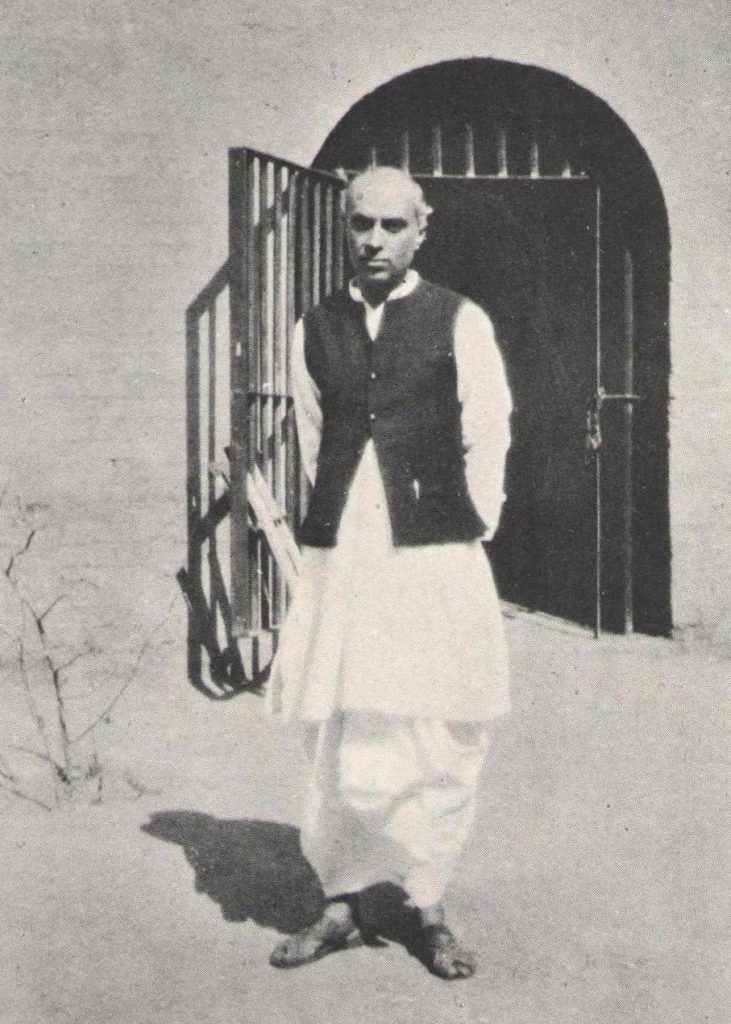
“You must live in a chaos if you would give birth to a dancing star,” says Nietzsche. Must it be so? Is there no other way? The old difficulty of the humanist is ever cropping up, his disgust at force and violence and cruelty, and yet his inability to overcome these by merely standing by and looking on. That is the recurring theme of Ernst Toller’s plays:
“The sword, as ever, is a shift of fools
To hide their folly.”
“By force, the smoky torch of violence.
We shall not find the way.”
Yet force and violence reign triumphant today everywhere. Only in our country has a noble effort been made to combat them by means other than those of force. The inspiration of that effort, and of the leader who lifted us out of our petty selves by his matchless purity of outlook, still remains, though the ultimate outcome be shrouded in darkness.
Yet force and violence reign triumphant today everywhere. Only in our country has a noble effort been made to combat them by means other than those of force. The inspiration of that effort, and of the leader who lifted us out of our petty selves by his matchless purity of outlook, still remains, though the ultimate outcome be shrouded in darkness.
But these are big questions beyond the power even of judges. We may not perhaps be able to find an answer to them in our time, or, finding an answer, be unable to impress it on wayward humanity. Meanwhile, the smaller questions and problems pursue us and we cannot ignore them. We come back to the job of the judge and the prison governor and we can say this, at least, with certainty: that the deliberate infliction of punishment or torture of the mind or body is not the way to reform anyone, that (though this may break or twist the victim) it will not mend him, that it is much more likely to brutalize and deform him who inflicts it. For the inevitable effect of cruelty and torture is to degrade both the sufferer and the person who causes the suffering.
Almora District Jail 1-9-1935.
ABOUT ‘THE MODERN REVIEW’:
The Modern Review was founded in 1907 by Ramananda Chatterjee, who also founded and edited the Bengali magazine, Prabasi and the Hindi magazine, Vishal Bharat. All three periodicals can be best described as journals of opinion.
The Modern Review published essays by practically every well-known leader of the Indian nationalist movement, along with the views of foreign sympathisers. It also carried rousing editorials from Ramananda Babu himself. After his demise in 1943, his son Kedarnath carried on the good work until he passed away in 1965. The magazine also published fiction, book and art reviews, travelogues, etc., including essays by pioneers like the anthropologist Verrier Elwin and historian, Jadunath Sarkar.
Ramananda Babu allowed his contributors to present every shade of opinion and argue their cases, while ensuring the magazine itself maintained an impartial editorial stance. He was happy to publish long multi-issue arguments between luminaries like Tagore-Gandhi and Subhas Bose-Sardar Patel about the shape and direction of the nationalist movement. Contemporary opinions about topics such as education, women’s rights, the relations between religions and castes, electoral politics, India’s place in the world, and international relations can be accessed and contextualised by leafing through the archives of this journal of record.
—Devangshu Datta
To read a select anthology of articles, interviews, poetry and fiction published from 1907-1947 in the Modern Review, you can buy‘Patriots, Poets and Prisoners’ here.
ARCHIVE
This is our first in a series of articles from The Modern Review (1907-1965). In November 1937, The Modern Review published an essay which critiqued Jawaharlal Nehru, warning against his continuing as president of the Indian National Congress for a third time. The writer of the essay adopted a pseudonym: Chanakya. Everyone wondered who Chanakya was.
In 1937, Jawaharlal Nehru was elected president of the Indian National Congress a third time. A scathing essay appeared in ‘The Modern Review’ – one of the most prominent (if not the most prominent) intellectual journals of its time, edited by Ramananda Chatterjee – which cautioned against Nehru’s ever-increasing importance in the party and in national politics, as well as his attitude, potentially paving the path to Caesarism and dictatorship.
The prominence of ‘The Modern Review’ ensured this essay was widely read, in the most influential circles. And everyone was curious about who ‘Chanakya’ was. “It appeared to be a critic of the Congress president, possibly a critic of the Congress party as well,” writes Ramchandra Guha.
It was only later that it was revealed that ‘Chanakya’ was none other than Nehru himself.
Nehru’s flair with stylistic prose is well known and well appreciated. “English made the Empire,” Sunil Khilnani writes in an essay titled ‘Gandhi and Nehru: The Uses of English’. “But (Gandhi and Nehru) showed how it could be used to unmake it – how the language could be a tool of insubordination and, ultimately, freedom.” But this auto-critique goes beyond good prose. It speaks to Nehru’s keen self-awareness, even as he stood at the centre of the whirlwind of political events that 1937 must have surely brought with it. The year also saw the provincial elections in which large numbers of Indians were participating for the first time. But it also speaks to Nehru’s vision of what India needed – then and in the future – as a never-ending quest, one which can never be taken for granted. ‘The Quest’ was also the title he gave to the chapter towards the beginning of ‘The Discovery of India’, where he narrated some of his experiences and learnings from 1937.
—Devangshu Datta
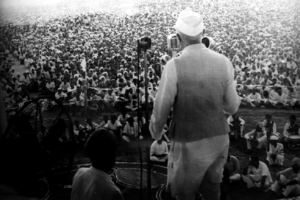
Rashtrapati Jawaharlal ki Jai. The Rashtrapati looked up as he passed swiftly through the waiting crowds, his hands went up and were joined together in salute, and his pale hard face was lit up by a smile. It was a warm personal smile and the people who saw it responded to it immediately and smiled and cheered in return.
The smile passed away and again the face became stern and sad, impassive in the midst of the emotion that it had roused in the multitude. Almost it seemed that the smile and the gesture accompanying it had little reality behind them; they were just tricks of the trade to gain the goodwill of the crowds whose darling he had become. Was it so?
Watch him again. There is a great procession and tens of thousands of persons surround his car and cheer him in an ecstasy of abandonment. He stands on the seat of the car, balancing himself rather well, straight and seemingly tall, like a god, serene and unmoved by the seething multitude. Suddenly there is that smile again, or even a merry laugh, and the tension seems to break and the crowd laughs with him, not knowing what it is laughing at. He is godlike no longer but a human being claiming kinship and comradeship with the thousands who surround him and the crowd feels happy and friendly and takes him to its heart. But the smile is gone and the pale stern face is there again.
Is all this natural or the carefully thought cut trickery of the public man? Perhaps it is both and long habit has become second nature now. The most effective pose is one in which there seems to be least of posing, and Jawaharlal has learnt well to act without the paint and powder of the actor. With his seeming carelessness and insouciance, he performs on the public stage with consummate artistry. Whither is this going to lead him and the country? What is he aiming at with all his apparent want of aim? What lies behind that mask of his, what desires, what will to power, what insatiate longings?
These questions would be interesting in any event, for Jawaharlal is a personality which compels interest and attention. But they have a vital significance for us, for he is bound up with the present in India, and probably the future, and he has the power in him to do great good to India or great injury. We must therefore seek answers to these questions.
“With his seeming carelessness and insouciance, he performs on the public stage with consummate artistry. Whither is this going to lead him and the country? What is he aiming at with all his apparent want of aim? What lies behind that mask of his, what desires, what will to power, what insatiate longings?”
For nearly two years now he has been President of the Congress and some people imagine that he is just a camp-follower in the Working Committee of the Congress, suppressed or kept in check by others. And yet steadily and persistently he goes on increasing his personal prestige and influence both with the masses and with all manner of groups and people. He goes to the peasant and the worker, to the zamindar and the capitalist, to the merchant and the peddler, to the Brahmin and the untouchable, to the Muslim, the Sikh, the Christian and the Jew, to all who make up the great variety of Indian life. To all these he speaks in a slightly different language, ever seeking to win them over to his side. With an energy that is astonishing at his age, he has rushed about across this vast land of India, and everywhere he has received the most extraordinary of popular welcomes. From the far north to Cape Comorin he has gone like some triumphant Caesar passing by, leaving a trail of glory and a legend behind him. Is all this for him just a passing fancy which amuses him, or some deep design, or the play of some force which he himself does not know? Is it his will to power, of which he speaks in his Autobiography, that is driving him from crowd to crowd and making him whisper to himself:
“I drew these tides of men into my hands
and wrote my will across the sky in stars.”
What if the fancy turn? Men like Jawaharlal, with all their capacity for great and good work, are unsafe in democracy. He calls himself a democrat and a socialist, and no doubt he does so in all earnestness, but every psychologist knows that the mind is ultimately a slave to the heart and logic can always be made to fit in with the desires and irrepressible urges of a person. A little twist and Jawaharlal might turn a dictator sweeping aside the paraphernalia of a slow-moving democracy. He might still use the language and slogans of democracy and socialism, but we all know how fascism has fattened on this language and then cast it away as useless lumber.
“He might still use the language and slogans of democracy and socialism, but we all know how fascism has fattened on this language and then cast it away as useless lumber.”
Jawaharlal is certainly not a fascist, not only by conviction but by temperament. He is far too much of an aristocrat for the crudity and vulgarity of fascism. His very face and voice tell us that:
“Private faces in public places
are better and nicer than
public faces in private places.”
The fascist face is a public face and it is not a pleasant face in public or private. Jawaharlal’s face as well as his voice are definitely private. There is no mistaking that even in a crowd, and his voice at public meetings is an intimate voice which seems to speak to individuals separately in a matter-of-fact homely way. One wonders as one hears it or sees that sensitive face what lies behind them, what thoughts and desires, what strange complexes and repressions, what passions suppressed and turned to energy, what longings which he dare not acknowledge even to himself. The train of thought holds him in public speech, but at other times his looks betray him, for his mind wanders away to strange fields and fancies, and he forgets for a moment his companion and holds inaudible converse with the creatures of his brain. Does he think of the human contacts he has missed in his life’s journey, hard and tempestuous as it has been; does he long for them? Or does he dream of the future of his fashioning and of the conflicts and triumphs that he would fain have? He must know well that there is no resting by the way in the path he has chosen, and even triumph itself means greater burdens. As Lawrence said to the Arabs: “There could be no rest-houses for revolt, no dividend of joy paid out.” Joy may not be for him, but something greater than joy may be his, if fate and fortune are kind—the fulfilment of a life purpose.
Jawaharlal cannot become a fascist. And yet he has all the makings of a dictator in him—vast popularity, a strong will directed to a well-defined purpose, energy, pride, organisational capacity, ability, hardness, and, with all his love of the crowd, an intolerance of others and a certain contempt for the weak and the inefficient. His flashes of temper are well known and even when they are controlled, the curling of the lips betrays him. His over-mastering desire to get things done, to sweep away what he dislikes and build anew, will hardly brook for long the slow processes of democracy. He may keep the husk but he will see to it that it bends to his will. In normal times he would be just an efficient and successful executive, but in this revolutionary epoch, Caesarism is always at the door, and is it not possible that Jawaharlal might fancy himself as a Caesar?
“And yet he has all the makings of a dictator in him—vast popularity, a strong will directed to a well-defined purpose, energy, pride, organisational capacity, ability, hardness, and, with all his love of the crowd, an intolerance of others and a certain contempt for the weak and the inefficient… His over-mastering desire to get things done, to sweep away what he dislikes and build anew, will hardly brook for long the slow processes of democracy. He may keep the husk but he will see to it that it bends to his will.”
Therein lies danger for Jawaharlal and for India. For it is not through Caesarism that India will attain freedom, and though she may prosper a little under a benevolent and efficient despotism, she will remain stunted and the day of the emancipation of her people will be delayed.
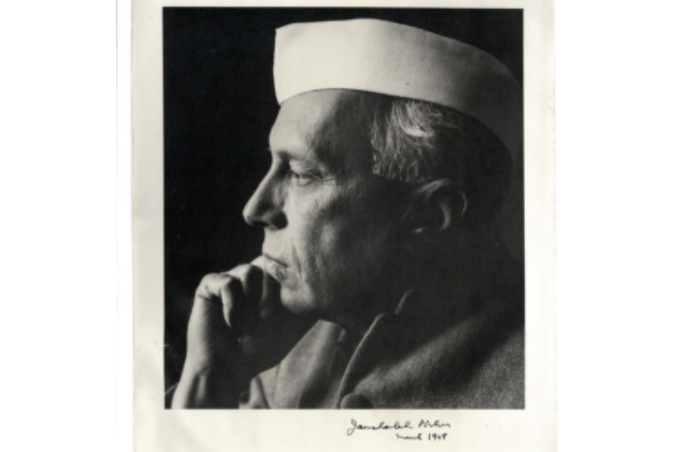
(Image courtesy – Archives New Zealand)
For two consecutive years Jawaharlal has been President of the Congress and in some ways he has made himself so indispensable that there are many who suggest that he should be elected for a third term. But a greater disservice to India and even to Jawaharlal can hardly be done. By electing him a third time we shall exalt one man at the cost of the Congress and make the people think in terms of Caesarism. We shall encourage in Jawaharlal the wrong tendencies and increase his conceit and pride. He will become convinced that only he can bear this burden or tackle India’s problems. Let us remember that, in spite of his apparent indifference to office, he has managed to hold important offices in the Congress for the last seventeen years. He must imagine that he is indispensable, and no man must be allowed to think so. India cannot afford to have him as President of the Congress for a third year in succession.
“it is not through Caesarism that India will attain freedom, and though she may prosper a little under a benevolent and efficient despotism, she will remain stunted and the day of the emancipation of her people will be delayed… By electing him a third time we shall exalt one man at the cost of the Congress and make the people think in terms of Caesarism.”
There is a personal reason also for this. In spite of his brave talk, Jawaharlal is obviously tired and stale and he will progressively deteriorate if he continues as President. He cannot rest, for he who rides a tiger cannot dismount. But we can at least prevent him from going astray and from mental deterioration under too heavy burdens and responsibilities. We have a right to expect good work from him in the future. Let us not spoil that and spoil him by too much adulation and praise. His conceit is already formidable. It must be checked. We want no Caesars.
Nehru himself added the following note to this article later:
5 October 1937. J.N. Papers, N.M.M.L
“This article was written by Jawaharlal Nehru, but it was published anonymously in The Modern Review of Calcutta, November 1937. ‘Rashtrapati’ is a Sanskrit word meaning Head of the State. The title is popularly used for President of the Indian National Congress. Chanakya was a famous Minister of Chandragupta, who built an empire in north India in the fourth century B.C., soon after Alexander’s raid on India. Chanakya is the prototype of Machiavelli.”
ABOUT ‘THE MODERN REVIEW’:
The Modern Review was founded in 1907 by Ramananda Chatterjee, who also founded and edited the Bengali magazine, Prabasi and the Hindi magazine, Vishal Bharat. All three periodicals can be best described as journals of opinion.
The Modern Review published essays by practically every well-known leader of the Indian nationalist movement, along with the views of foreign sympathisers. It also carried rousing editorials from Ramananda Babu himself. After his demise in 1943, his son Kedarnath carried on the good work until he passed away in 1965. The magazine also published fiction, book and art reviews, travelogues, etc., including essays by pioneers like the anthropologist Verrier Elwin and historian, Jadunath Sarkar.
Ramananda Babu allowed his contributors to present every shade of opinion and argue their cases, while ensuring the magazine itself maintained an impartial editorial stance. He was happy to publish long multi-issue arguments between luminaries like Tagore-Gandhi and Subhas Bose-Sardar Patel about the shape and direction of the nationalist movement. Contemporary opinions about topics such as education, women’s rights, the relations between religions and castes, electoral politics, India’s place in the world, and international relations can be accessed and contextualised by leafing through the archives of this journal of record.
—Devangshu Datta
To read a select anthology of articles, interviews, poetry and fiction published from 1907-1947 in the Modern Review, you can buy ‘Patriots, Poets and Prisoners’ here.
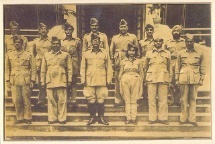
An excerpt from the book My Memories of I.N.A. and Its Netaji by Major General Shahnawaz Khan, where he documents how Bose formed the INA, inspired disillusioned Indian soldiers to revolt, and challenged British rule with Axis support.
Major General Shahnawaz Khan
__
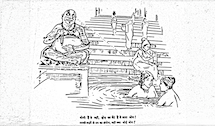
In the colonial period, the threat of the lecherous male gaze was used by the new patriarchy to restrict access to employment and public space for women, maintaining a patriarchal division of labour. Read how this process unfolded in our newest excerpt.
Saurav Kumar Rai
__
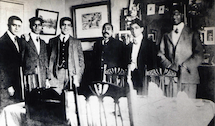
Was Lala Lajpat Rai's Hindu nationalism congruent with the principles of secularism? Explore our latest excerpt from Vanya Vaidehi Bhargav's fresh off-the-press book - Being Hindu, Being Indian: Lala Lajpat Rai's Ideas of Nation for more.
Vanya Vaidehi Bhargav
__
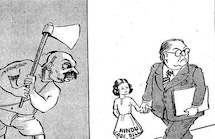
Popularly, we think that political cartoons question the powerful but what if this was not the case? What if political cartoons, replicated structures of the socially dominant? Read how in our new excerpt on political cartoons featuring Dr. Ambedkar.
Unnamati Syama Sundar
__

On Martyrs' day 2024, read the poet Sarojini Naidu's tribute to Gandhi given over All India Radio two days after his assassination.
Sarojini Naidu
__
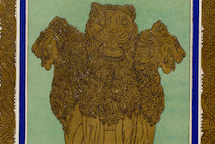
On Republic Day, the Indian History Collective presents you, twenty-two illustrations from the first illustrated manuscript (1954) of our Constitution.
Indian History Collective
__
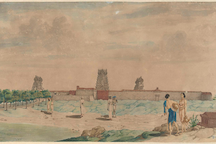
One of the key petitioners in the Ayodhya title dispute was Bhagwan Sri Ram Virajman. This petitioner was no mortal, but God Ram himself. How did Ram find his way from heaven to the Supreme Court of India to plead his case? Read further to find out.
Richard H Davis
__
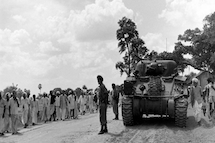
Labelled "one of the shortest, happiest wars ever seen", the integration of the princely state of Hyderabad in 1948 was anything but that. Read about the truth behind the creation of an Indian Union, the fault lines left behind, and what they signify
Afsar Mohammad
__
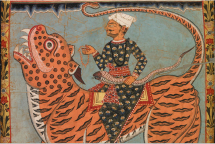
How did Bengal get a large Muslim population? Was it conversion by ruling elites was there something deeper at play? Read Dr. Eaton's classic essay to find out.
Richard Eaton
__
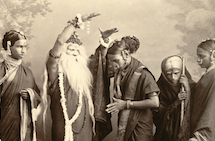
An excerpt from Shailaija Paik's new book 'Vulgarity of Caste' that documents the pivotal role Tamasha (the popular art form) has played in reinforcing and producing caste dynamics in Marathi society.
Shailaja Paik
__
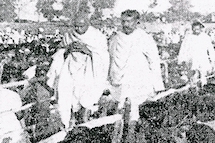
In 1942, two sub-districts in Bengal declared independence and set up a parallel government. The second part of our story brings you archival papers in the form of letters, newspaper reports, and judicial records documenting this remarkable movement.
Indian History Collective
__
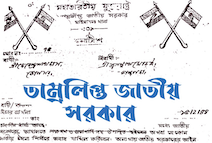
In 1942, five years before India was independent, two sub-divisions in Bengal not only declared their independence— they also instituted a parallel government. The first in a new series.
Indian History Collective
__
TIMELINE
-
2500 BC - Present 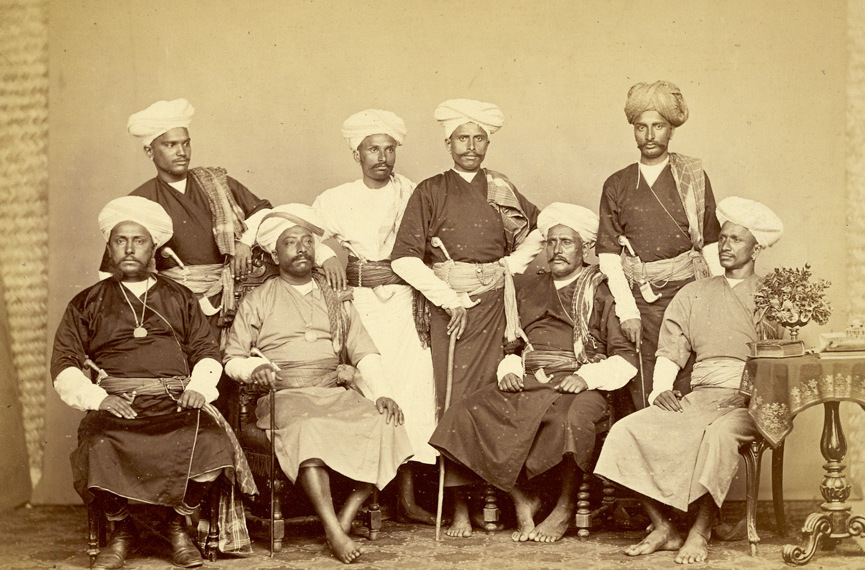
2500 BC - Present Tribal History: Looking for the Origins of the Kodavas -
2200 BC to 600 AD 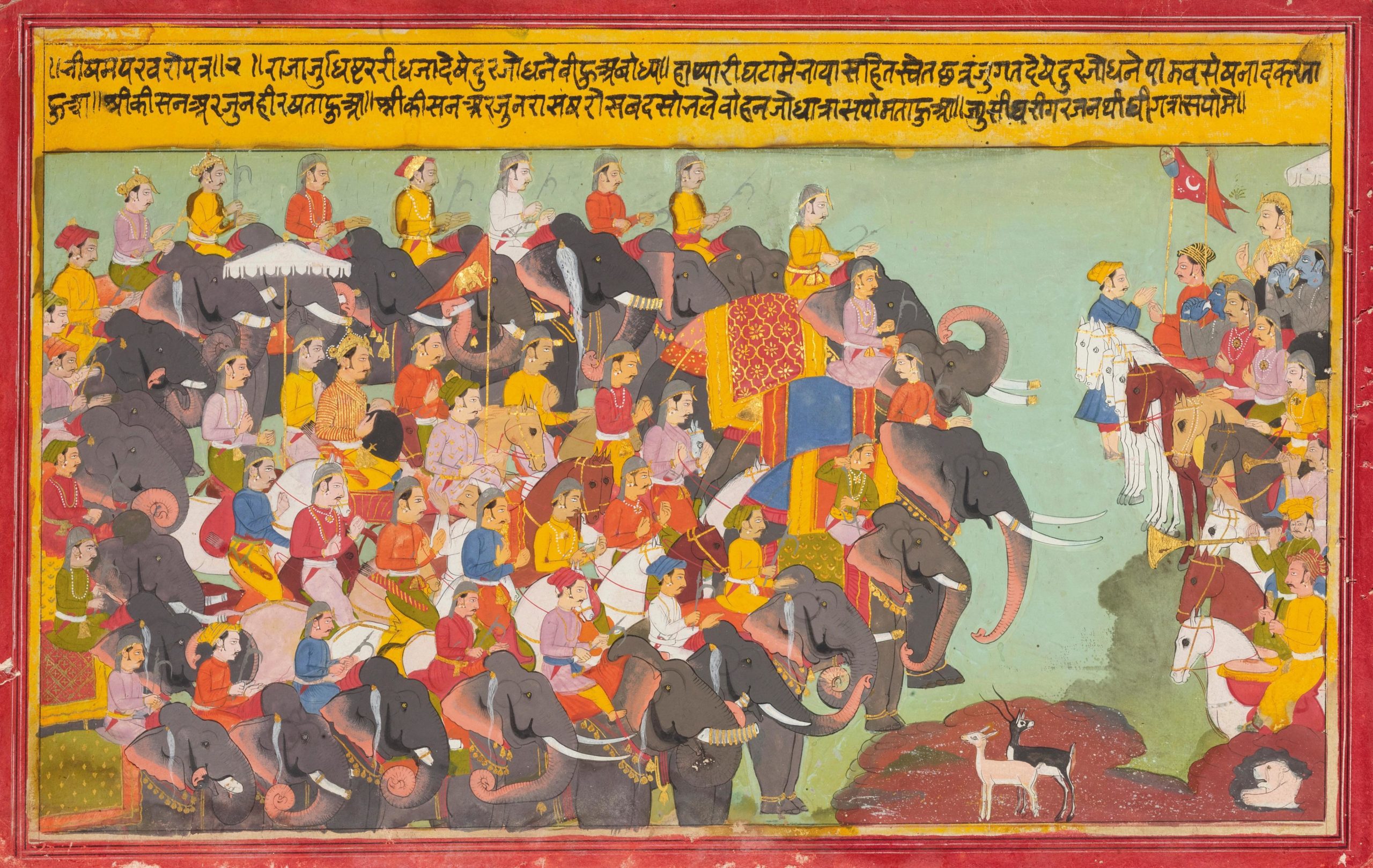
2200 BC to 600 AD War, Political Violence and Rebellion in Ancient India -
400 BC to 1001 AD 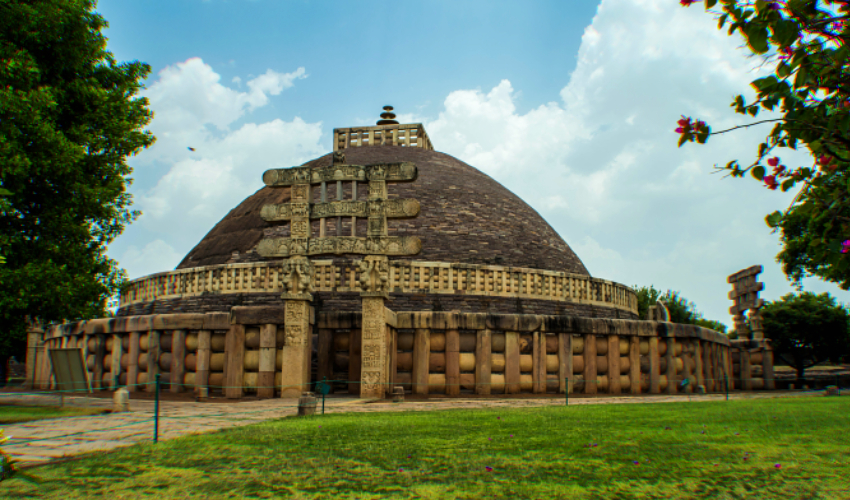
400 BC to 1001 AD The Dissent of the ‘Nastika’ in Early India -
600CE-1200CE 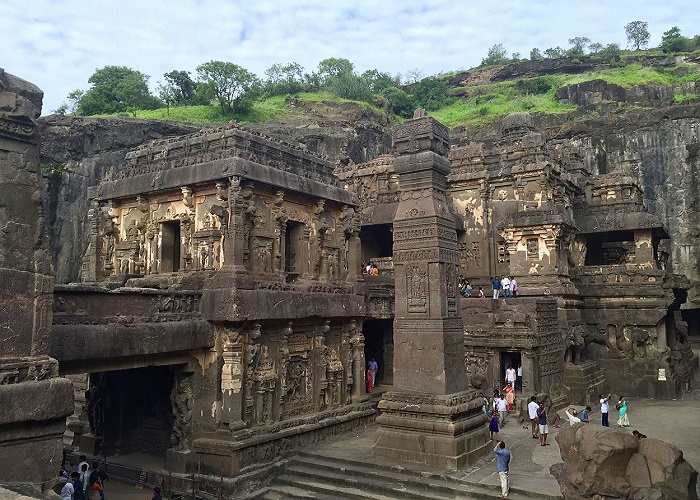
600CE-1200CE The Other Side of the Vindhyas: An Alternative History of Power -
c. 700 - 1400 AD 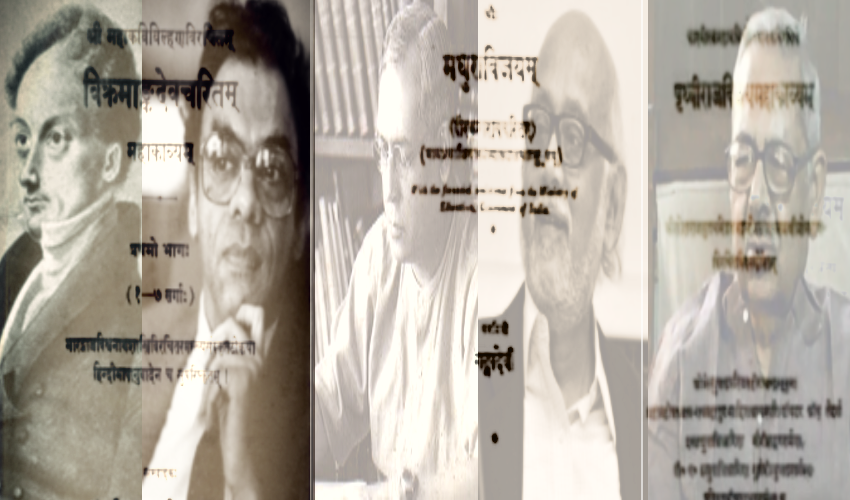
c. 700 - 1400 AD A Historian Recommends: Representing the ‘Other’ in Indian History -
c. 800 - 900 CE 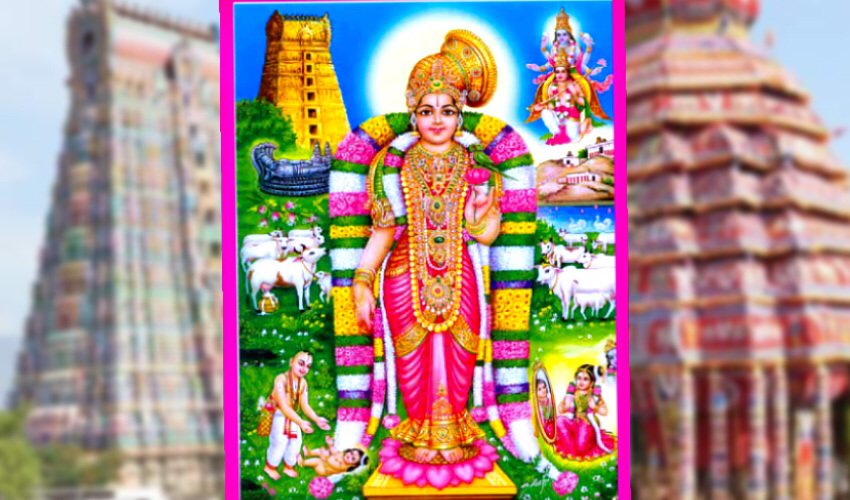
c. 800 - 900 CE ‘Drape me in his scent’: Female Sexuality and Devotion in Andal, the Goddess -
1192 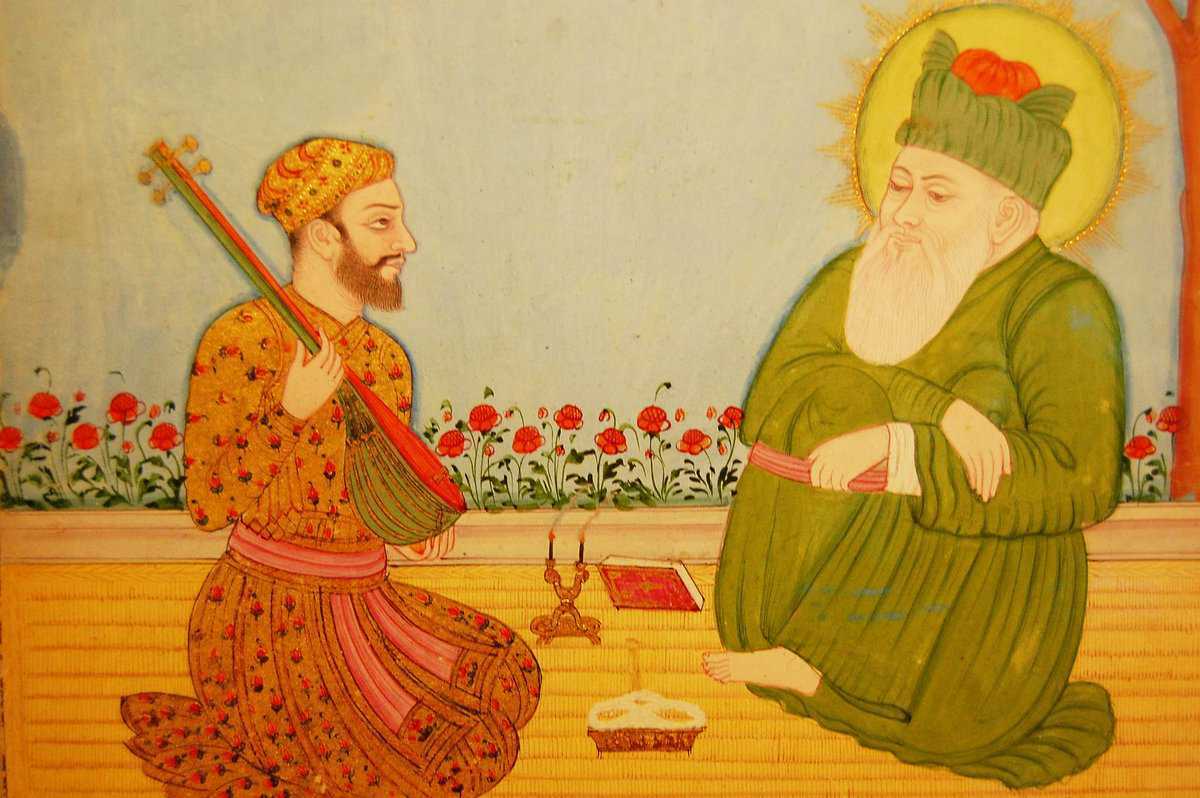
1192 Sufi Silsilahs: The Mystic Orders in India -
1200 - 1850 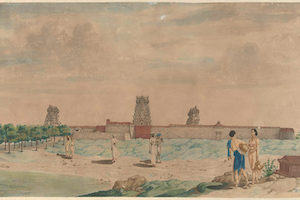
1200 - 1850 Temples, deities, and the law. -
c. 1500 - 1600 AD 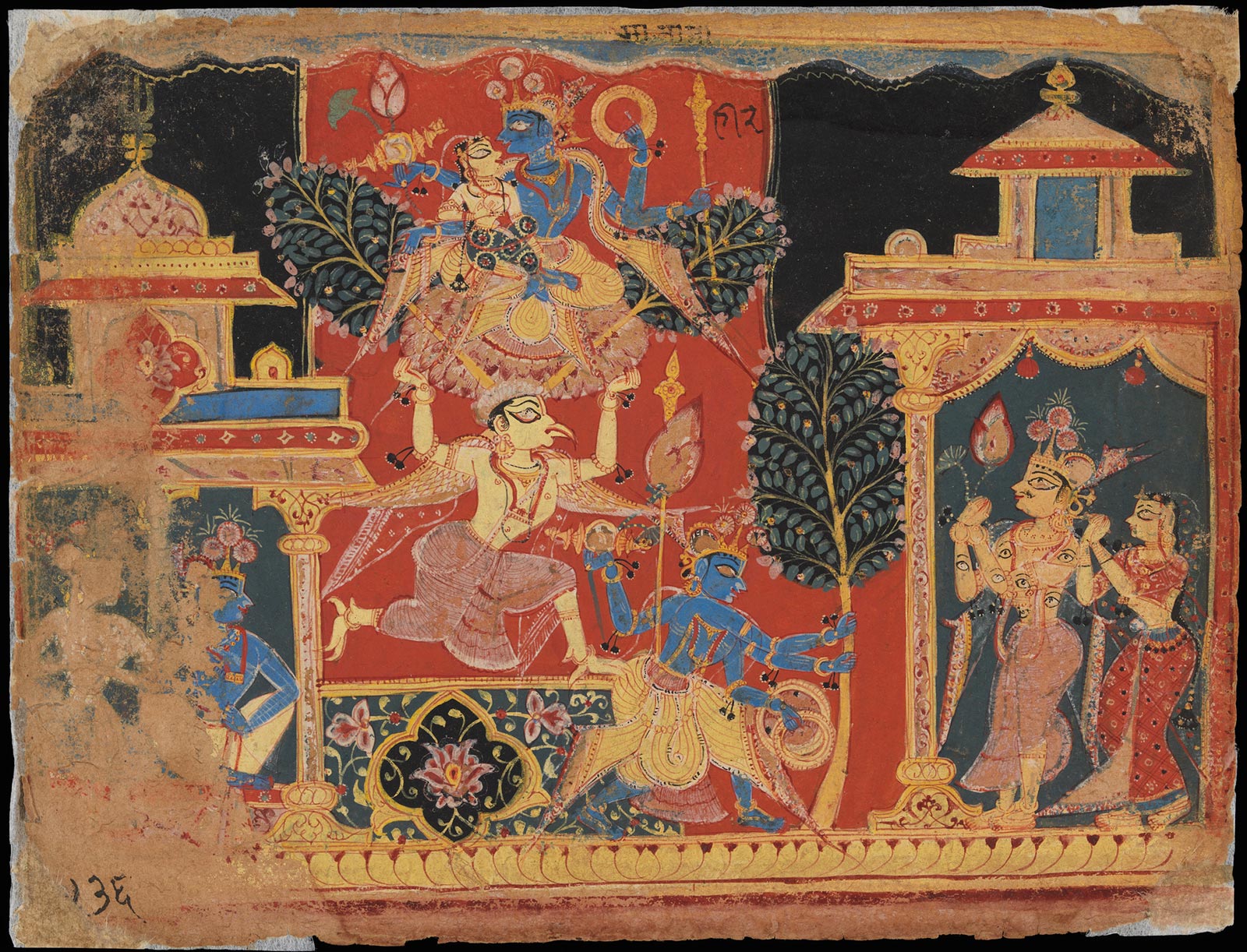
c. 1500 - 1600 AD A Historian Recommends: Religion in Mughal India -
1200-2020 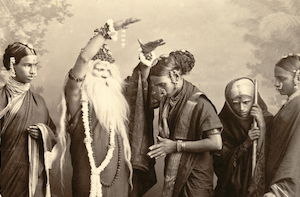
1200-2020 Policing Untouchables and Producing Tamasha in Maharashtra -
1530-1858 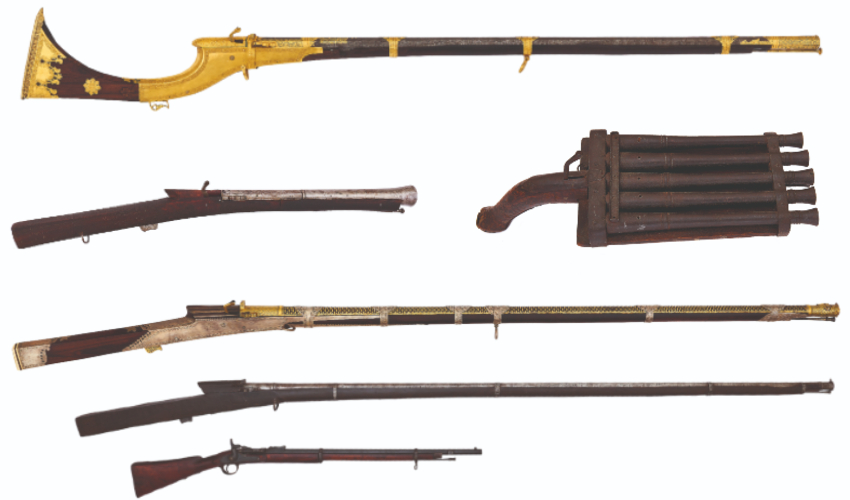
1530-1858 Rajputs, Mughals and the Handguns of Hindustan -
1575 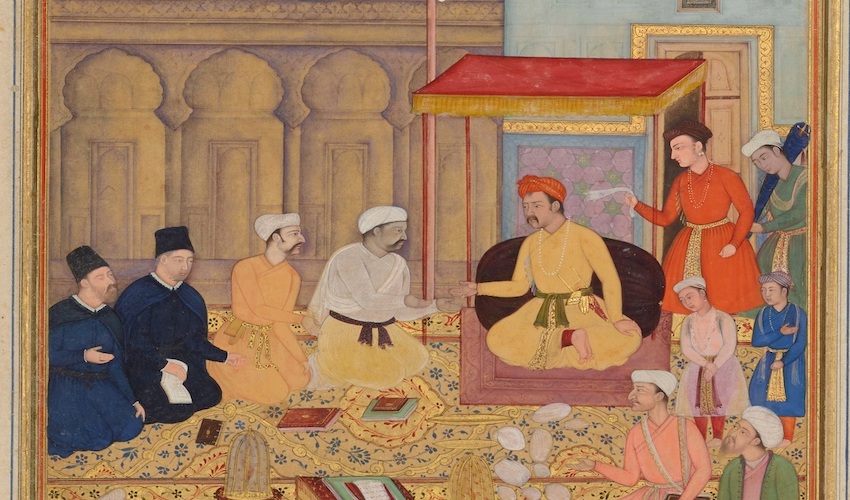
1575 Abdul Qadir Badauni & Abul Fazl: Two Mughal Intellectuals in King Akbar‘s Court -
1579 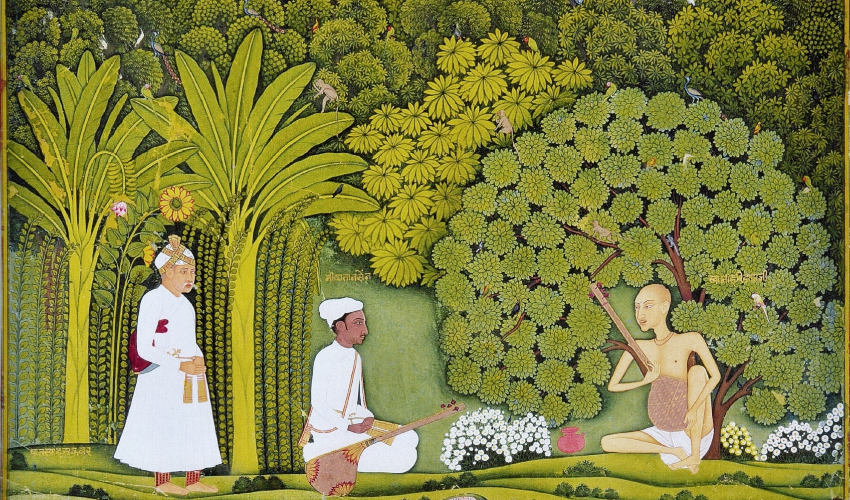
1579 Padshah-i Islam -
1550-1800 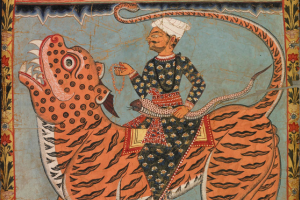
1550-1800 Who are the Bengal Muslims? : Conversion and Islamisation in Bengal -
c. 1600 CE-1900 CE 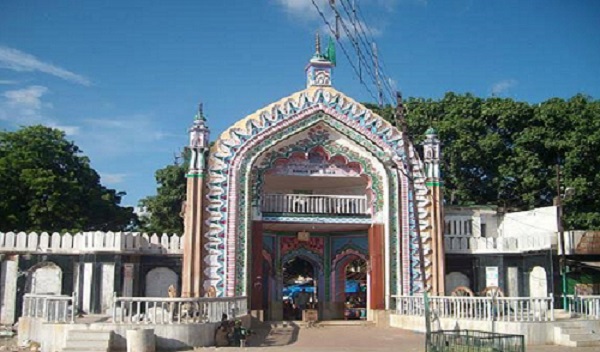
c. 1600 CE-1900 CE The Birth of a Community: UP’s Ghazi Miyan and Narratives of ‘Conquest’ -
1553 - 1900 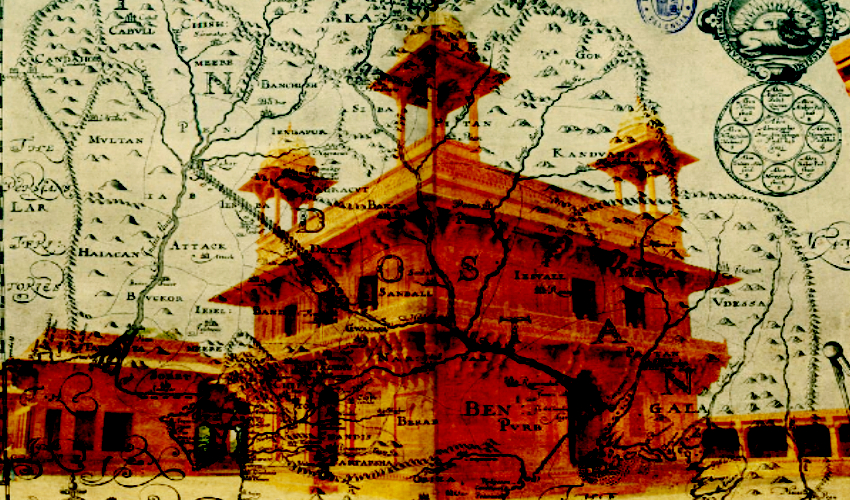
1553 - 1900 What Happened to ‘Hindustan’? -
1630-1680 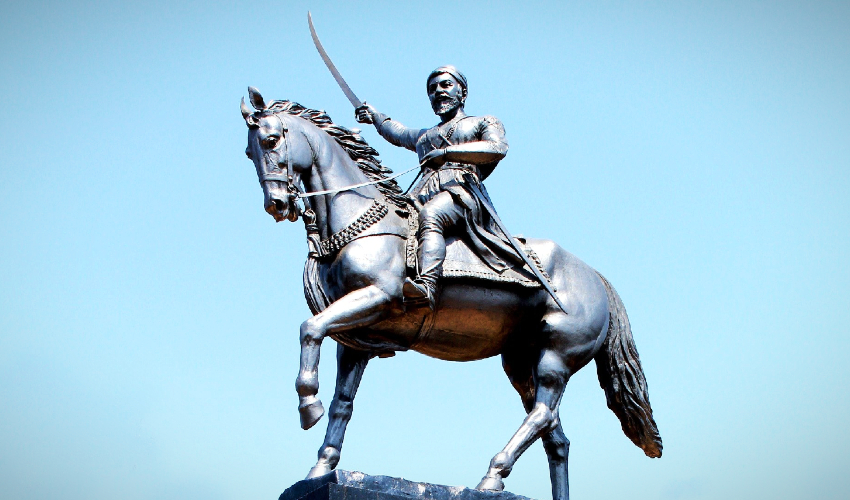
1630-1680 Shivaji: Hindutva Icon or Secular Nationalist? -
1630 -1680 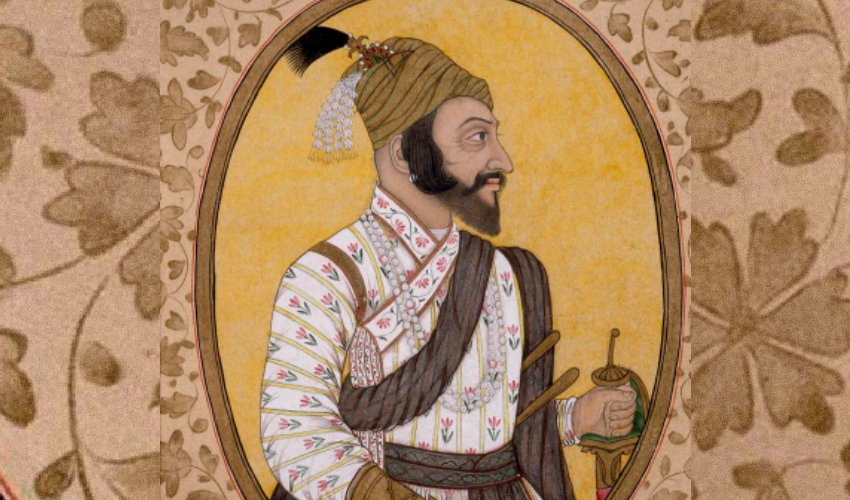
1630 -1680 Shivaji: His Legacy & His Times -
c. 1724 – 1857 A.D. 
c. 1724 – 1857 A.D. Bahu Begum and the Gendered Struggle for Power -
1818 - Present 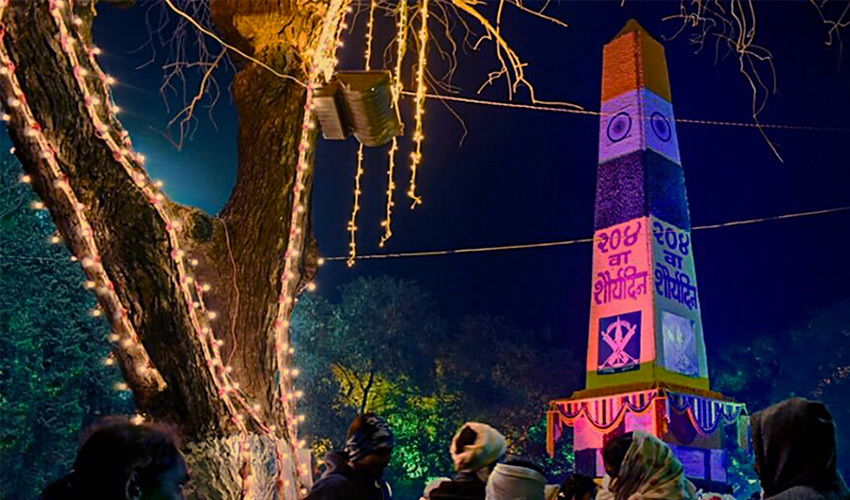
1818 - Present The Contesting Memories of Bhima-Koregaon -
1831 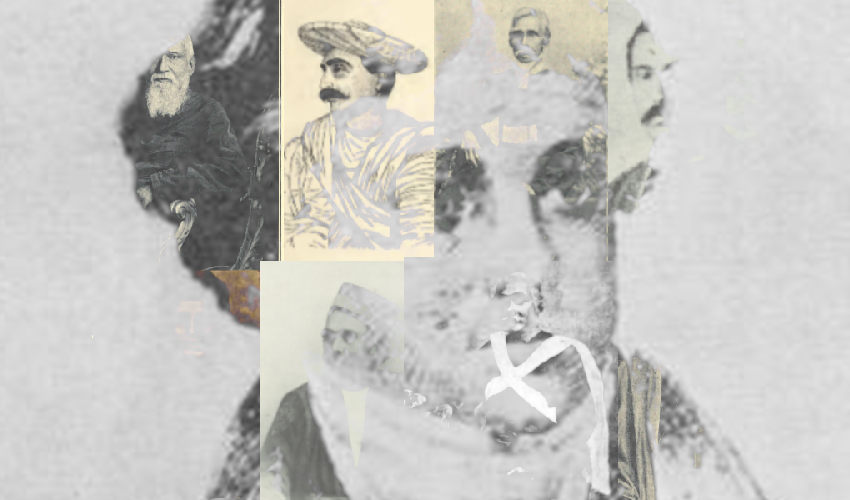
1831 The Derozians’ India -
1855 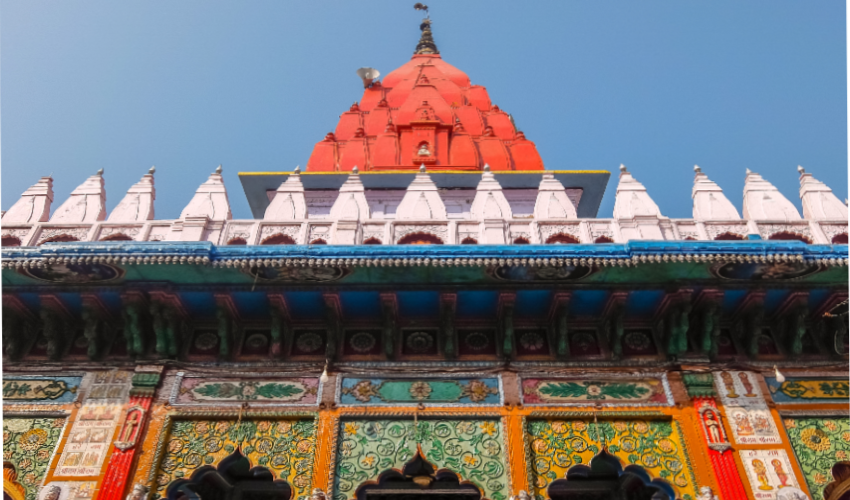
1855 Ayodhya 1855 -
1856 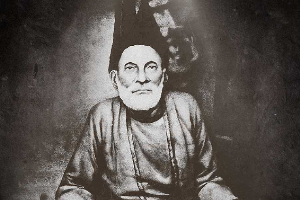
1856 “Worshipping the dead is not an auspicious thing” — Ghalib -
1857 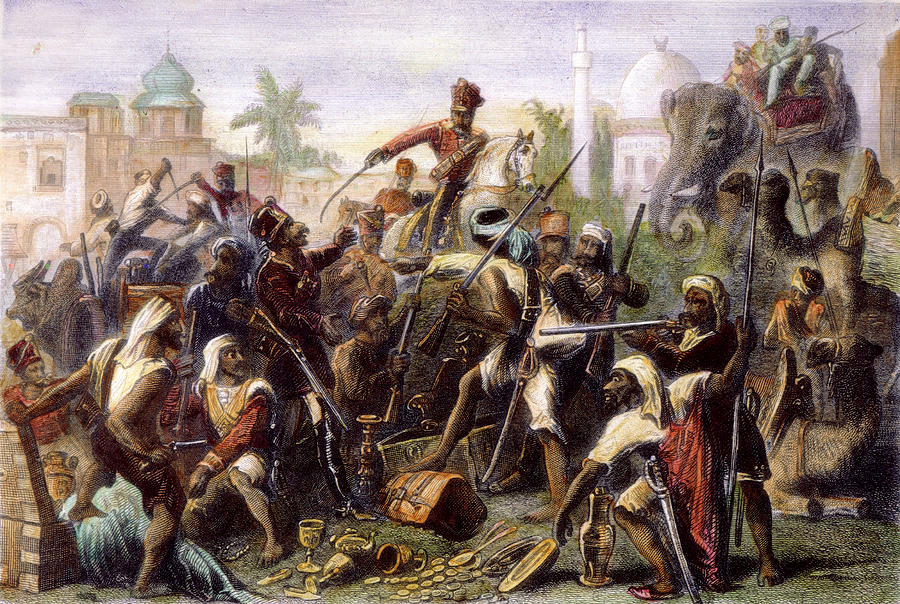
1857 A Subaltern speaks: Dalit women’s counter-history of 1857 -
1858 - 1976 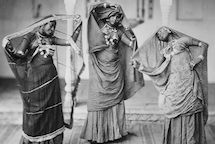
1858 - 1976 Lifestyle as Resistance: The Curious Case of the Courtesans of Lucknow -
1883 - 1894 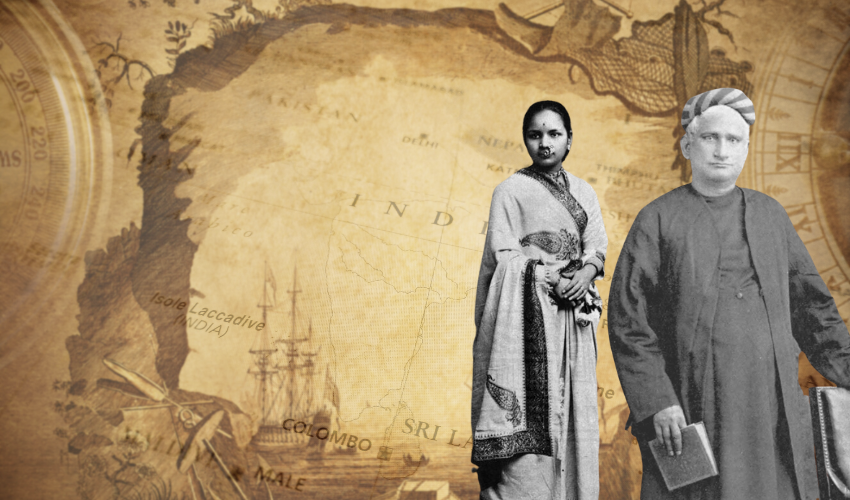
1883 - 1894 The Sea Voyage Question: A Nineteenth century Debate -
1887 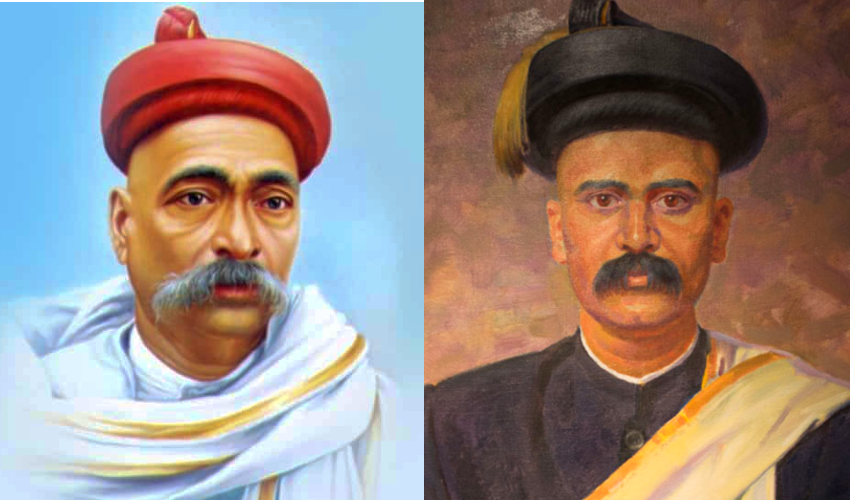
1887 The Great Debaters: Tilak Vs. Agarkar -
1893-1946 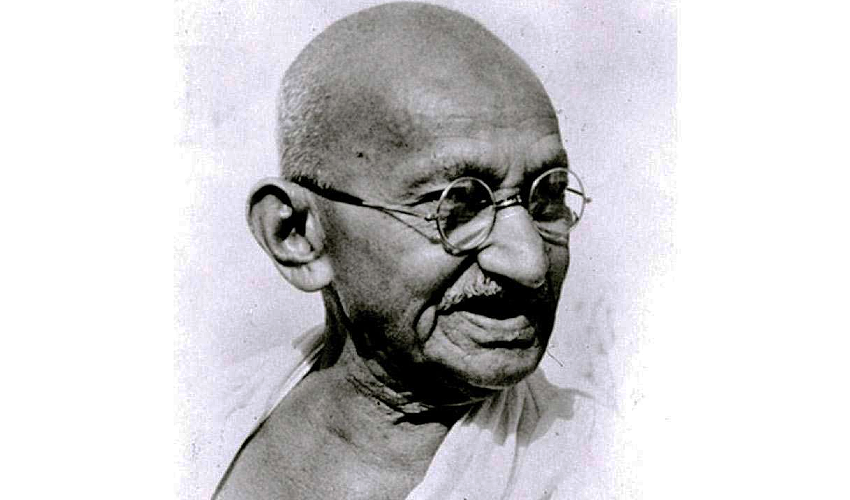
1893-1946 A Historian Recommends: Gandhi Vs. Caste -
1897 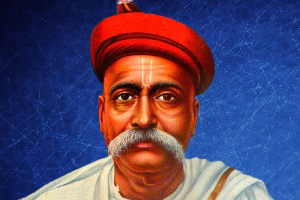
1897 Queen Empress vs. Bal Gangadhar Tilak: An Autopsy -
1913 - 1916 Modern Review 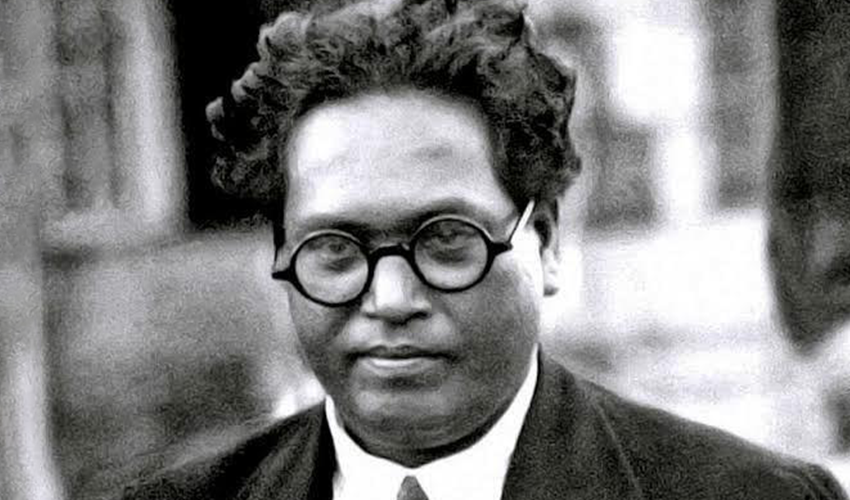
1913 - 1916 A Young Ambedkar in New York -
1916 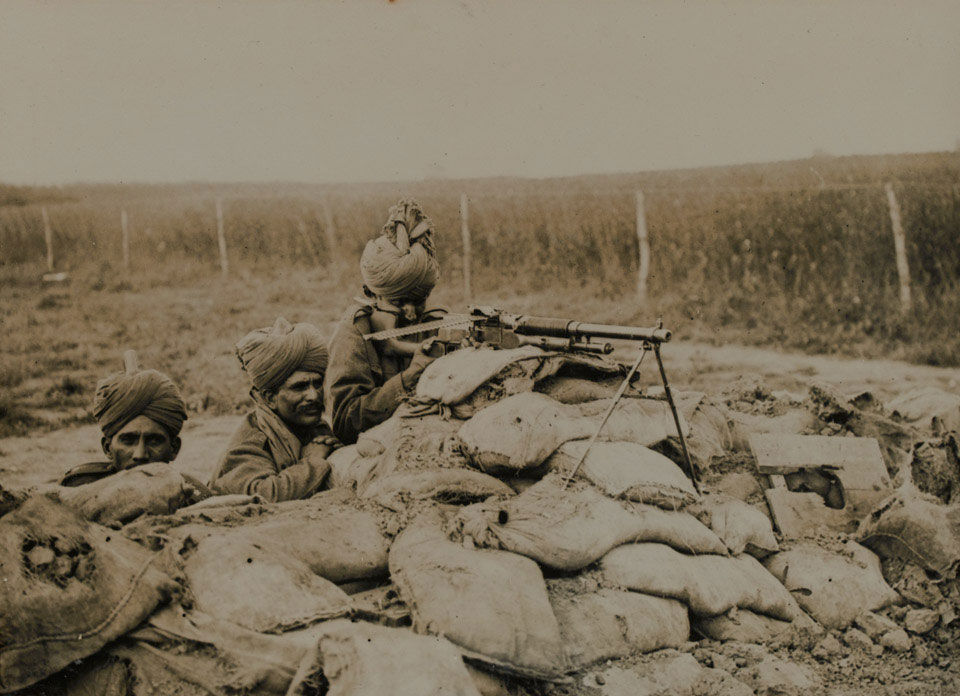
1916 A Rare Account of World War I by an Indian Soldier -
1917 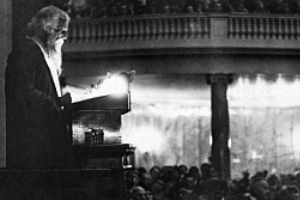
1917 On Nationalism, by Tagore -
1918 - 1919 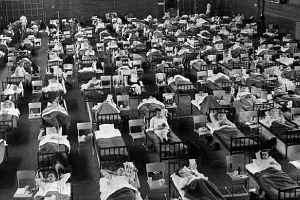
1918 - 1919 What Happened to the Virus That Caused the World’s Deadliest Pandemic? -
1920 - 1947 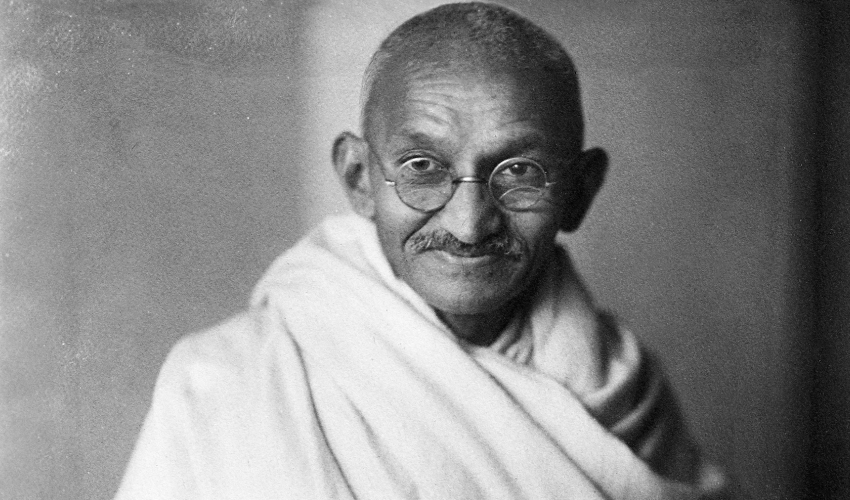
1920 - 1947 How One Should Celebrate Diwali, According to Gandhi -
1921 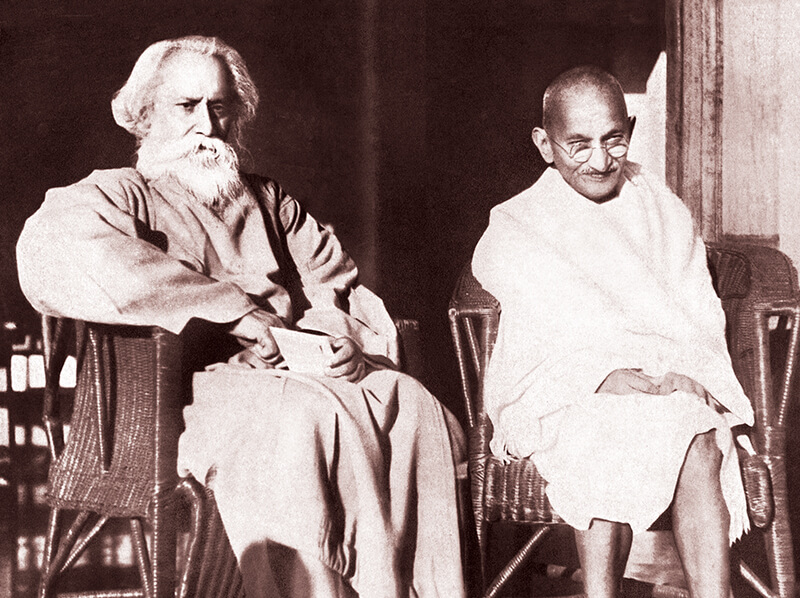
1921 Great Debates: Tagore Vs. Gandhi (1921) -
1921 - 2015 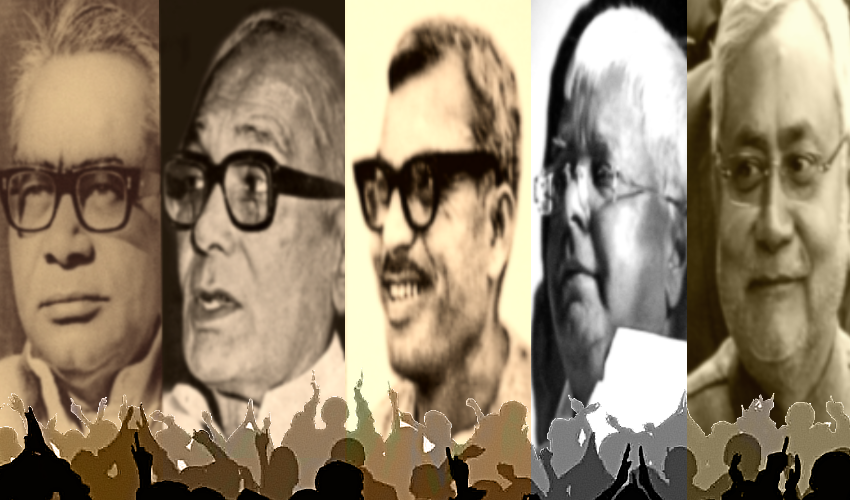
1921 - 2015 A History of Caste Politics and Elections in Bihar -
1915-1921 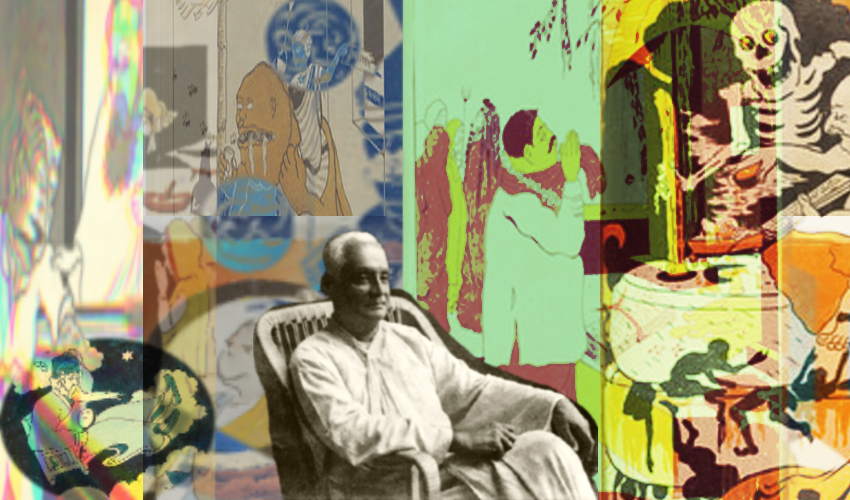
1915-1921 The Satirical Genius of Gaganendranath Tagore -
1924-1937 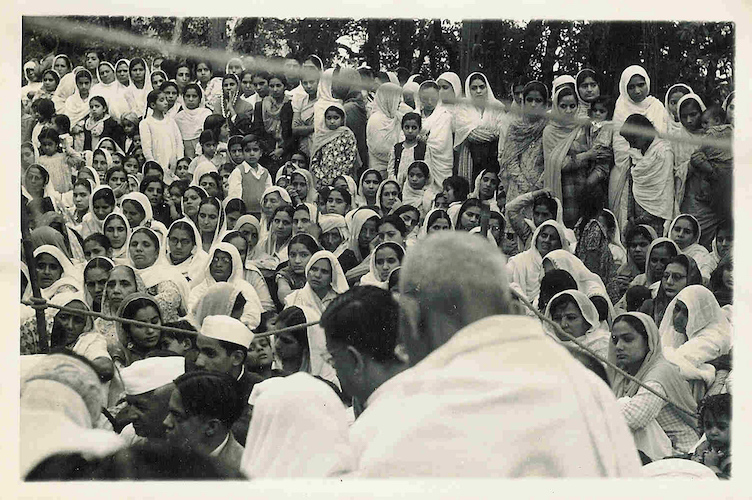
1924-1937 What were Gandhi’s Views on Religious Conversion? -
1900-1950 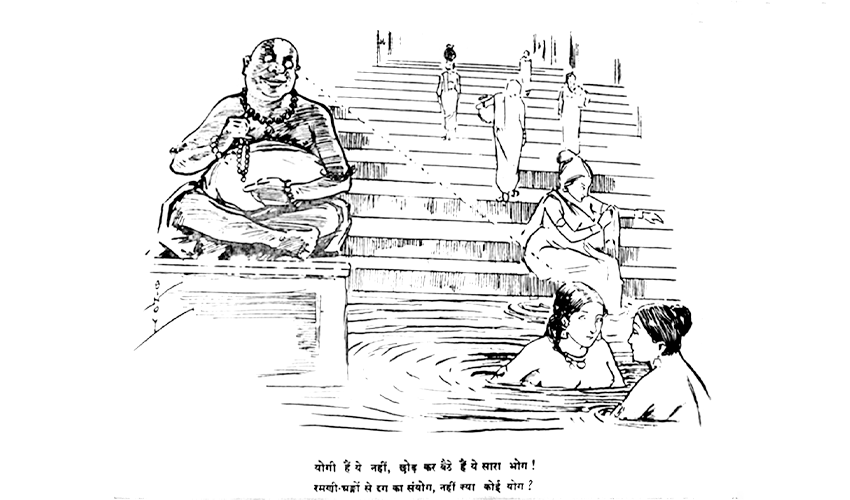
1900-1950 Gazing at the Woman’s Body: Historicising Lust and Lechery in a Patriarchal Society -
1925, 1926 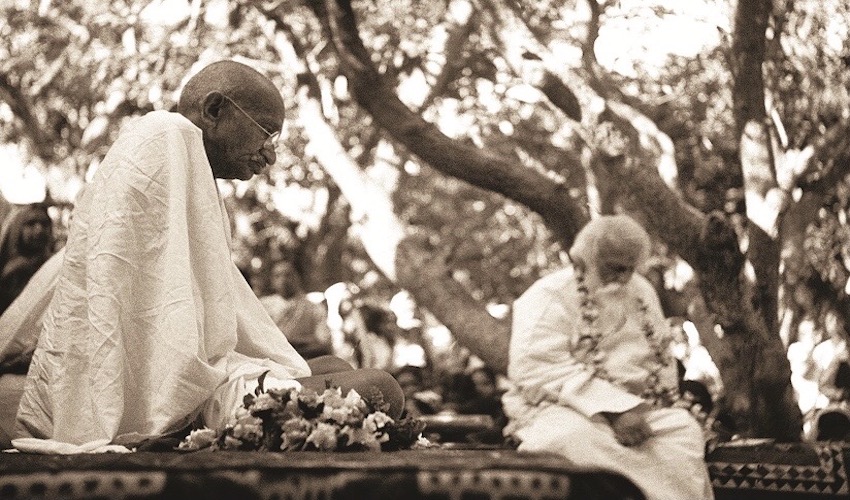
1925, 1926 Great Debates: Tagore vs Gandhi (1925-1926) -
1928 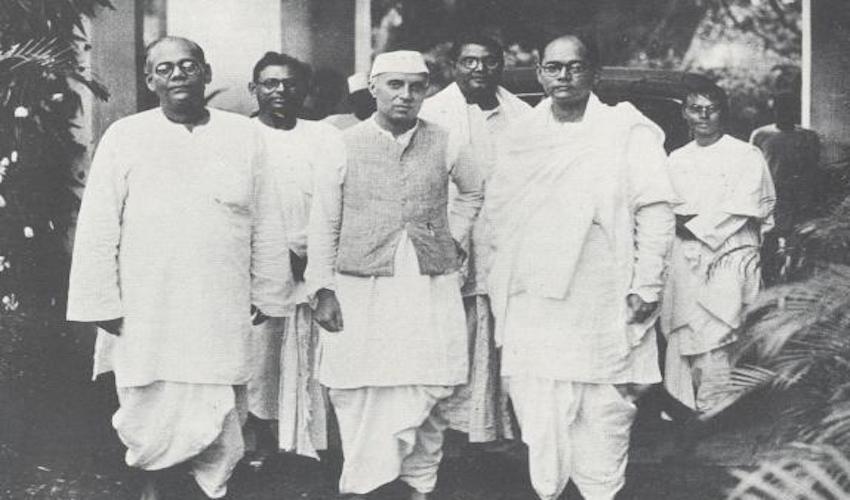
1928 Bhagat Singh’s dilemma: Nehru or Bose? -
1930 Modern Review 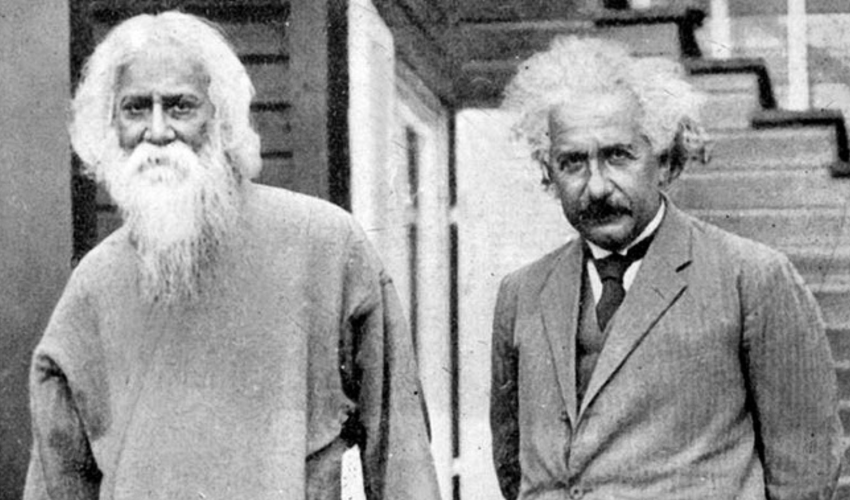
1930 The Modern Review Special: On the Nature of Reality -
1932 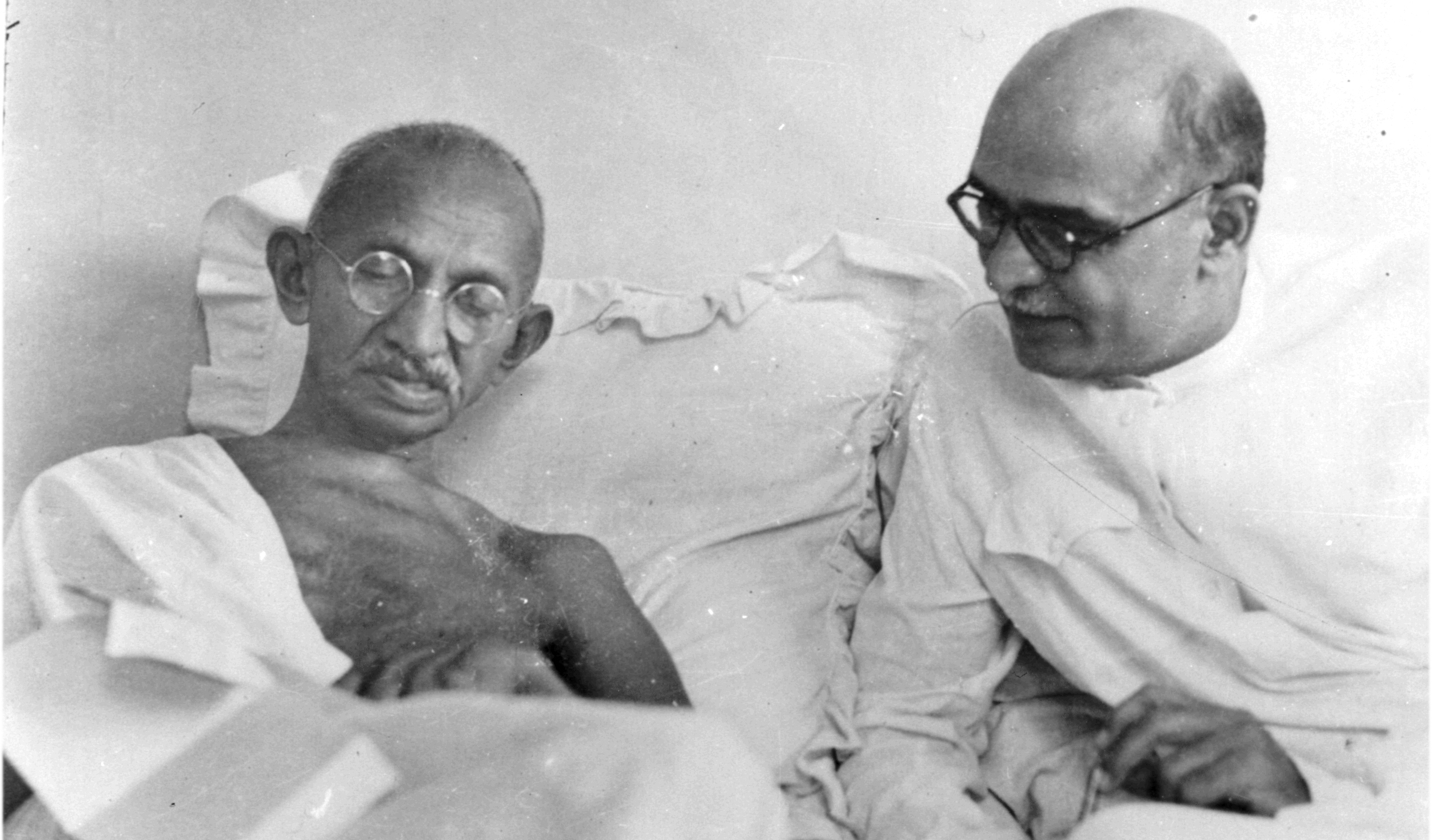
1932 Caste, Gandhi and the Man Beside Gandhi -
1933 - 1991 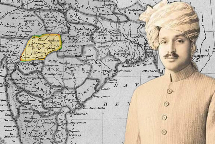
1933 - 1991 Raghubir Sinh: The Prince Who Would Be Historian -
1935 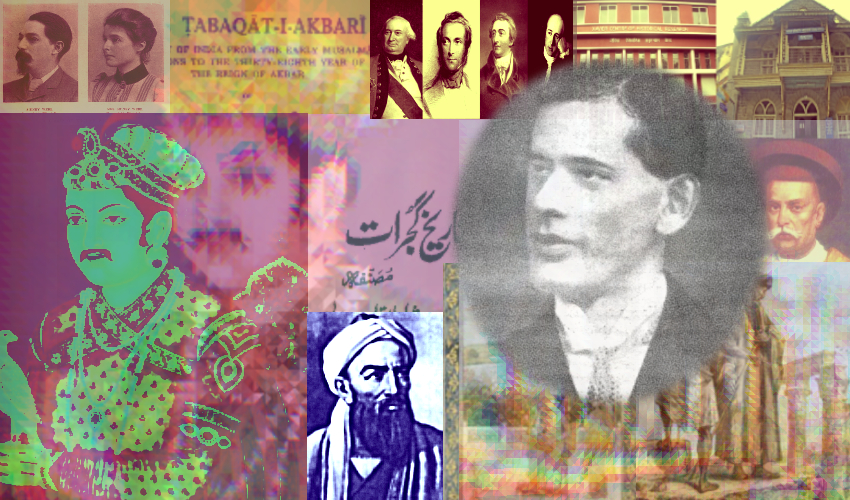
1935 A Historian Recommends: SA Khan’s Timeless Presidential Address -
1865-1928 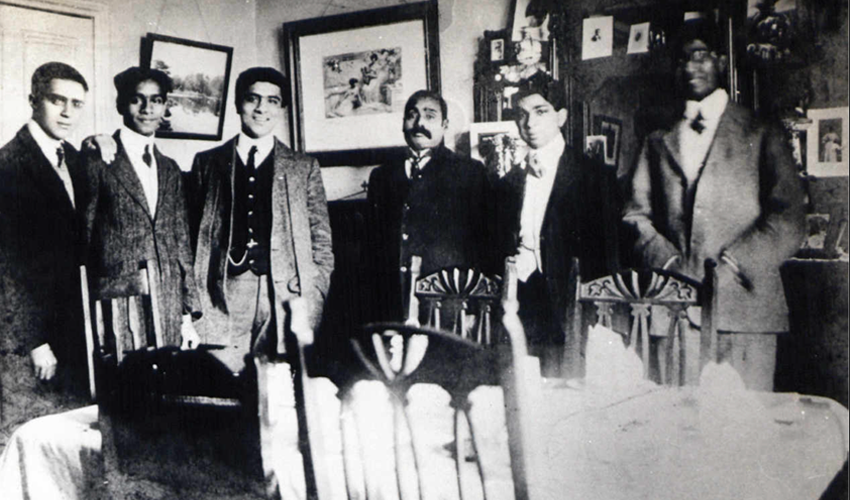
1865-1928 Understanding Lajpat Rai’s Hindu Politics and Secularism -
1935 Modern Review 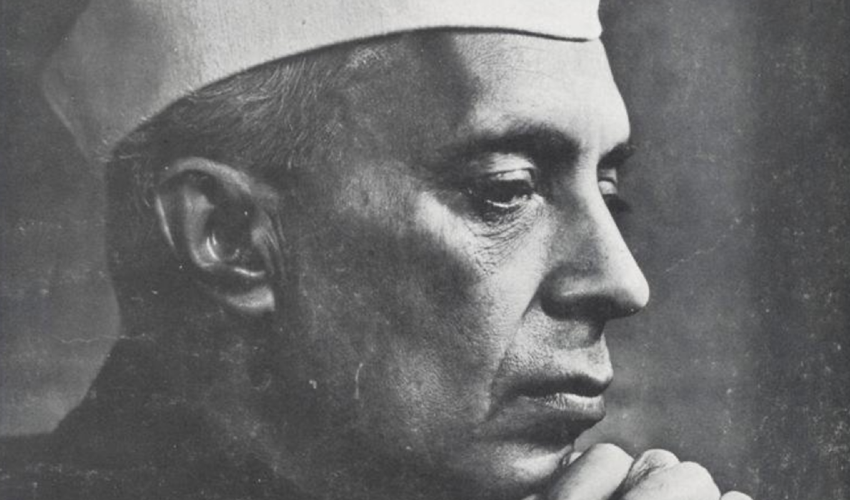
1935 The Modern Review Special: The Mind of a Judge -
1936 Modern Review 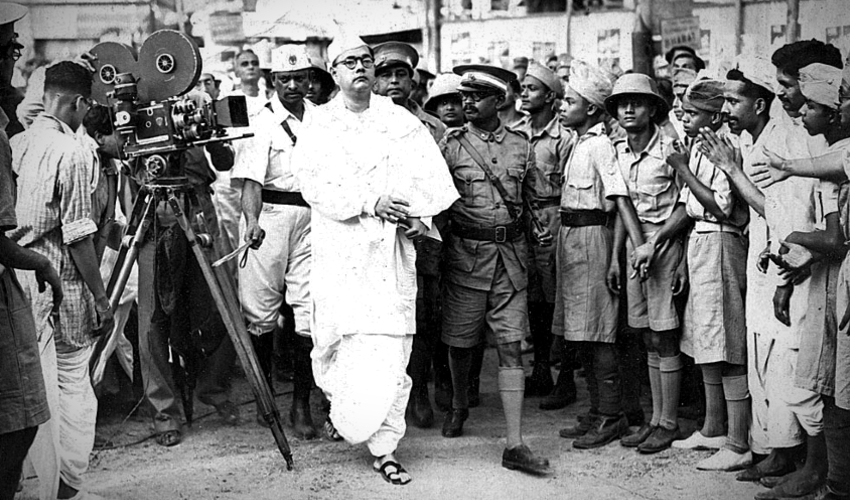
1936 The Modern Review Special: When Netaji Subhas Bose Was Wrongfully Detained for ‘Terrorism’ -
1936 
1936 Annihilation of Caste: Part 1 -
1936 Modern Review 
1936 The Modern Review Special: An Indian MP in the British Parliament -
1936 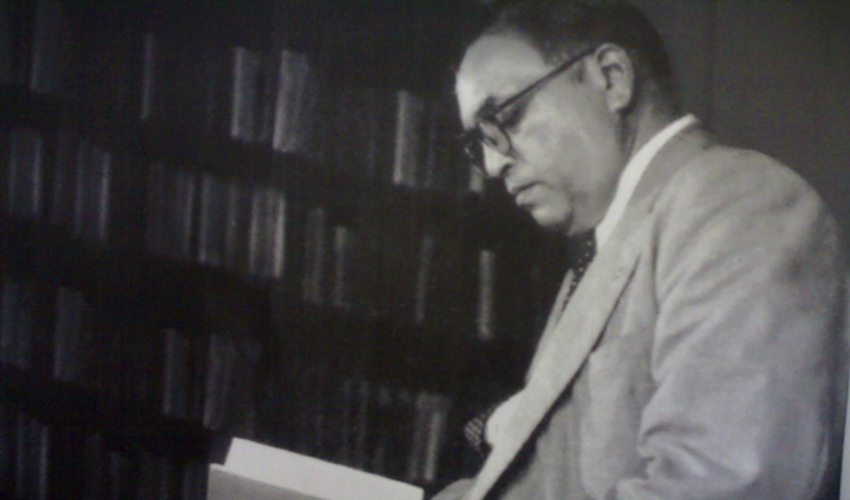
1936 Annihilation of Caste: Part 2 -
1936 
1936 A Reflection of His Age: Munshi Premchand on the True Purpose of Literature -
1936 Modern Review 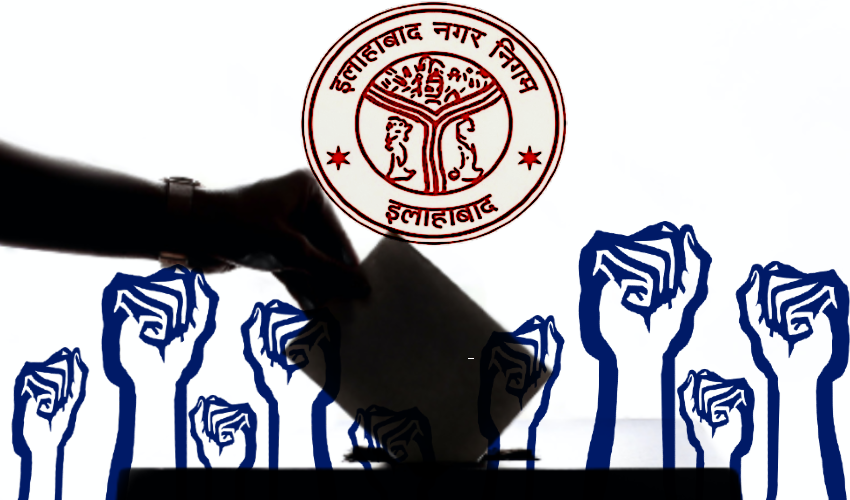
1936 The Modern Review Special: The Defeat of a Dalit Candidate in a 1936 Municipal Election -
1937 Modern Review 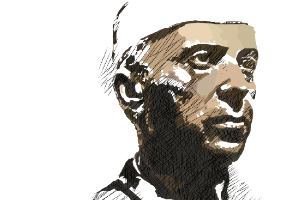
1937 The Modern Review Special: Rashtrapati -
1938 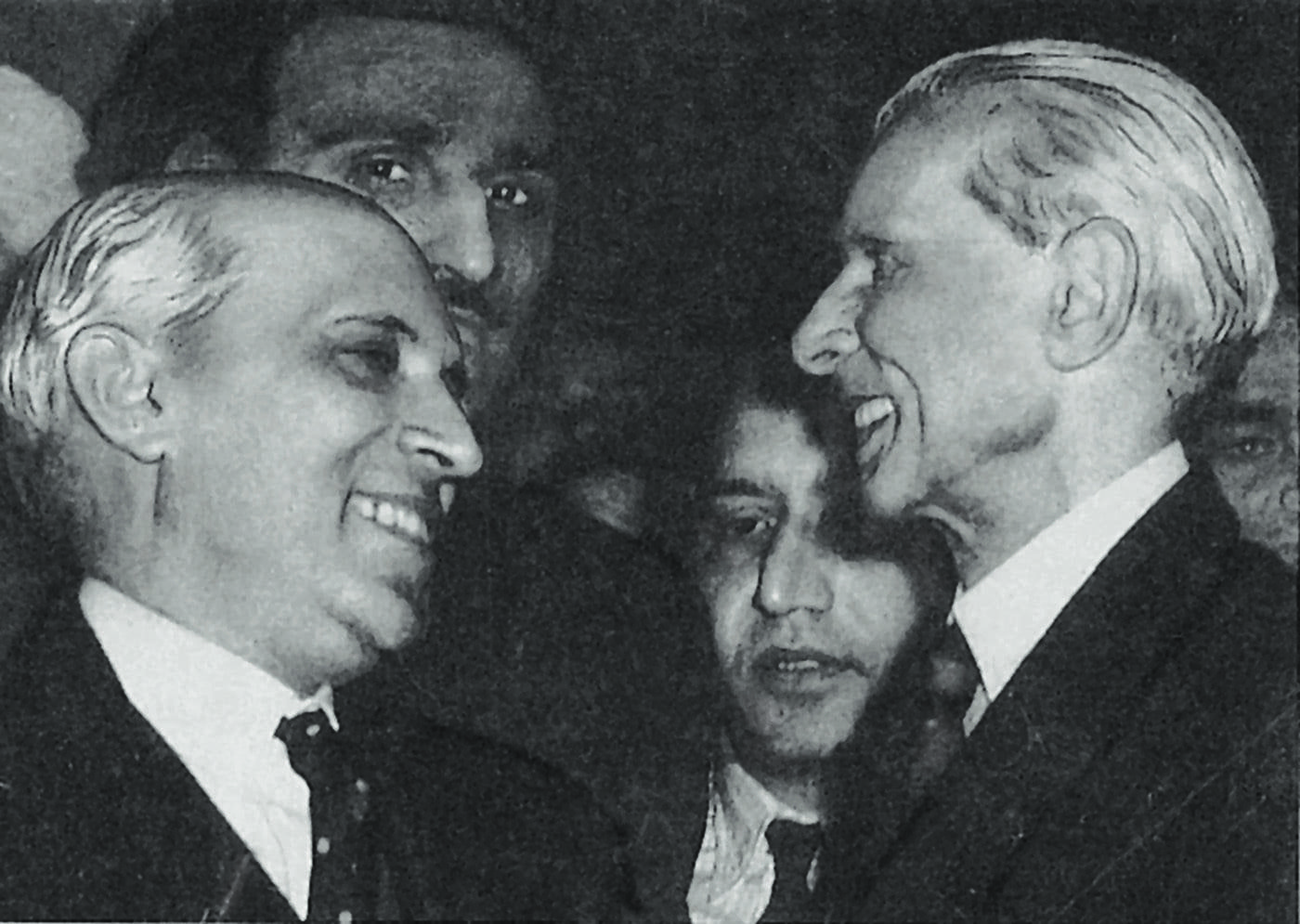
1938 Great Debates: Nehru Vs. Jinnah (1938) -
1942 Modern Review 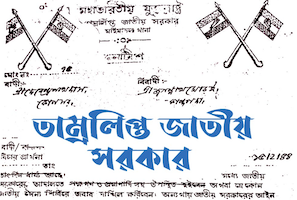
1942 IHC Uncovers: A Parallel Government In British India (Part 1) -
1943-1945 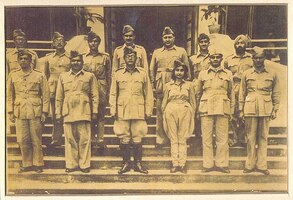
1943-1945 Origin Of The Azad Hind Fauj -
1942-1945 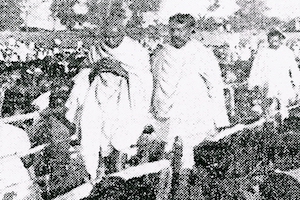
1942-1945 IHC Uncovers: A Parallel Government in British India (Part 2) -
1946 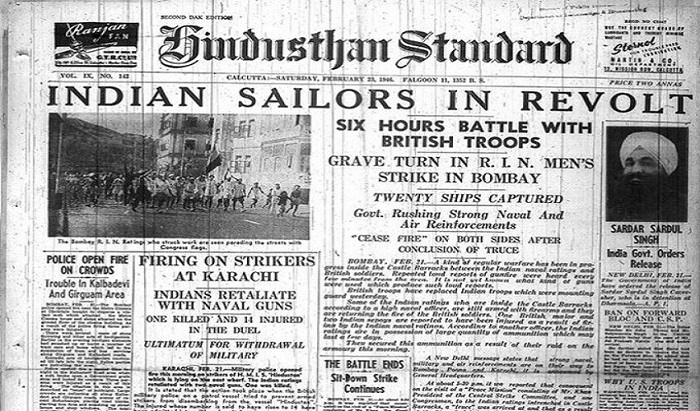
1946 Our Last War of Independence: The Royal Indian Navy Mutiny of 1946 -
1946 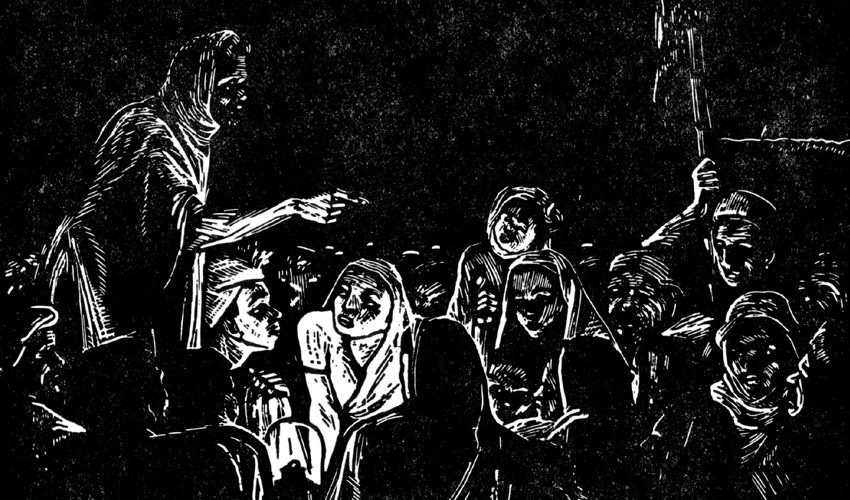
1946 An Artist’s Account of the Tebhaga Movement in Pictures And Prose -
1946 – 1947 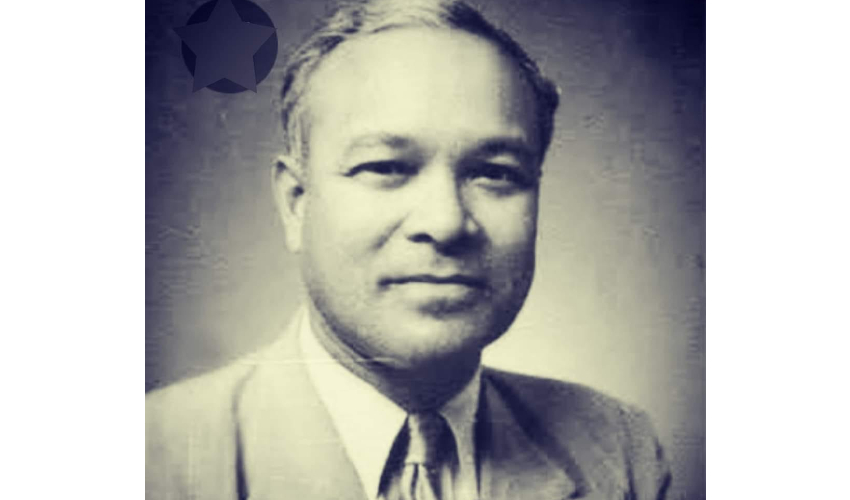
1946 – 1947 “The Most Democratic People on Earth” : An Adivasi Voice in the Constituent Assembly -
1946-1947 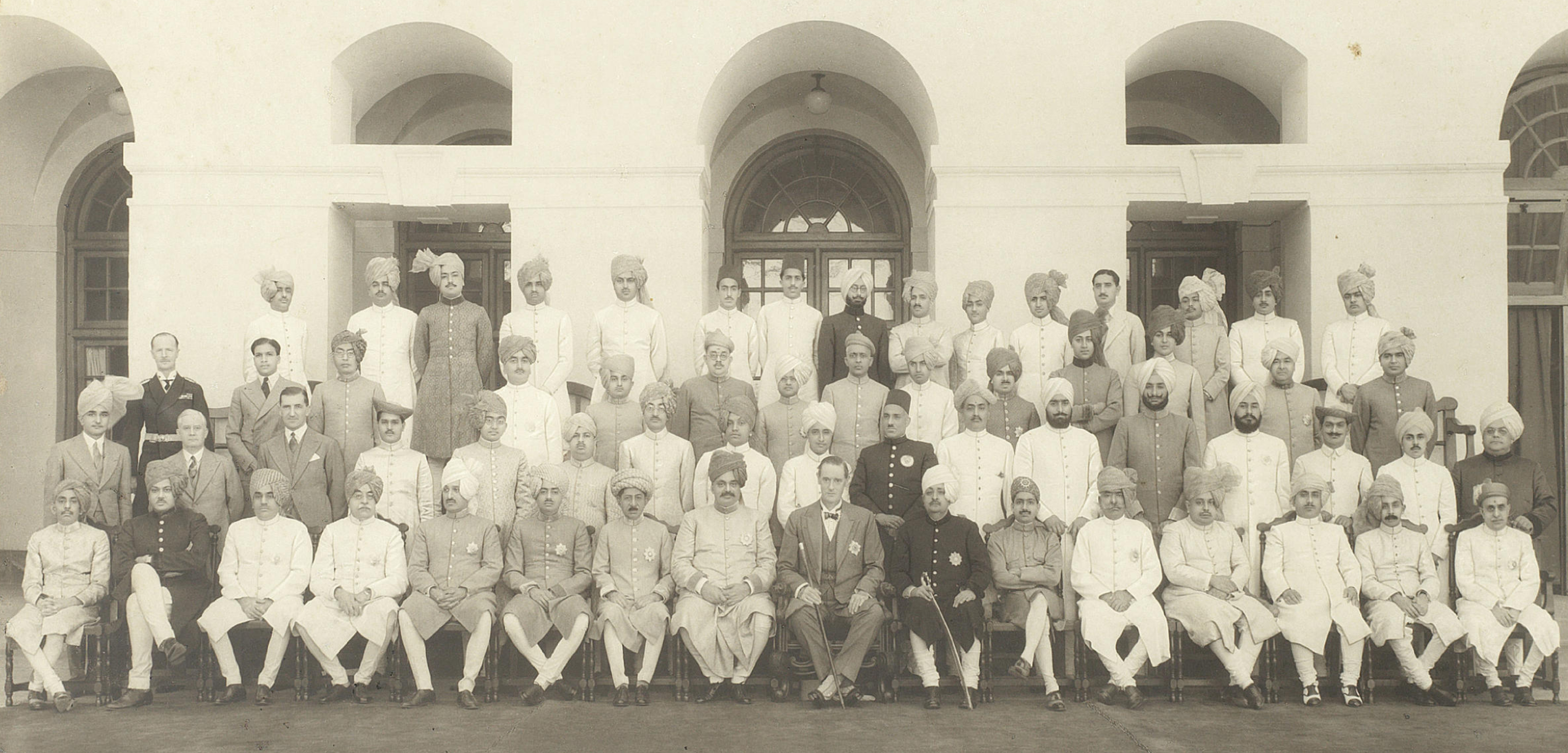
1946-1947 VP Menon and the Birth of Independent India -
1916 - 1947 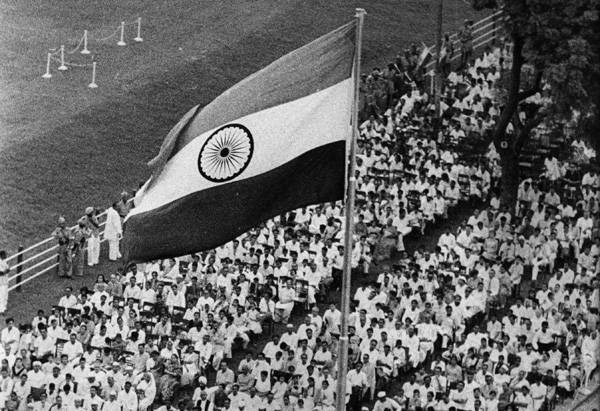
1916 - 1947 8 @ 75: 8 Speeches Independent Indians Must Read -
1947-1951 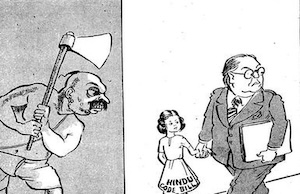
1947-1951 Ambedkar Cartoons: The Joke’s On Us -
1948 
1948 “My Father, Do Not Rest” -
1940-1960 
1940-1960 Integration Myth: A Silenced History of Hyderabad -
1948 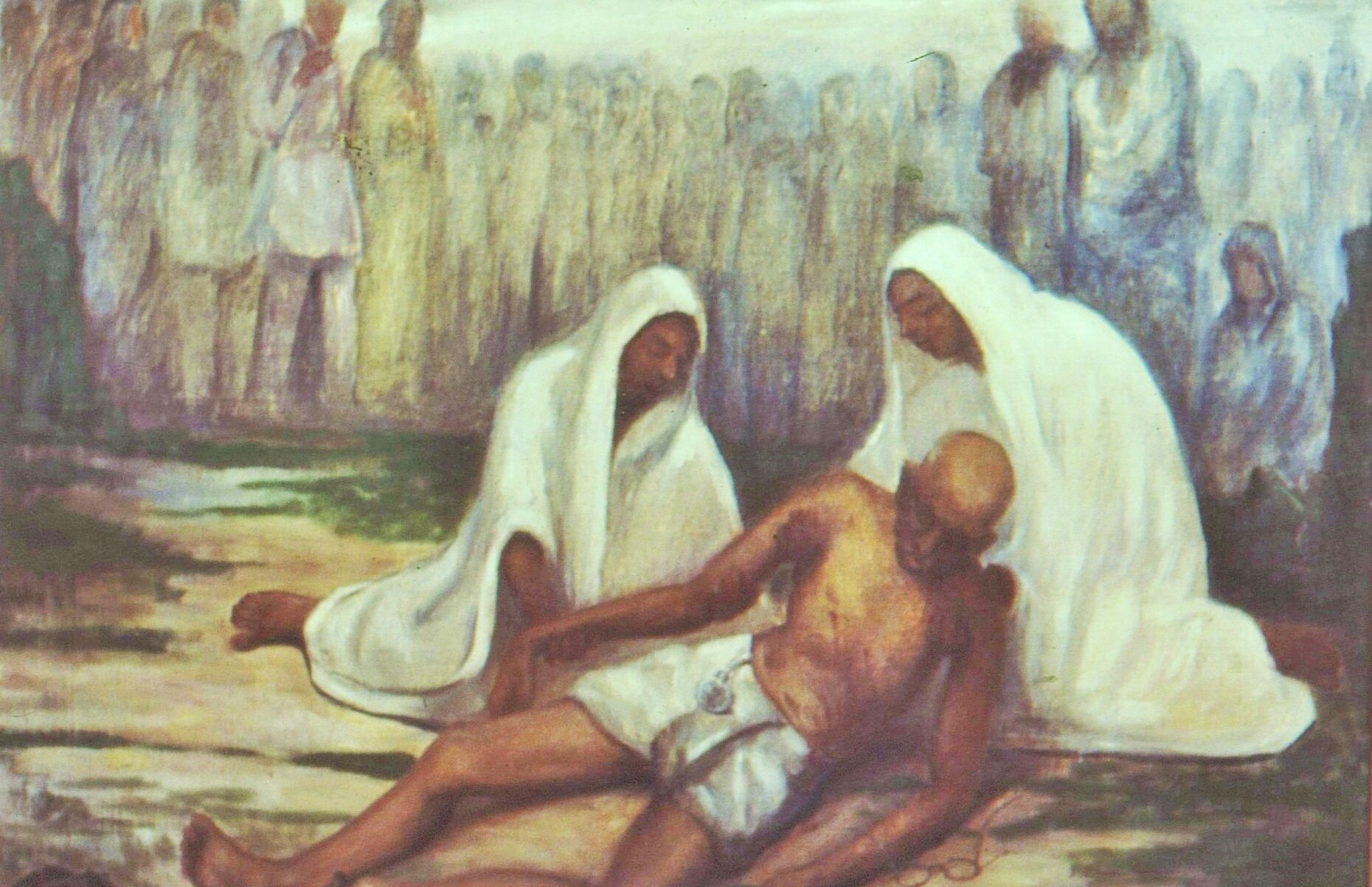
1948 The Assassination of a Mahatma, the Princely States and the ‘Hindu’ Nation -
1949 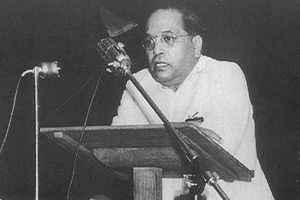
1949 Ambedkar warns against India becoming a ‘Democracy in Form, Dictatorship in Fact’ -
1950 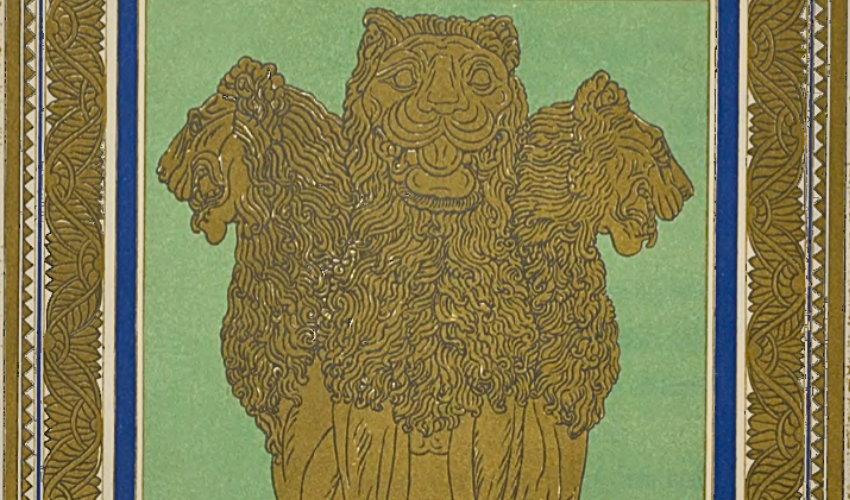
1950 Illustrations from the constitution -
1951 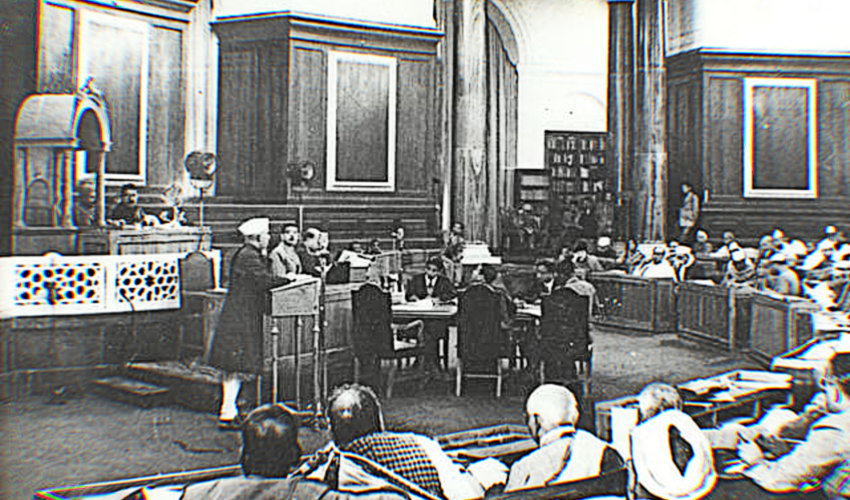
1951 How the First Amendment to the Indian Constitution Circumscribed Our Freedoms & How it was Passed -
1967 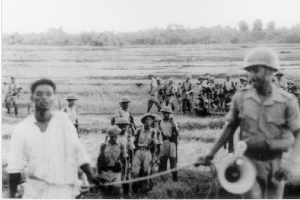
1967 Once Upon A Time In Naxalbari -
1970 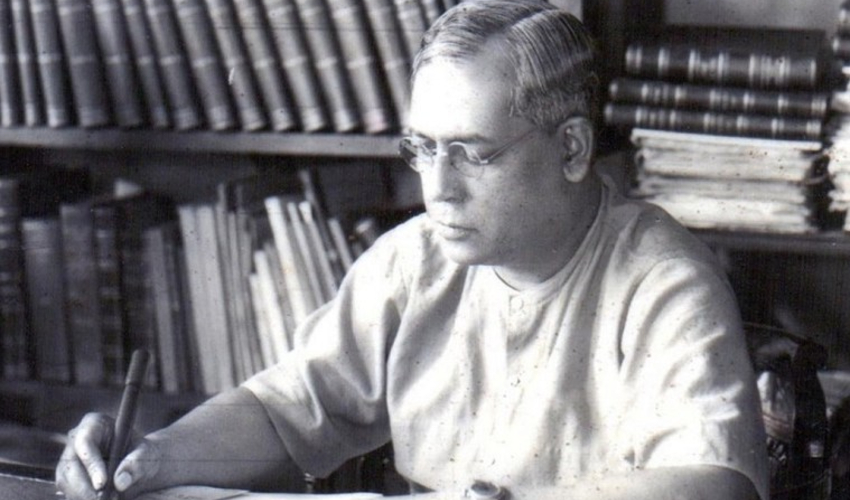
1970 R.C. Majumdar on Shortcomings in Indian Historiography -
1973 - 1993 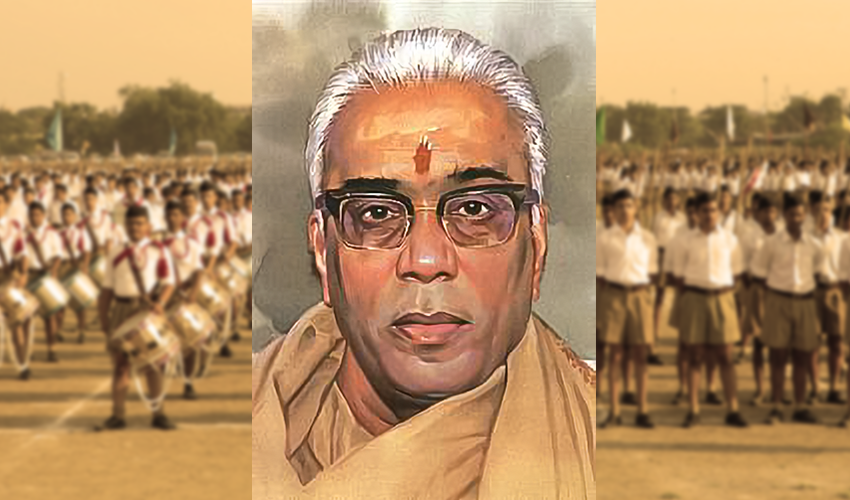
1973 - 1993 Balasaheb Deoras: Kingmaker of the Sangh -
1975 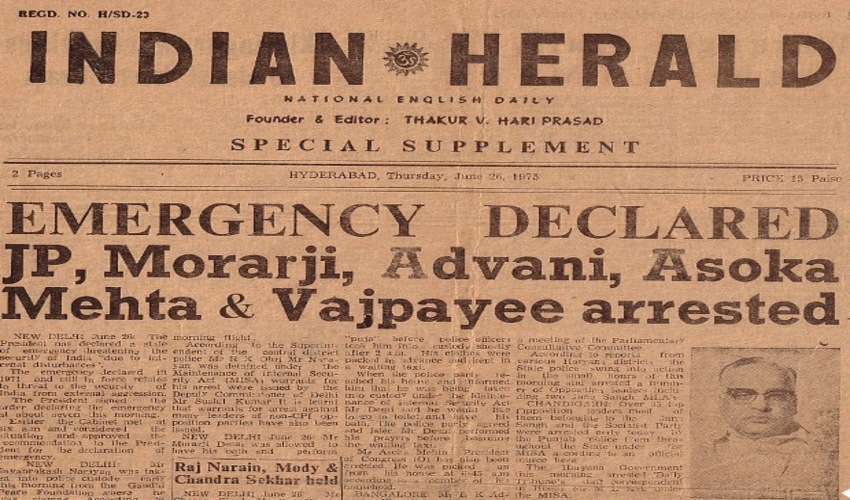
1975 The Emergency Package: Shadow Power -
1975 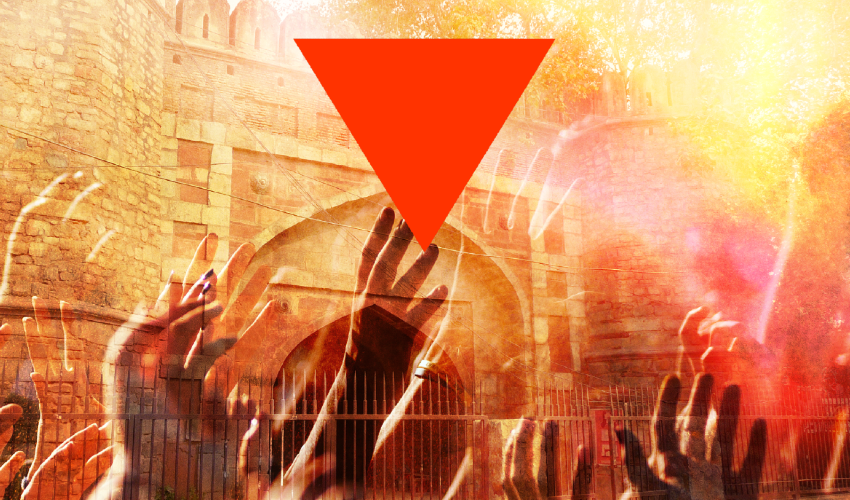
1975 The Emergency Package: The Prehistory of Turkman Gate – Population Control -
1977 – 2011 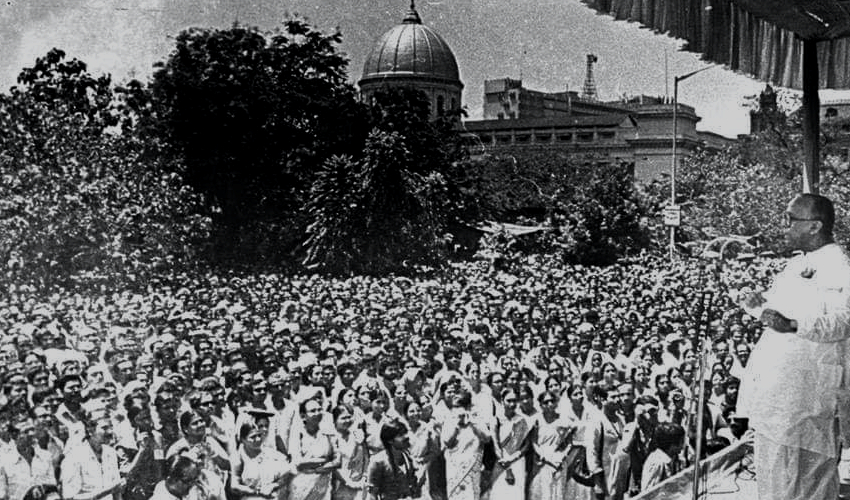
1977 – 2011 Power is an Unforgiving Mistress: Lessons from the Decline of the Left in Bengal -
1984 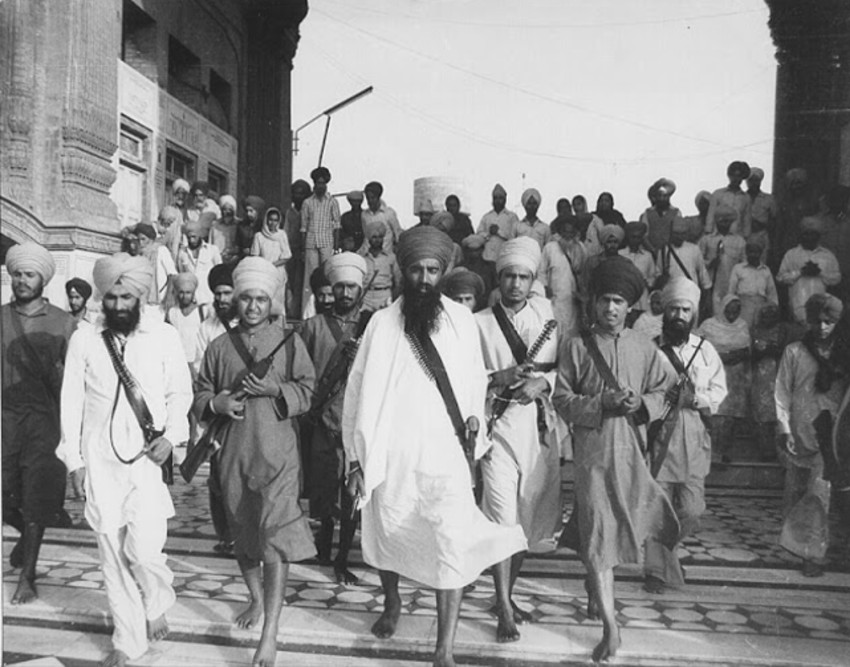
1984 Mrs Gandhi’s Final Folly: Operation Blue Star -
1916-2004 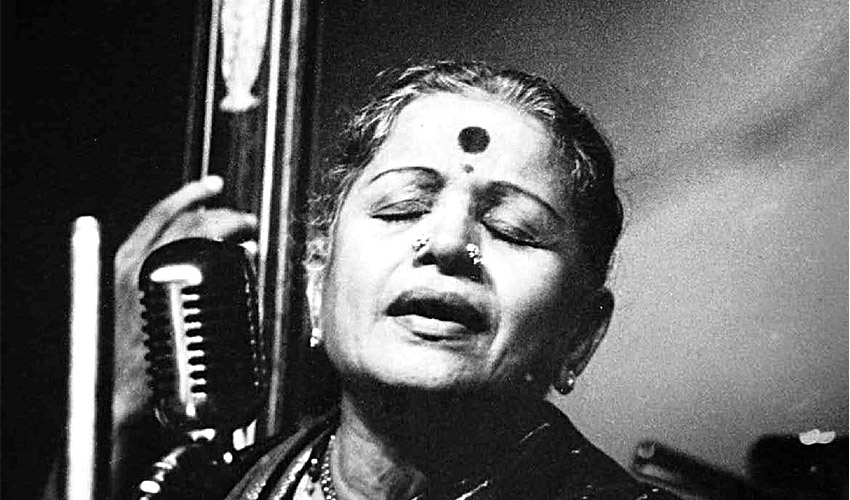
1916-2004 Amjad Ali Khan on M.S. Subbulakshmi: “A Glorious Chapter for Indian Classical Music” -
2008 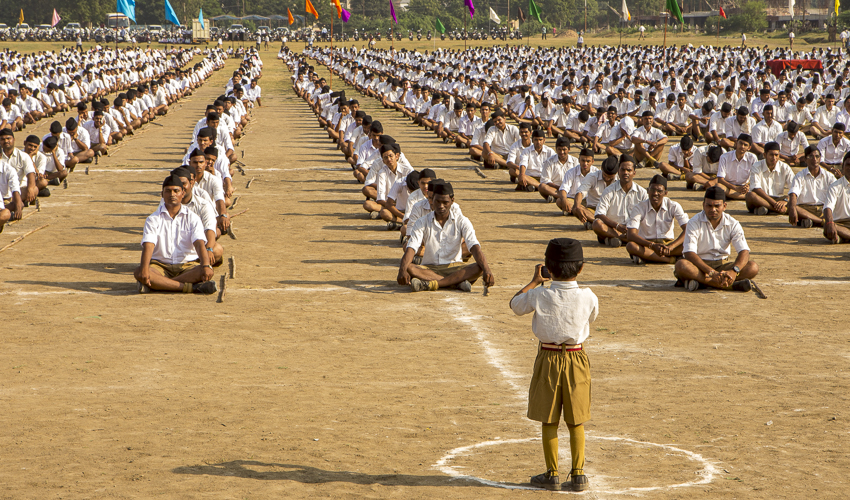
2008 Whose History Textbook Is It Anyway? -
2006 - 2009 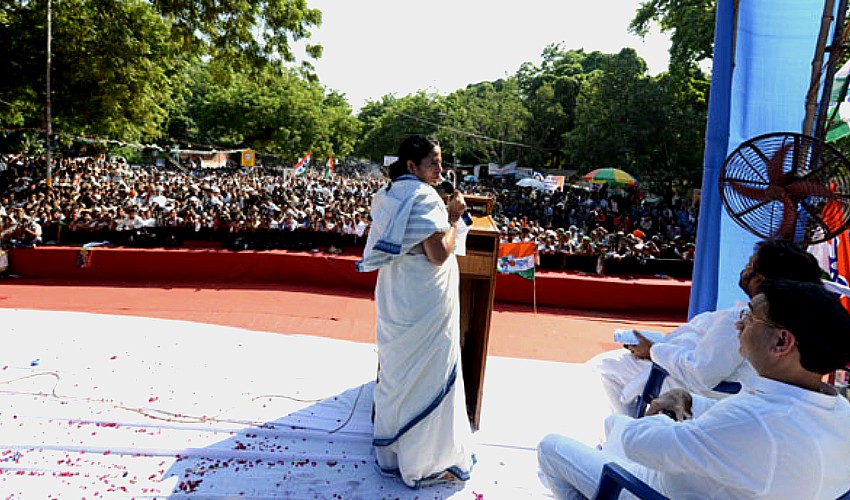
2006 - 2009 Singur-Nandigram-Lalgarh: Movements that Remade Mamata Banerjee -
2020 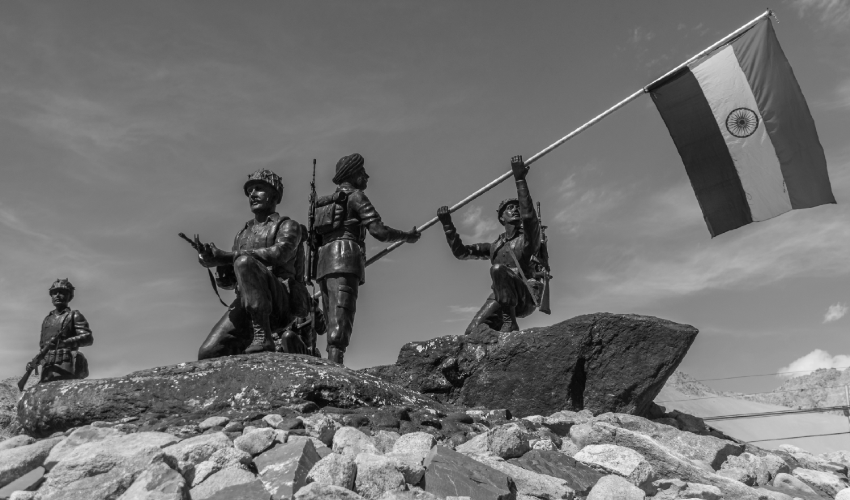
2020 The Indo-China Conflict: 10 Books We Need To Read -
2021 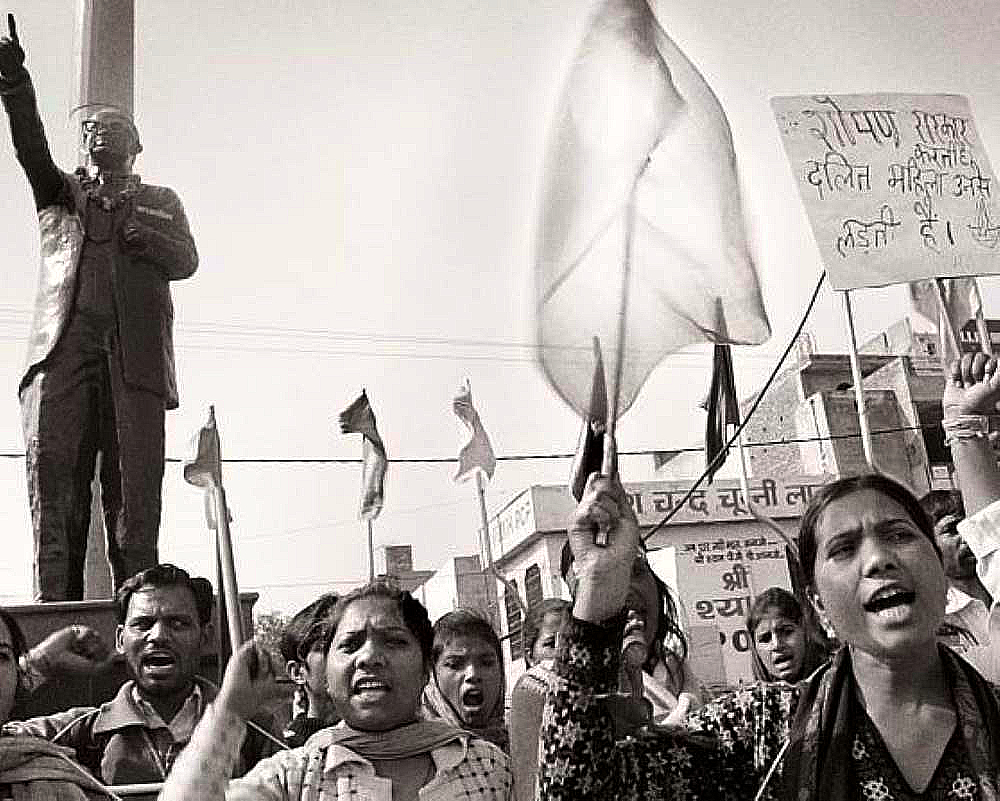
2021 Singing/Writing Liberation: Dalit Women’s Narratives


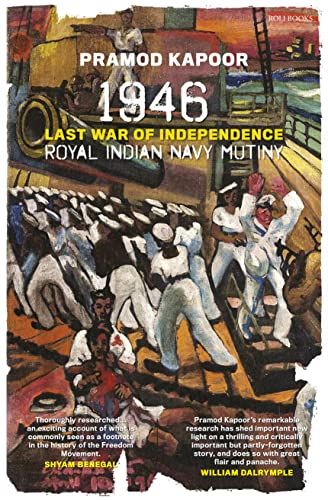
![The Golden Temple, Amritsar. [Credit: sandeepachetan.com, Flickr (CC BY-NC-ND 2.0)]](http://indianhistorycollective.com/wp-content/uploads/2021/06/Gtempke.jpeg)

